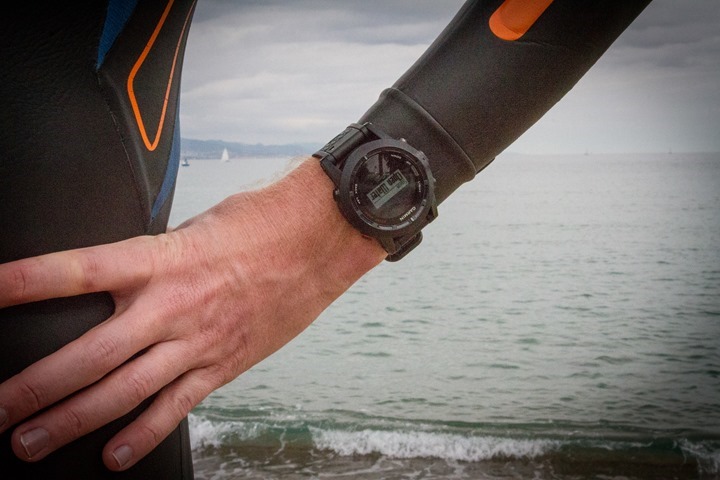
It is closing on nearly two years since Garmin initially announced the first generation Fenix in June 2012. Since then the watch has transformed from what was originally seen as a hiking focused unit, to more of an ultra-runner’s unit, to finally settling in on a full-fledged multisport watch as seen now in the recently announced Fenix2.
I’ve spent the last six or so weeks with the unit, putting it through daily activities across a wide variety of sports. Last week, the Fenix2 started hitting retail outlets as the firmware moved into the production state. In the past week alone however, even further unannounced additional features have been added. Nonetheless, it’s time for my full in-depth review.
To be clear, Garmin sent me over a Fenix2 to start testing with until retail availability. Like always, I’ll be shipping that back to them in Olathe, KS, in the next few days and going out and getting my own via regular retail channels. That’s just the way I roll.
Lastly, at the end of the day keep in mind I’m just like any other regular athlete out there. I write these reviews because I’m inherently a curious person with a technology background, and thus I try and be as complete as I can. But, if I’ve missed something or if you spot something that doesn’t quite jive – just let me know and I’ll be happy to get it all sorted out. Also, because the technology world constantly changes, I try and go back and update these reviews as new features and functionality are added – or if bugs are fixed. So – with that intro, let’s get into things
Unboxing:
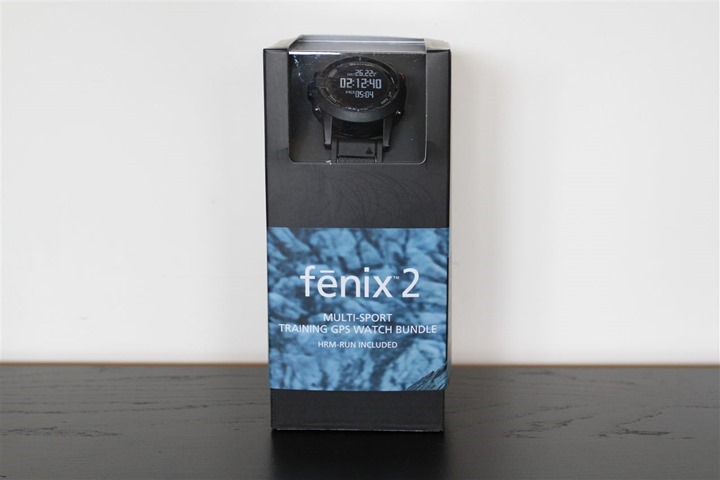
The Fenix2 comes boxed in two variations: One with just the watch, and one with a heart rate strap. Specifically, the HRM-RUN. I’ll dive more into the HRM-RUN later on, but it’s an important distinction compared to previous ANT+ enabled straps, as far as enabling advanced functionality on the Fenix2.
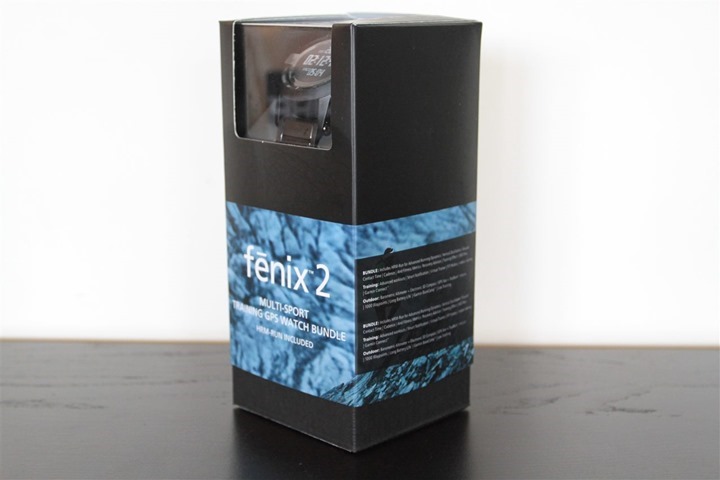
Inside the box splits into three pieces, two of which contain the goods. The third just sits there and looks pretty.
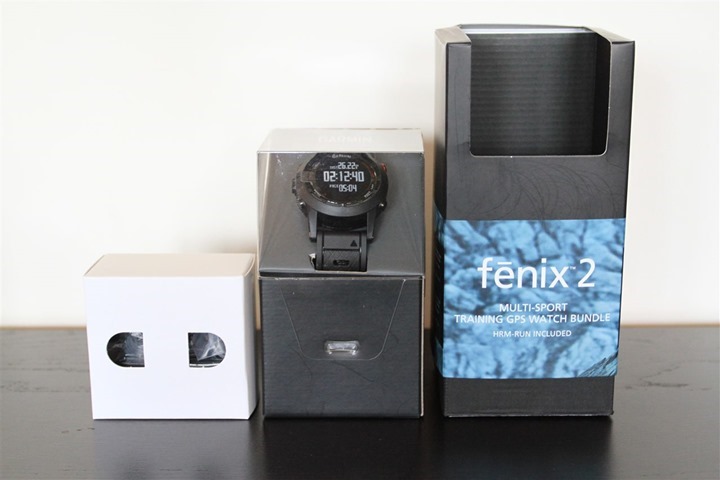
If you dump out the contents of those two boxes to the left, you’ll see the below. Note that the non-bundle version does not contain the heart rate strap (the two left pieces).
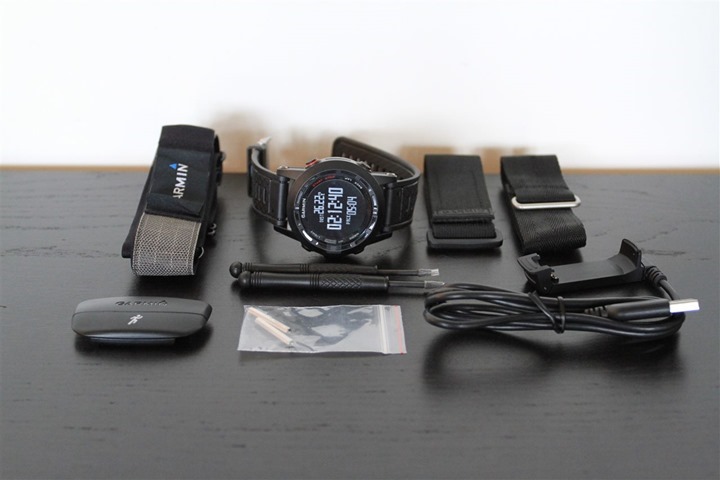
I’ll go ahead and walk through each of the components in the box.
First up, the power adapters. Note that some readers have asked what the difference is between the US and European editions are. It’s simple: It’s just the power adapter for the USB power block. That’s it. You can still use your Fenix2 with any USB port in the world, and you can still use the power adapter with a 99 cent adapter in any outlet in the world. So don’t fret too much there.
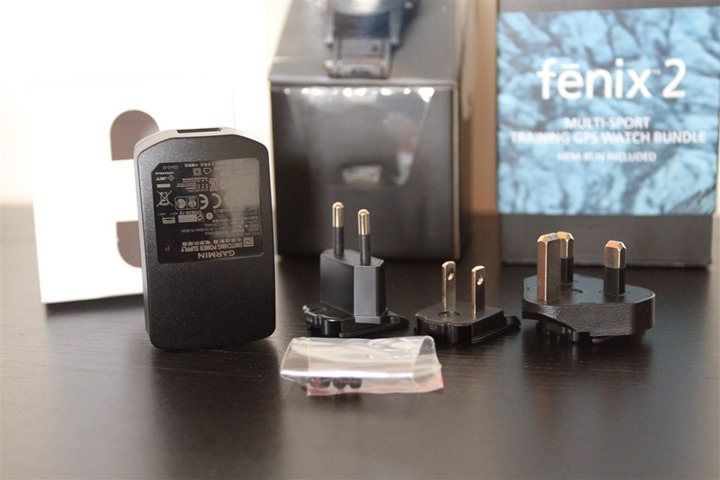
Next we’ve got the HRM-RUN heart rate strap. This ANT+ capable strap transmits your heart rate strap to the Fenix2 (as well as any ANT+ device in range that’s been paired with it). In that way, the HRM-RUN is just like any other ANT+ strap. However, it also has a secondary private channel that carries with it additional information only accessible to Garmin devices, that constitute the Running Dynamics pieces. So while you can use the Fenix2 with any ANT+ strap, you won’t get some of the Running Dynamics pieces without it. Also, it’s $40 cheaper to buy the bundle than the two separately (usually, it’s a wash price-wise).
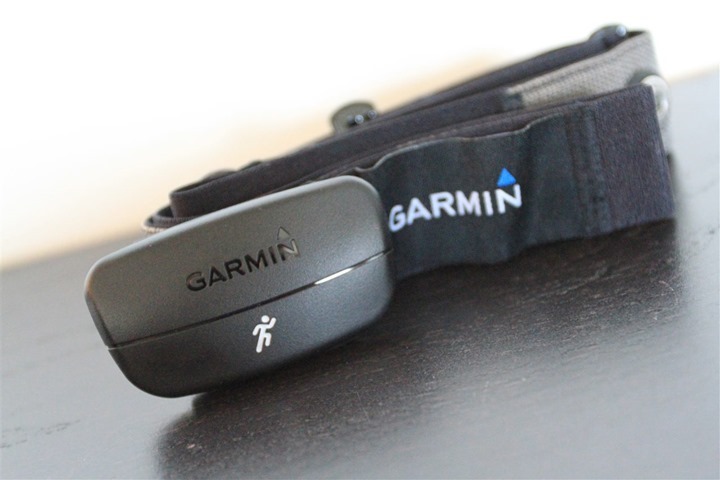
Next, Garmin decided to toss in a fabric strap. This can be used with the screws and pieces seen below to replace the plastic strap. This is useful because it goes quite a bit larger, enabling you to place it over ski coats and the like.
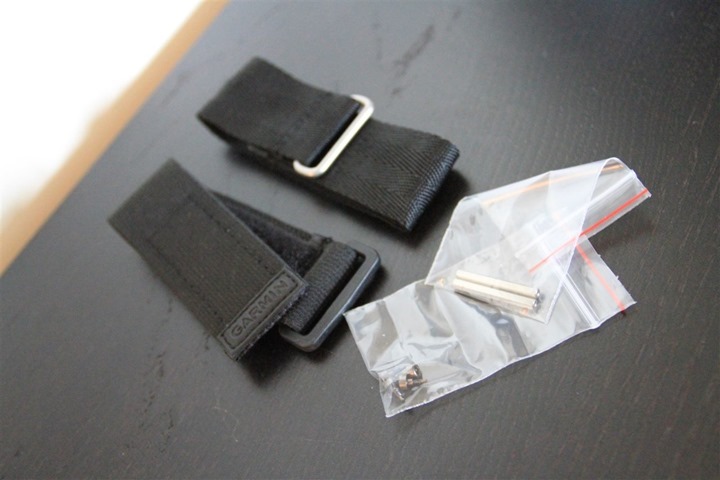
You’ll use these two little incredibly sharp screwdrivers to remove the pins. It’s a two hand job. Ok, I guess that came out wrong.
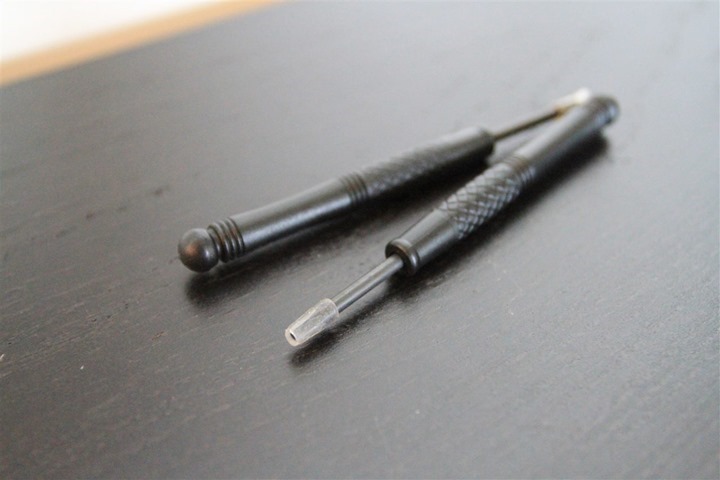
Finally, we get to the watch itself. If you’re a past Fenix/Tactix user, you’ll notice a few changes up front. First, the buttons have been changed around. This (in my opinion) makes the flow much cleaner, and much easier to navigate. It also mirrors the Garmin Forerunner line. Second, you’ll notice the display is ‘inverted’, which means its white text on black background. This is non-changeable.
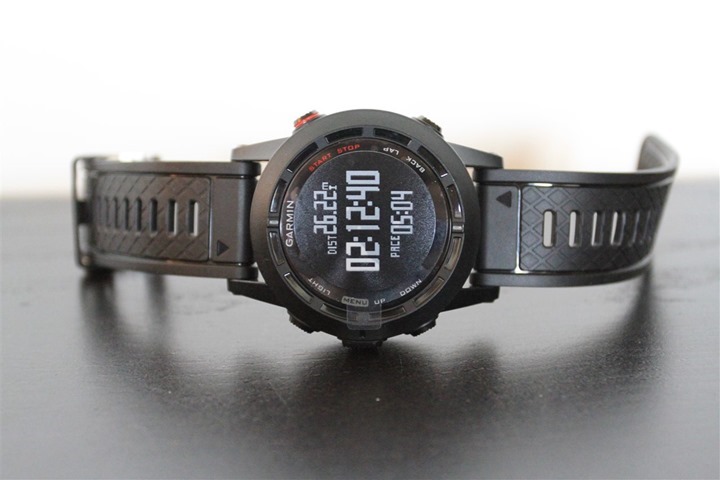
On the back, you’ll find the charging pins. The unit connects to a USB charger I’ll show you in a second. The reason the Fenix2 (and most other well waterproofed watches) use contacts like these to charge versus using a standard micro-USB or mini-USB port is for waterproofing purposes.
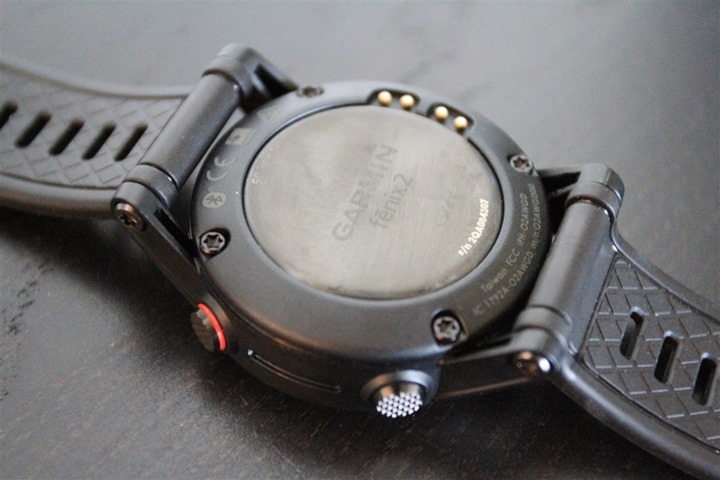
Here’s the USB charging cable. The cable can be used both to charge the unit, as well as to transfer workouts/tracks/routes/waypoints/maps/etc… Garmin provides apps for PC and Mac, but the device enumerates as a standard USB mass storage device, so that functionality will work fine on other operating systems like Linux.
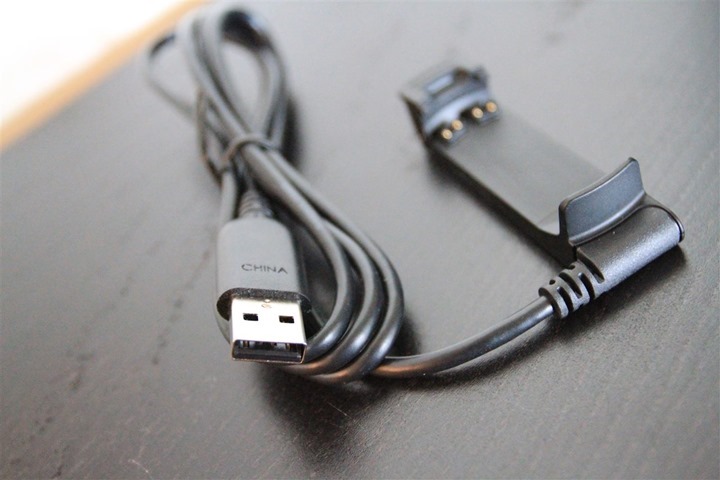
The clip snaps onto the back, thus it would be able to pass the ‘ceiling fan’ test, which tests whether or not the charging clip is strongly enough attached to the Fenix2 to tie one end to a ceiling fan and turn it on. Aside from being fun, the more practical implication of this is that you can charge it on the go, without worrying about a finicky connection.
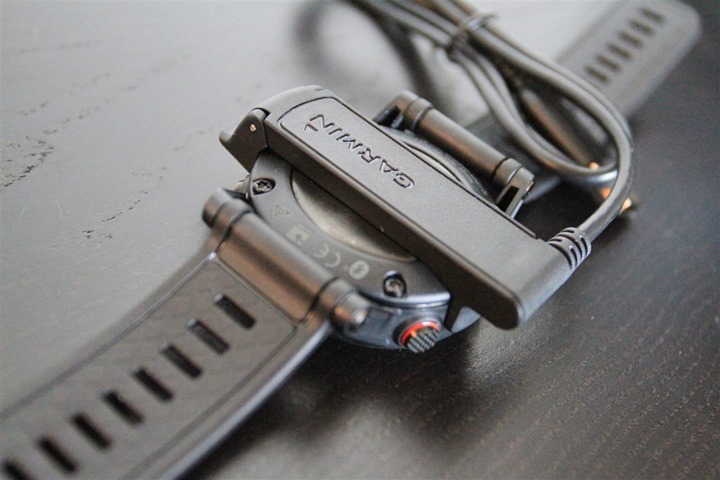
With everything unboxed, let’s see how it stacks up against other units.
Size & Weight Comparisons:
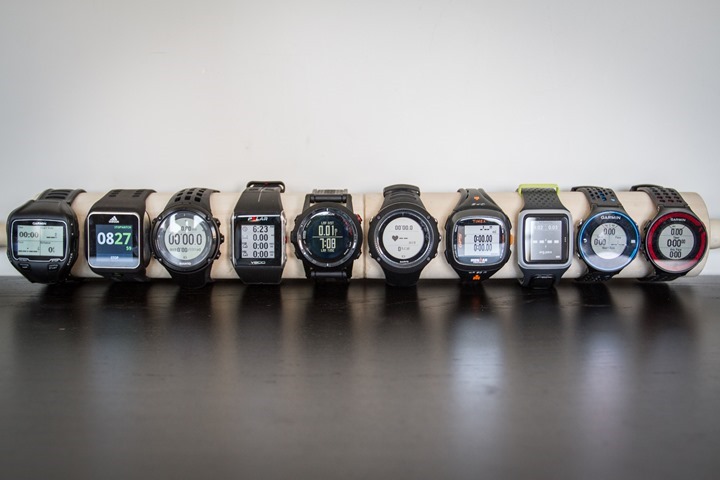
As always, I’ve combined all the competitive units in the running and triathlon segment together for you to get a feel for how they compare size-wise. Roughly speaking, the bigger ones are on the left side – and those are the ones we’re mostly comparing between.
Below, from left to right: Adidas Smart Run GPS, Suunto Ambit 2, Polar V800, Garmin Fenix2, Suunto Ambit 2R.
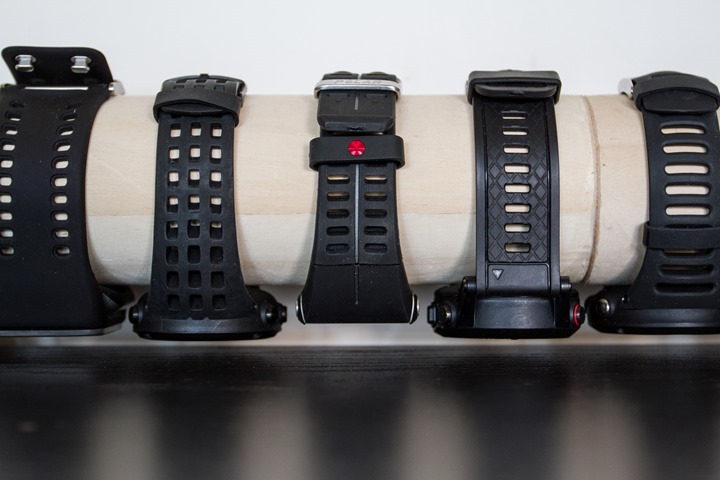
Next, I’ve flipped it over so you can see the depth of the units themselves.
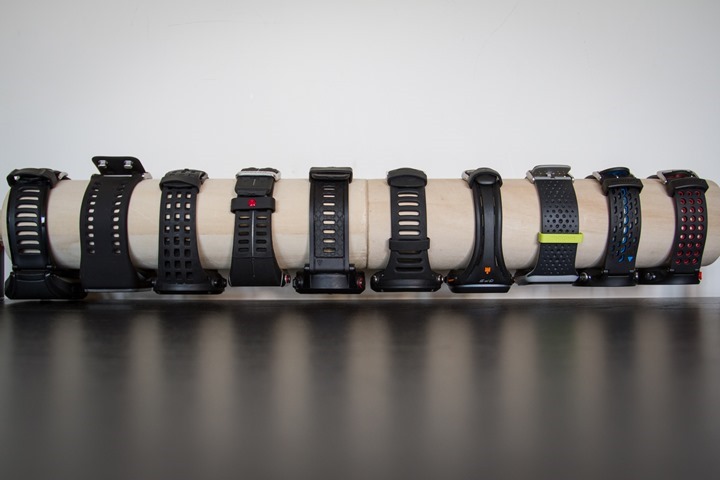
If you look at the Fenix1 and Fenix2, you’ll see they are virtually identical. After all, they are basically twins, just not identical twins. On the visible side, the button layout changed. On the internal guts side, the unit received a slight change in the accelerometer to enable the swimming tracking scenarios, that wouldn’t have been fully possible with the same level of accuracy with the accelerometer that’s contained in the Fenix1/Tactix units.
And remember, these watches are part of a longer line of siblings that share nearly identical physical hardware, but change in software – from the Quatix for marine use, to the D2 for pilots.
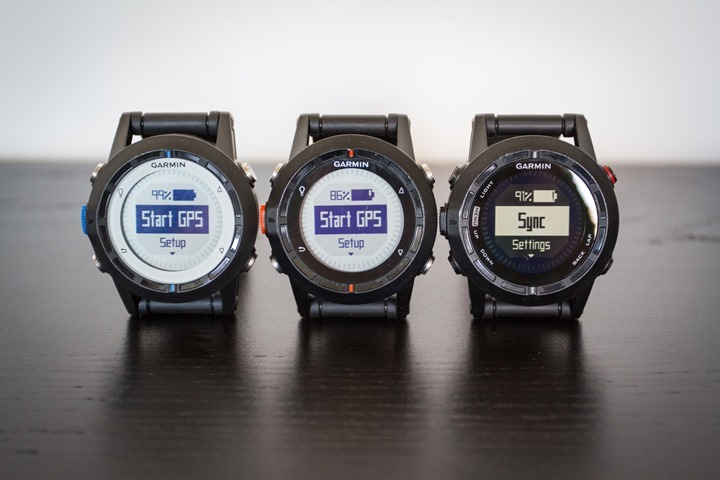
For those that haven’t followed along on the Fenix journey, the Fenix1 actually has received substantial updates over the last 4-5 months. In fact, outside of multisport mode, power meter support (cycling), and swimming support – the Fenix1 gains almost all the features of the Fenix2. Even things like mobile phone uploads and satellite pre-caching. These features were introduced in beta recently, and will ultimately be brought to full production status on those units as well. However, neither the Fenix1 nor the Tactix will get the Fenix2-only features like swimming, multisport or power meter support. Expect to see Garmin cease manufacturing of those units by summer.
One minor little tidbit that I thought was interesting – the Fenix2 strap is slightly longer than the Fenix1 strap:
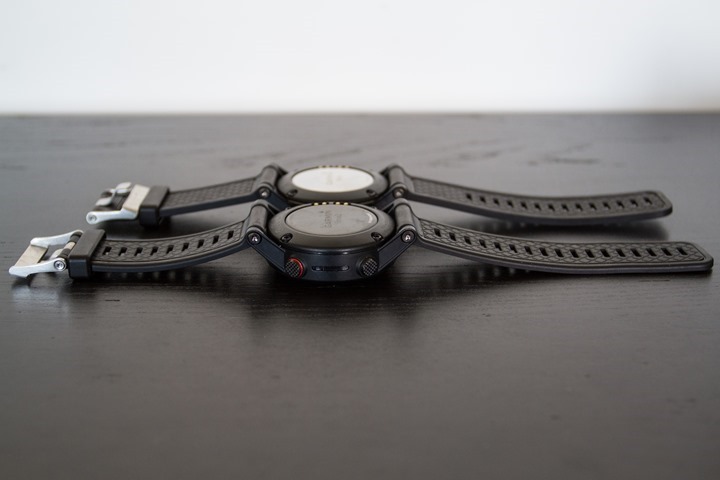
Next, while you’ll see the watch on my wrist throughout the review, I did briefly want to include what it looks like on a smaller female wrist – in this case, my wife. She’s tiny, and her wrist size is 14cm (or 5.5 inches).
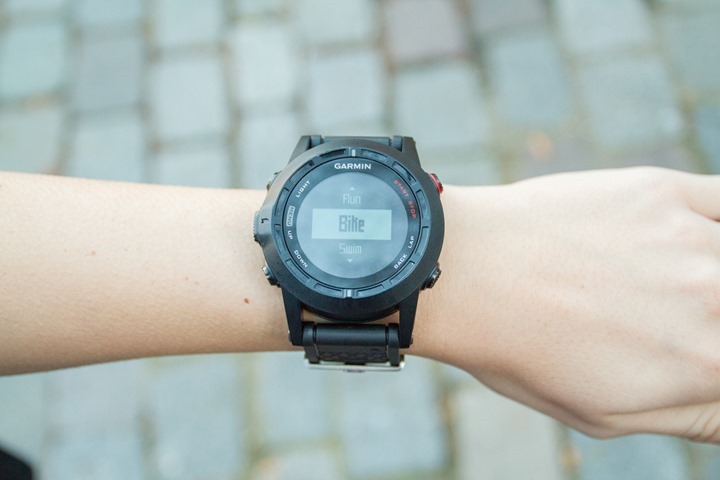
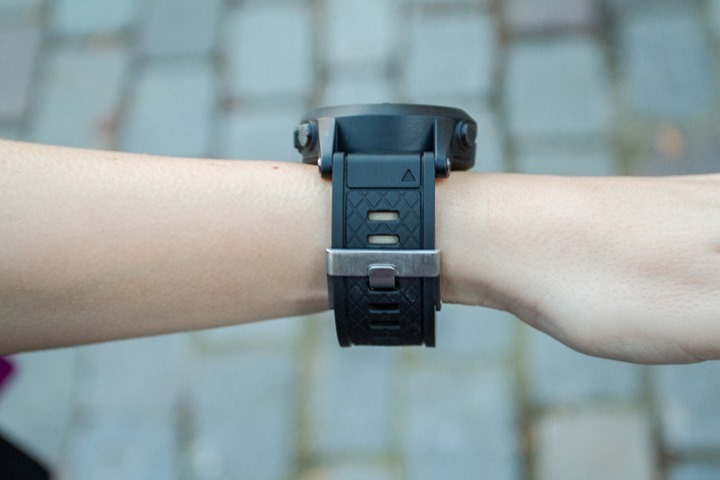
She found it heavy for her, but I pretty much said the same thing when I wore it initially. She hasn’t spent any time running with it though, nor getting used to it.
Finally, when it comes to weights, here’s a lineup of the devices you’re most likely to compare:
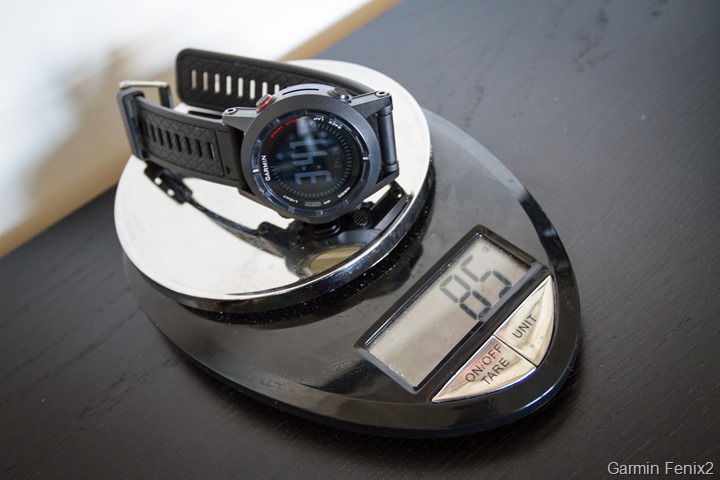
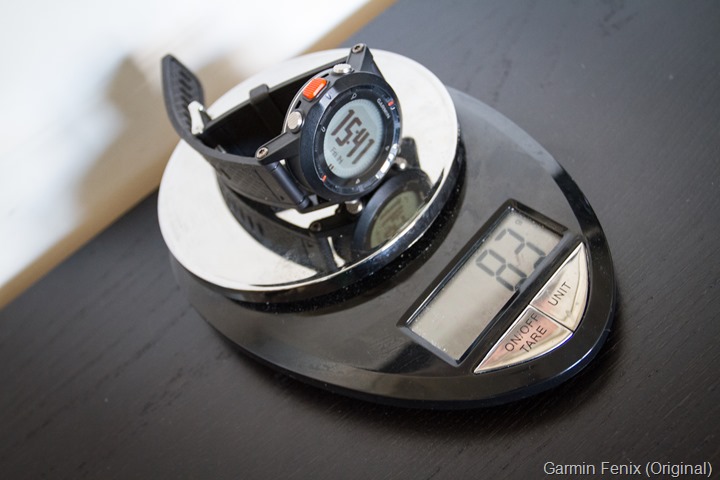
The key difference in weight between the Fenix1 and Fenix2 really comes from the change to the back plate on the unit.
And for fun, here’s two more units you’re likely to compare:
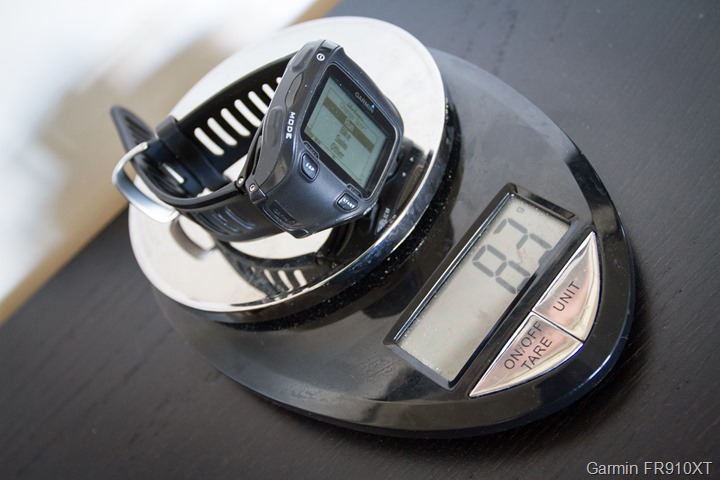
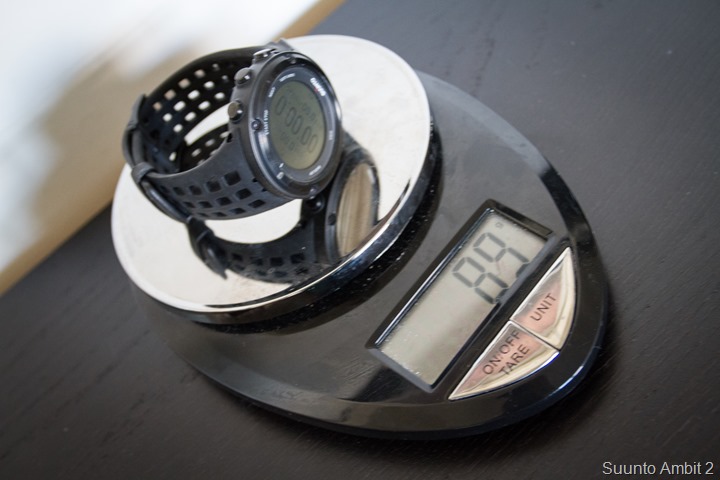
As you can see, weight-wise they’re all basically in the same camp. Note that for the FR910XT, I had the quick-release kit on there, which likely adds a tiny bit of weight.
With comparisons done, let’s head onto actually using the product.
Running:
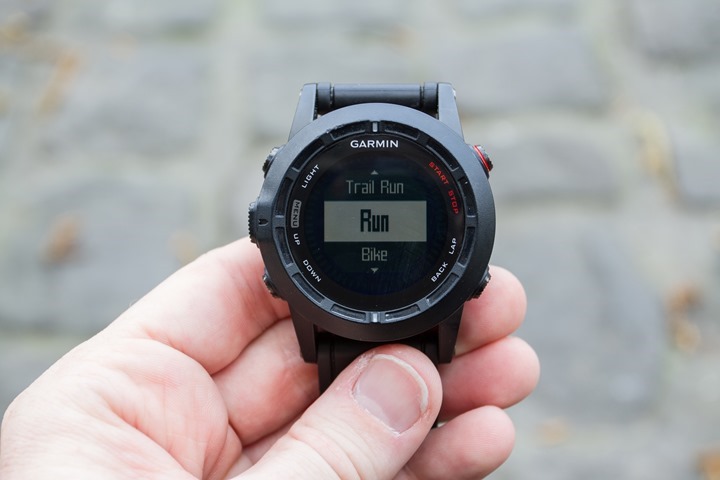
Without question, running is one of the most fundamental features of the Fenix2. And in that respect, the Fenix2 has come a long way in the running feature category since the initial release of the original Fenix. So while it’s easy to compare the initial review of the Fenix1 to the Fenix2, in general, all of features discussed in the first two chunks of the running section (Basics & Features/Functionality) are on both units. Where the features become Fenix2-only is within the Running Dynamics portion, and then the subsequent recovery/VO2Max/etc… pieces (separate sections). Don’t worry, I call those out specifically.
The Basics of Running with the Fenix2:
To start any activity, you’ll put the watch on and tap the red button in the upper right. This brings you to the sport selection menu. Don’t worry, you can lock the screen by simply holding down the upper left button (light), to prevent accidental sport triggering.
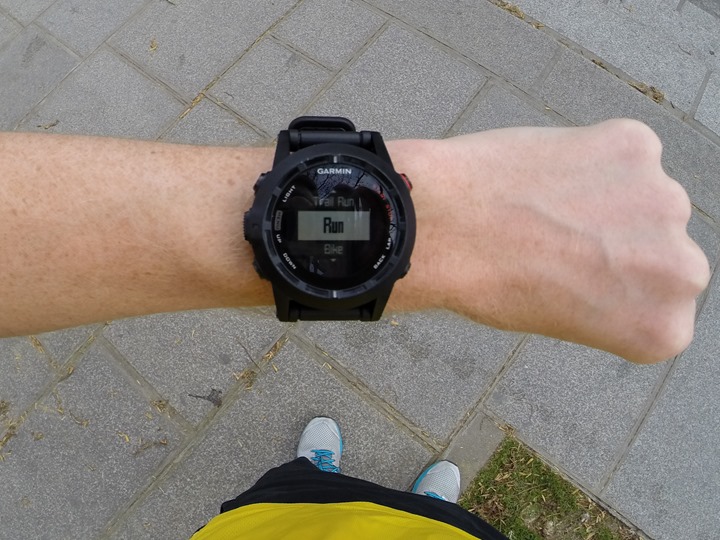
Once you’ve selected the sport, in this case running, the unit will search for any paired sensors – such as a heart rate strap. It’ll iterate through each one until complete, and then move onto satellite reception.
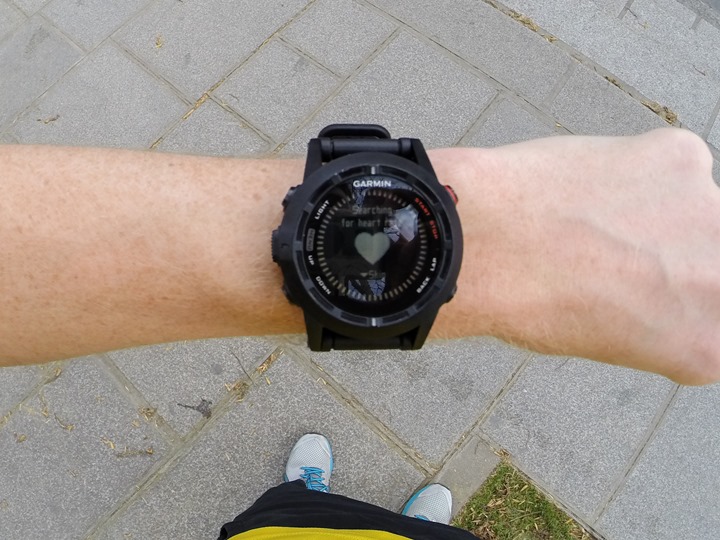
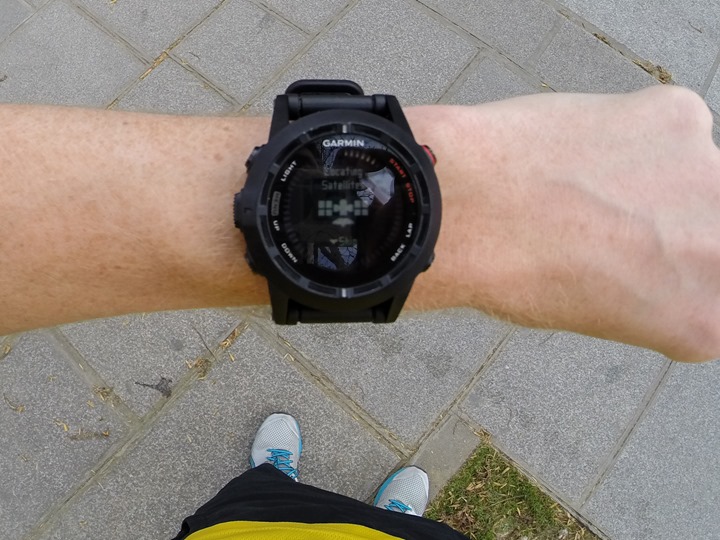
The Fenix2 automatically caches the satellite location data based on a download from Garmin Connect that occurs both via USB with Garmin Express, or via Bluetooth Smart and the Garmin Connect Mobile app. This satellite caching data helps to allow the unit to very quickly find satellites. In general, if I move to a new location on the globe and have up to date satellite cache data, it is in general taking me about 15-45 seconds. For example, two days ago in Mexico City, after walking out of the hotel and across the street, that’s how long it took. Whether or not the 27-story building was impacting things is unclear to me. If I haven’t moved to a new location and just walk outside my house and start the unit, it tends to find satellites in about 2-5 seconds (as it did about an hour later in a test in the same general area).
Once you’ve got satellite reception, you’re good to go, and can press the red button to start the activity recording. During activities, the red button is the start/pause button, and the lower right button is for creating a lap. Meanwhile, the bottom left buttons are for changing the view.
While running the unit will show you any data fields you’ve configured (see the Data Field section of the review). But in general most folks will use fields like pace, distance, heart rate, and time. For me, I prefer the lap variations of those. So I’ve got Lap Pace, Lap Time, Lap Distance, and then Heart Rate.
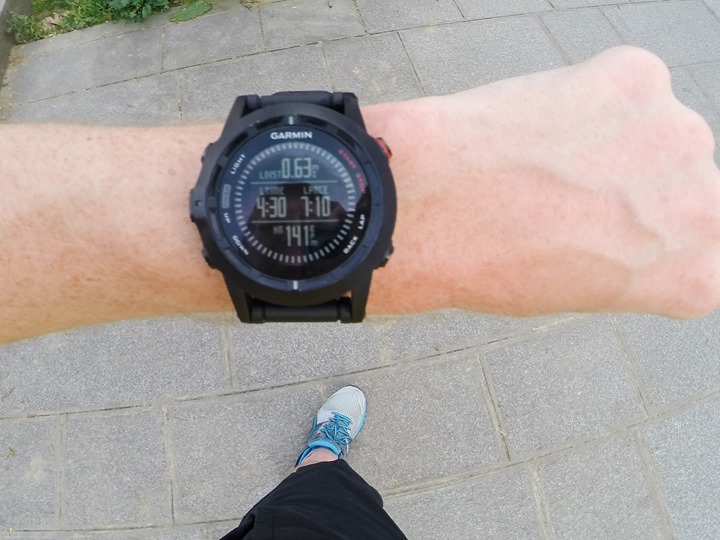
But, I can simply tap the up/down buttons and change to a different page, such as this one showing the Running Dynamics page:
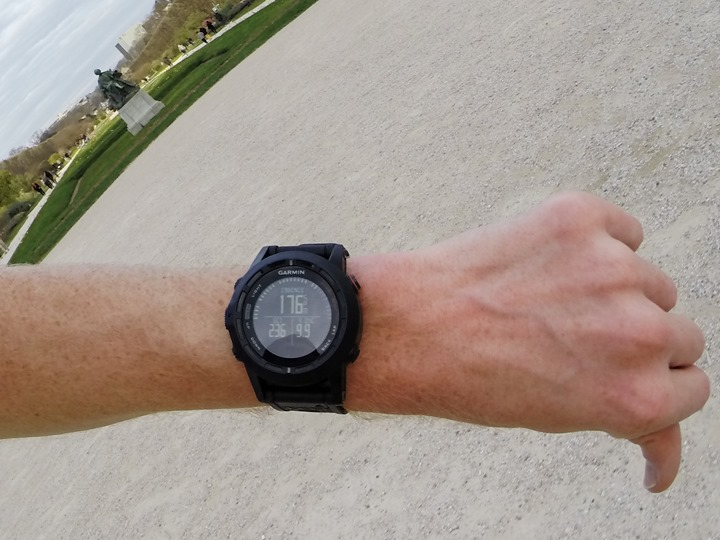
Or this one showing my total run time and distance:
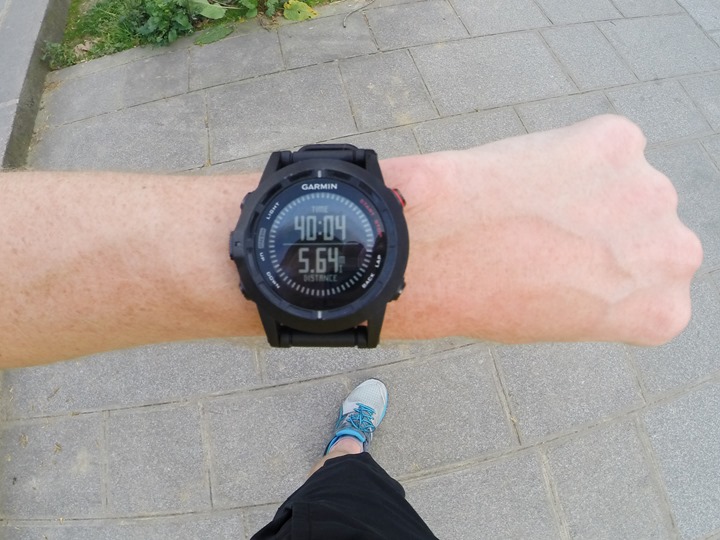
The unit will use GPS when outdoors to track your distance. In the event of a tunnel where GPS signal is lost, the unit will switch to using the internal accelerometer to measure distance and pace, and then upon exiting the tunnel it’ll switch back to GPS.
When you’ve completed your run, simply tap the red button again, which puts the unit into a paused state. At this point a menu is given for you to decide your next step.
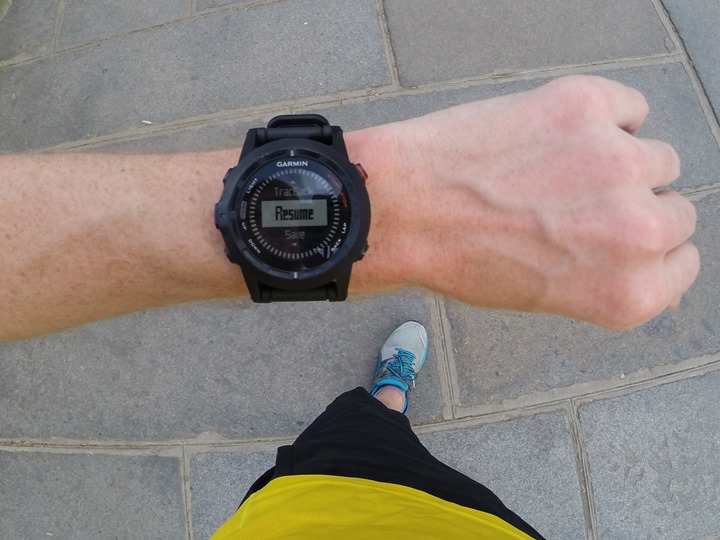
You could resume it (if you plan to start running again), or you can save it. You can also discard it, as well as use the ‘Resume Later’ option, which is my favorite option for long activities.
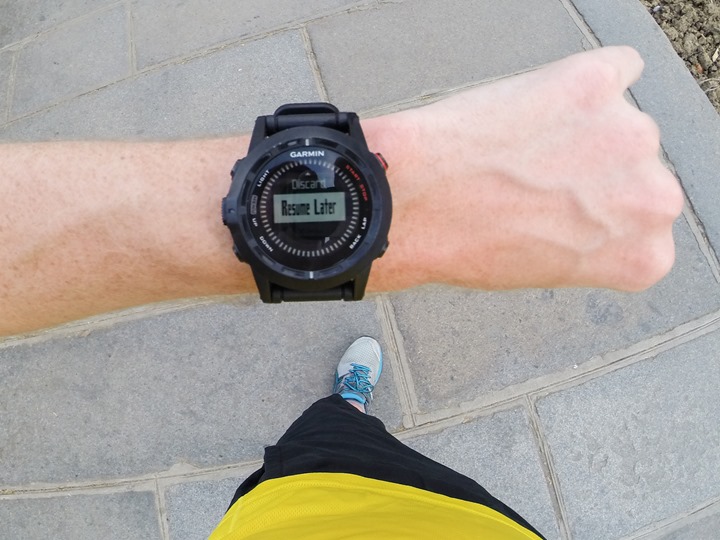
With the resume later option, it’ll turn off the GPS to save battery, but will keep the activity without ending it. This is ideal for multi-day hikes, or places where battery life conservation is critical. Also of note is that if you were to run out of battery, the unit will automatically put the file into the ‘Resume Later’ state. To access it, simply tap the red button and you’ll see the option to resume/save/discard/etc…
Running Features and Functionality
I’m going to run through (no pun intended) a number of features the Fenix2 has. This isn’t really exhaustive, since there are so many smaller features that it’d be hard to include every single item. In general, these features are actually available across most sport profiles, but I’m just putting them in the running section for simplicity’s sake.
Auto Lap: Perhaps my favorite feature, auto lap allows you to automatically create splits based on a predefined distance – such as every 1-mile. I tend to use this on long runs where I’d like to more easily compare splits over the course of the run. On the flip side, I turn it off for interval runs, where I’m manually controlling my splits (or, having the automated interval or workout function do it for me). You cannot specify auto lap based on time, nor by position. It’s distance only, but in either kilometers or miles.
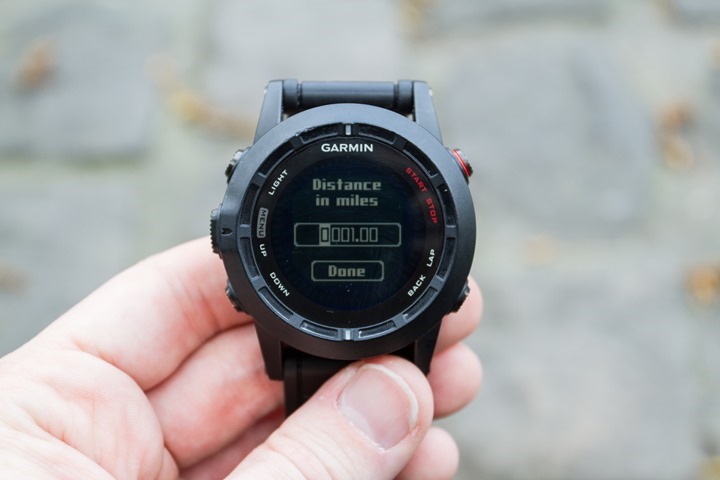
Auto Pause: This is useful for city running where you may stop frequently at stop lights. The unit automatically pauses the recording when you come to a stop, and then will automatically resume it when you start running again. The auto pause on the Fenix2 isn’t configurable, so whether or not the trigger point in pace is right for you might vary. Despite living smack dab in one of the biggest cities in the world, I personally tend not to use it, as I mostly just run a different direction when I hit a stoplight. I don’t much like stopping mid-run, as it simply lengthens the time I’ve gotta wait till I can eat cookies or something.
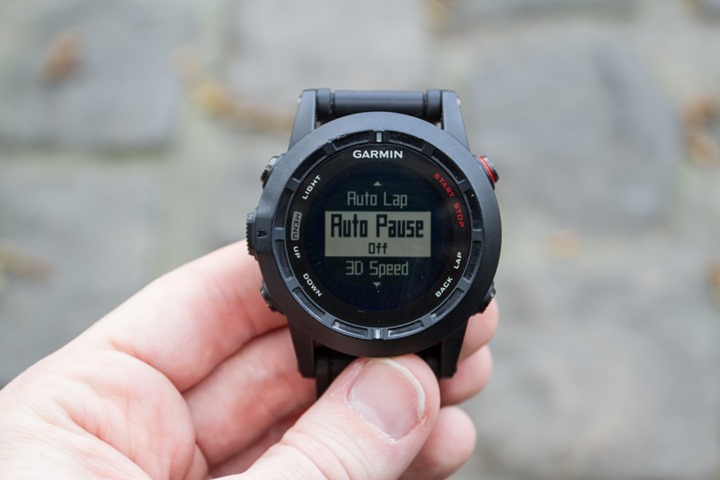
Virtual Partner: Virtual Partner allows you to specify a target pace that in turn acts like a virtual running friend. The Virtual Partner does not stray from the pace (even for hills), so it’s best used for flatter courses. As part of the Virtual Partner feature, the unit will show you how far ahead or behind the Virtual Partner you are – both in distance and in time.
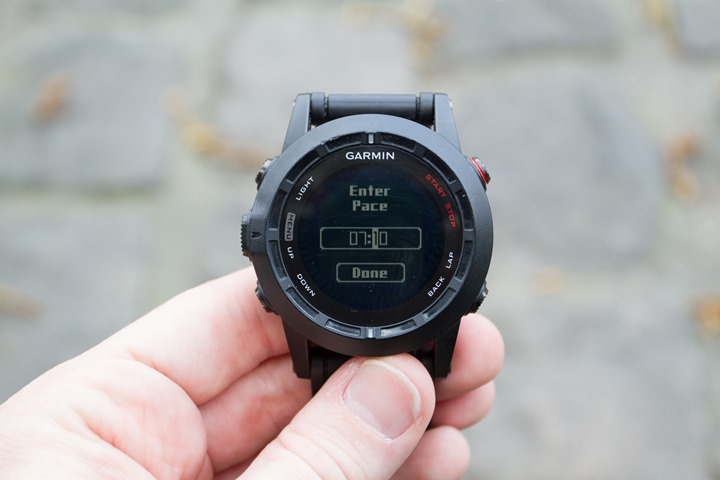
Note that you’ll enable the Virtual Partner through the menus, but you’ll need to also add the Virtual Partner screen as a data page to your sport profile (just as if you were configuring other data fields/pages).
Alerts: Alerts allow you to set high/low thresholds for various events. For example, you can create an alert when you run 10 miles. Or an alert when your heart rate goes above or below a given threshold. Alerts can be defined for proximity, distance, time, elevation, navigational arrival, speed, pace, heart rate, cadence, and battery. While alerts might seem appealing (and they can be in certain scenarios), for most athletic pacing and or training efforts, it’s usually better to use custom workouts (see later section). That’s a much more refined way of doing it, whereas alerts are very basic.
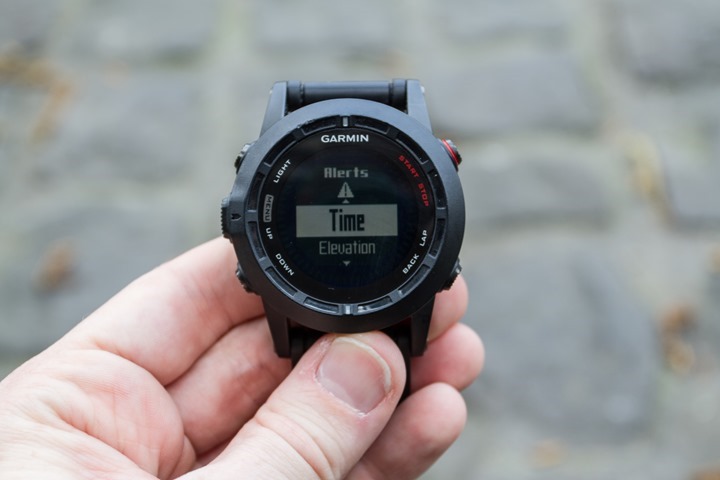
Running Dynamics:
Running Dynamics is Garmin’s term for a number of new metrics that were added to Garmin’s top-tier running watch, the FR620 earlier this fall, and have now found their way to the Fenix2. These metrics attempt to capture various running efficiency data.
There are as of today three specific pieces of information that’s being captured:
Cadence: Total steps per minute – this has previously been available on the footpod, but this brings it internal to the HR strap (and inside the Fenix2 itself).
Vertical Oscillation: This is measuring the ‘bounce’ in a runner’s torso within each step. This is vertical motion, measured in centimeters.
Ground Contact Time: How much time your foot spends touching the ground, measured in milliseconds
Cadence has long been available on Garmin devices with the footpod, but the FR220/FR620 added it to the unit itself, using internal accelerometers. Then, Garmin extended that into the Fenix1 and Tactix watches, and now, it’s also in the Fenix2.
The other two, Vertical Oscillation (VO) and Ground Contact Time (GCT) are new to the FR620 and Fenix2, and not available on other units (nor coming to other units, such as the FR910XT). To see these metrics, you’ll need to ensure the Running Dynamics page is enabled on your Fenix2. This is done via the data pages settings in the running profile. Once that’s done, you’ll see this screen:
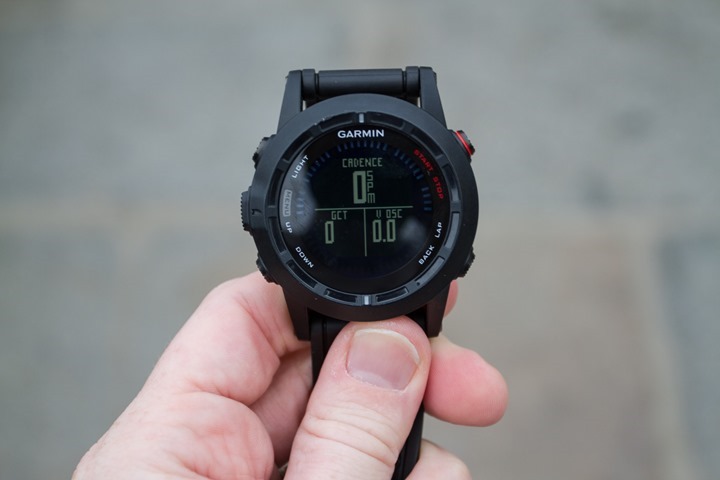
While running, the unit shows values for each of the three running dynamics pieces. Meanwhile, the edge of the screen will turn into a little needle, indicating whether you are at a low/high value for that particular parameter (i.e cadence).
You can change the upper value by holding down the menu button for a second, which allows you to select a different primary value.
This data is then recorded on Garmin Connect for you to analyze later. It is interesting in terms of correlation of fatigue to your values, or the impact of intervals or other varying workouts. For example, here’s a long run:
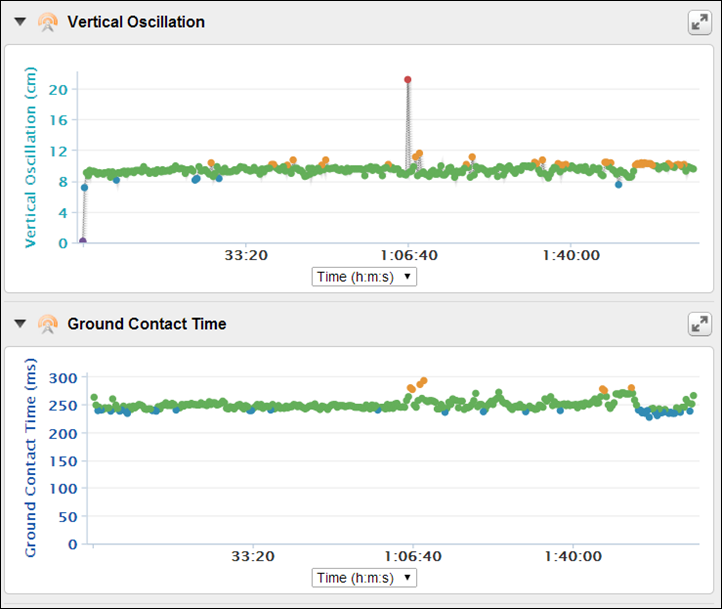
And then here’s an interval workout:
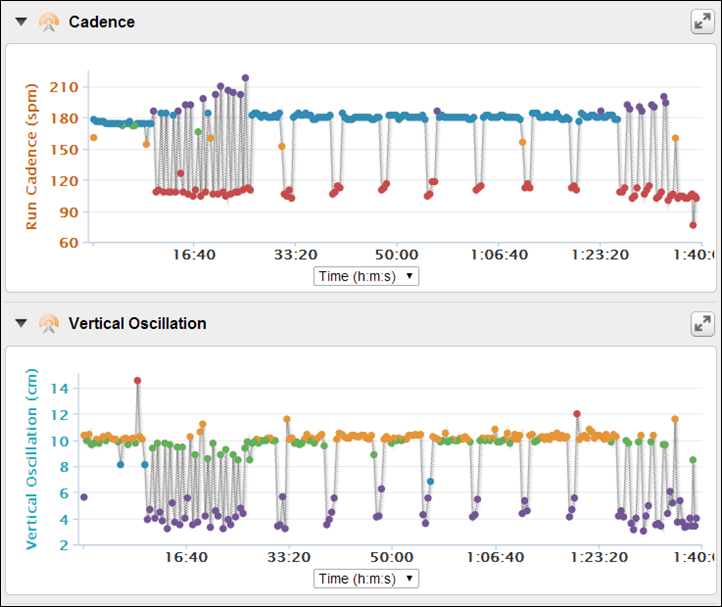
Like many new metrics captured by sports technology devices these days, there remains to be a clear-cut reason on what to do with these metrics (VO/GCT). Sport scientists don’t actually have any hard data or studies to clarify how best to use them. Thus, while it’s ‘geeky-fun’ to look at the data, there isn’t anything clear-cut as far as training guidance that either Garmin or anyone else will tell you to do with these.
Cadence is a bit more clear-cut given it’s been around for years, and there’s plenty of documentation on ideal cadence ranges to get the elastic recoil effect that high performance runners aim for. But when it comes to the other two metrics, VO/GCT, it’s still the wild west a bit. Note, do not confuse VO with VO2, as they are two totally different things. Speaking of which, now’s a great time to discuss VO2Max.
Race Predictor, Recovery Advisor, VO2Max Estimates, and Training Effect:
Like the FR620, the Fenix2 carries with it a number of new training progress functions. These functions aim to give you feedback on rest, recovery, and estimates on where you might find yourself on race day. To start, the quick list:
VO2Max Estimation: This utilizes information from the heart rate strap and heart rate variability (HRV) to determine a VO2Max estimation. This is then displayed following each run.
Race Predictor: Race Predictor uses simple lookup tables to take your VO2Max combined with age/gender and determine ‘best possible’ race times.
Recovery Advisor: Recovery advisor gives you the estimated time until your next hard workout. This counter is always available on the watch to see how much time is left.
Recovery Check: This status is provided about 6-10 minutes into the workout, and tells you how recovered you are from a previous workout.
Training Effect: Training Effect provides a score of a given workout and how impactful that workout was on your body.
All of these metrics depend on the heart rate strap, which is analyzing heart rate variation (HRV) data using algorithms by FirstBeat, a Finnish company that specializes in heart rate and calorie metrics.
The VO2Max piece is likely the piece that fascinates most athletes, primarily due to the ones-upsmanship game that people want to play on who has a higher VO2Max value. Ultimately though, there’s actually little that you can do to influence this number, as it’s largely genetic. And in that same vein, while an untrained person would see immediate and sharp increases in VO2Max over a short period, a well trained athlete won’t. And in fact, the more that athlete trains – the less likely this number is to fluctuate. Effectively, you plateau from a VO2Max standpoint. After all, if you could keep training and increase the number – we’d see everyone with a VO2Max in the 90’s, or beyond. Ultimately there are only a handful of people on this earth anywhere near that.
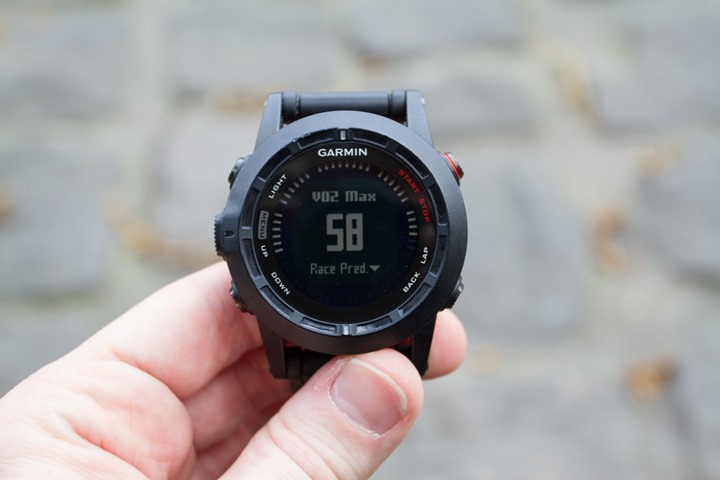
Which isn’t to say that your training or your race results will hit a plateau. As there are many things that impact your race day results. Looking at those results in the next feature – ‘Race Predictor’. This feature does a very simple lookup of your VO2Max estimation and compares it to tables of records of people of the same age and gender, and then gives you the race estimates. In reality, this should really be called “Race Potential”, which would line up with what it really is. It does not take into account any training you’ve done from a mileage standpoint, nor a pace standpoint. It’s purely based on the VO2Max value meshed with data from the Cooper Institute.
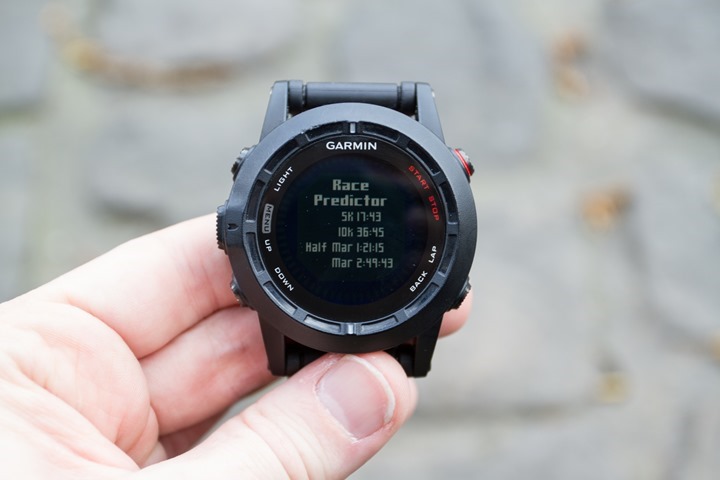
Next we have the ‘Recovery Check’. This check is done about 6-10 minutes into your run, and gives you feedback on how recovered you are, such as ‘Fair’. Ultimately however though, I’ve only ever seen ‘Fair’ or ‘Good’. In part, the challenge here is twofold. First is the science of it. For that, I think in general Garmin/FirstBeat probably have that figured out. The second part is the delicacy of it. Meaning that if you return a message such as ‘Terrible’, people get offended. No really, they do. I had people complain in the FR620 review because of seeing lower status on both the Recovery Check and VO2Max. Personally, I put that in the category of “Life’s not fair”.
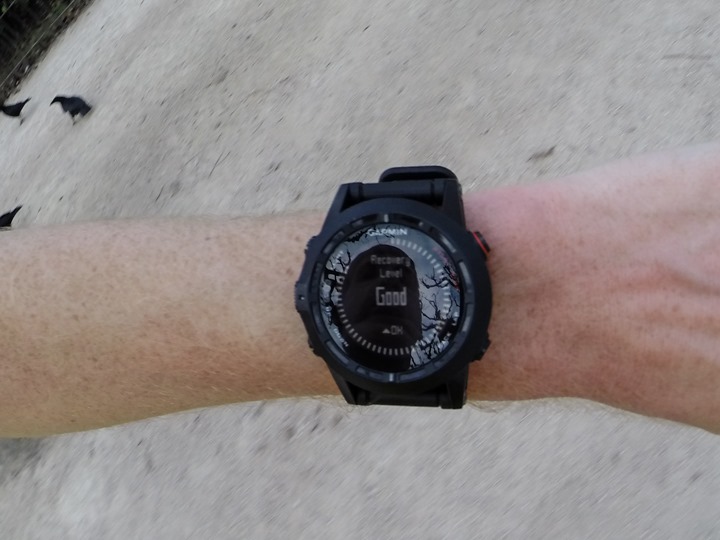
Following along the recovery trail, we’ve got ’Recovery Advisor’. This value is a post-workout value that lets you know how long you should wait until your next hard workout. Now listen triathletes, read the previous sentence again. Which parts did I put in italics (hint: hard workout). Which isn’t to say that you can’t have a bike workout, or a swim workout, or even an easy running workout. It’s simply focusing on running, because that’s the only thing that the Recovery Advisor tracks today. It doesn’t take into account anything else.
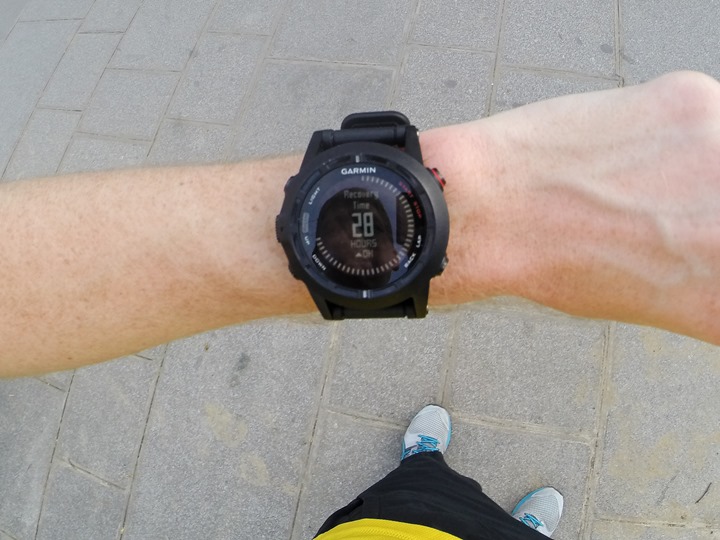
In general, I find that the Recovery Advisor is a bit cautious, but actually not too far off the mark for what my schedule would have in it recovery-wise. Remember that your muscles only get stronger when you allow them recover, not when you workout hard every single day (go ahead, you can Google it).
Finally, we’ve got ‘Training Effect’. Training Effect is designed to give you a rough estimate of how ‘impactful’ that workout was. This helps you to structure an overall workout schedule with varying types of workouts that help to put in place a more cohesive training schedule. You’ll see it listed as TE on your summary screen:
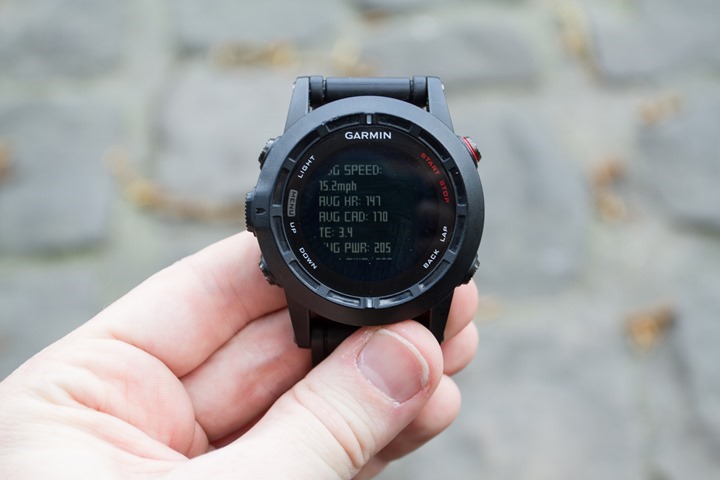
Below, the table of those levels, from the Fenix2 manual. Note that these values take a few runs to calibrate, so don’t freak out if it says your 20-minute easy run was disastrously high.
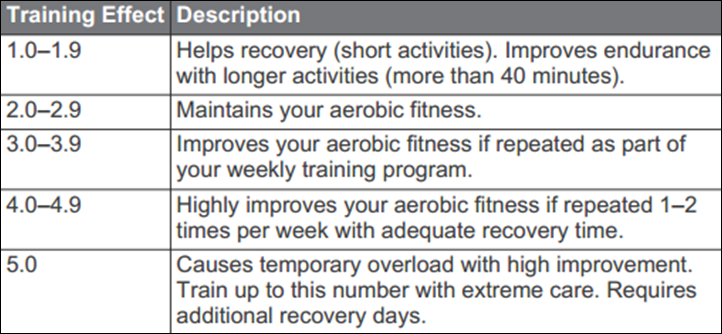
Now, as I alluded to above – all of these features are run-specific, except training effect. They aren’t included on any of the other sports profiles at this time – just like the FR620. So keep that in mind from a training standpoint. If you run 20 miles on Saturday, then go ride 112 miles on Sunday plus a swim in there somewhere, by time you get to Sunday evening, the unit is really only aware of the 20-mile run from a recovery standpoint.
Treadmill Usage:
Finally, the Fenix2 supports the ability to run indoors on a treadmill – either with or without a footpod. In the case of without a footpod the unit will use its internal accelerometer to determine pace and cadence. It does this by ‘learning’ your pace and cadence while outdoors on GPS runs. It does this over time, across different pace ranges. So it’s not a one size fits all approach. Nor should you immediately open your Fenix box and go straight to a treadmill and expect accurate data. The more miles you have outside, the better.
Thus, in order to really put it through its paces, I’ve been running for weeks outdoor across pace ranges from 4:30/mile up to about 10:00/mile (+ some at walking paces). Hundreds of miles worth of data. In order to keep things as consistent as possible, I was the only one who wore the watch, and I always wore it on the same wrist. Thus, in theory, it’d be the most perfect data set possible.
So this week while in Mexico City I hit up the treadmill at the gym to test things out. Like most of my treadmill tests, I find a simple pace ladder or pyramid the most effective way to test accuracy. And thus, the results:
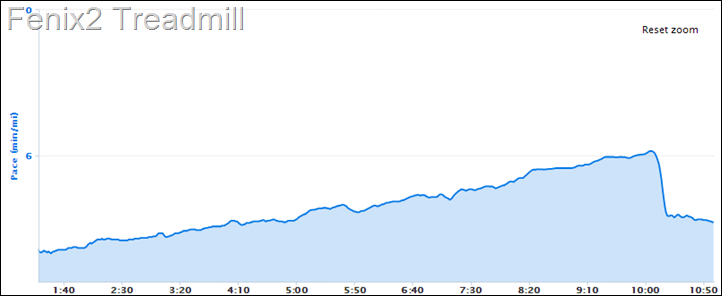
Looking at the paces, I had done a ladder starting at 5:30/KM (~8:50/mile), and going down to 3:30/KM (~5:40/mile) every 60 seconds, in 15-second/KM increments.
Above, is the Fenix2 pace using the internal accelerometer, and below with a standard footpod. In this case, you can see my increases in pace each minute (below), whereas above it’s a bit muddled. It appears there’s some smoothing added, likely to filter out things like touching the treadmill. I actually consider this a good thing, so I’m not complaining too much there.
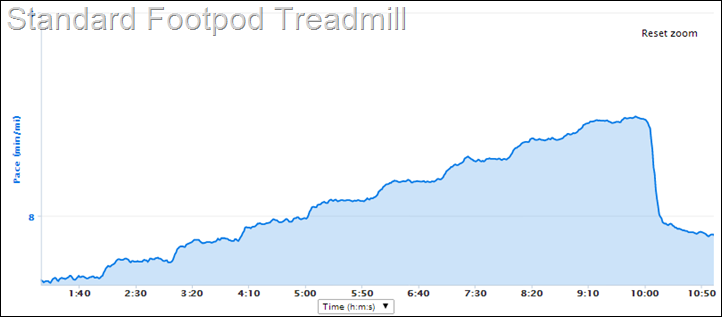
The paces tracked very well in my ‘primary’ running zone (of about 6:30-7:30/mile), and tracked ‘fairly well’ outside of that, perhaps 5% off at the high/low end. In this case, the Fenix2 internal pace seemed to top off at around 5:55/mile, so a bit off, but again, in the ballpark.
This is a vast improvement over what I’ve seen both in other Garmin products (FR620 at release) as well as even earlier versions of the Fenix on a treadmill. In talking with them, they’ve spent a fair bit of time in this area. The data looks rather clean. It’s notable that while I didn’t do much with my left arm (where the unit was) as far as touching the treadmill, I did occasionally wipe sweat off without any impact to pace. Also of note was that for this test I actually did NOT wear the HRM-RUN strap, so everything was inbox.
Ultimately, for pace on a treadmill, I’d give the unit a “B+” rating currently. It’s not perfect, and does require a bit of outside running to fill in the pace tables for calibration, but it’s pretty close. And quite a bit better than what I’ve seen previously, which I would have given more of a “D” rating.
Now, the next piece is cadence. I had a look at this a few times recently with the Garmin FR220 and FR620, both of which can measure cadence internally. With the Fenix2, like the FR620, it comes from one of three sources: The internal accelerometer in the watch, the accelerometer in the HRM-RUN, and a separate ANT+ footpod.
Each measurement place has minor pros and cons to it. For example, on your wrist you’ll be prone to see small drops/spikes when you take a sip from a water bottle, or when you change the treadmill’s speed, as you’re impacting the motion detection there.
In my case, I’ve done a lot of comparison of data – and ultimately for cadence I see all three methods producing near identical results. As I noted, the only variation I see is in a scenario without the HRM-RUN using just the internal accelerometer and doing something with your arms that impedes measurement. But given that’s likely only a brief moment compared to your entire run, I’d really look to skip the footpod if your focus is cadence.
Swimming:
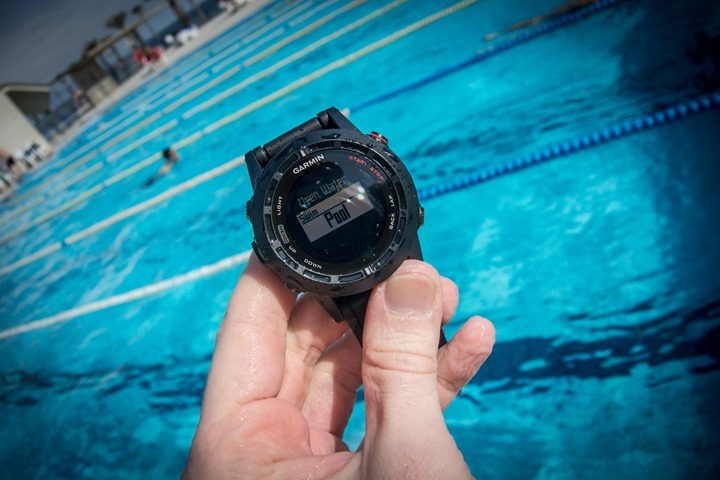
Probably the most significant addition to the Fenix2 is its ability to support swim tracking – both in a pool as well as in openwater. The unit utilizes much of the same functionality as found within the Garmin FR910XT for swim tracking. To enable swim mode, you’ll press the red button and go to Swim. At which point, you’ll choose either Openwater or Pool.
Pool Usage:
Pool should be any pool, be it indoors or outdoors. When in pool mode the unit uses internal accelerometers (not GPS) to determine your stroke and distance information. It does this by knowing the pool length, and then measures each time you push off the wall at either end of the pool. As such, inputting in the correct pool size is critical, which is why it’s the next question the unit will ask you:
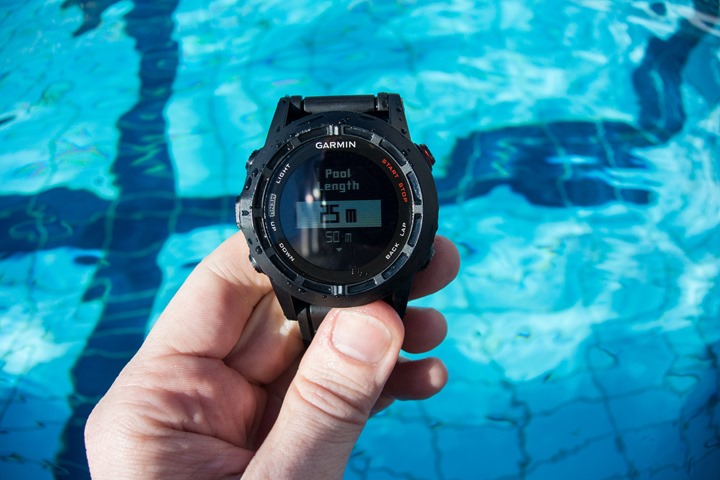
The Fenix2 offers a few common pool sizes – like 25y/m, and 50m. But it also allows you to create custom sizes. Within this menu you can select any size between 18M/20Y and 150Y/M.
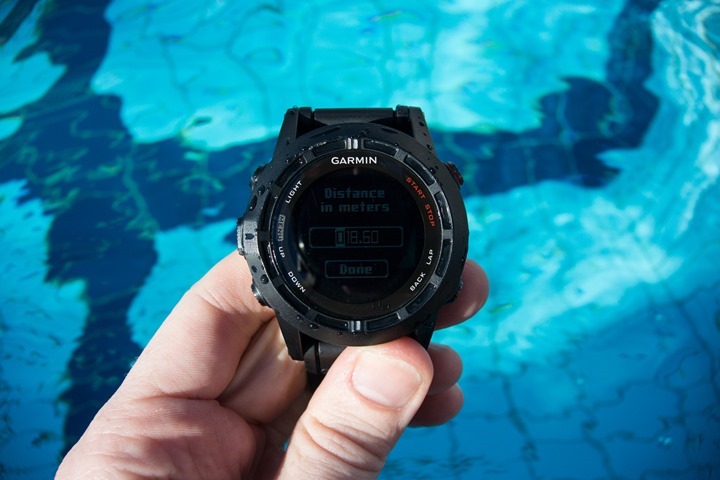
With that set, it’s into the pool we go. You’ll press the red button to start tracking. Because the unit is using accelerometers, it’s important to keep activities strictly swim-focused while the unit is recording. For example, if you stray to flirt with the life guards, pause the unit. Especially if there’s a lot of arm flailing going on. Same for jumping out and making a quick escape to the bathroom.
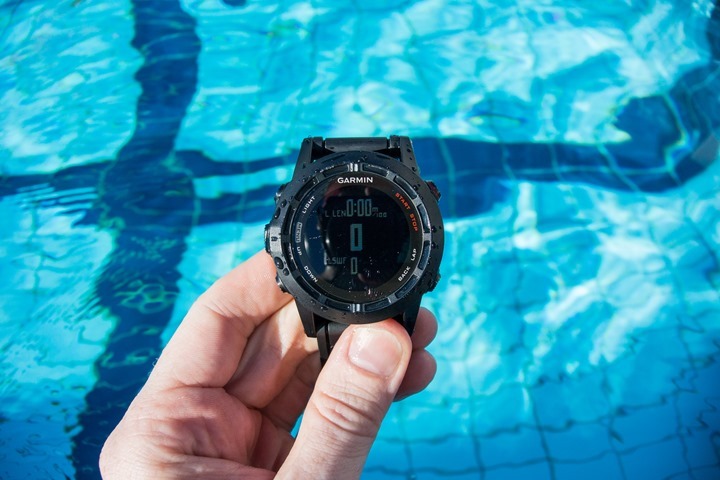
The unit has a number of swim related metrics it can display (see full listing in ‘Data Fields’ section later). The core one most folks tend to use is swim pace, which is typically given in time: 100y or 100m depending on the pool length. For example, you might have a pace of 1:30/100y.
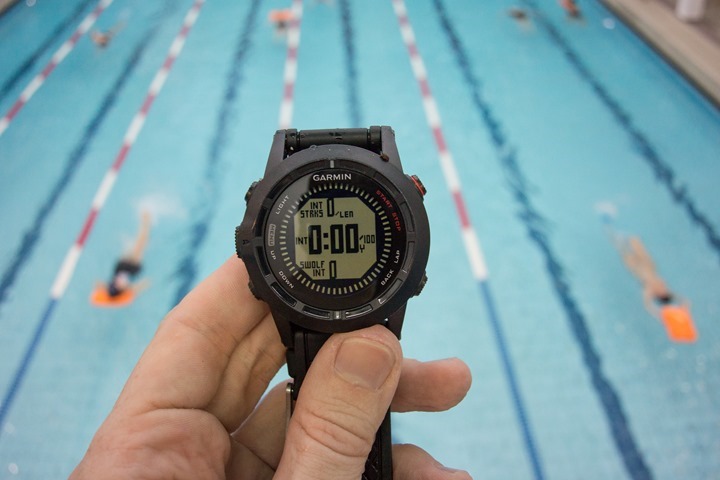
In addition, the unit will track lengths (or straight distance, if you prefer), as well as time and splits. In this case, a ‘lap’ is really more like an interval, as it’s the time since you last pressed the button ‘Lap’.
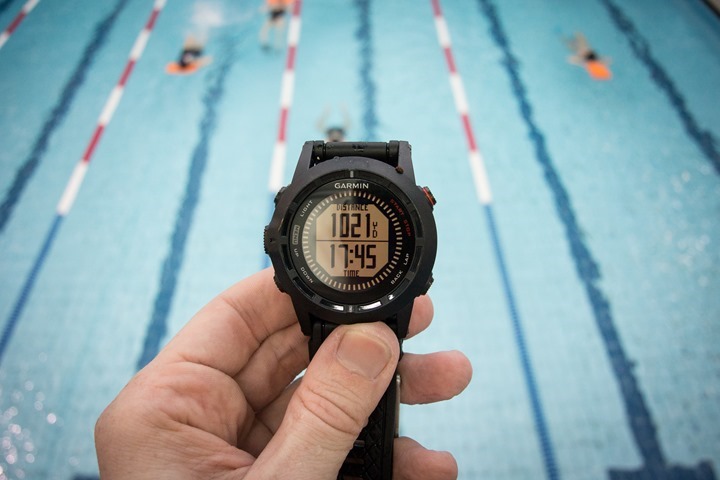
You can create these laps to separate out different chunks of the workout. For example, I would create a split/lap for my warm-up, and then another one for each segment of the workout (such as 10×100). The lap button is used when you want to enter a rest break. This will automatically create a rest on the unit visible later on Garmin Connect between the intervals:

When on Garmin Connect, the unit will show your different sets, including paces for each one. You can dive down into per-length splits if you want as well. It’ll also attempt to identify the stroke. In my case, I keep my stroke attempts to purely freestyle, so I can’t really comment on the accuracy of other stroke types.
Garmin Connect (as well as the unit) will also show metrics like SWOLF, which is literally derived from SWIM + GOLF, and assigns a score to the number of stokes for each length. In my case, my pool is a bit messed up (dozen plus people per lane), so my SWOLF scores vary quite a bit depending on how many backstrokers I get stuck behind on any given length.
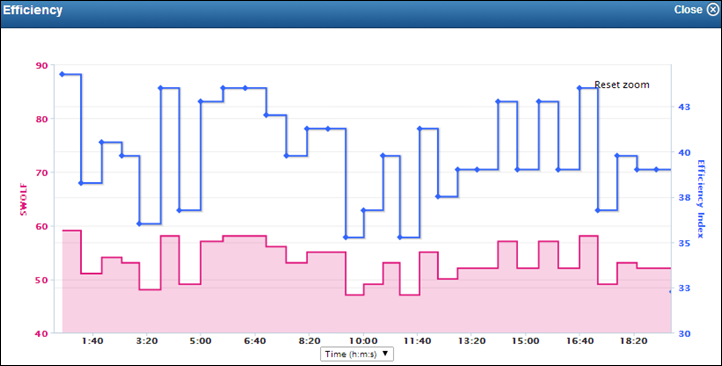
Ultimately though I’m able to very easily and accurately track swimming with near 100% accuracy across many workouts. The most important tip I can give on getting accurate results is to remember that everything the watch measures is based on motion. Thus, making a crisp and firm push-off the wall each length is important (you can do either flip or open turns, it tracks both fine). Additionally, stopping mid-length in the pool will confuse it. Try and avoid that (seriously, people have e-mailed in to complain that other units don’t track their mid-pool stops).
Now, since my initial post exactly 30 days ago on the Fenix2, there’s been a lot of feedback around adding in the FR910XT’s ‘Swim Alerts’ (which enable alerts on things like time or distance while swimming), as well as adding in the Garmin Swim’s ‘Drill mode’. I’m happy to report that the Fenix team has heard your feedback, and both will indeed be coming to the Fenix2. Here’s a shot on a recent beta firmware showing the Swim Alert piece just starting to be coded in:
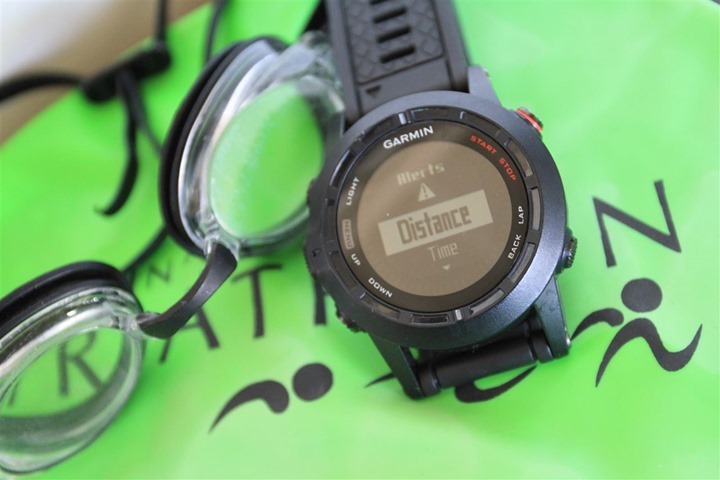
Finally, note that no Garmin watches support the creation of pre-defined workouts for swimming on Garmin Connect. Meaning unlike running or cycling, you can’t create a workout on Garmin Connect and then transfer it to your unit to iterate through.
Openwater Usage:
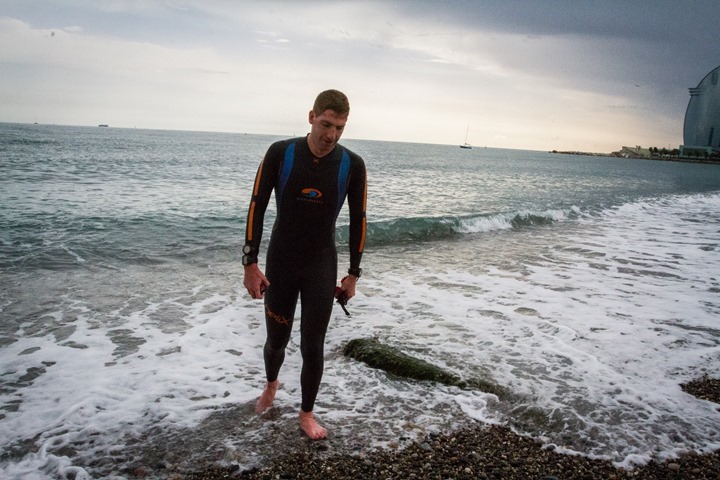
Next, is openwater swimming (OWS). This mode is for any outdoor body of water that’s not a pool. For example, the ocean, a lake, or a river. Generally speaking, the body of water should be non-frozen for a successful swim.
In this mode, the unit uses both the GPS as well as the accelerometer. It uses the GPS portion to track distance, and uses the accelerometer to track stroke information. It merges the two together for certain data fields. In an openwater swim scenario, the GPS is constantly losing GPS signal each stroke (as it goes underwater) and then trying to regain it each stroke (above the water). As such, the unit gets rather messy data to work with. Data that might be off +/- 3-meters or 100-meters. So instead of giving you a precise path, it gives more of an estimation.
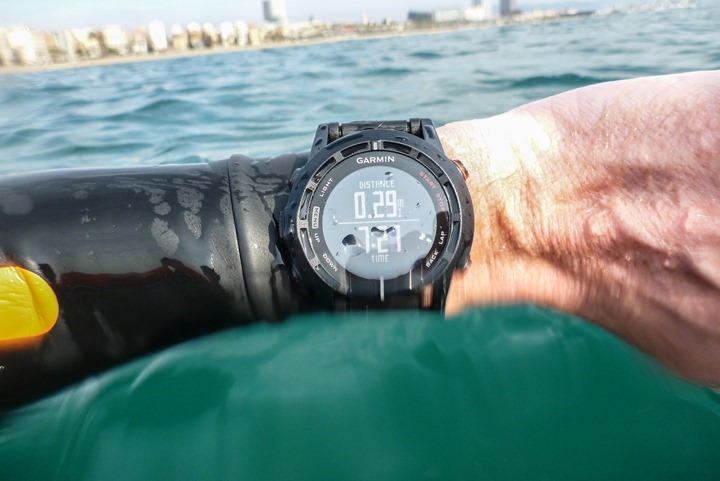
It looks at the general splatter of the direction of points and attempts to determine where you’re going and the distance associated with it.
While doing so, it’ll give you details such as pace and stroke rate as well as time and other common distance fields. You can create laps if you’d like (such as at a buoy or turning point).
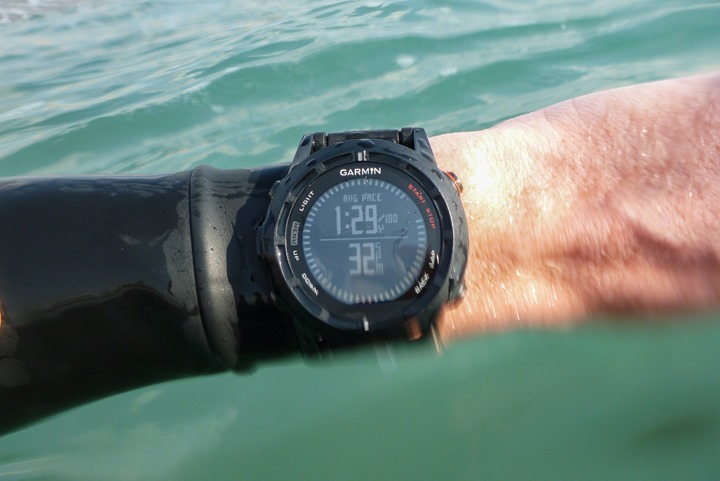
Because it’s still sorta winter in Europe, my time with openwater swim mode has been slightly limited. I’ve had a couple of swims with the unit, but the most recent one has been a few weeks back in firmware. Thus my testing is limited, and I’ve been told the algorithms have been further refined since then.

Still, the results were generally positive. For my tests I wore four units. I used a Garmin FR910XT, Suunto Ambit 2, and then the Fenix2. I then added a Garmin FR620 as a ‘reference’ distance onto a little swim buoy floating behind me. This keeps the unit above the water at all times and records a perfect track of where I actually went to compare against the units on my wrist.
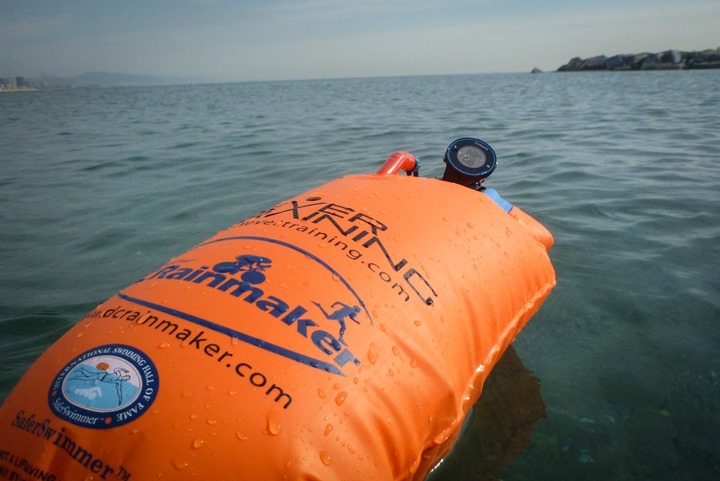
Below, you can see the results of this:
Suunto Ambit2: .52mi
Garmin Fenix2: .68mi
Garmin FR910XT: .62mi
Garmin FR620 (REFERENCE): .58mi
Overall, the results are roughly about what I’d expect (sorry, it’s fuzzy, it looked much clearer in the camera lens when I came out of the water).
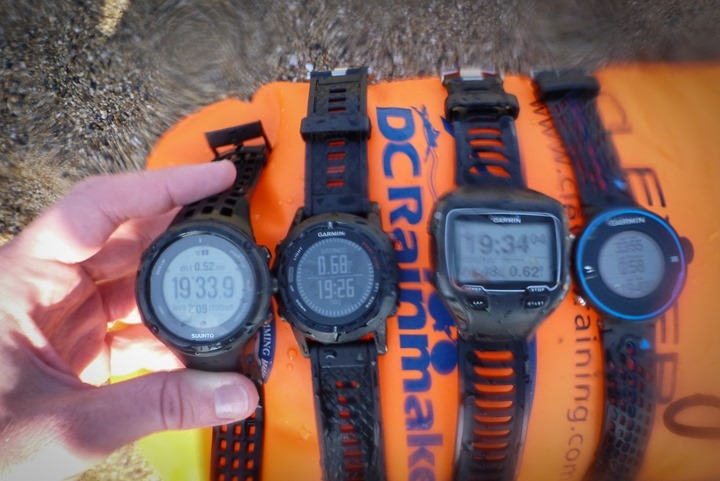
In general, I look for about 10% error rate with openwater swim units, though at shorter distances it’s harder to assign a number as it usually starts to get closer the more you swim. Sometimes it’s spot-on scary, but sometimes it’s a bit further away. Thus, if using the unit on your wrist and then doing a race, don’t be upset when the distance don’t match. In all likelihood, the swim course wasn’t measured correctly…and your unit didn’t measure it correctly on top of that. It’s actually quite rare for most non-Ironman triathlon swim courses to be accurate.
When it comes to data afterwards on Garmin Connect, you’ll get maps of where you went (which are smoothed), as well as some basic information like stroke rate and distance/pace:
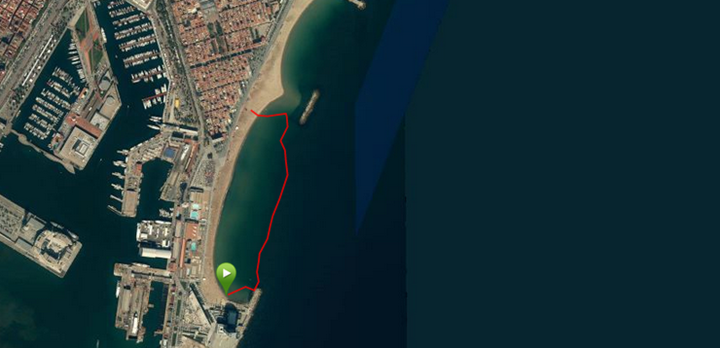
One strength of the Fenix unit is the much strengthened wrist strap. I’ve often stated that I’d be hesitant to use some devices on the market in the swim start of a triathlon due to the band being somewhat fragile. And ultimately, people have lost other units to the bottom due to such. In the case of the Fenix2 however, I’d be reasonably impressed if you could snap it off. The pins are beastly, and screwed in from both directions. I think it would basically take getting run over by a boat to pull it off. I suppose we’ll see by the end of the summer.
Cycling:
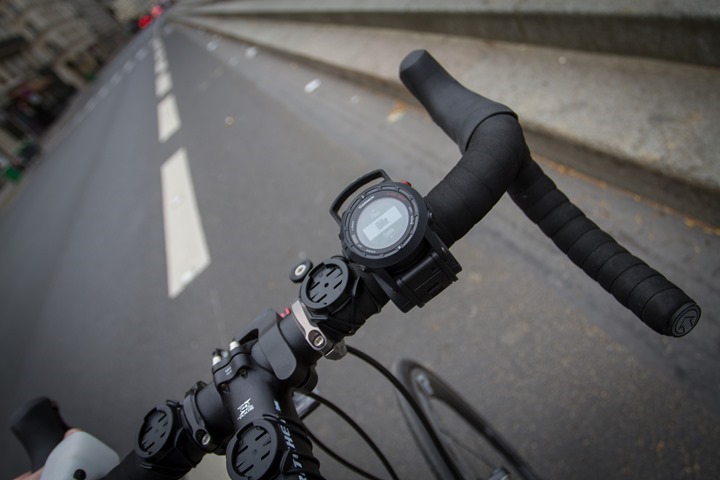
The Fenix2 greatly extends the Fenix/Tactx cycling support, primarily in the area of power meter capabilities. As part of adding full triathlon support, the cycling mode was further beefed up to include full ANT+ power meter compatibility, including the support of the latest left/right and related metrics for power meters from Garmin, ROTOR and others.
From a logistical standpoint, you can wear the Fenix2 either on your wrist, or on a bike mount for your bar. Garmin sells a simple rubber one for $9 that fits the bill. You can find a similar ones branded by other companies that all basically do the same thing. For triathlon bikes, you can use a solution like the profile designs one seen here, or, some of the newer Barfly options (Universal Mount).
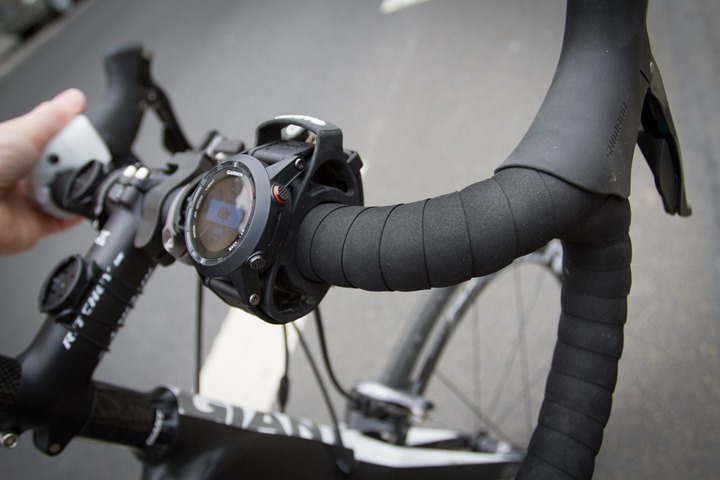
When it comes to sensors, you can pair any ANT+ speed/cadence sensor, including both speed-only and cadence-only (as well as speed/cadence combo sensors). This is done through the sensors menu:
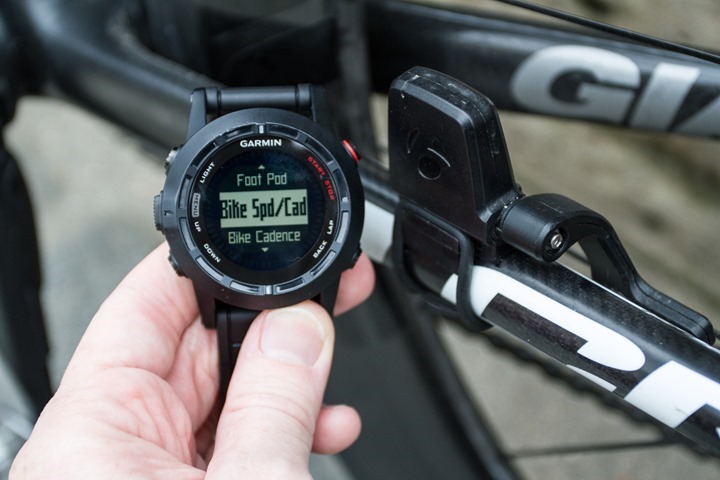
It’s in this area they you’ll define wheel size for usage either indoors or outdoors. You’ll also see an option as to when to utilize the speed/cadence sensor. This is somewhat interesting as this option isn’t found on most of the other Garmin cycling devices.
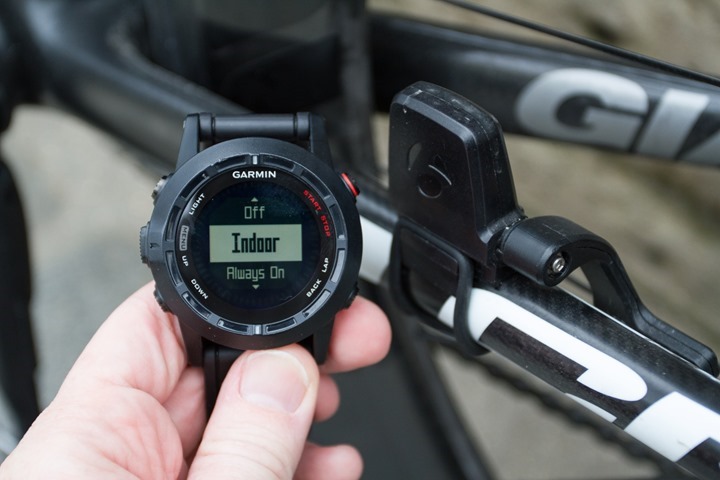
When it comes to power meter support, you can pair your ANT+ power via the sensors menu.
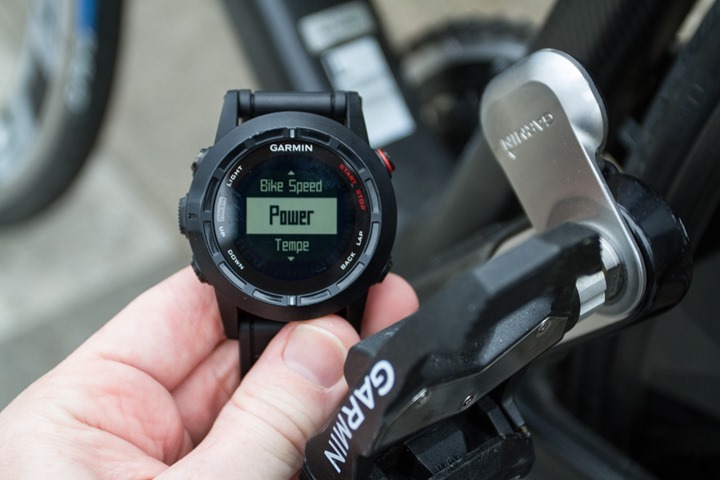
In doing so, you’ll also be able to set options including crank length (critical for Garmin Vector):
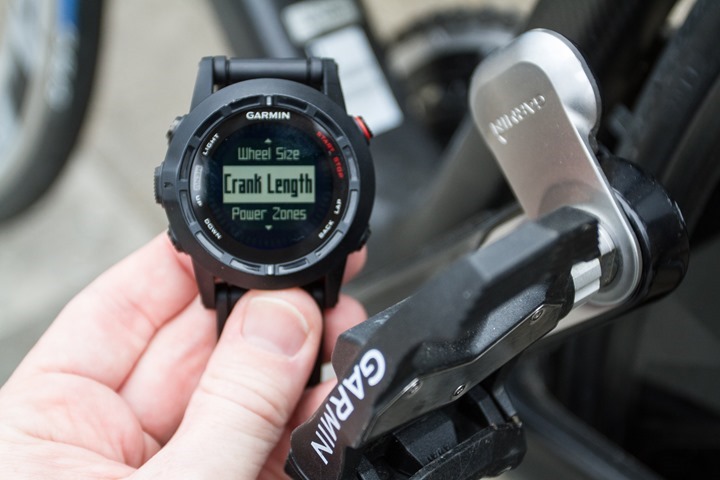
You can trigger calibration (zero offset) via this menu sub-area as well.
Within the power meter section you’ve also got the option to setup your power zones, as well as your FTP (Functional Threshold Power). Setting the FTP on the device is critical to getting the same Training Peaks values on the device as you’ll get on Garmin Connect and Training Peaks. For example, if I set my device to an FTP of 315w, but then I set Garmin Connect to 275w, I’ll see differences when I upload.
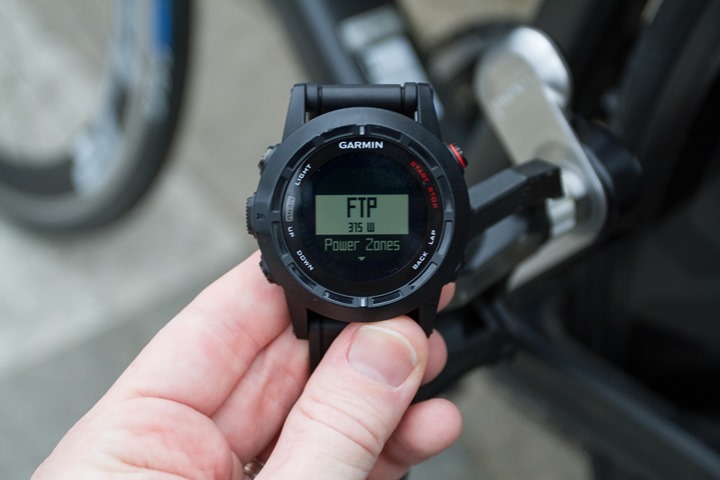
Speaking of which, the unit supports all of the power-meter driven Training Peaks values of TSS/NP/IF (Training Stress Score, Normalized Power, Intensity Factor):
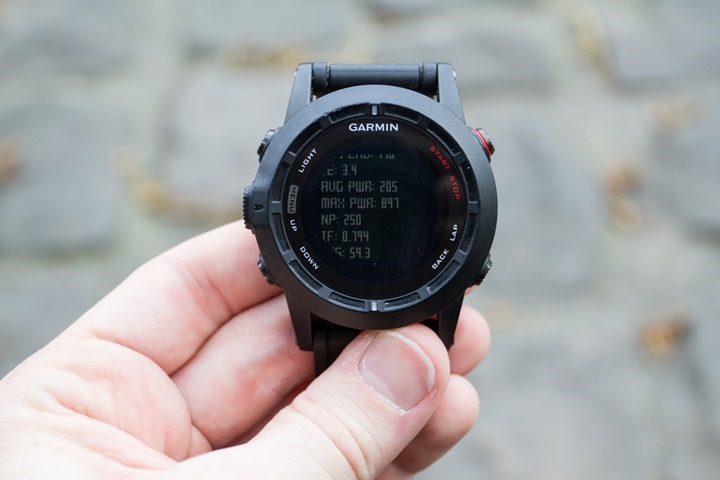
When it comes to on-bike display, the unit allows you to select up to four fields to display concurrently on a single page. And just about as many pages as you’d like.
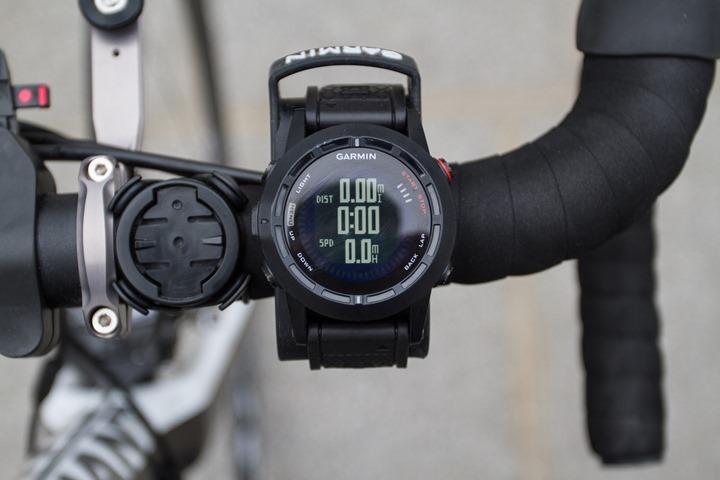
I cover all these later on in the ‘Data Fields’ section. These data fields include the left/right power meters:
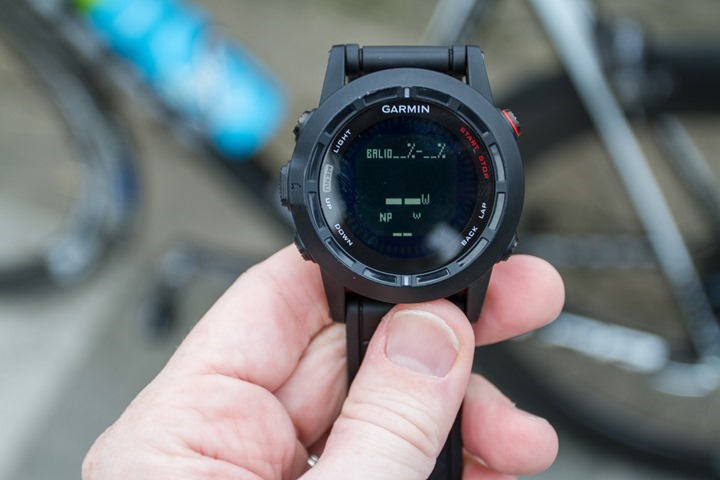
Indoors on a trainer, you can go into indoor mode for cycling, and thus disable the GPS and get speed/distance data from an ANT+ speed/cadence sensor:
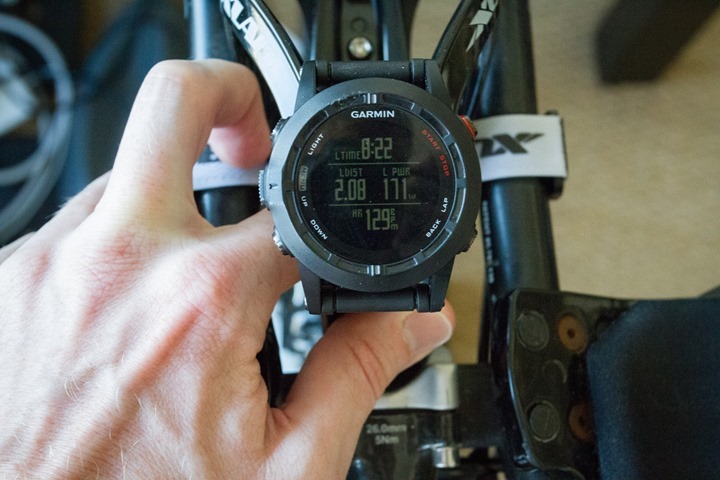
Afterwards, on Garmin Connect, your data is available for you to view. Or, you can take the .FIT file and upload it to any 3rd party site – such as Strava, Training Peaks, or Sport Tracks.
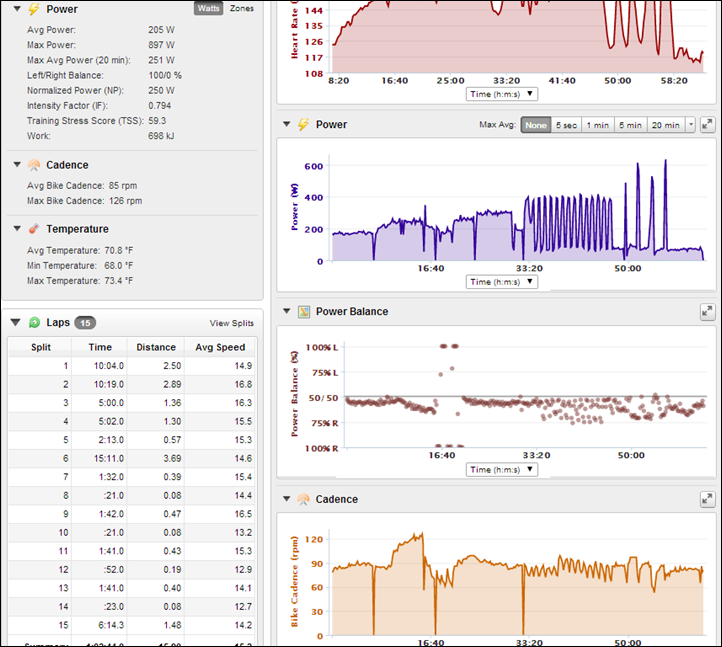
Finally, it should be noted that the singular omission from the Fenix2 is the lack of bike profiles. Meaning, you can’t have a road bike and a triathlon bike. You’d have to re-pair the sensors for each one individually. And unfortunately, there isn’t any mechanism to manually enter in the ANT+ ID’s like other Garmin Edge/Forerunner units. So you’ll have to ensure no other cyclists are around when you make the switch and re-search for sensors.
Multisport Mode:
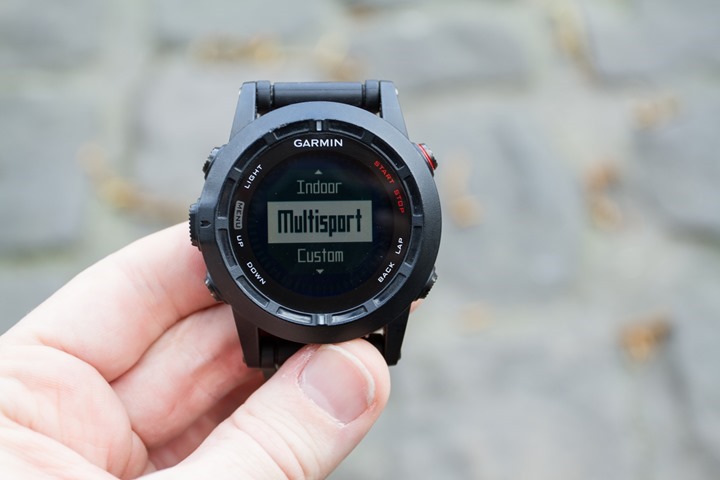
The core differentiator when it comes to a ‘multisport watch’ and a watch that happens to do multiple sports is the ability to have a multisport mode. This is essentially a fancy term for ‘triathlon mode’, without making the duathletes feel insulted. What it means though is that in a race (or training) you can seamlessly transition from Swim to Bike to Run (or, back to Swim) – all as a single cohesive activity.
The Fenix2, like the Garmin FR910XT/FR310XT/FR305, contains a multisport mode. Within this mode you can take any of the different sport profiles (or your custom profiles) and mash together a multisport event. Note however that at this time you cannot add a pool swim to multisport mode.
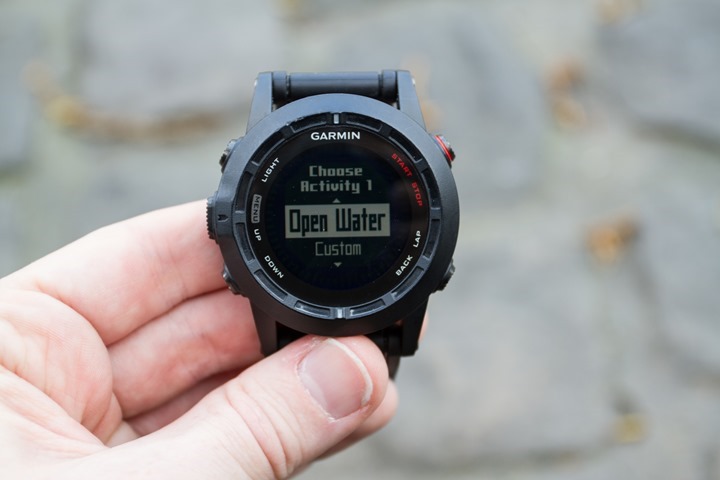
For example, the traditional swim/bike/run threesome:
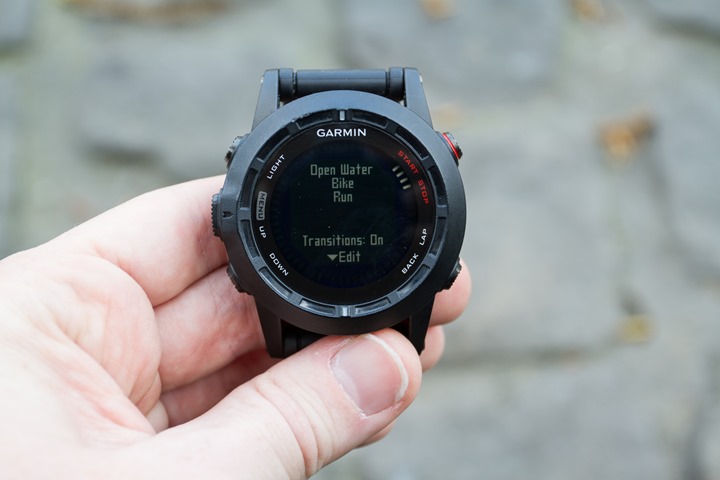
When in multisport mode, if you switch from swim to bike, then all your normal bike pages are displayed. And then the same when you go from bike to run, then showing all your run pages.
You can specify whether or not to include transition times in this. Note that as it stands today, upon uploading to Garmin Connect each of the sports are broken out individually into separate activities.
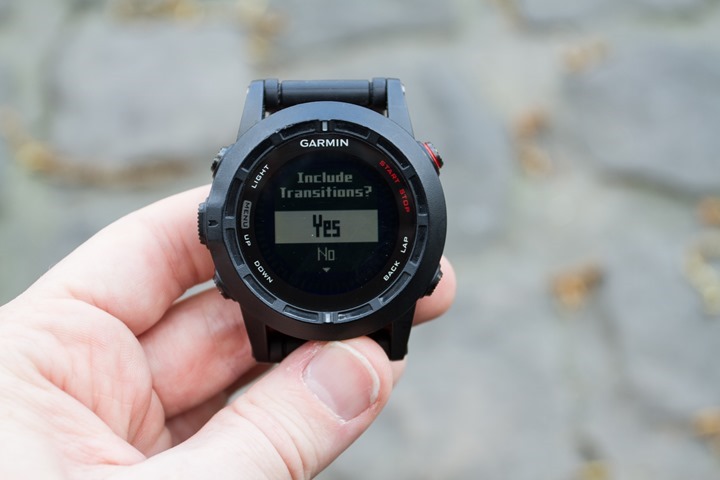
So the real benefit of using multisport mode is the quick transitions from sport to sport, and that it’ll show total time (such as in a race) from the first sport leg until that point.
Battery Life:
Of course, for many endurance athletes, the next question that follows is what does battery life look like. The unit supports multiple battery modes. At one end you’ve got 1-second recording with constant GPS on. This is the mode that most athletes will want to be in, as it updates most frequently (every second). This is especially true of anyone using a power meter, where 1-second data is critical for accurate analysis.
In 1-second mode (with GPS on and ANT+ sensors enabled), Garmin states about 16 hours with “good satellite reception”.
I’ve done two tests thus far that pushes the battery boundaries. For both tests, I use the ANT+ simulator to simulate sensors being used. In this case, I went with the ANT+ HR strap, but there’s no difference in battery consumption between one and multiple ANT+ sensors, it’s all the same. Next, I completed two scenarios with the watch. For the first, I placed the GPS inside, where I’ve got a GPS repeater hooked up outside a window. It’s not super-great satellite, but it does the trick.
For this first test, I hit just over 15hrs of battery life (15:07:40). The fact that I had less than ideal GPS coverage no doubt reduced my total time. The unit automatically went into standby at 13% of battery. The activity was saved, and I was able to resume it upon adding more battery.
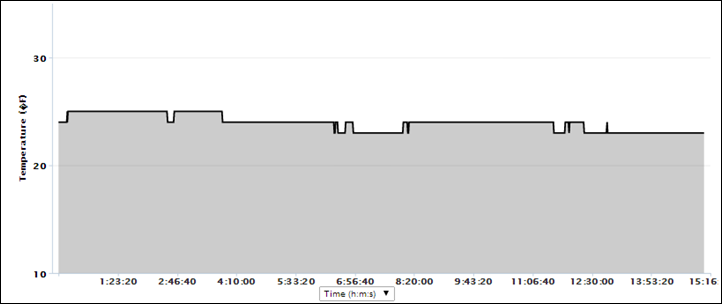
For the second test, I put the GPS on top of my roof, and then connected a lanyard to it, as I was somewhat concerned the pigeons wouldn’t take it (seriously, these pigeons are vicious). I changed though from using a HR simulator to the Tempe ANT+ accessory. The reason for this was I was having some minor difficulties in ensuring clean ANT+ signal on the roof the entire time, which would adversely impact battery life. I validated with Garmin that the battery burn profile between the Tempe ANT+ accessory (which I could leave next to the unit) and an ANT+ HR strap is identical from the Fenix2 standpoint.
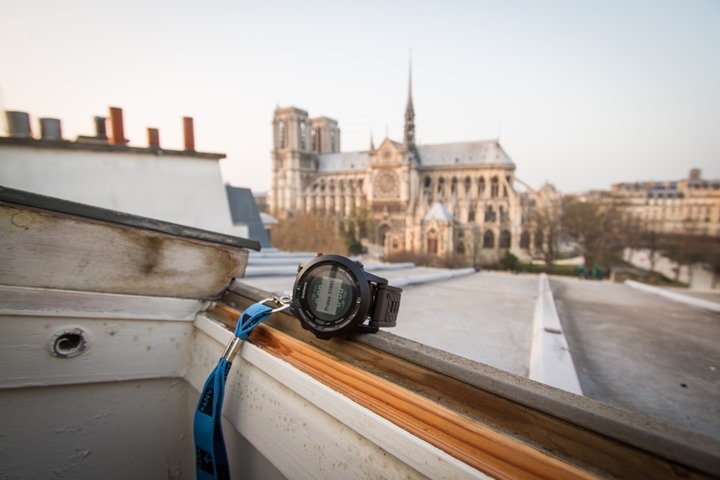
For this test, I just left it up there all night long, and the battery lasted about the same – 15:00:10. The unit automatically went into standby at 13% of battery. The activity was saved, and I was able to resume it upon adding more battery. For those curious, you’ll see a tiny shift in elevation as the pressure changes. In my case – about 5ft in total.

So both of those modes are likely suitable for the vast majority of iron-distance athletes. If you need to increase battery-life for an Ironman to cover the maximum allotted time of 17hrs, you could reduce the GPS sampling rate for one of the sports. I’d recommend lowering the rate for running, since the reality is that you’re walking the run if you’re finishing in 17-hours (simple math makes this a fact), and thus, it’s of less importance to have 100% up to the second data. Though, you’d be losing any heart rate sensor data – since that isn’t enabled in UltraTrac mode.
Next, there’s the ultra-long battery mode, which gets the unit up to 55 hours of recording time. In this mode, the unit samples GPS every 60-seconds. This means that it only gets a GPS fix every minute, and records it then. As such, this is not really ideal for running events, but is generally perfectly suitable for walking/hiking events.
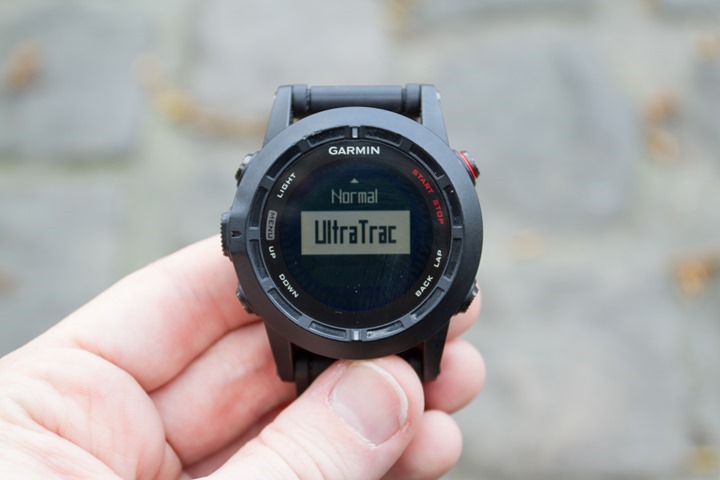
To understand why this is the case, I’ve gone out and wore two Fenix units. One with 60-second sampling, and one with 1-second sampling. Then, I simply did a quick wander around the neighborhood and some of the curved little streets. Here’s the results:
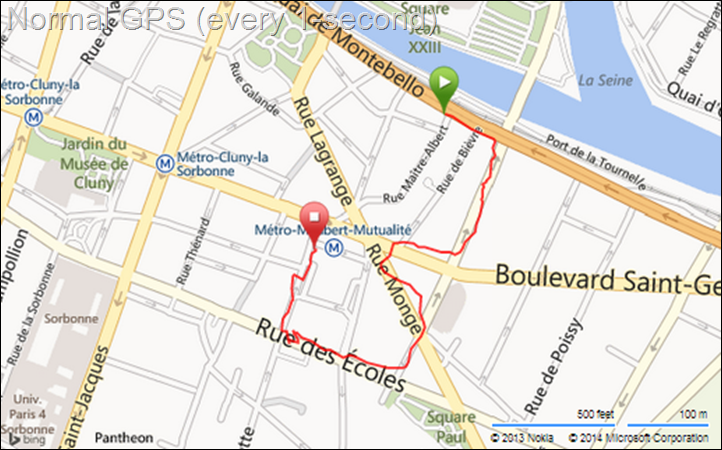
Above, is normal GPS mode, which samples every second. Whereas below is UltraTrac mode, which samples every 60-seconds on GPS by default. Note this has nothing to do with recording rates. It’s purely how often the GPS is enabled/polled. You can configure UltraTrac for any polling interval you’d like – such as 20s, but how that impacts battery life isn’t fully clear. However, be clear that in UltraTrac mode sensors are not enabled – so there is no ANT+ data.
In the normal mode above you can see my wanderings around the streets (and people/cars/busses). However, below, you only see it picking up points every minute, cutting off entire sections of the route. As a result, the distance was substantially less as well (.42mi vs .55mi).
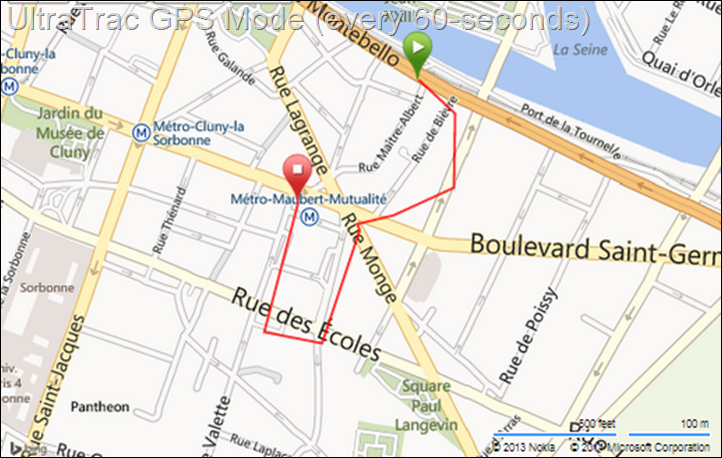
Finally, for those who really need even more battery – you can combine the Fenix2 with a portable battery charger, or solar charger. This works with any device that simply provides a charge (but not a computer, which switches the modes).
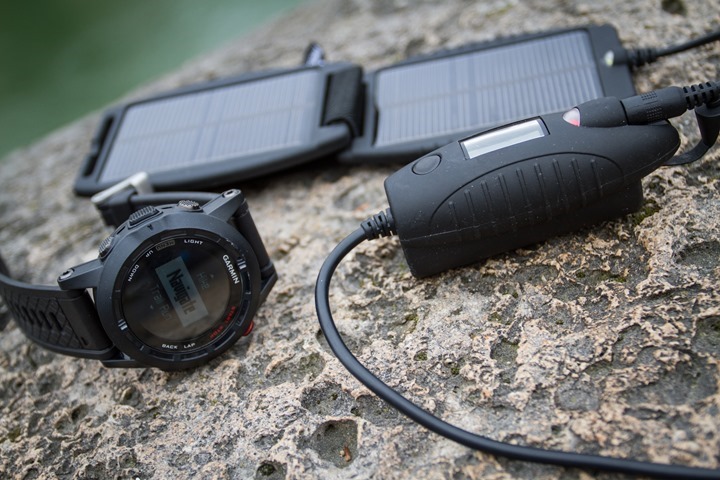
I’ve used both the little USB portable battery pack seen above, as well as the solar chargers sold by Garmin (made by PowerMonkey) at the end of the review.
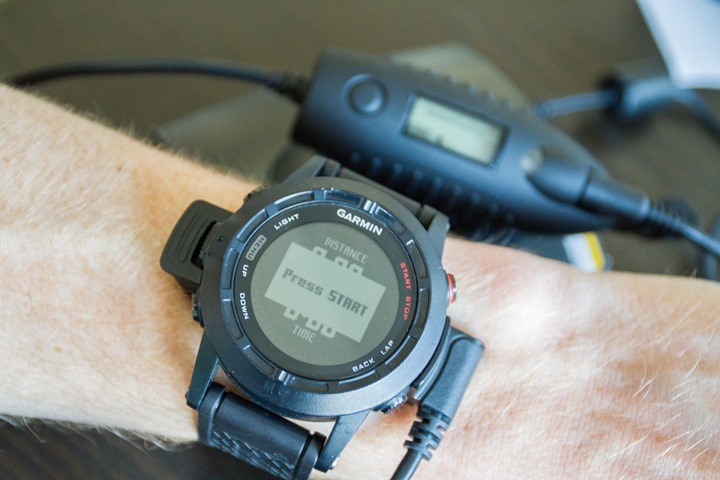
Note that you can indeed wear the unit while using the charging clip with the battery pack. One option would be to put the solar charger (or small USB charger) in a CamelBak/similar and then just run the cable down to your wrist. The other option (and probably what I’d do), would be to temporarily stick the watch + charger in my backpack for 45 minutes or so to let it charge. It’d still be running/recording, just would keep you from getting tangled in cables.
Custom Workout & Interval Support:
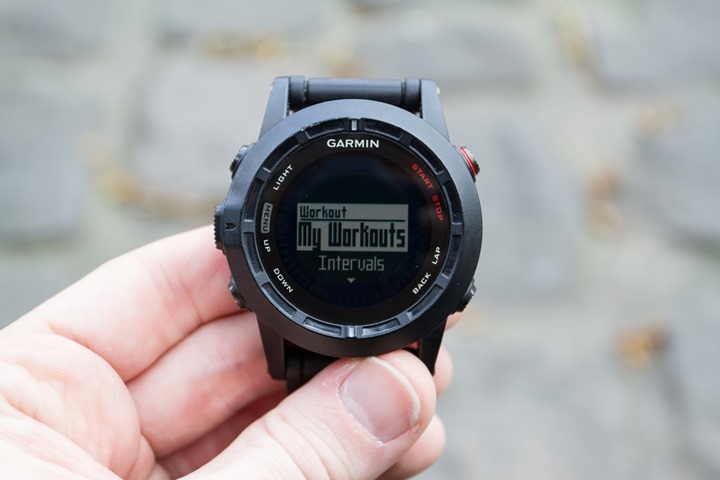
The Fenix2 supports both the creation of custom workouts using a variety of parameters, as well as the use of simple interval workouts.
Starting with simple interval workouts, the Fenix2 can be setup on the fly from the watch itself to run you through a straight forward interval workout. To do so, you’ll start from the Workout Menu, and then go into Intervals:
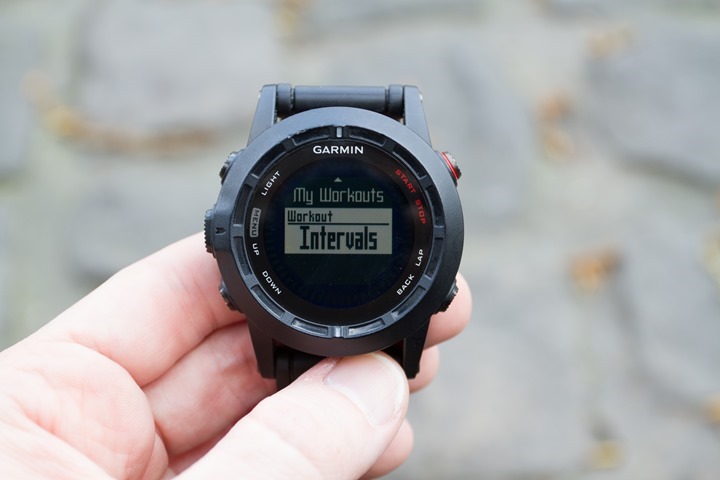
From there you can simply start with the last interval workout you setup, or you can edit the workout. When you edit the workout you can define the work period (the part where you run hard), the rest period (the part where you lie on the ground gasping for breath), the repeats (how much pain), and then both a warm-up and cool-down.
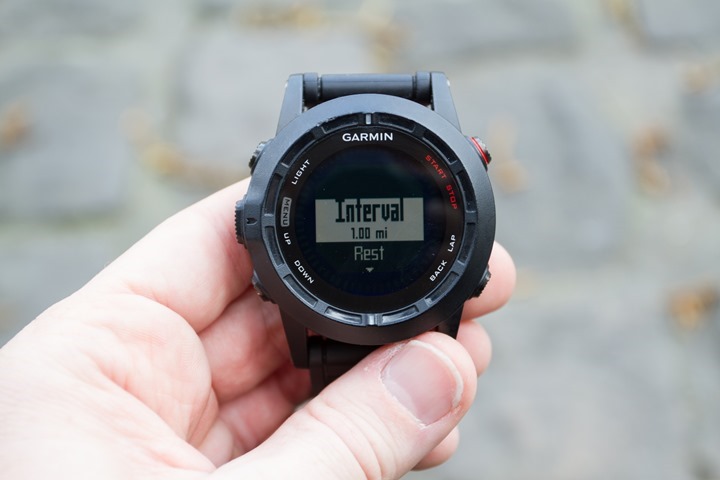
For the work interval period, you can define it as either distance (miles/kilometers) or time, or, specify it simply as ‘open’, which means until you hit the lap button.
For the rest interval period, you’ve got the same options: Distance, time, and open. The unit will combine the work + rest interval period together, and repeat them as many times as you’ve specified in the ‘repeat’ option.
Finally, for both warm-up and cool-down you can specify to turn it on or off. There isn’t a pre-defined time with basic interval mode, it’s just until you hit the button again.
While in the workout the unit will walk you through each step and give you a countdown as you approach the next step. It’ll automatically create laps for each segment of the workout, which can be reviewed later on Garmin Connect or any 3rd party app.
Next, we’ve got the much more advanced custom workout creation mode. Within this mode, you can create an almost unlimited workout as far as complexity goes, with a slew of different steps and targets. For example, you can specify cadence, pace, or heart rate targets, as well as durations including both time and distance. Or, just until you’ve pressed the lap button to advance.
It’s easiest to create these workouts on Garmin Connect using a computer, and then transfer them to the watch using either your phone or a USB cable. Here’s an example of a variation on an interval workout I created on Garmin Connect:
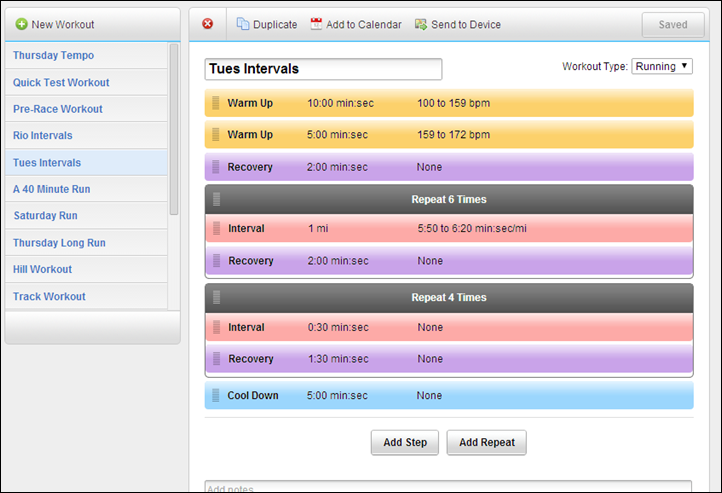
Once you’ve transferred the workout to the unit it’ll be available both on the unit as well as Garmin Connect forever. So you can always come back and edit it later if need be.
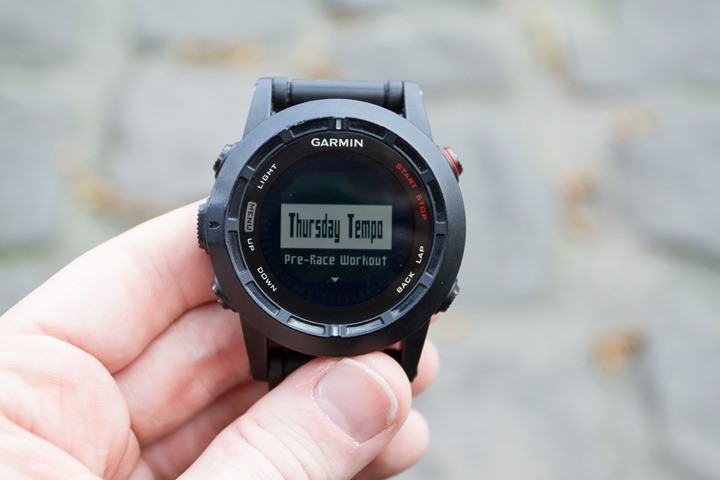
Note that you can’t edit the custom workouts on the unit itself, only from Garmin Connect. But that’s reasonable, since it would be a bit of a mess to do so on the unit anyway.
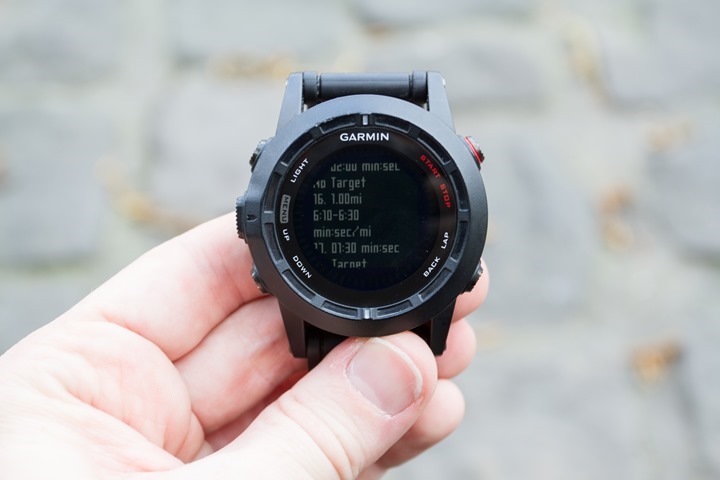
While in workout mode, the unit will walk you through each of the steps and the targets. Now, at present there’s a bit of an odd bug where no matter what I define the step as (such as ‘Interval’ or ‘Rest’), it just spits it out as ‘Run’ on the screen. Garmin is working on fixing this. For my workout though, it still listed the targets (i.e. pace/cadence/HR), as well as times and distances. Given I roughly knew the workout structure, I was able to easily figure out when I had to run, versus when I got to be lazy.
Note that workouts cannot be combined with multisport mode.
Finally, it’s worth noting that in addition to both interval mode as well as custom workouts, you can define basic ‘Alerts’ which are triggered when you hit certain criteria. These alerts can be configured for any sport profile, based on the following attributes: Proximity, Distance, Time, Elevation, Navigational Arrival, Speed, Pace, Heart Rate, Cadence, and Battery.
Generally speaking, you can configure a minimum threshold, and a maximum threshold for most of the categories (such as heart rate). The unit will beep and buzz when you go under/over those thresholds.
Mobile Connectivity (Live Tracking, Uploading, Text/E-mail Notifications, etc…):
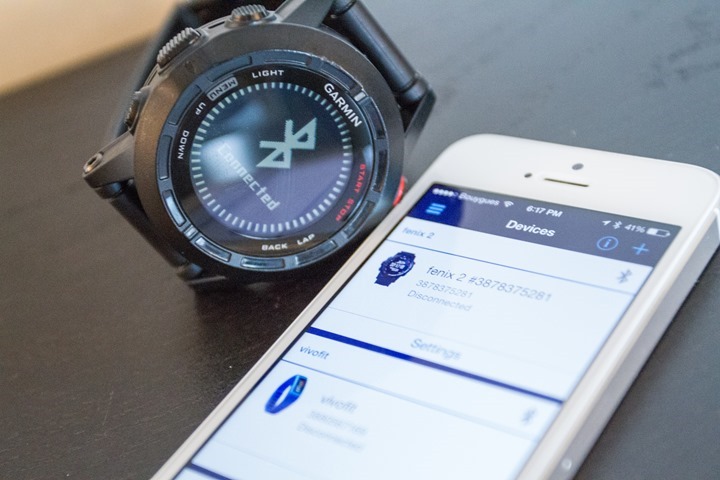
The Fenix2 builds slightly upon the mobile connectivity that was introduced in later beta firmware with the Fenix1 and Tactix units – which enables Bluetooth Smart connectivity to mobile devices for a variety of purposes. This connectivity includes the ability to upload workouts, enable Live Tracking, as well as turn the Fenix2 into a smart watch with notifications from any phone app on your device.
As it stands today, mobile connectivity on the Fenix2 stems from three difference places:
Garmin Connect Mobile (App): Upload of completed workouts, download of scheduled workouts, Live Tracking, Transfer of courses
Garmin Basecamp (App): Creation of waypoints, viewing of tracks
Native OS notification functionality: Configuration of Fenix2 as a smart watch for notification alerts from any app (e-mail/text/phone/Instagram/etc…)
I’m going to briefly run through each one and the functionality. Before that, it’s important to note that while the Fenix2 does contain Bluetooth connectivity, it requires a Bluetooth 4.0 or higher capable phone. This is any iPhone 4S or higher, or any Android phone with Android operating system 4.3, as well as Bluetooth 4.0 on it.
When it comes to Bluetooth on the Fenix2, there’s a few modes you can configure it for. These include leaving it on 24×7, enabling it only during an activity, enabling it only outside an activity, and enabling it briefly for sync only. Because the Fenix2 wasn’t designed battery-wise for Bluetooth to remain on 24×7, you’ll likely want to focus on using it only to sync data, or for the period you’d want to use it for. But more on that in a minute.
Garmin Connect Mobile:
Garmin Connect Mobile (GCM) is Garmin’s primary application for fitness focused devices to connect to phones, and integrate with Garmin Connect (the online site). The app recently went through a bit of a refresh about a month ago, which has increased the stability quite a bit after largely stagnating for a number months.
On the application itself, it’s roughly divided into four sections: Home, Community, Devices and LiveTrack. Home is where you’ve got a bit of a dashboard into your overall Garmin Connect stats – dependent on which devices you’re using. You can see some of these below:
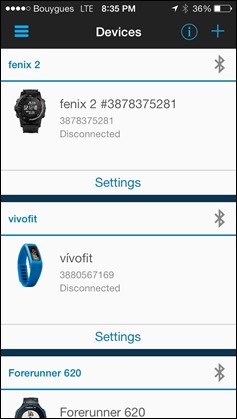
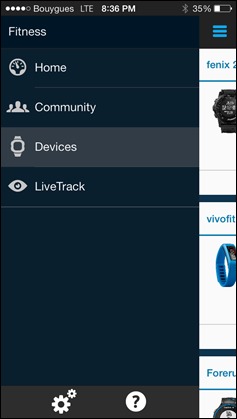
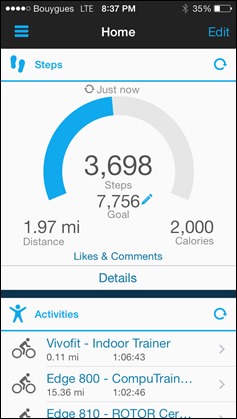
Next, there’s ‘Community’. This is where you can look at people you follow and the most recent activities. This is similar to how other social media communities work. You can follow people, have them follow you, and restrict what they see.
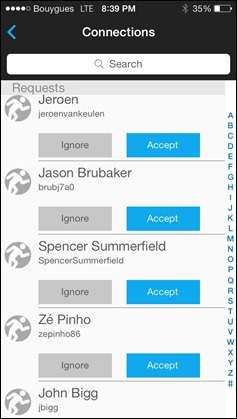
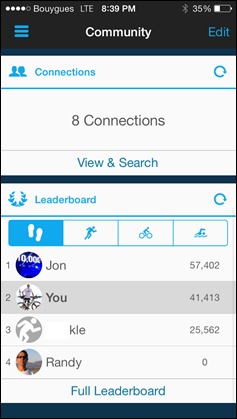
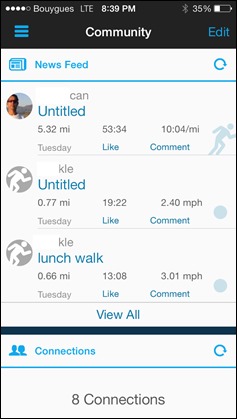
Then we’ve got ‘Devices’. After we’ve paired up the Fenix2 to the phone, you’ll see it listed in the device settings. It’s here we can also click on settings and configure whether to automatically upload completed activities to Garmin Connect. Beyond this, there’s really not much more to configure specific to the Fenix2 itself:
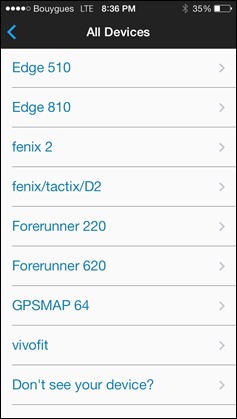
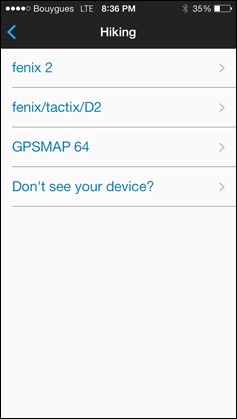
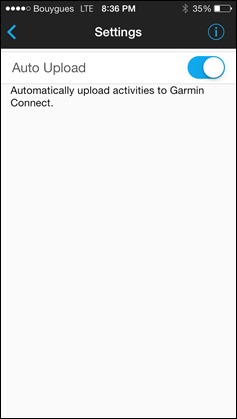
With that, let’s head over to ‘Live Tracking’. This is where you can setup a live tracking session that allows others to follow your activity live. This includes your location information, speed/pace information, as well as some basic splits.
When you setup a live tracking session, you can invite people who will receive a link to a site to track your activity. Additionally, you can configure it to share on Facebook or Twitter. Finally, you’ll see an option for ‘Extend Sharing’, this means that the ability to see your activity will last 24 hours, otherwise, it’ll end as soon as you end the activity. I recommend always setting this to ‘enabled’, otherwise your friends and family who joined late won’t be able to see anything. Further, if you have a loved one following along they may become concerned when the page abruptly ends with no further information.
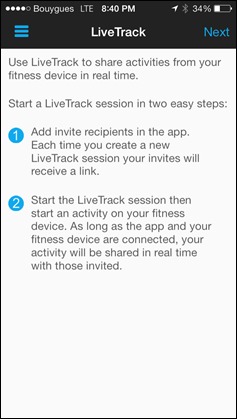
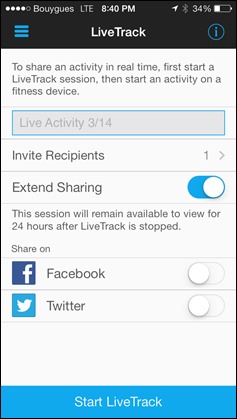
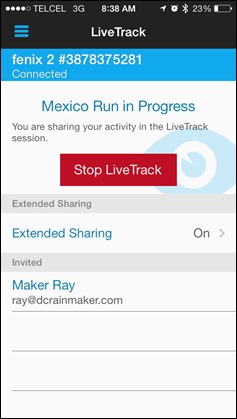
Once you’ve configured your settings, you’ll go ahead and click ‘Start LiveTrack’, which will enable the session. Note that this won’t actually start the activity. It simply starts monitoring. Folks can see a blue dot on a map of where you are, even before you start. It’s at this point that the e-mail notifications/Tweets/Facebook posts go out.
After those have been sent, people can then click on the link which takes them to a page on Garmin’s site which shows them your current progress.
They can change from metric to statute, as well as zoom in on the map, switch it to satellite view and see some basic splits.
Note that in the case of the Fenix2/Tactix/Fenix1, you cannot concurrently stream ANT+ metrics like heart rate, power, or cycling cadence. This because the chipset used in these watches does not allow both ANT+ and Bluetooth Smart to be used at the same time.
Said differently: If you want to display/capture/record heart rate data (or any other ANT+ data sensor), you cannot enable Live Tracking of that session. It’s one or the other. It’s a physical hardware limitation that will not change with a software update. Note that this is different from the Garmin FR220/FR620 & Edge 510/810, which do enable you to stream those metrics at the same time.
Once your activity is complete, you can save it on your watch and have it automatically transfer. You do not need to enable Live Tracking to do so. In fact, I rarely do, but I do use the upload functionality. When you finish the activity you’ll see an option that says ‘Sync’.
When this option is selected, it’ll temporarily enable Bluetooth Smart on the watch and connect to your mobile phone to the Garmin Connect app to upload the workout. This is perfect for folks (like me) who want to use ANT+ sensor data during a workout, but still want to briefly use Bluetooth Smart to upload the data afterwards via phone.
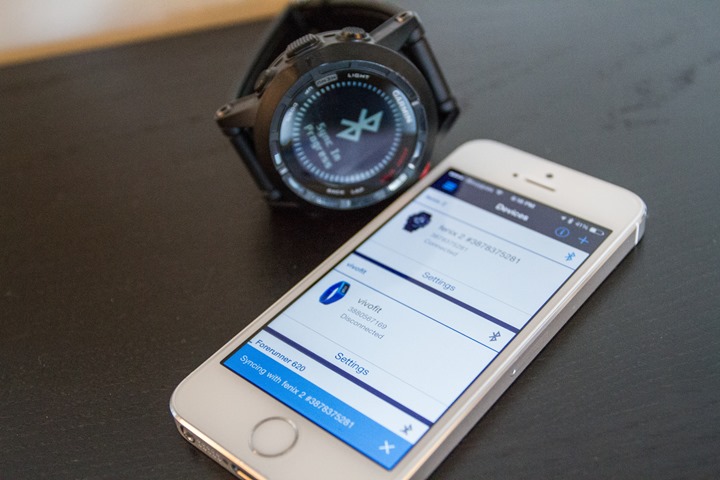
Now, the only catch here is that in my testing the upload process from the unit to the phone is incredibly slow. For example, a 40 minute run (with HRM-RUN ANT+ data), it took approximately 20-30 minutes. [Note/Update: Other users are reporting much faster times, in the order of a minute or less, perhaps it’s just me. Update 2: In the latest version, I’ve got my 2hr 30min run down to 8 minutes to upload…progress.]
In addition to uploading completed workouts, you can also transfer scheduled workouts to the Fenix2, as well as transfer pre-created courses. Both of these must be created first on Garmin Connect – and then sent to the Fenix2 from the app.
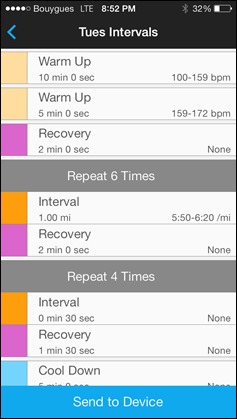
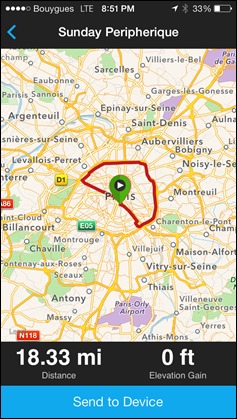
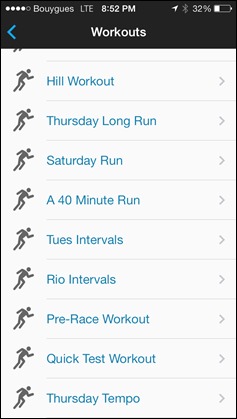
Lastly, by connecting to the Garmin Connect Mobile app, you’ll update the Fenix2’s satellite cache information, which allows it to quickly find satellites in a matter of seconds.
Garmin Basecamp:
Garmin Basecamp allows you to quickly create waypoints using online maps from your phone, and transfer those waypoints to the Fenix2 (or Fenix1/Tactix). In addition, it allows you to look at tracks (saved courses) on your Fenix, as well as look at saved waypoints that have already been created on your unit. Finally, it allows you to look at adventures from ‘Garmin Adventures’, which combine tracks (like hikes) with photos.
To start, you’ll need to kick your Fenix into Bluetooth enabled mode. Then, you can search/scan from within the app to find the unit. You’ll also want to sign into your Garmin Connect account, which enables you to save some items up to the ‘cloud’.
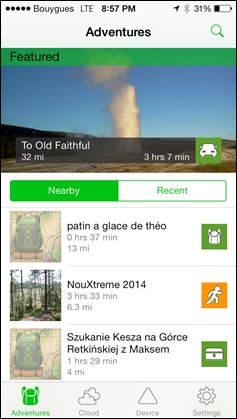
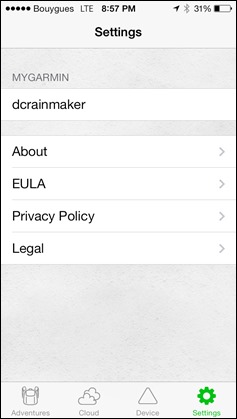
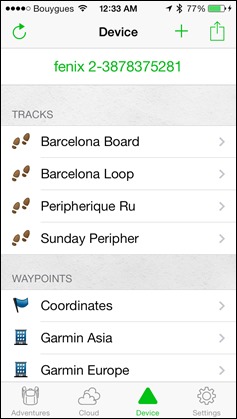
Next, we’ll start with creation of an adhoc waypoint. In this case I can choose to create a waypoint based on my exact location right now. From there I can select an icon, choose a name, and also give it a description. I can then push this immediately to the device, or save it for later use.
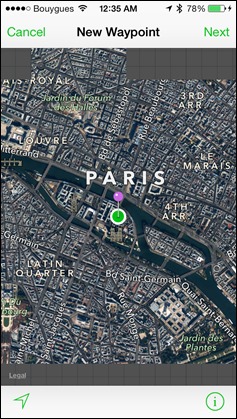
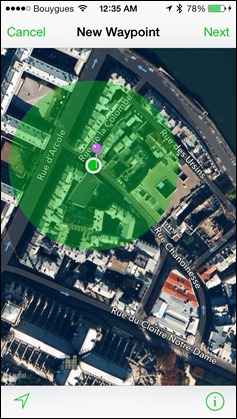

I can also create a waypoint in another location – such as a few miles away, and repeat/do the same process there.
From the app I can pull up existing tracks on my device. These are what Garmin Connect calls courses, and aren’t completed activities, but rather routes to follow. Within this I can look at the track, zoom in, change the map type and even edit the name. But I can’t edit the actual track itself. It’s a look but don’t touch sort of thing.
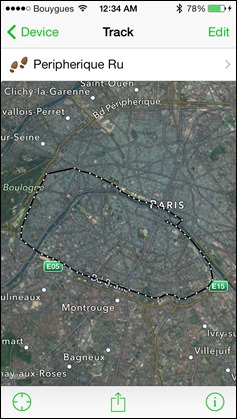
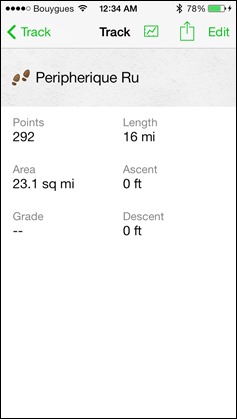
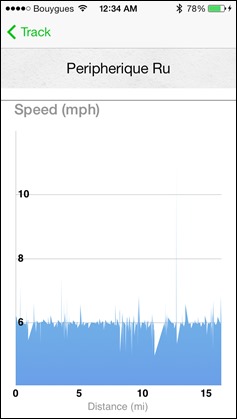
Finally, we’ve got Garmin Adventures. This has been targeted at the hiking/outdoor segment, but allows you to combine a track/route with photos and other information for someone to follow. Sorta like giving someone instructions with a photo book. The app will automatically show you nearby Adventures, but you can also search other adventures. You can pull up the photos from the adventure on the phone as well as any of the waypoints along the way.
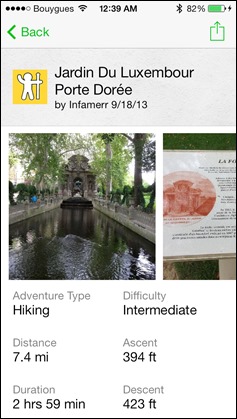
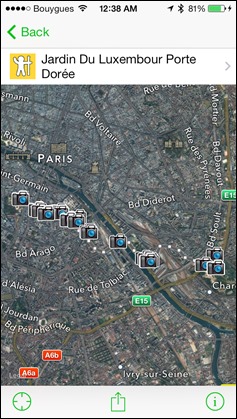
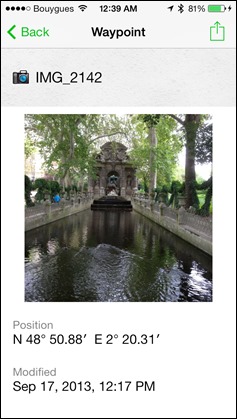
Once you’ve found an adventure you like, you can go ahead and transfer it to your device. Once on the device, it’ll follow/navigate it like any other track (as discussed in the navigation section earlier).
Ultimately, the Garmin Adventures are ‘interesting’, but I’ve got the same complaint I did nearly two years ago: Why on earth isn’t it integrated into Garmin Connect? It sits there like the bastard step child never really getting the attention it deserves. I can only hope with the Garmin Connect overhaul there’s plans to pull it in, and integrate it. In the mobile connected world, Garmin is leaving so much on the table here. They could easily tie this into the phone app to allow folks to take photos, create an adventure and then send those to Garmin devices. Tons of potential…none realized.
Smart Watch Mobile Notifications:
Finally, in addition to fitness focused functionality, you can configure the Fenix2 to display notifications from applications and OS services on your mobile device. This includes everything from text message alerts, to e-mail alerts, to notifications that a friend has commented on a Facebook post.
You’ll simply pair the watch to your phone via the Bluetooth menu. Once you’ve done that, you can enable the notifications prompt within the Fenix2:
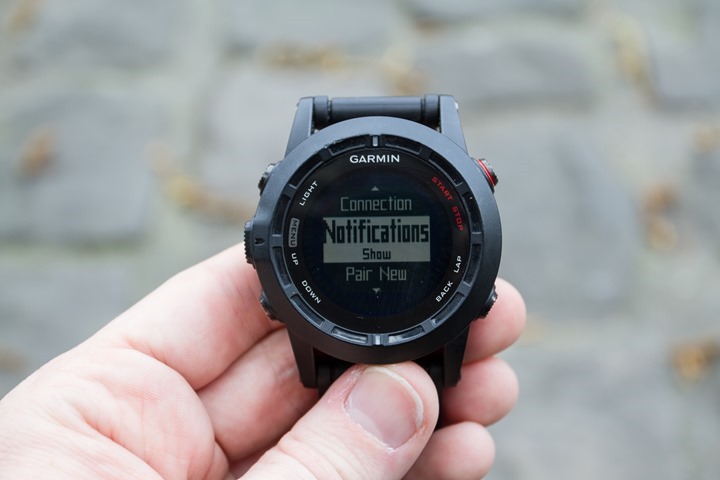
Apps then use the notification center to surface notifications to the Fenix2. As noted before, this can be any application that you’ve enabled. A notification can then trigger an audible alert, or a vibration alert.
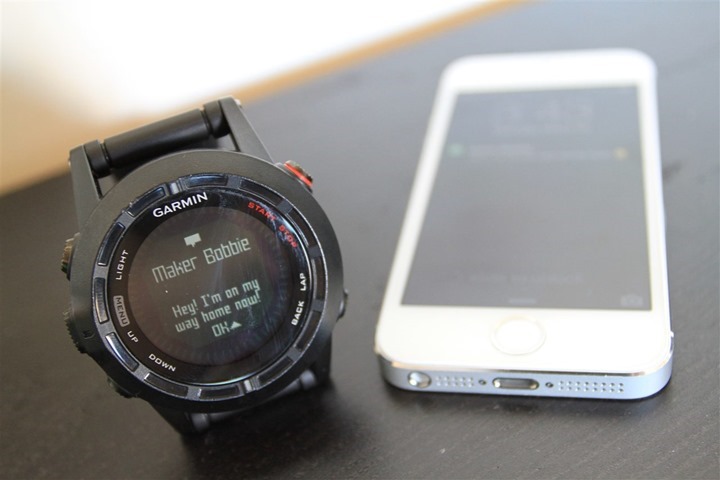
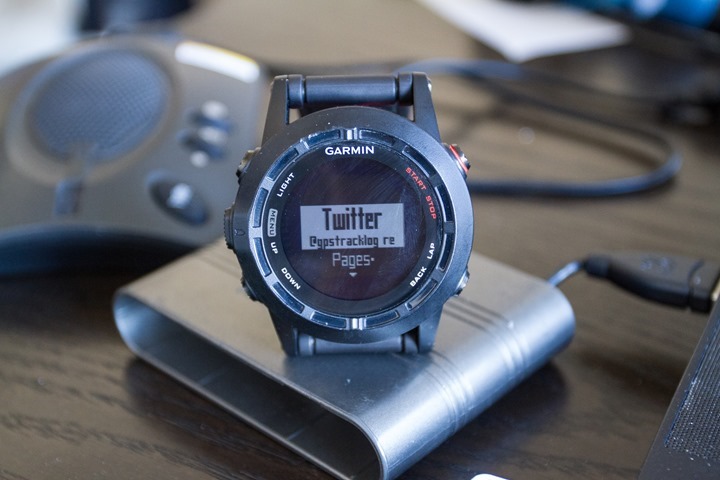
The only challenge with this functionality is that the Fenix2 wasn’t really originally designed like a traditional low-power smart watch, from a Bluetooth notifications standpoint. As such, the battery life here is about 24 hours in this mode. So you’re basically charging it every day if you choose to leave Bluetooth enabled-on constantly. For most folks, I’d recommend against this.
Android Notes: As of today, all of these functions in the mobile action are limited to iOS devices and do not yet work on Android. Garmin is currently planning these to be enabled on Android devices in in a few different pieces:
– Garmin Connect Mobile Fitness Features: Live Track, EPO (Satellite Pre-Caching), Activity Upload, Course Download, Workout Download – ASAP, could be any day, or any week.
– Smart Watch Notifications: This is the notifications piece for things like text messages. This is slated for “Q2 2014”, so anytime between April and June.
– Basecamp functionality: You won’t likely see a specific separate Basecamp app on Android, but rather, see those features surface into an existing app. Which, is something I’ve somewhat argued for, for some time. The timeframe for this is also more Q2.
Garmin Connect Website:
As previously noted, Garmin Connect is Garmin’s activity tracking log and website. It’s where all data from the Fenix2 ultimately gets funneled to. While in the previous section I talked about the mobile uploads, I want to briefly talk about the new Garmin Express desktop app. This app aims to quickly upload your completed workouts to Garmin Connect, as well as keep your device up to date. The app had some initial first week teething pains back a few weeks ago, but seems largely functional when it comes to the Fenix2.
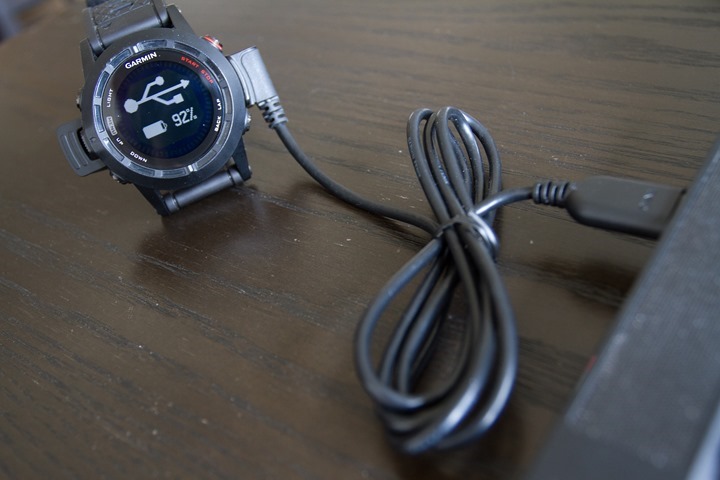
While the device is plugged in it’ll show you if you have any updates pending to install, as well as if any items were recently sync’d (or still to sync). When the device isn’t plugged in, it’ll remind you to update the device – a way of ensuring the unit is kept up to date.
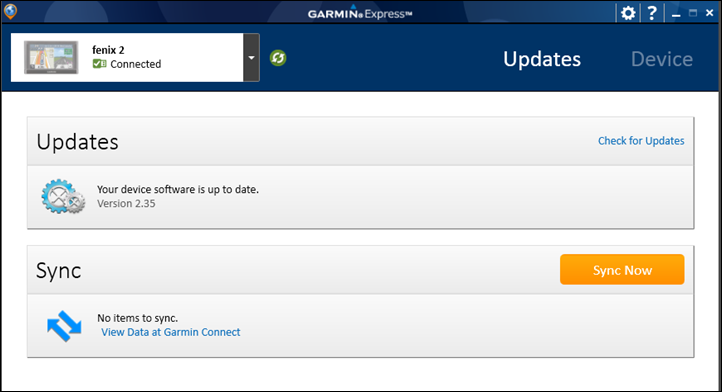
It’s from here that you can associate it to your Garmin Connect account, look at how full the storage is, and also transfer additional languages to it.
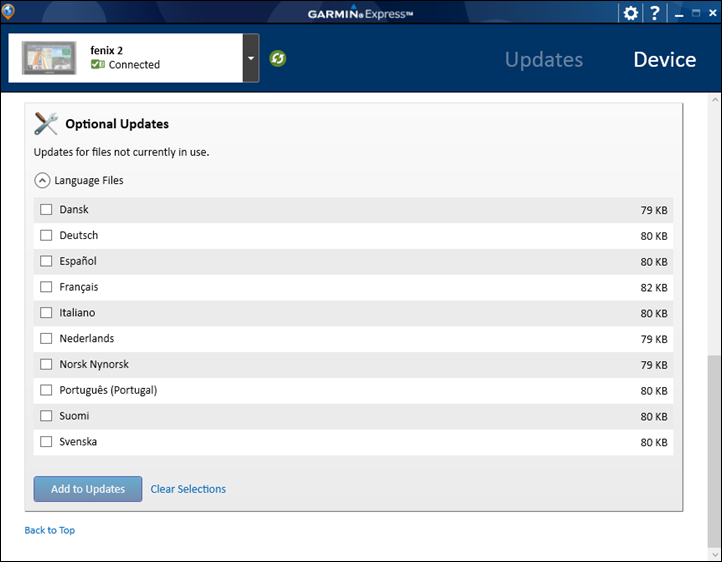
While Garmin Express takes care of the ‘dirty work’ of uploading the files to Garmin Connect, you can still easily access the raw .FIT or .GPX files should you wish to. For example, if you wanted to upload them to Strava or Training Peaks. These are accessible just like any other USB thumb drive’s data would be, via the ‘Activity’ folder under ‘Garmin’. These files work with pretty much any 3rd party application out there without issue.

Now that we’ve got the data up to Garmin Connect, I’ll give you a super-quick rundown. I say quick, because I’ve been sprinkling parts of it throughout the review already in the relevant sections. Further, as it stands today Garmin is part-way through a large overhaul of the platform, so showing you how it looks today will likely literally change next week. In any case, here goes.
To start, you’ve got your main dashboard. This is where you can see an overview of various activities and connections you’ve made (like social networks).
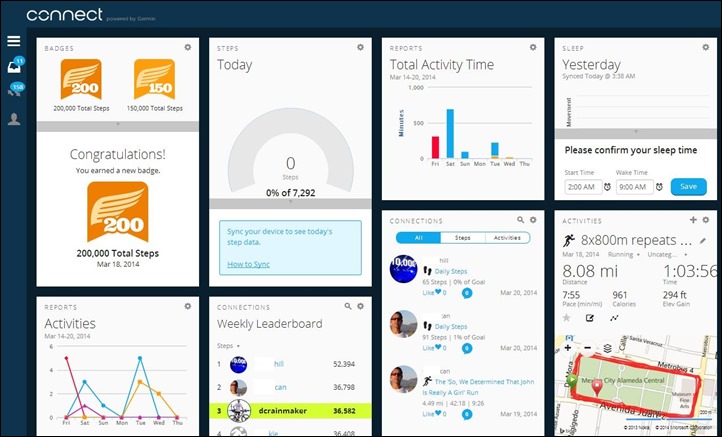
Then diving into a given activity you’ll get an overview of all your stats for that particular run/bike/hike/swim. Along the left is summary information, whereas the right is graphs/charts, and maps.
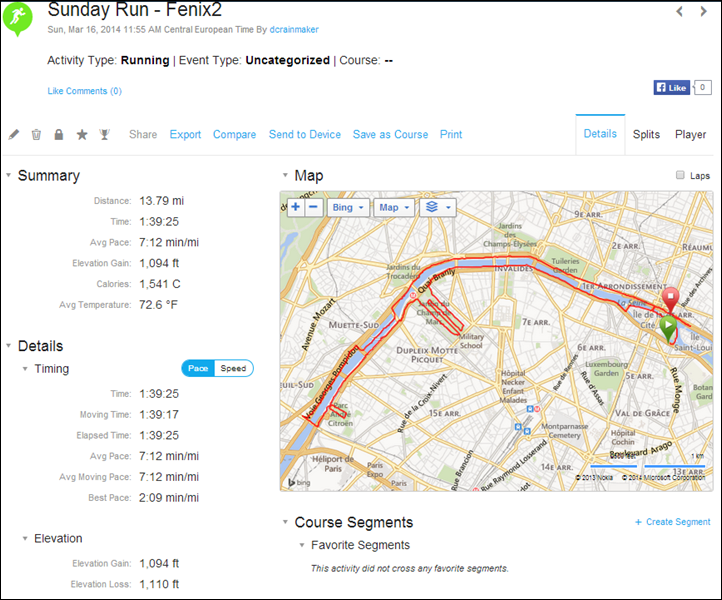
You can click on any given chart to expand it, which allows you to also snip certain sections to zoom in on.
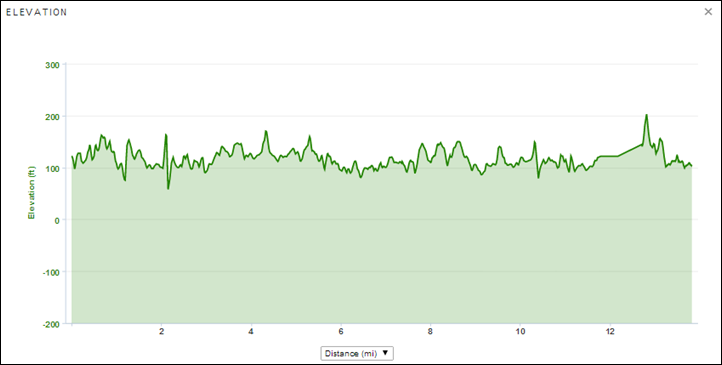
Down lower along the left you’ve got your laps/splits (either via auto-lap or via manual lap button pressing), as well as details from the Running Dynamics components.
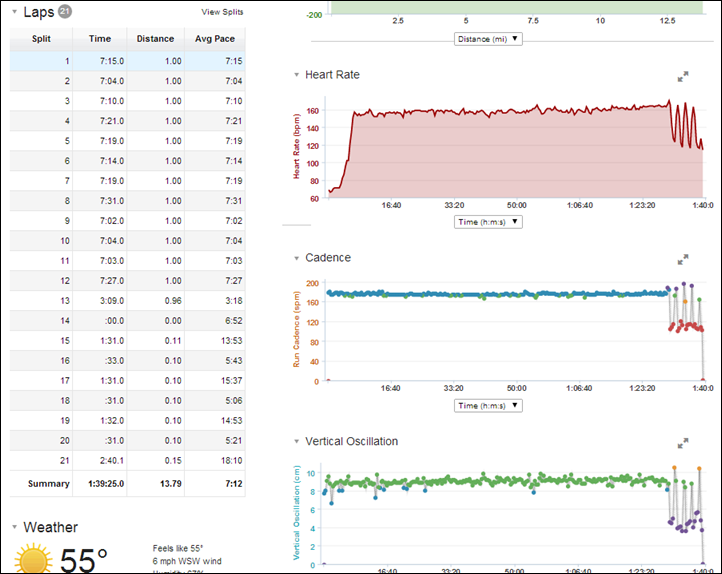
Finally, towards the bottom you’ll see the device that was used, along with the firmware, as well as whether or not elevation correction was turned on. In the case of the Fenix2, it will rarely make sense to turn on elevation correction, since it comes from a barometric altimeter. However, at the moment there’s a bug with GC2 that doesn’t enable you to turn it off (nor, does it enable you to turn it on for devices that should need it). There’s also a visible bug in the temperature, which appears to be showing Celsius but with a Fahrenheit label (well, actually, a Fahrenheit label and a random question mark…so even it knows it’s confused).
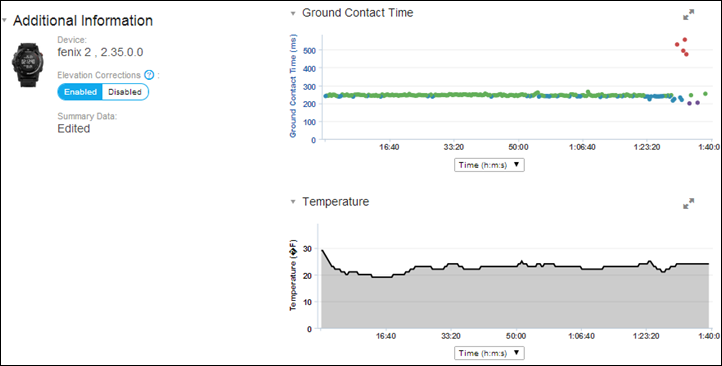
Despite it’s bugginess in the current migration from GC1 to GC2, Garmin Connect generally does a good job at showing you the main stats on a run, ride, or swim. You can change mapping platforms between Google and Bing, so that you can find and see maps that make the most sense for your area. You can also export data from here, though I wouldn’t recommend doing that, as some of the data (such as Running Dynamics) isn’t included. Rather, I’d take the raw file off of the Fenix2 instead.
Garmin VIRB integration:
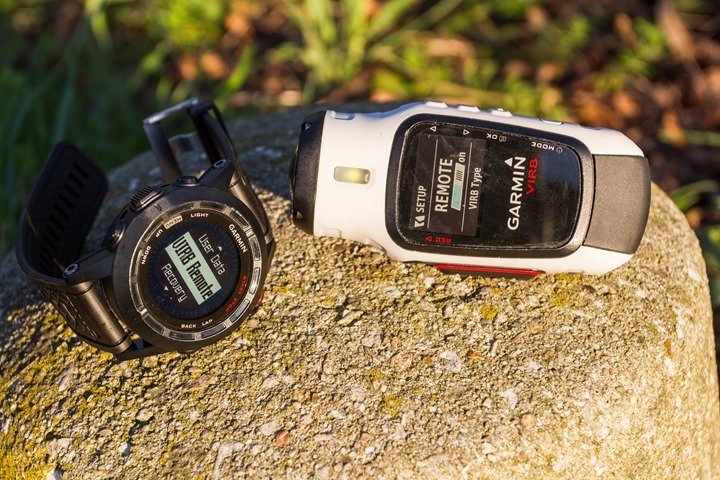
The Fenix2 follows in the footsteps of the original Fenix and includes the ability to control the Garmin VIRB & VIRB Elite action cameras. The Fenix controls the devices via ANT+, thus, the mode is not compatible with Bluetooth Smart enabled. You can access the VIRB control via the Menu button, which allows you to search for a VIRB and control it.
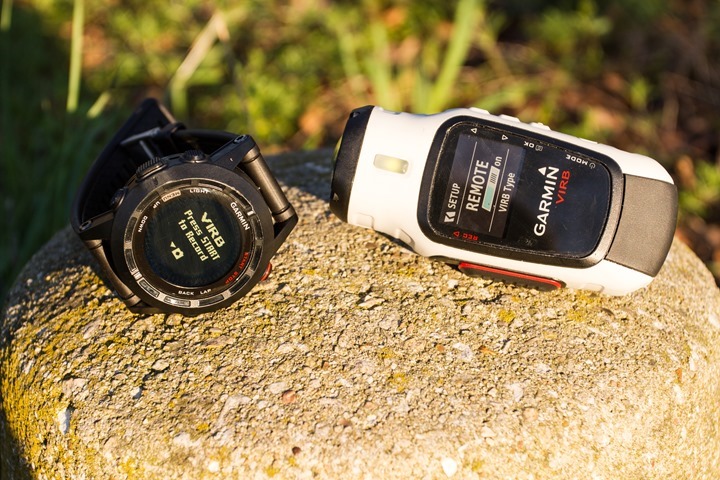
Note that you’ll need to set the VIRB to be remotely controlled. Once you’ve done so, you’ll have to basic options from the Fenix2. First is that you can take a photo. To do so, you’ll simply tap the left hand down button, which triggers the camera about .5 to 1.0 seconds later. The VIRB will follow any of the photo settings you’ve previously defined (i.e. burst mode, etc…).
You can also start and stop video recording from the Fenix2. To do that, you’ll press the start (red) button. Once the unit starts, it’ll display a counter showing you the recording time. You’ll also see the camera light turn to red.
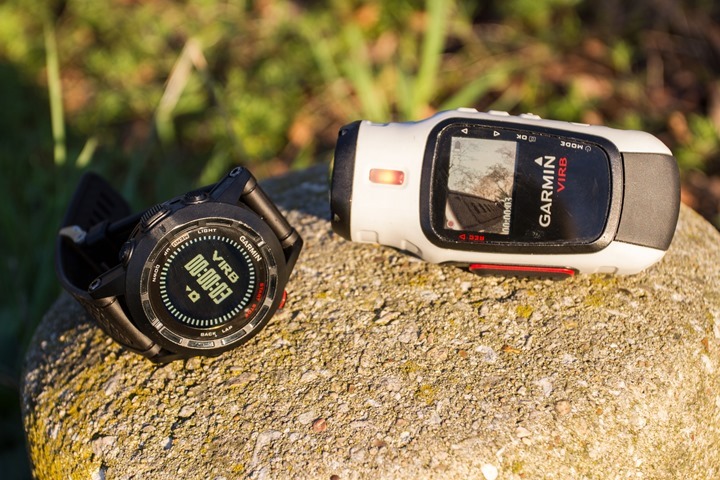
The feature is particularly handy on a bike, especially if you don’t have a Garmin Edge unit (which can also control the VIRB) to trigger the camera. I only wish we’d see VIRB control also implemented on some of the other Garmin high-end running watches, such as the FR620. It would only seem like an easy and logical move to increase adoption of the Garmin VIRB.
Ski-Board Mode:
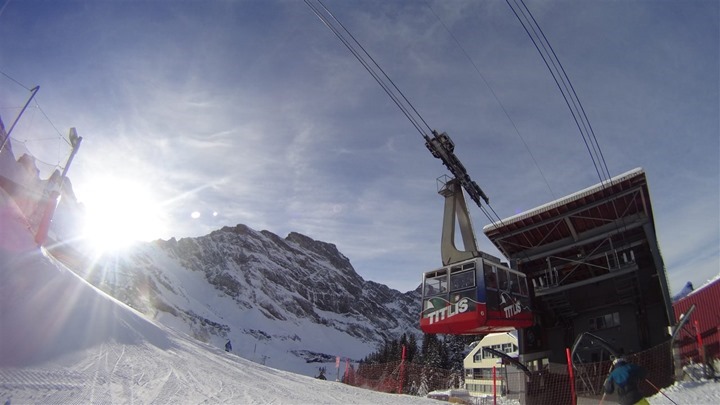
The Fenix2 includes a new mode called ‘Ski-Board’, which automatically calculates and tracks skiing/snowboarding runs based on when you board a chairlift.
I previewed this when it first came out last year for the Fenix1 (and before it had a trendy name), but since then Garmin has been chugging away adding a number of features in this area. Unfortunately, I wasn’t able to fit in a skiing trip in the last 6 or so weeks, thus, I haven’t had a chance to test it (but one reader did this weekend and noted it worked flawlessly). Nonetheless, here’s the low-down on the core features, which is known as ‘Ski-Board’ mode in the menu.
Ski Mode Run Detection: Each time you get off the lift and start to ski, it’ll automatically create a new lap within the unit. In addition, there is a run counter, which shows you how many runs you’ve completed.
3D Speed and Distance: As I covered in my post last year, this mode takes into account the horizontal and vertical components within the speed and distance calculations – basically accounting for the drop in vertical.
Ski Mode Auto Pause: This will automatically pause the time and distance of the track file when you are sitting on a ski lift.
Ski Pages Know When On Lift: While on the lift, the unit will automatically switch to showing you stats about your last run, rather than just stats about the chair lift.
Beyond these core features they’ve also added in more ski-specific data fields, such as total vertical drop and run-specific details around max speed, vertical drop, etc….
As you noticed at the very beginning of this post, the unit includes a fabric extender strap – which is specifically designed to fit over bulkier winter jackets, typically worn while skiing or snowboarding (unless you’re in Dubai of course). Hopefully I’ll be able to sneak in a quick getaway at some point to get some skiing in, though, at the moment my travel schedule doesn’t look good for cold-weather locales.
Navigation & Trail functionality:
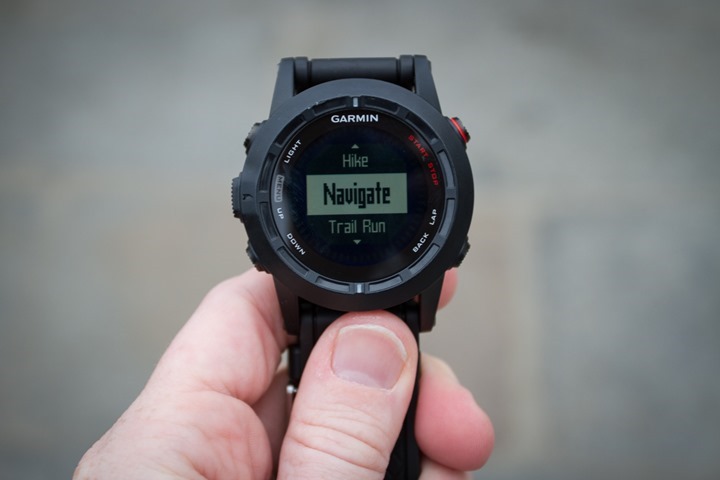
When the Fenix lineup was originally introduced nearly two summers ago, it was built as though it was a hiking/navigation watch, ideally suited for multi-day treks on non-paved terrain. In fact, the team building the Fenix isn’t even part of the Fitness division at Garmin, but rather, part of the Outdoor division – which traditionally focuses on ruggedized handheld units. Of course, over time the Fenix has grown to be more fitness-minded, adding in the swim/bike/run components we see now in the Fenix2. But at its core, the Fenix2 hasn’t removed any of the navigation/hiking/trekking features that it started with or picked up along the way.
Waypoints/POI’s:
The Fenix enables you to navigate to predefined or ad-hoc waypoints, which are simply recorded locations. When you navigate to a waypoint, the unit takes the most direct route – like the crow would fly (assuming the crow isn’t drunk). It’s not like a car GPS that navigates based on known streets/trails (more on that in a bit). This is just point to point.
You can create waypoints either offline (using a computer), or via your phone, or directly on the unit itself. On the unit itself you can either program in coordinates, or if you’re staying at the spot you want to save for later reference, you can create that as a waypoint then. To create waypoints using a computer you’ll use either Garmin Basecamp or Garmin MapSource. To create waypoints using a phone, you’ll use Garmin Basecamp mobile. I cover how the mobile piece works later in the mobile section.
Once you’ve placed the waypoint on the device you can pull it up via “Navigate | Waypoints”. Or, if you want to navigate to a set of coordinates, then “Navigate | Coordinates”.
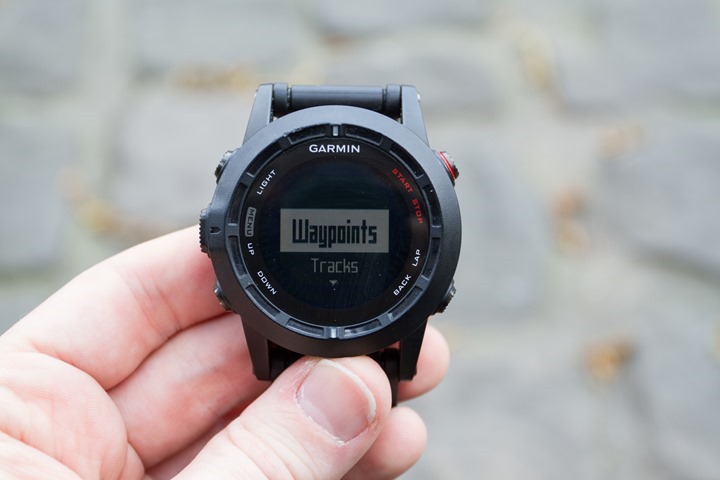
Once you do this, you’ll see a list of saved waypoints that you can select. After selecting a given point, you can pull up additional information about it as previously defined, or you can navigate to it.
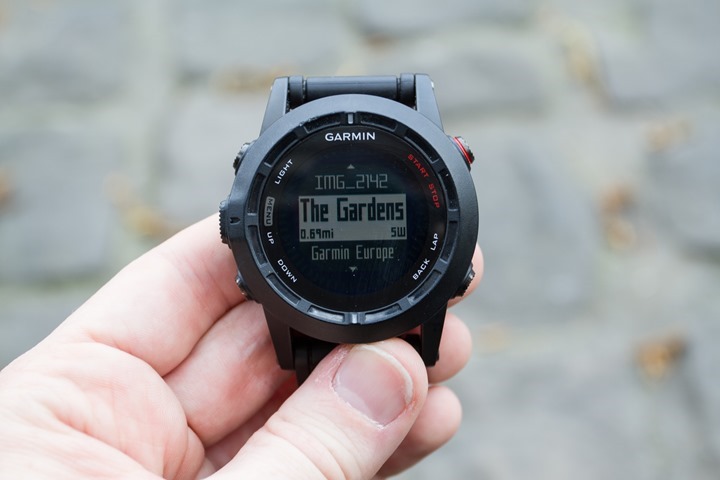
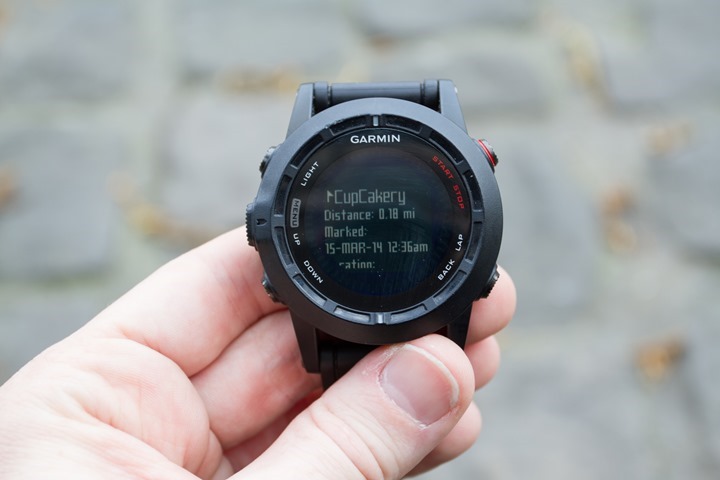
When navigating to a waypoint you’ll be given a compass that you can use to follow the dots along the edge to the location. Further, you can also engage the map as well (more on that in a bit).
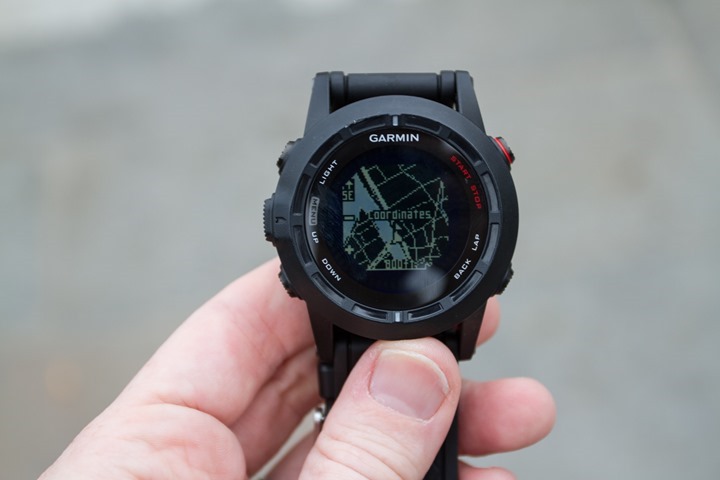
Note that the compass in the unit is a magnetic compass, and thus would orient itself based on the direction it’s being held. This is different from a digital compass, which requires you to actually make forward progress to determine the direction you’re going.
Routes:
In addition to navigating straight to a waypoint, you can also navigate along routes. Routes are simply breadcrumb trails that you’ve loaded onto the device to follow. Routes can be breadcrumb style, or a combination of direct-to-waypoint courses. You can load these routes via a number of methods, from phone to a multitude of Garmin desktop-based apps. For this section, I’m going to stick with the desktop app side of things. However, down in the mobile section I talk more about those options there.
In order to create the routes, I generally use Garmin Connect (web site). While I could use Garmin Basecamp (desktop app), or Garmin MapSource (desktop app), or 3rd party options, I find that Garmin Connect is the quickest and simplest. Further, unlike Basecamp/Mapsource, I can use Google/Bing maps and satellite imagery, which makes it much easier. While Garmin Connect is in a bit of a transition phase right now, you’re ultimately looking for the ‘Courses’ option, and then select to create a new course.
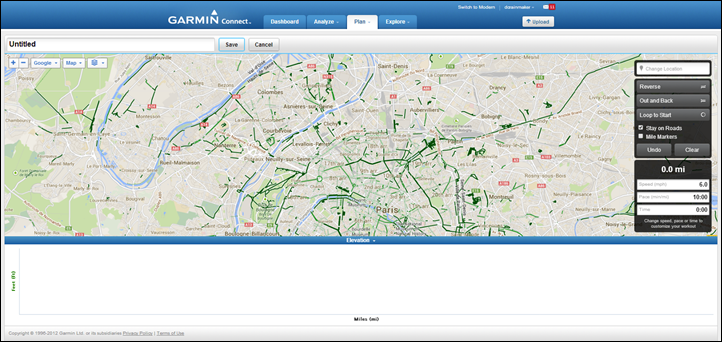
Once you do that you can simply connect the dots, choosing to follow roads or not. Obviously, if off-road on trails, you’ll probably not want to follow roads.
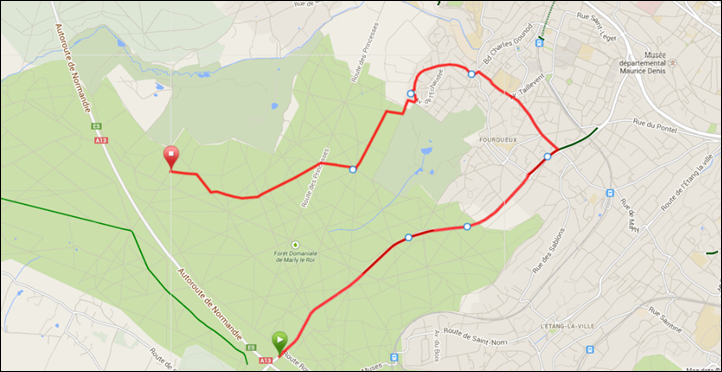
Once you’re done, you’ll simply select to ‘Send to device’, and then select the Fenix2. Alternatively, you could save the route/tracks (I’d do that anyway), and then transfer it from your phone directly – no USB required. No matter which way you choose, once you get it on the device it’ll all look the same. To access it, you’ll go to ‘Navigate’ and then choose the option to “Navigate | Tracks”, which enumerates up any courses sent to it from Garmin Connect.
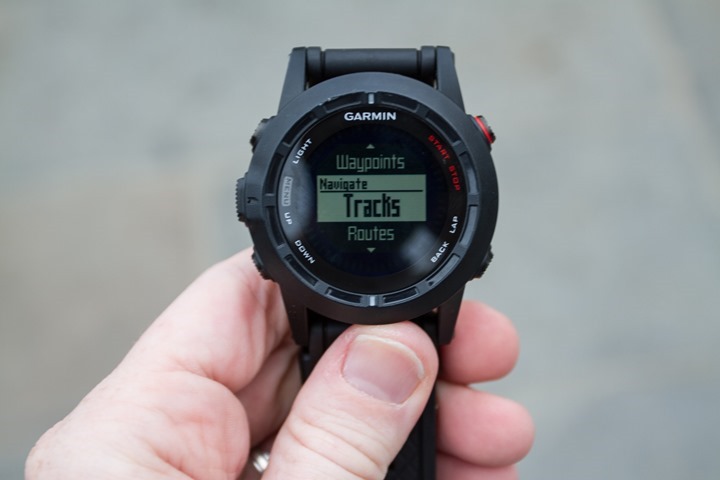
From there you can select one of the saved tracks. When you do so, you’ll be brought to an overview page where you can get details on the track, including a map of where it is, as well as navigate to it.
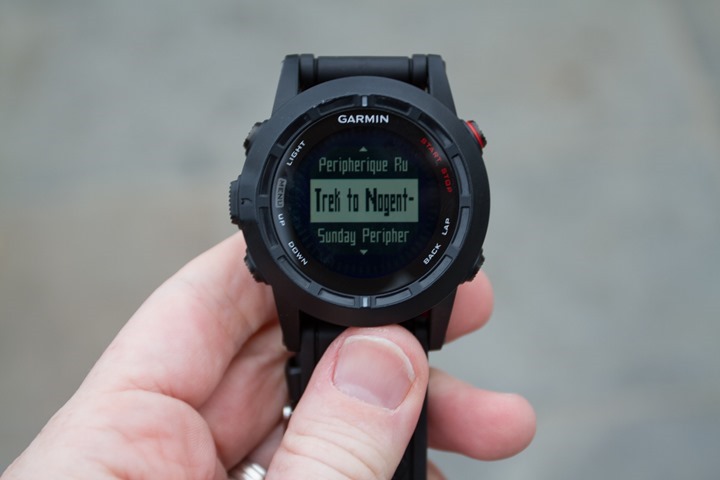
When you navigate along a given track you can customize different pages to show various navigational metrics, such as your ETA or distance remaining.
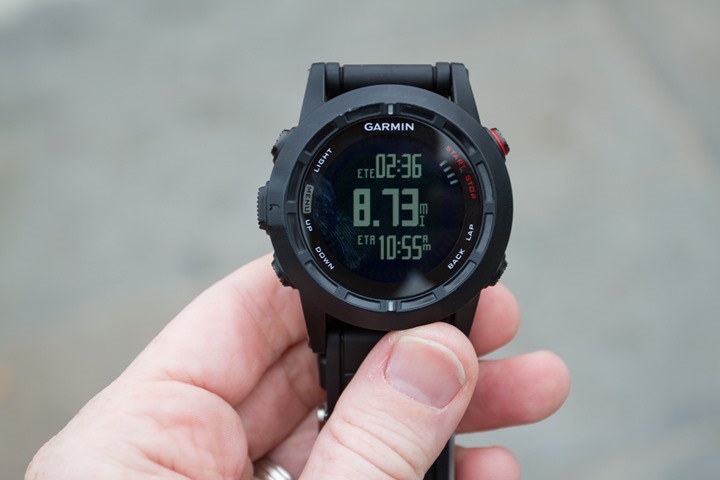
The map screen will show a dashed line for the route, which you can see below going upwards and then across the river:
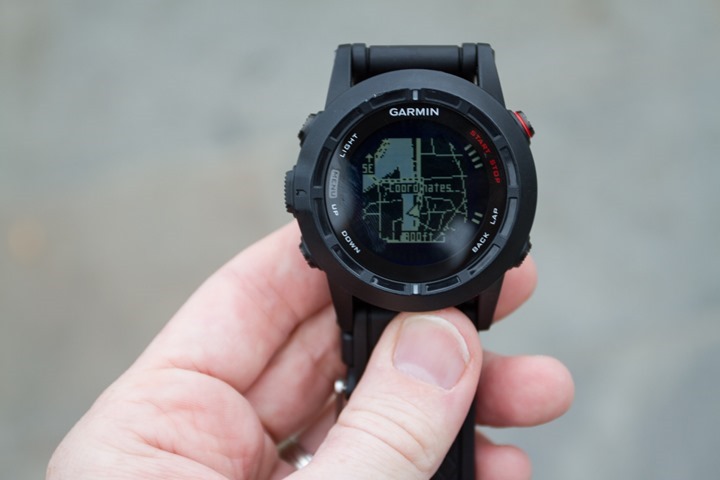
Meanwhile, on the compass, the two dots along the edge will indicate the direction of your next waypoint. You’ll simply line these up with the marker at the top of the screen near the word ‘Garmin’ to head in the right direction.
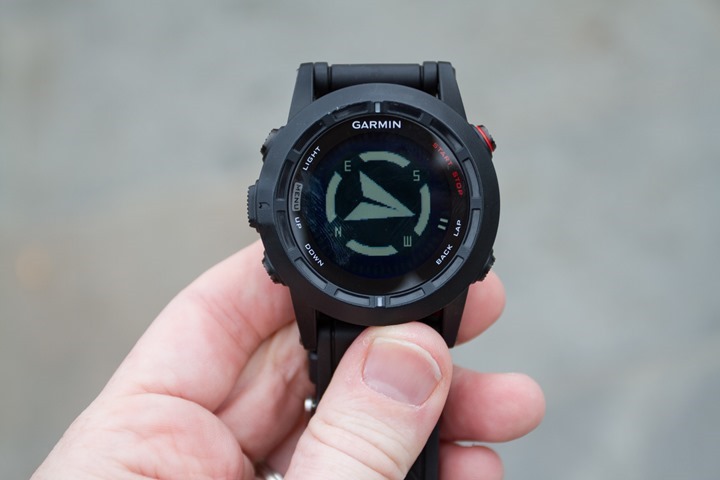
Basic Maps
Finally, the Fenix2 retains the Fenix lineup’s ability to load a basic map onto it. This feature was rarely (if ever) advertised, and even less information about how to accomplish it. My goal here isn’t to provide a full technical overview of how to do so. There are other, more capable, instruction sets out there already. Rather, just to make you aware that you can do it.
The maps are available freely from 3rd party sources, though, you could technically load a paid map from Garmin. Given the data quality though that the Fenix2 is able to present, I’m not 100% clear on the value of buying maps for the unit (versus using free ones). At a high level, these are the steps to get the maps onto the Fenix2:
1) Install Garmin MapSource application (PC)
2) Download applicable maps from free 3rd party site
3) Use 7-Zip (or similar tool) to unzip maps to a temporary directory (i.e. DesktopMaps)
4) Open temporary directory, use Maps Installer (see Step #2 for instructions).
5) Open Garmin MapSource application
6) Zoom in, and select tile area of interest, click Transfer > Send to Device
7) On the Fenix2: Add the ‘Maps’ data page to your data fields, via settings menu
Again, these are the high level steps, and this isn’t meant to be a tutorial or troubleshooting locale for loading maps onto the Fenix2. The Fenix2 has the same amount of space as the Fenix1, about 25MB. In general, map sizes are 1-3MB at these resolutions. For my entire region (Paris) of a diameter of about 50-miles, it was about 1MB.
In any case, once loaded onto the Fenix2 you’ll be able to access them after adding the ‘Maps’ data page to any of your sport profiles. Once done, the maps page will show up, with the Etch-a-Sketch style map visible:
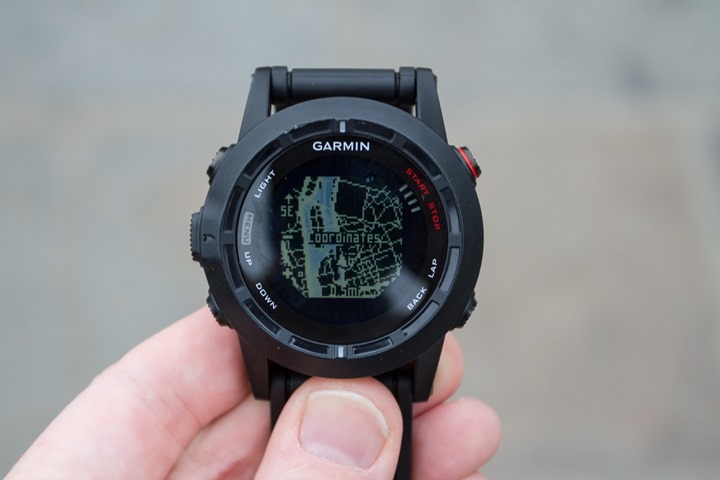
You can zoom in by briefly holding down the Menu button, which activates Zoom/Pan options. In cases where you’re navigating a track, or, if you want to see where a waypoint is, you can display those on the map.
Ultimately, given the black and white display, and more importantly, the low-resolution of it, I find little usefulness in how it’s implemented today. That said, down the road in a future generation I suspect they’ll eventually transition to a color display, which would ultimately provide more value.
Day to Day Watch Functionality:
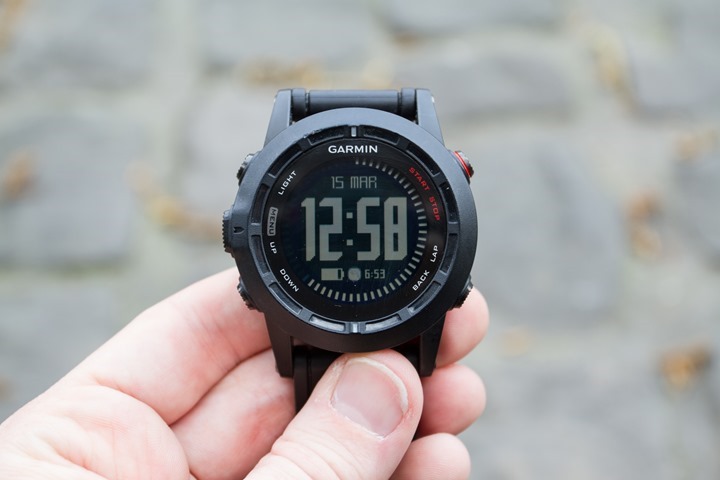
The Fenix2 can be used easily as a day to day watch. With Bluetooth disabled, the watch can go weeks in non-GPS mode.
The unit’s home/default screen can be customized in a variety of styles to show different information, from the sunrise to moonrise, and from the day of week to the time of day in multiple formats.
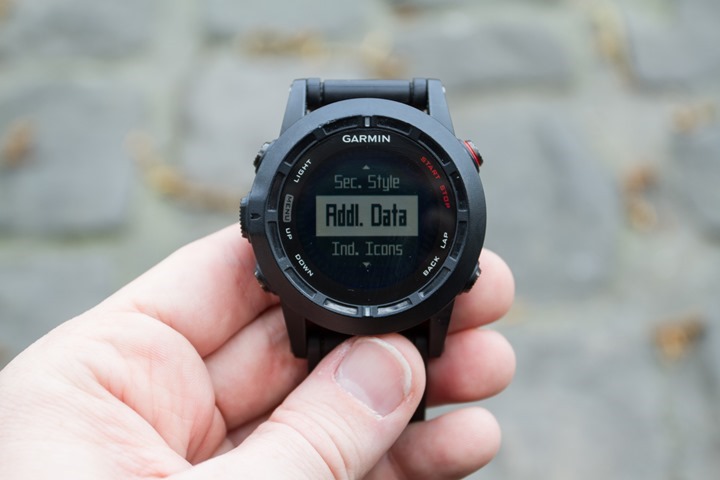
In addition, you can create multiple alarms. Alarms can be one-time affairs, or recurring alarms. In the case of recurring, you can configure it for daily or weekday alarms.
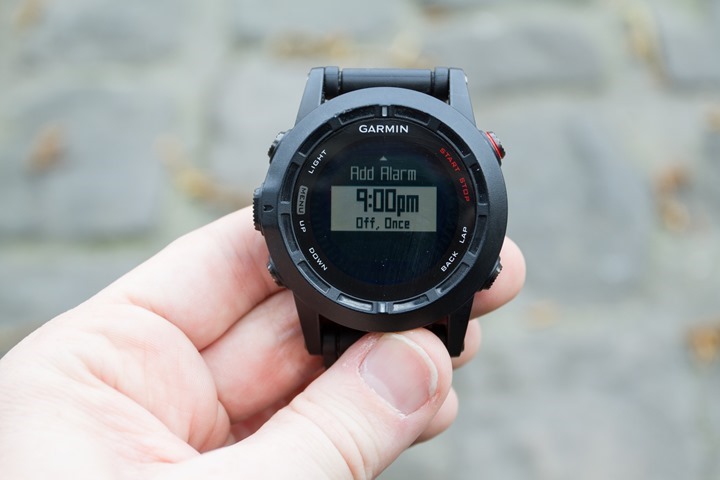
When an alarm triggers, you can specify whether you want it to be ‘Tone only’, ‘Vibration only’, both, or message display only.
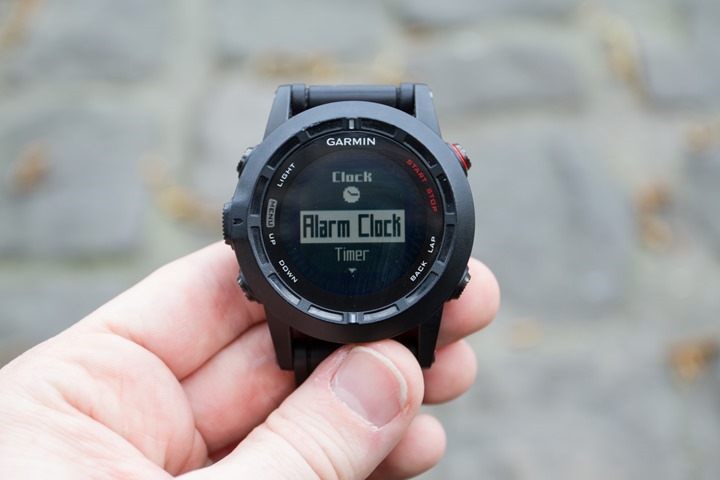
Finally, the unit also supports the timer function (simple start/stop, as well as reset, notification, and auto restart), a simple stopwatch function (including lap support). Also in this menu area of the watch is the ability to configure alternate time zones.
Fenix2 Sensor Supportability:
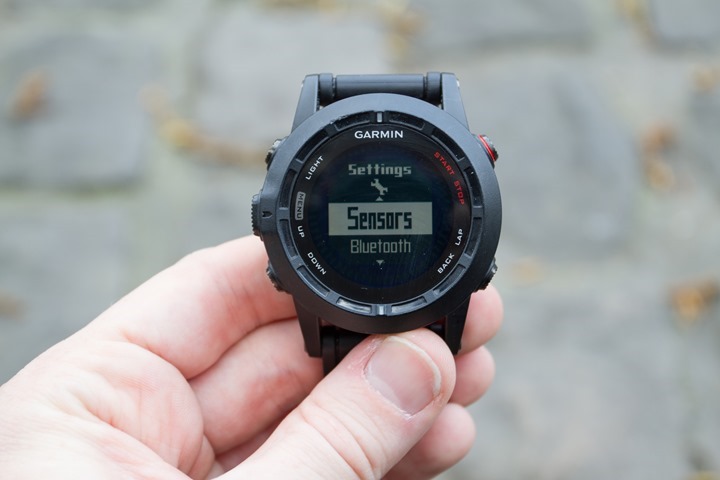
Below is a consolidated list of the different sensor types that the Fenix2 supports today. I’ve covered virtually all of these sensor types in this first chunk elsewhere in the review. But this just consolidates them a bit:
– Running Footpod (ANT+)
– Heart Rate strap & HRM-RUN strap (ANT+)
– Cycling Power Meter (ANT+)
– Speed/Cadence Combo, Speed-Only, Cadence-Only (all ANT+)
– Chirp Geocache Sensor (ANT+)
– Tempe Temperature Sensor (ANT+)
Now, while it does support all the above ANT+ accessories, there are a few things it doesn’t support on the sensors side. The first is it doesn’t support Bluetooth Smart sensors (i.e. a Bluetooth Smart heart rate strap). It also won’t support any non-ANT+ HR straps, such as ones from Polar or Nike. And then there’s a few things on the ANT+ side it doesn’t support either, including both weight scales and gym equipment. Given Garmin has moved away from supporting either of those in recent products, that’s probably not too much of a surprise.
To sum it up, the following are NOT supported on the Fenix2:
– Any Bluetooth Smart sensors (BLE)
– Weight Scales (ANT+)
– Gym Equipment (ANT+)
– Polar straps of any sort
– Nike/Nike+ straps of any sort
I don’t anticipate to see any of those sensors not currently supported, being supported in the future. The one potential exception could be weight scale – merely because there’s still a small but vocal number of folks who have previously invested in ANT+ weight scales that request it often.
Data Fields, Pages, and Customization:
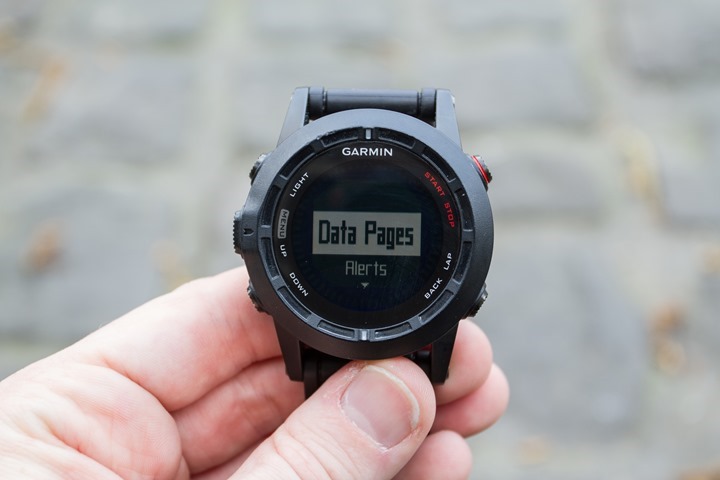
The Fenix2 offers a multitude of ways you can customize it, dependent primarily on which sport profiles you’re using. Within the unit it contains a set of default sport profiles. These profiles are as follows:
Profiles: XC Ski, Ski-Board, Mountaineer, Hike, Navigate, Trail Run, Run, Bike, Swim Open Water, Swim Pool, Workout (Interval or Custom), Indoor Run, Indoor Bike, Indoor Custom, Indoor Workout, Multisport
In addition to these profiles, you can create up to three custom profiles with a name of your choosing. It could be called “Kayaking” or “Cowtipping”, totally up to you.
Each of these profiles in turn contains data pages. These data pages contain data fields. Each data page contains up to four pieces of information (fields). You can have almost limitless data pages (no specific number was given, but the Fenix team has tested into the dozens of pages).
Here’s an example of a four-field page:
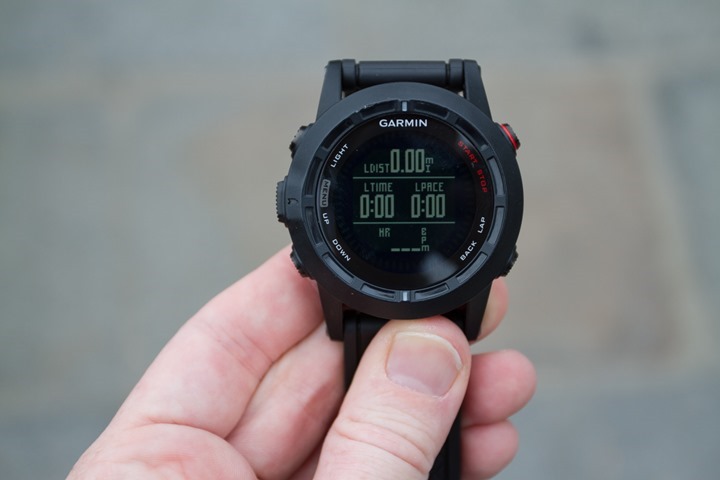
A three field page:
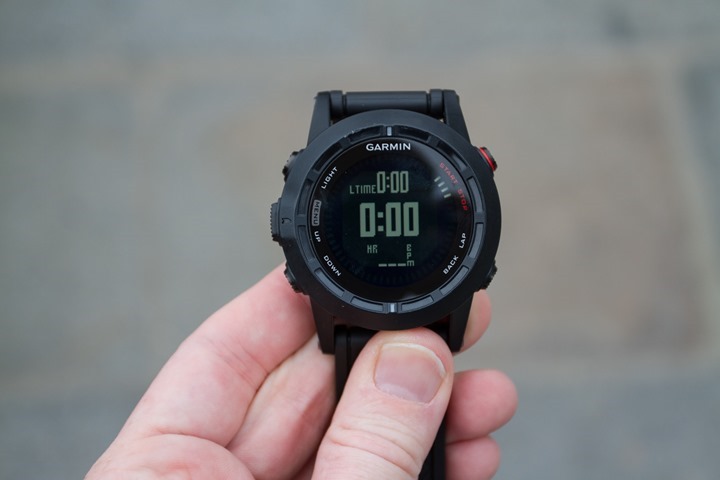
And a two and one field page:
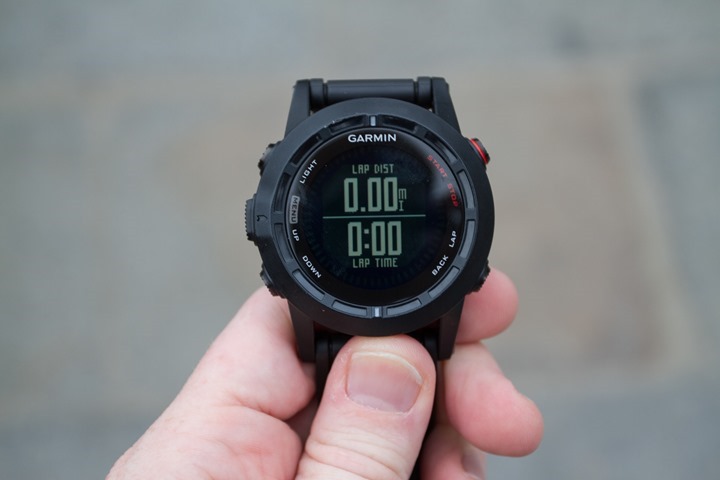
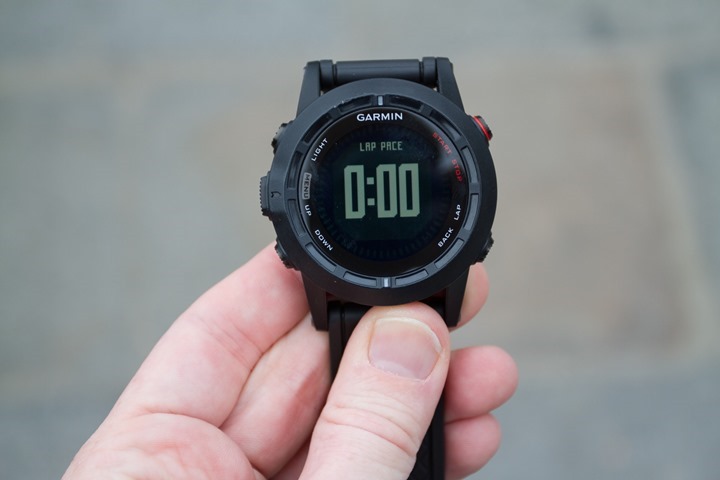
Some pages can also have graphs, such as this:
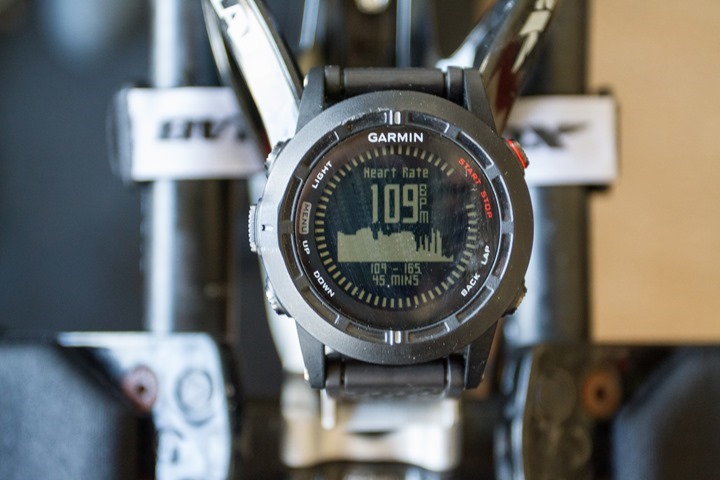
You can customize any of the sport profiles (in-box or custom) with any pages you’d like. And in turn, any fields you’d like. The following fields are available for you to select from (click to zoom):

Finally, there are a number of other areas that you can customize in the watch. To cover all of them all would take pages upon pages. But, here’s the most commonly requested items:
Sounds/Vibrations: Whether there are beeps/buzzes for everything from pressing buttons to notifications to alerts to the alarm clock.
Display: You can tweak how long the backlight stays on (and how bright it is), as well as the contrast.
Time Related: You can change how the default time page on the unit looks, as well as which format (i.e. 12hr or 24hr), as well as the date, or even if seconds are displayed on the default page. Or whether sunrise/sunset times are displayed, or the date. Tons of flexibility. Finally, you can either go with automatic time zone, or override it to stay in a specific time zone.
Language: You can change the language to a slew of different languages.
Units: You can separately specify each how Distance, Pace/Speed, Elevation, Weight, Height, Depth, Temperature, Pressure, and Vertical Speed are displayed, with respect to metric or statute formats for each one. For example, you could show distance in kilometers, but elevation in feet.
There’s many more little settings in there, from the GPS update mode, to alerts to data recording rate and whether distance and elevation is recorded in standard mode or 3D mode, to the method the compass displays degrees. But the above covers the common requests.
Updating the Firmware:
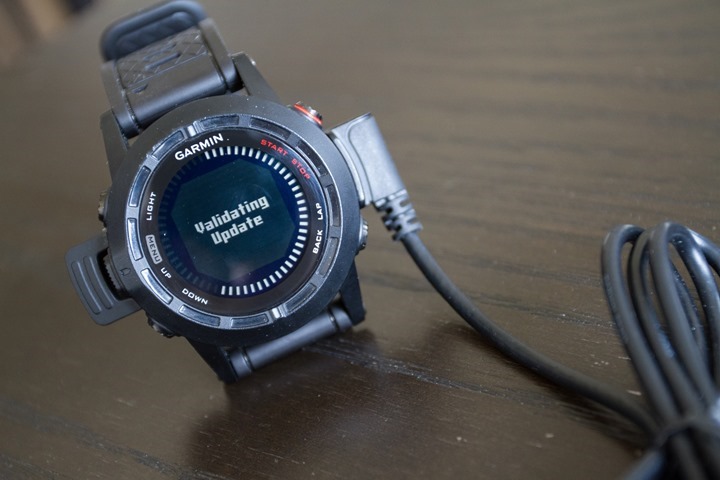
The Fenix2 supports the ability to have its firmware updated. This allows Garmin to both fix/address bugs, as well as introduce new features.
The Fenix team falls under the Outdoor division at Garmin, not the traditional Fitness division that devices like the Garmin Forerunner and Edge units come from. Historically speaking looking at the first generation Fenix unit, the Fenix team has introduced a stunning number of updates and feature enhancements. Even as recently as a week ago it was still getting new feature updates – for a product released nearly 2 years ago. Hopefully that trend will continue with the Fenix2 and expansion of new features and bug fixes over time.
Updating the firmware can be done via Garmin Express, or Garmin Web Updater – both on a computer. Additionally, the Garmin Connect Mobile app will also notify you of firmware updates to be installed.
Generally speaking the update process only takes 1-3 minutes, and is painless. I haven’t seen a scenario yet in the last 4-5 weeks where I had to re-setup my settings or configuration. All of that has been kept.
Bugs and Miscellaneous:
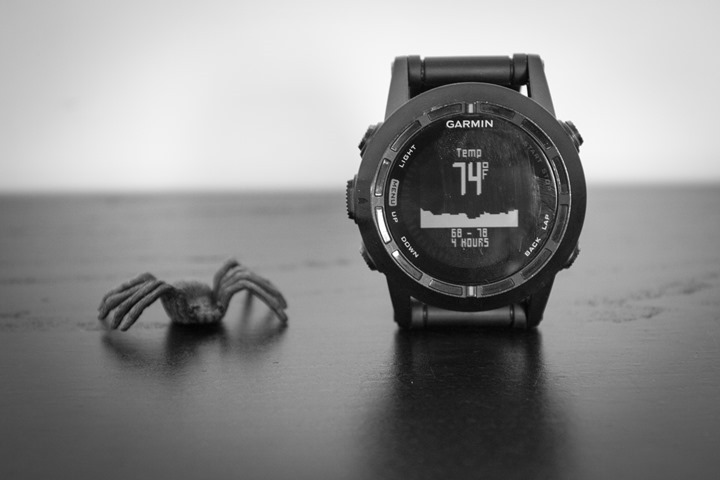
As I’ve been doing on all reviews over the past year or so, I’ve been including a section on bugs and/or issues that I’ve seen within my timeframe using the unit. Do remember that a ‘bug’ is different than ‘by design’. For example, the lack of a feature is something I highlight within a given section is considered ‘by design’, whereas something not really working right is considered a bug. In the case of the Fenix2, such bugs fall into one of two categories: The device, and the platform (app/site).
Looking at the device side of things, the Fenix team continues to be mind-bogglingly efficient at resolving anything and everything I see bug-wise. Thus, after having the unit for well over a month now, any bug I’ve raised they’ve fixed. They’ve also added many (almost every) feature/tweak that I’ve requested. The vast majority of these feature requests were really requests coming from you (readers).
Now, there are a few areas that are potential grey-area bugs, where it’s likely a situation that they can’t do much about:
1) Phone upload times: This just takes a month of Sunday’s to transfer the file via Bluetooth to the phone. I don’t think this is so much a bug, as just a case of ‘it is what it is’. Update: This has been improved dramatically in the months since my initial review.
2) Saving a workout: Same thing here as well, this takes forever. In the grand scheme of life it’s not a big deal, but to wait a few minutes (or more) to simply save a workout can be a touch bit annoying. Update: This has been improved dramatically in the months since my initial review.
3) Swim does not show rest periods on Garmin Connect: This is part Fenix dependent, and part Garmin Connect dependent. Either way, it’s not showing the rest time (Added post-review).
Beyond that though, the device is really solid from what I’ve tested. Note that it’s slightly challenging however in that the Fenix team has been iterating versions quite quickly – so re-checking every single item on firmware released as often as yesterday is impossible for me.
Next, we’ve got the app. On the mobile app side, I’m just not seeing any issues functionality-wise there with respect to the Fenix2. It simply works, from my use of the iOS app. There’s the slowness piece on transfer I noted above, but beyond that – it all works.
Lastly, we’ve got Garmin Connect (the site). I talked about this a fair bit last week in my Vivofit review. As it stands right now, things are a bit of a mess in Garmin Connect. They launched a new Garmin Connect interface about a month ago, and it’s still pretty rough. In general, if you stay within the ‘classic’ mode, you’ll largely be fine. And in due time this will sort itself out. But for now, they need one of those 1990’s style ‘Under Construction’ blinky icons that web pages used to display.
Again, this doesn’t mean this is all the bugs out there. These are just the ones I saw during my use. As a single person I can’t possible test every possible feature in every possible combination to reproduce every possible scenario. Sure, I’d love to – but companies have entire teams of testers and they still miss things. So I do the best I can to note what I’ve seen above. If you have bugs, please post them to the Garmin Forums, or report them to Garmin. That’s the correct channel to get them fixed.
Comparison Tables:
Before we wrap things up I’ve put together the comparison charts of all the features of the Fenix2 and original Fenix, compared to the Garmin FR910XT, and Suunto Ambit 2 (closest competitors). You can of course create your own comparison tables using this link with any of the products I’ve previously reviewed/looked at, such as adding in the new Polar V800, which is Polar’s upcoming tri watch.
| Function/Feature | Garmin Fenix2/Fenix2 SE | Garmin Fenix | Suunto Ambit2 | Garmin Forerunner 910XT |
|---|
| Copyright DC Rainmaker - Updated April 29th, 2021 @ 5:06 am New Window |
| Price | $399 | $299 (on sale) | $319 | $399 |
| Product Announcement Date | Feb 20, 2014 | JUL 10, 2012 | APR 29, 2013 | OCT 4, 2011 |
| Actual Availability/Shipping Date | March 2014 | AUG 2012 | May 2013 | JAN-APR 2012 |
| GPS Recording Functionality | Yes | Yes | Yes | Yes |
| Data Transfer | USB/Bluetooth Smart | USB & Bluetooth Smart | USB | ANT+ Wireless |
| Waterproofing | Yes - 50m | Yes - 50m | Yes - 100m | Yes - 50m |
| Battery Life (GPS) | 50 Hours | 50 hours | 50 hours | 20 Hours |
| Recording Interval | 1S to Variable | 1s to variable | Variable | 1s or Smart |
| Alerts | Vibrate/Sound/Visual | Vibrate/Sound/Visual | Sound/Visual | Vibrate/Sound/Visual |
| Ability to download custom apps to unit/device | No | No | Yes | No |
Connectivity | Garmin Fenix2/Fenix2 SE | Garmin Fenix | Suunto Ambit2 | Garmin Forerunner 910XT | | Bluetooth Smart to Phone Uploading | Yes | Yes | No | Via Wahoo Fitness Adapter |
| Phone Notifications to unit (i.e. texts/calls/etc...) | Yes | Yes | No | No |
| Live Tracking (streaming location to website) | Yes | Yes (as of Feb 2014) | No | No |
| Emergency/SOS Message Notification (from watch to contacts) | No | No | No | No |
| Built-in cellular chip (no phone required) | No | No | No | No |
Cycling | Garmin Fenix2/Fenix2 SE | Garmin Fenix | Suunto Ambit2 | Garmin Forerunner 910XT | | Designed for cycling | Yes | Yes | Yes | Yes |
| Power Meter Capable | Yes | No | Yes | Yes |
| Power Meter Configuration/Calibration Options | Yes | N/A | Yes | Yes |
| Power Meter TSS/NP/IF | Yes | N/A | No | Yes |
| Speed/Cadence Sensor Capable | Yes | Yes (full support added Sept 2013) | Yes | Yes |
Running | Garmin Fenix2/Fenix2 SE | Garmin Fenix | Suunto Ambit2 | Garmin Forerunner 910XT | | Designed for running | Yes | Yes | Yes | Yes |
| Footpod Capable (For treadmills) | Yes | Yes | Yes (internal accelerometer) | Yes |
| Running Dynamics (vertical oscillation, ground contact time, etc...) | Yes | No | No | No |
| VO2Max Estimation | Yes | No | Yes | No |
| Race Predictor | Yes | No | No | No |
| Recovery Advisor | Yes | No | Yes | No |
| Run/Walk Mode | Yes (Added June 13th, 2014) | No | No | Yes |
Swimming | Garmin Fenix2/Fenix2 SE | Garmin Fenix | Suunto Ambit2 | Garmin Forerunner 910XT | | Designed for swimming | Yes | No | Yes | Yes |
| Openwater swimming mode | Yes | N/A | Yes | Yes |
| Lap/Indoor Distance Tracking | Yes | N/A | Yes | Yes |
| Record HR underwater | No | No | No | No |
| Openwater Metrics (Stroke/etc.) | Yes | N/A | Yes | Yes |
| Indoor Metrics (Stroke/etc.) | Yes | N/A | Yes | Yes |
| Indoor Drill Mode | Yes | N/A | Yes | No |
| Indoor auto-pause feature | No | N/A | No | No |
| Change pool size | Yes | N/A | Yes | Yes |
| Indoor Min/Max Pool Lengths | 18m/20y to 150y/m | N/A | 15m/y to 1,200m/y | 20m/22y to 100y/m |
| Ability to customize data fields | Yes | N/A | Yes | Yes |
| Captures per length data - indoors | Yes | N/A | Yes | Yes |
| Indoor Alerts | Yes | N/A | No | Yes |
Triathlon | Garmin Fenix2/Fenix2 SE | Garmin Fenix | Suunto Ambit2 | Garmin Forerunner 910XT | | Designed for triathlon | Yes | No | Yes | Yes |
| Multisport mode | Yes | N/A | Yes | Yes |
Workouts | Garmin Fenix2/Fenix2 SE | Garmin Fenix | Suunto Ambit2 | Garmin Forerunner 910XT | | Create/Follow custom workouts | Yes | Yes (As of Dec 6, 2013) | No | Yes |
| On-unit interval Feature | Yes | Yes (As of Dec 6, 2013) | Barely | Yes |
| Training Calendar Functionality | Yes (Added June 13th, 2014) | No | No | Yes |
Functions | Garmin Fenix2/Fenix2 SE | Garmin Fenix | Suunto Ambit2 | Garmin Forerunner 910XT | | Auto Start/Stop | Yes | Yes | Yes | Yes |
| Virtual Partner Feature | Yes | Yes | No | Yes |
| Virtual Racer Feature | No | No | No | Yes |
| Records PR's - Personal Records (diff than history) | No | No | No | No |
| Tidal Tables (Tide Information) | No | No | No | No |
| Weather Display (live data) | No | No | No | No |
Navigate | Garmin Fenix2/Fenix2 SE | Garmin Fenix | Suunto Ambit2 | Garmin Forerunner 910XT | | Follow GPS Track (Courses/Waypoints) | Yes | Yes | Yes | Yes |
| Markers/Waypoint Direction | Yes | Yes | Yes | No |
| Offline Maps | No | No | No | No |
| Back to start | Yes | Yes | Yes (added Aug 30, 2013) | Yes |
| Impromptu Round Trip Route Creation | No | No | No | No |
| Download courses/routes from phone to unit | Yes | Yes | No | No |
Sensors | Garmin Fenix2/Fenix2 SE | Garmin Fenix | Suunto Ambit2 | Garmin Forerunner 910XT | | Altimeter Type | Barometric | Barometric | Barometric, GPS (FusedAlti) | Barometric |
| Compass Type | Magnetic | Magnetic | Magnetic | GPS |
| Heart Rate Strap Compatible | Yes | Yes | Yes | Yes |
| ANT+ Heart Rate Strap Capable | Yes | Yes | Yes | Yes |
| ANT+ Speed/Cadence Capable | Yes | Yes | Yes | Yes |
| ANT+ Footpod Capable | Yes | Yes | Yes | Yes |
| ANT+ Power Meter Capable | Yes | No | Yes | Yes |
| ANT+ Remote Control | No (can control VIRB though) | Yes | No | No |
| ANT+ eBike Compatibility | No | No | No | No |
| Shimano Di2 Shifting | No | | No | No |
| Bluetooth Smart HR Strap Capable | No | No | No | No |
| Bluetooth Smart Speed/Cadence Capable | No | No | No | No |
| Bluetooth Smart Footpod Capable | No | No | No | No |
| Bluetooth Smart Power Meter Capable | No | No | No | No |
| Temp Recording (internal sensor) | Yes | Yes | Yes | No |
| Temp Recording (external sensor) | Yes | Yes | No | No |
Software | Garmin Fenix2/Fenix2 SE | Garmin Fenix | Suunto Ambit2 | Garmin Forerunner 910XT | | Desktop Application | Garmin Express | Basecamp | Moveslink Agent | GTC/ANT Agent |
| Web Application | Garmin Connect | Garmin Connect | Movescount | Garmin Connect |
| Phone App | iOS/Android | Garmin Basecamp (iOS) | Suunto Movescount | iOS/Android |
| Ability to Export Settings | No | Yes (profiles XML) | Yes (online) | No |
Purchase | Garmin Fenix2/Fenix2 SE | Garmin Fenix | Suunto Ambit2 | Garmin Forerunner 910XT | | Amazon | Link | Link | Link | Link |
DCRainmaker | Garmin Fenix2/Fenix2 SE | Garmin Fenix | Suunto Ambit2 | Garmin Forerunner 910XT | | Review Link | Link | Link | Link | Link |
The tables are updated dynamically and thus if/when things change that’s represented automatically in this section. And again, remember you can create your own charts easily here with any product you’d like.
Which watch?
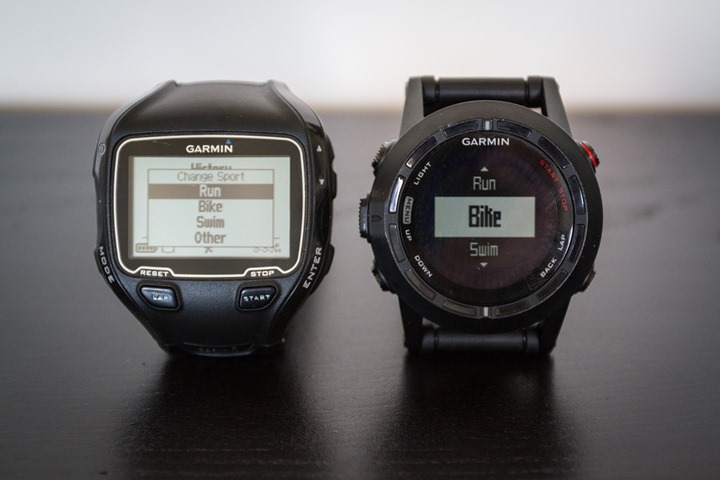
Trying to decide which watch makes the most sense? Well, there’s a lot of options on the market today, and almost all of them have a compromise in one way or another. There actually isn’t yet the ‘perfect’ device in terms of taking advantage of all the technology advancements we’ve seen in the last 6-12 months. Instead, the picture is still a bit fragmented. That said, let’s look at the options in the same general price range:
Garmin FR910XT: Up until the Fenix2, this has been the most powerful triathlon watch on the market. There’s no two ways about that. The Fenix2 coming along snuggles up next to the Garmin FR910XT, but doesn’t actually blow it out of the water. It adds areas like Bluetooth Connectivity – but at the cost of concurrent ANT+ and Bluetooth Smart (like the FR220/FR620). It also adds/has integration with a slew of devices that the FR910XT doesn’t support (i.e. VIRB, Tempe, Chirp), as well as Ski-Board mode and navigation capabilities that far exceed the 910XT. However, it does lack some smaller features currently, such as ANT+ weight scale integration. For those with a FR910XT already, who are primarily using it just for swim/bike/run, I’d probably stick with the FR910XT. However, if you wanted greater navigational features, Running Dynamics, or Bluetooth upload support – then I’d look more closely at the Fenix2. Ultimately, there won’t be a direct FR910XT successor this triathlon season, so the options you see on the table now in this price range – are the options that are available for the season.
Polar V800: Polar launched the V800 back in January, with the unit set to hit retailers later this spring (looks like May at the moment). The V800 is purely Bluetooth Smart only, so there’s no ANT+ support for folks with existing accessories/sensors. The exact specifications of the unit in a triathlon configuration remain somewhat murky though. Initial plans around swim functionality (lap tracking, etc…) have been pushed to “later in 2014”, and many of the planned phone and navigation features have suffered a similar fate. The unit’s built-in 24/7 activity tracker is a huge market differentiator to other devices on the market, however, the implementation of the device remains to be seen. At this point, I really can’t make a recommendation one way or another on the V800, simply because I don’t know yet what’s going to be included within the unit upon initial availability this spring (and my recent repeated asks have gone unanswered). And ultimately, that makes a huge difference in determining whether it’s basically just a waterproof Polar RC3 with Bluetooth Support/Activity Tracker, or if it’s a major new competitor in the market.
Suunto Ambit 2/2S: Suunto makes what is today the most direct competitor to the Fenix/Fenix2. Like the Fenix, the Ambit started off in the hiking/navigation realm, and like the Fenix2, it wandered into the triathlon scene with the Ambit 2/2s. From a swim/bike/run standpoint, the Ambit 2/2S is a very capable unit for racing and training. It contains the ability to load small ‘apps’ onto it, developed for the Ambit. Though, it lacks any of the Bluetooth capabilities, thus mobile connectivity is out. From a hiking standpoint, it contains many of the same core features as the Fenix2, though most would argue that the Fenix lineup has a greater breadth of features. Whether or not you (or most) need some of those features like ‘Man Overboard’ or ‘Area Calculation’ is likely a valid question to ask.
Garmin FR620: Let’s be clear up front, the FR620 is not a triathlon watch, and it never will be. It’s a runner’s watch – and that’s it. A really darn good one, but, still, not a device aimed at either triathletes or a hikers. It doesn’t contain a barometric altimeter, or any of the navigational capabilities of the Fenix2 (or FR910XT). it does however allow you to concurrently utilize Bluetooth Smart and ANT+, which means you can do Live Tracking while still using ANT+ sensors. And that in and of itself is a huge thing. While the unit will gain a cycling mode with ANT+ speed/cadence sensor support later this spring as part of a firmware update, however, Garmin has confirmed the FR620 won’t be getting any navigation related features this spring.
TomTom Multisport: The TomTom unit is a good option, but it’s also not really in the same price range as what we’re talking about. It also lacks all of the advanced features. If you were to put together a detailed feature matrix (even beyond what I have in the comparison tables), you’d find that the TomTom unit has about 5-10% of the total features of the Fenix2. Now, that doesn’t mean it’s not a good triathlon unit – as it is. Rather, the TomTom unit isn’t a good navigational/hiking/ultra type unit – it simply isn’t targeted there. And that’s perfectly fine.
Summary:
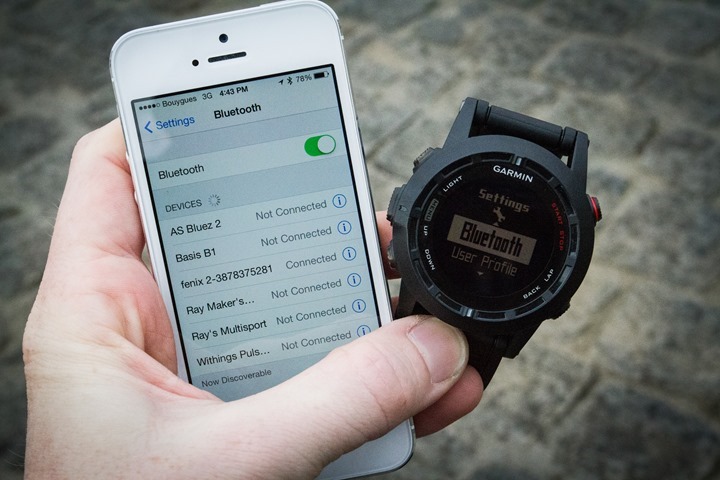
Make no doubt about it, I’m impressed with where the Garmin Fenix team has brought the Fenix over the last 2 years, culminating in the Fenix2. Many triathletes have asked Garmin to make a watch that doesn’t look like a bulky computer on their wrist, but still does all the swim/bike/run goodness. Now they (mostly) have that. By the same token, understand that there are tradeoffs right now in what the Fenix2 offers, especially around Bluetooth Connectivity.
The industry is simply in a slightly awkward phase where there’s a lot of new technology integration partly implemented and coming, but getting it all in one single killer device seems to be a bit elusive. When I look at ‘new technology integration’, I’m talking about integrated Bluetooth & ANT+ support (concurrently), integrated activity monitor/tracker (24×7), optical heart rate, and phone apps that not only simply pair to the device – but extend the functionality. In many ways, for any device on the market today you’re going to have to make some sacrifices.
But at the end of the day, I feel it’s better to pick a device that fits 90% of the bill today, rather than wait a season or two for a device that does it all (or, does it all until you learn about some new ‘must-have’ feature). After all, if the theory is that the device improves your training and thus your results (or simply brings joy), then waiting simply delays those training benefits. Which isn’t to say you should or shouldn’t pick the Fenix2. As the previous section outlined, there’s a lot of great devices on the market – all of them will help you train quite well. It’s the details that differentiate them. Hopefully, this post and its few thousand words on details helped illuminate those key device differences.
Found This Post Useful? Support The Site!
Hopefully you found this review/post useful. At the end of the day, I’m an athlete just like you looking for the most detail possible on a new purchase – so my review is written from the standpoint of how I used the device. The reviews generally take a lot of hours to put together, so it’s a fair bit of work (and labor of love). As you probably noticed by looking below, I also take time to answer all the questions posted in the comments – and there’s quite a bit of detail in there as well.
If you're shopping for the Garmin Fenix or any other accessory items, please consider using the affiliate links below! As an Amazon Associate I earn from qualifying purchases. It doesn’t cost you anything extra, but your purchases help support this website a lot.
Since the Garmin Fenix is no longer sold, I recommend looking at
Garmin Fenix 6 Series:
Here's a few other variants or sibling products that are worth considering:
And finally, here’s a handy list of accessories that work well with this unit (and some that I showed in the review). Given the unit pairs with ANT+ & Bluetooth Smart sensors, you can use just about anything though.
This wifi-connected scale will track your weight and related metrics both on the scale display and in Garmin Connect (plus 3rd party apps like TrainingPeaks). It'll also then sync your weight to your watch/bike computer, to ensure accurate calorie data.
This is a dual ANT+/Bluetooth Smart cycling cadence sensor that you strap to your crank arm, but also does dual Bluetooth Smart, so you can pair it both to Zwift and another Bluetooth Smart app at once if you want.
Seriously, this will change your life. $9 for a two-pack of these puck Garmin chargers that stay put and stay connected. One for the office, one for your bedside, another for your bag, and one for your dog's house. Just in case.
These are one of my favorite power meters, due to both cost and accuracy. These have mostly become my defacto gravel pedals, and also get used on a lot of other comparison testing.
The Garmin Rally series is effectively 3 power meters in one, for three pedal types. I use these often in accuracy testing. While they're a bit more expensive than the Favero pedals, they offer the ability to swap pedal types easily.
The HRM-PRO Plus is Garmin's top-end chest strap. It transmits dual ANT+/Bluetooth Smart, but also transmits Running Dynamics & Running Pace/Distance metrics, stores HR data during a swim, and can be used without a watch for other sports. Also, it can transmit XC Skiing Dynamics as well.
And of course – you can always sign-up to be a DCR Supporter! That gets you an ad-free DCR, access to the DCR Quarantine Corner video series packed with behind the scenes tidbits...and it also makes you awesome. And being awesome is what it’s all about!
Thanks for reading! And as always, feel free to post comments or questions in the comments section below, I’ll be happy to try and answer them as quickly as possible. And lastly, if you felt this review was useful – I always appreciate feedback in the comments below. Thanks!


















































































































































































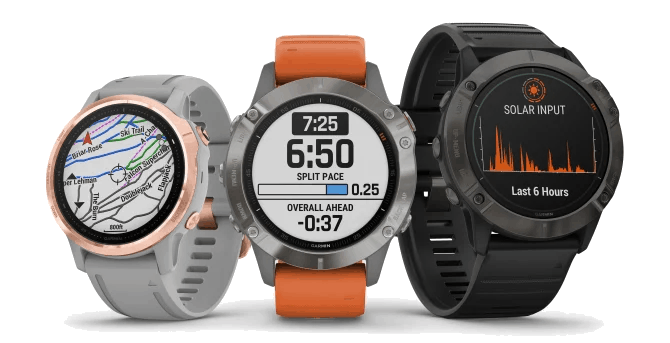
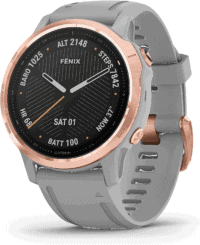
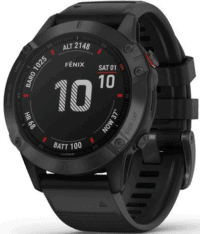
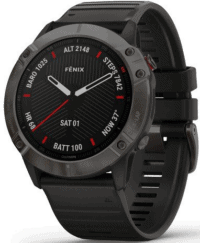
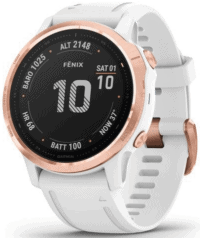
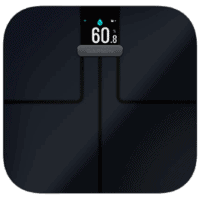
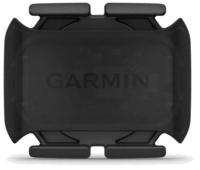
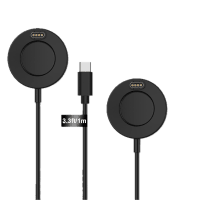
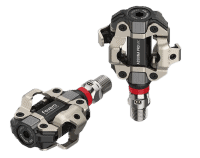
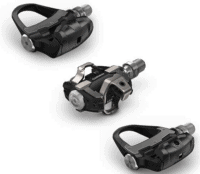
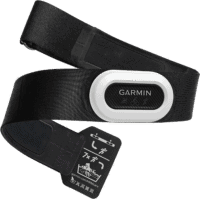













Hi Ray,
I just used my Fenix2 on a OWS for the first time tonight, a couple things happened.
1. After the swim the OWS session was saved as “a navigation”?
2. And the distance was doubled, and the upload to Connect shows me doing loop-de-lo’s in the water? ( I know I sight bad, but not that bad). And there was no stroke information recorded (do to it being “a navigation”???)
My unit is on firmware 2.90
Anyone ever heard of this?
Chris
Also got no stroke information on an OWS with my F2 (v2.9).
When you started the activity, I assume you selected “Open Water Swim”? And any chance somehow you got into a navigation mode after doing that?
Don’t think mine went into navigation mode, started the activity as OWS.
Another thing that seemed weird was that the activity type showed up in GC as “Other” (not even “Swimming” like how pool swims do) after synching via BLE.
Hello, mine made the same.
If I select pool swiming it records the activity with all swin data, but if I choose OWS, it records as “Other” without the swim info (no stroke information…).
Past weekend I try the multisport mode, OWS + BIKE + RUN and the same issue. And into GC the swim info is loaded as OTHER ACTIVITY.
@Haitz
As I’m currently in discussion with the Garmin product support about OWS functionality, can you please share the link to your Multisport activity on GC (and eventually the FIT file), in order to have more cases to analyse ;)
Thank you in advance
Here is the link:
link to connect.garmin.com
Best regards!
If i use it as a daily watch. How long will the battery last just showing the time?
Garmin states about 5 weeks in that mode.
Hi Ray
Are any updates expected around the GPS accuracy issue ?
My Fenix 2 is going back to the seller. Had a flawless unit, gave me no headaches after all. I’d better stick to a more basic product (probably missing navigational features) until Garmin makes this device worth the 450$ it costs, starting from it’s GPS accuracy, which is shamefully less accurate than 5 year old models.
I haven’t seen anything that indicates changes there. But, have you tried some of the changes suggested above? For example ensuring you’re on 1-second recording and trying to disable WAAS?
Hi, have tried those. Still poor reception. It’s a pity as I do really love this watch for its appearance and interface!
I have had my fenix now for over a month. I have not used the swim function or the multisport yet, but for several bike rides and runs. I actaully have an edge 800 and 310. For the first couple of weeks I would use both for comparison. I have had no issues with GPS accuracy. Road rides and runs kept track +/_ 3ft of where I was running/cycling as compared to google maps and right in line with the other 2 watches. I have had no lockups either. I hope to get a chance to try swim and multisport soon, but overall, the watch has performed flawlessly for me. The upgrades have tremendously decreased save times and the only complaint I have is the inverted screen. I knew about this when I purchased it, so I just reduced the number of screens to 2 or 3 depending on menu and sport and enjoy. I have waas disabled, autolap disabled and autoscroll disabled. Using 1 sec recording and watch even finds location quick except for one day when cloud cover was very thick. I will be keeping my Fenix2 and enjoy it as Garmin keeps updating firmware.
Spun- Might try turning off the compass. I’ve had an increase in accuracy doing that. I have no idea why. Take a look at the thread at the link below that I started about this. The compass issue might be something, or it might just be an anomaly for me and my specific location.
link to forums.garmin.com
Hi JQC. I’d say I tried with Compass OFF without significant improvement. Will keep trying this weekend. I wanna make it work – as cyclingfool states, my device is working nice too, except for the GPS.
Tried 1sec recording, WAAS off, compass off. Satellite locking was very slow. I suspect it simply does not pre-cache the satellites. Accuracy was very awful, 18m in open, sunny sky?
Hmm, definitely sounds like something odd is up there. I assume you’ve tried a full reset (just copy your activity files off to your computer first). Failing that, I’d ring up support and have them simply swap out the unit.
For the pre-cache, you should see an EPO.BIN file in there.
Just to be clear, there are two normal ways to get a satellite ephemeris (EPO.bin) on your Fenix. You either plug it into a computer with Garmin Express running and it syncs successfully, or you sync it with the Garmin Connect iOS app. It’s not something that the Fenix puts there itself based on what the satellites are sending.
I managed to get the epo.bin file. However the GPS tracking is still not accurate. Do you think that it is because of a defective unit? I say it because I have heard a lot of complaints about the GPS accuracy of the device…
I’d look at getting it swapped out. It definitely sound defective. I just don’t see those type of accuracy issues on mine, and most don’t.
I agree about getting it replaced, but first I’d look at the actual track and see what it looks like. Personally I don’t care about what the device says about the estimated error (I don’t even show that field on my Fenix) if the actual track is accurate compared to a map most of the time. Even my old reliable Edge 800 will occasionally (on the order of once every two months or so) go nuts and track in the middle of a field or through someone’s house or something. It happened last weekend for 1/4 mile or so with clear skies on a paved road during a mountain bike ride, but was fine in the mountains where you’d expect something like that to happen. If the tracks are reliable, then don’t worry about what it says. If the tracks aren’t reliable, get it replaced. My Fenix tracks pretty well for a device that small with a small antenna.
Well, so far I’ve had mine about a week now and I’ve gotten in 3 run, a bike and two pool swims. By the end of the weekend I’ll have 2 more bikes, an outdoor swim and another run so I’ll have a good feel for all of the bits of functionality I will use the most.
I’ve seen some complaints of accuracy but I’ve run routes I’ve been running for years and the autolap signals exactly where every other watch has so I have no complaints there. I currently have WAAS on and 3D distance/speed off (I found that didn’t work so well…I think. Hard to tell)
So far I’ve been very impressed with satellite pickup speed, ease of use and the amount of information I get from the watch even without the HR monitor which I may or may not get eventually. I feel like cadence, which I’ve never had before, is the most important metric anyway.
So, I’m loving it so far! This is by far the most advanced GPS watch I’ve had. Can’t wait till the winter to try it with skiing. The only sport I do that it doesn’t I think is SCUBA
I know that some people have been complaining about accuracy issues but you really shouldn’t be having them. Here is my ride yesterda: link to connect.garmin.com
Note that the laps on each loop almost all completely overlap each other. Its actually fairly impressive in accuracy with WAAS and nothing else.
Well, yeah, that’s kind of the point. They shouldn’t be having them, but they do.
Well actually if you approximate the image you will see that your GPS has you going thru the trees in a few corners. sometimes it has you going in the opposite lane. I am pretty sure you didn’t ride in the middle of lane of the opposite side of the road. If you did, try not to it, it is pretty dangerous. ;-)
According to the garmin website when WAAS is turned on you would have an accuracy of up to 3 meters. The variations you are having there are around 15-20 meters (maybe more then that).
That is the accuracy of GPS without WAAS.
That’s the point of all the complaints. WAAS or NO WAAS it seems the accuracy of the Fenix 2 is the same as my FR 305 bought in 2009 (maybe 2010).
My experience was decent GPS accuracy (in line with Edge 810) while riding, but running was way off. I would only be guessing that the relative stability or orientation of the watch while riding provided a better platform.
Running was a completely different watch; GPS issues, HRM drops, and lack of interval alerts… ARGHHH!
Just my $0.02
Actually there is no road and only one very wide lane. That is a park trail designed for no motor vehicles. But yes, I didn’t go through the trees. 8)
Does it still state in the warranty that the watch is not an accurate measuring device like with my 405?
this is the response I received from Garmin support reference GPS Accuracy
“It is my pleasure to assist you. Today’s GPS receivers are extremely accurate, thanks to their parallel multi-channel design. Certain atmospheric factors and other sources of error can affect the accuracy of GPS receivers. Garmin® GPS receivers are accurate to within 15 meters (49 feet) 95% of the time. Generally, users will see accuracy within 5 to 10 meters (16 to 33 feet) under normal conditions.”
My interpretation – do not expect your plot to be on the correct side of the road and do not get excited if 5% of the data is ‘in the woods’.
Except that with all these complaints I started wearing my 910xt at the same time. Up to 1% difference between the units, but the fenix2 spits out crap like this.
link to i1059.photobucket.com
The 910xt GPS track isn’t always perfect, but most of the time it does have me on the correct side of the street.
Question: Is the Fenix worth upgrading to the Fenix 2 if you’re not focused on swimming?
The features are almost the same, the only differences are: Android support (though I suppose both are not supported?) and GPS (is it also more accurate on the Fenix 2?)
I wonder if I should sell my Fenix and get the Fenix 2, I’d like the inverted display more, but other than that it seems to be only worth it if you are a swimmer..
I’d be glad if someone can help, thanks a lot
There are other differences. On the Fenix, you can set the normal GPS recording interval arbitrarily based on time or distance; you can’t do that on Fenix 2. Profiles are easier to deal with on the Fenix; they’re file based, so you can duplicate/change them by hand, and customize them at will. Except for the downhill skiing profile, you can get rid of them entirely. Based on the complaints I’ve read here and on the Garmin forums, navigating seems to work better on Fenix than on Fenix 2. So the changes made between Fenix and Fenix 2 have not all been positive.
Fwiw, I checked in on Android support last week. They shifted directions a bit apparently – which was/is the cause of the delay. Previously they were going to split it into two phases and do the general Garmin Connect Mobile pieces first (i.e. workout upload, live tracking, etc…) and then do the notifications pieces second (June). They decided to tackle both at once and split the difference (roughly) on timelines.
The dev work is complete, and they’re just in testing and validation at this point. I don’t have an exact day for release, but, just providing a bit of what’s going on.
Im wondering if HRM-run monitor in GARMIN FENIX 2 Performer Bundle is waterproof so you can Put it on before swim, without loosing time beferofe cycling
Yes, it is. It’s what virtually all triathletes do. Cheers.
One thing on this..
The user manual says that the F2 won’t record HR data when swimming, but that seems silly since the HRM is waterproof..
Do you know if there’s any chance that this will be supported or is it an ANT+ connectivity problem in water?
It’s a limitation of the transmission. Neither ANT+ nor Bluetooth Smart transmit more than about 1″ underwater.
That makes sense, thanks for confirming..
Bummer, though, monitoring HR while swimming would definitely be valuable..
Perhaps the optical technology will bring it to us..
Thanks!
So the GPS code still has some bugs. Here’s a blog post I did showing a run I happened to record with the Strava app on my iPhone5s as well as my Fenix 2:
link to carefreeway.com
Somehow the Fenix2 threw in a bonus .7 miles! I could sort of understand a data point blip, but as you can see it REALLY starts to drift badly before the really odd data points appear. I had this happen a time or two before the last update to the GPS code, but this is the first time since.
Gonna post this on the Garmin forum, too, so hopefully the Fenix team sees it, but Ray if you can forward it on directly to them I’d appreciate it. Willing to provide whatever data I can that might help them.
–Donnie
Simple question, Garmin UK offered two type of fenix2, one is watch only and another one is performer bundle. If I buy watch only, does it mean I cannot used HRM function? Can I buy watch only at first place and then buy device to use the HRM function. I worried if I buy the watch only, then I can’t use the functionality of HRM then it will be wasteful. Please advice, thank you!
You can always buy any ANT+ HR strap later on and use with with the Fenix2. There’s no difference in the physical watch itself.
Note however that if you don’t buy a HR strap (of any variety), then of course you won’t get HR displayed on the unit. Enjoy!
Perfect Ray. I would be considering buying fenix2 watch only first. But before this I was thinking buying Adidas micoach as it has strip-free HRM but it does a lot limitation like you have take it off if you want to swim. What do you think?
Sorry, which Adidas HR strap? I think a long while ago they made an ANT+ one, but just validate it’s not a Bluetooth Smart one.
I currently have the Forerunner 620 and have been disappointed with the gps accuracy. Do you know if this is more accurate at all?
Thanks.
Here find a good test of accuracy comparation link to fellrnr.com
Except, it’s not really. It’s only a single route repeated over and over again and units aren’t compared at the same time (thus, you can’t see if an issue affects both units worn the same day/run). No doubt he does cool work, but I don’t see it as a very good sample of real world conditions.
Yes test metodology its no so clear to me, in some point talk about test two GPS at same time “recorded on 9/20 and 9/22. In each run I recorded data on both the 310 and 910 watches”, so i undertood that its with a numer of test (i don’t kown the number) and then a staditical results.
Except the fact that there are multiple examples from real users in the real world which support these results.
And there are far more cases of not having issues. Which, is fundamentally always the problem. People who don’t have issues don’t complain. By the same token, swing over to any of the other GPS sub-forums on Garmin’s site, and you’ll find a person who has an odd GPS track for every single unit Garmin has made. Or, Suunto, or Polar, or anyone else.
I’m not saying that some people don’t have problems with their specific units. I’m simply saying don’t use a single GPS course as a basis for all GPS testing ever, no matter how many times you do it.
We’ll agree to disagree on this. Most people don’t wear more then one watch when running. I didn’t have problems with the fenix 2 gps and I still don’t. The accuracy is ‘okay’. However when I decided to compare it to the 910, it’s clear that the 910 is more accurate.
I’d also say that most people will not go to the forums when they have minor issues that they can work around (ie no alerts in customized workouts, no pool swim for multisport)
I received the following response from Garmin Support reference GPS Accuracy.
“It is my pleasure to assist you. Today’s GPS receivers are extremely accurate, thanks to their parallel multi-channel design. Certain atmospheric factors and other sources of error can affect the accuracy of GPS receivers. Garmin® GPS receivers are accurate to within 15 meters (49 feet) 95% of the time. Generally, users will see accuracy within 5 to 10 meters (16 to 33 feet) under normal conditions.”
My interpretation: Given that the average lane width in the USA is 12 feet, do not expect the plot to be accurate to the correct side of the road (or even on the road) and expect 5% of the plot to be significantly off. Like most Hardware/Software components, it’s a matter of setting expectations.
-ted
Cool. I think that’s reasonable. We can’t expect too much of todays technology yet.
According to the research above (flawed methodology or not) it seems to correlate with what most people say here and on the 620 page. the 910 seem to be the most accurate followed by the 310/F2 and last would be the 620.
I don’t own the 910 or the 310. From personal experience though I’ve run with the F2 and the 305 in the same runs and in every run their accuracy is the same. WAAS or No WAAS. Given they are both within the range that Garmin says is normal for their accuracy then I guess that is ok.
I just wish it was better then the 305.
By taking 1,000s of samples, the differences by time should even out. (I did detailed analysis of satellite position, dilution of precision, etc. to verify this.)
I have run with multiple watches at the same time. You do get variation between units on the same run, as noted in the analysis. However, the general patterns shown in the statistics are valid in real world usage. The good units have occasional issues, the bad units (620, Fenix 2) are consistently bad and occasionally outrageously bad. I’ve tested multiple 620 and Fenix 2 units, which is not enough to be a statistical sample of units, but it’s enough to show it’s not just one bad unit.
My one course represents multiple different conditions, and is a tough course for a GPS, but that helps show up the differences. If you generally run in straight lines with open skies, you’d probably see far less issues.
I’ve done a lot more testing of the 620 and Fenix 2 than other units to determine the underlying cause of the problems. I’ve worked with GPS engineers to get their insight and looked at issues like EPO staleness, but so far there’s no clear answer.
In terms of the spread of GPS accuracy problems, I’ve been contacted by a number of users who’ve seen problems with the 620/Fenix 2, but I’ve not had complaints for other units (other than the Polar V800 that I’ve not yet tested.)
One note is that the statistics for the Fenix 2 do not completely reflect the problems. A number of runs with the Fenix 2 have produced tracks to that are so bad that it’s not possible to statistically analyze the accuracy.
Any idea when next update will be realased? Or at least some info about fixes in next one?
After an activity, the elevation data showed on the Fenix2 are different with Garmin Connect! Also if I enable or disable the correction on GC.
Why????
On Strava, I view the same data showed on the F2!
Double check that Elevation Correction is off. If it’s on, then it’ll be different.
On Fenix2 and on Strava:
Asc: 1022m
Desc: 1024m
On GC with elevation correction enableb:
Asc: 747m
Desc: 747m
On GC with elevation disabled:
Asc: 896m
Desc: 900m
????????????
GC almost always gives very whacky altitude numbers. I’ve never understood it.
I know the trails here, I know exactly how much I’ve climbed (they also mark the altitudes in the signs), Fenix is often spot on, or just a few meters off. Then upload to GC and you got a number that doesn’t make any sense.
Strava respects the reading from Fenix 2 and shows it as it is.
Just a thought but couldn’t the Bluetooth/Ant+ issue actually be dealt with in software? I would have thought that Live Track and Notifications would only need a low periodic update – perhaps every 30s or maybe even a minute or longer. Couldn’t the watch switch modes automatically to update live/track and check for notifications, then return to Ant+ mode? I know that would impact battery somewhat but for most people I think that may be worth it (certainly for shorter events and training).
Watch ordered thru CT + VIP program. Many thanks for your service. Looking forward to enjoying this timepiece/device as well as my 620.
Thanks for the support Josh, I appreciate it!
hi, i am in need of the help of an expert here. I have looked on both the garmin fenix 2 and the suunto ambit 2.
Both watches look amazing and i really want both of them. But my mind is going a bit more towards the garmin fenix 2 because i like how it looks.
But i have heard that there are some bugs with the fenix 2 that can really give you a bad day. were these bugs only in the beginning of the release of the fenix 2? or are they still here
Is it safe for me to go ahead and buy the fenix 2 and get a watch that performs without flaws?
Well, first, you need to figure out what “without flaws” means. If you read a couple threads here, you’ll see some people are very happy with the the Fenix2’s GPS accuracy and others are not. It may be the ones that aren’t got bum units, it may be that the poster’s expectations were too high, it may be a little of both. I wouldn’t buy anything expecting “without flaws;” you’re just setting yourself up for disappointment. That said…
I personally love my Fenix2. I do not have the Ambit 2 to compare it against, but as someone who is just getting into triathlons and keeping my training distances short, I’m really happy with the functionality the Fenix 2 provides and it’s a great tool to tell me how I’m doing generally. I personally don’t need to-the-second-for-a-split or to-the-hundredth-of-a-mile accuracy for distance. It’s a great watch and I love it. I will admit I’m having trouble getting my Fenix2 to talk to my phone over Bluetooth, but that is a minor issue that I’m sure will be fixed in later upgrades. I bought my Fenix2 in early May and there were already some fixes when I opened the box, so it seems like the team at Garmin is actively working on fixing bugs and issues.
If you are an ultra distance person though, it looks like some of the Fenix2’s still are having problems locking up on longer events (although other users have no problem). If that’s the case, you may want to wait.
So the recommendation really comes down to what you are going to use it for and what are your expectations of the product. Will the ultra distance problems be fixed? Yes, very likely. Are they fixed right now? Looks like “no.” Are you expecting, for example, the GPS to be within the published allowances of errors for consumer-level GPS? If yes, you will probably be disappointed – at least at this point. If you just want a pretty darn good GPS that will get it right a lot a lot of the time, then you’ll be happy.
These watches are expensive and I’m not in any way demeaning those that do want it to work “without flaws.” But your expectations of it will ultimately drive how happy you are with it.
I can’t comment on the Ambit 2 because I don’t own nor have any experience with that watch. Nor I have I used the Garmin 910xt. But I am very familiar with it. I’ve had my fenix 2 for about a month and so far I love it. It’s a great watch and does almost everything I need it to do. I’ve left a handful of posts above on some of my dislikes. Lack of alerts while completing custom workouts/intervals and overall volume and strength of the audible and vibrating alerts. I really think the alerts can be fixed with future updates to the FW and the volume/strength of the alerts really could just be a personal preference thing. Yesterday I was out cycling and set the alert thresholds to alert me when my cadence dropped below a specified threshold. I was able to hear it while riding alongside busy traffic pretty clearly. I have used it in the pool and for my weekly runs. All has worked great.
Some have commented on the readability of the watch screen with inverted colors. Outdoors during the day, either rainy gray days or sunny days, with four fields, I’ve been able to read all data quite well. The backlight is sufficient enough for working out at night or during the early morning hours. Playing with the brightness certainly helps. Having it at 100% I think makes it a little harder to read. GPS accuracy seems to be pretty accurate on my watch. So far.
I still have yet to use all of the features and can’t really comment on all of them. I’ll be using the multisport mode June 1st during a short sprint tri, so we’ll so how that works out. But from a running, cycling, and swimming point of view (and by the way I am not an elite athlete by any means) it’s a great watch. There are obvious bugs. This site will reach 2000 posts by the end of the week. Most discussing these bugs. But the Garmin team seams reasonably quick to address issues with new updates. I would expect to see another in a the next week or so. The trend seems to be that one is put out every three weeks or so. I hope this helps you out.
I love it myself.
Wouldn’t change it for any other.
Unless the 920 comes out. In that case we will see.
I guess that’s the problem then, too high expectations. If I didn’t have another multisport watch then I’d probably be content with the fenix2. HOWEVER I do have another multisport watch that:
A) Is from the same company
B) Is 3 years older
C) Got a lot of flack for it’s bugs
D) In 27 months, 14,583 miles and1398 hrs I can count on 1 hand how many times the watch truly malfunctioned.
Take into account A, B, C, D and this quote from Garmin’s page: fēnix 2 “A Full Featured Training Watch for Multisport Athletes. Combining the best features of our fitness and outdoor watches, the fenix 2 is the ideal multisport athlete’s training partner”. I would expect this watch to be at baseline equal to the 910xt in EVERY measure. Yet in it’s primary function as a GPS recording device it is (arguably) worse, but definitely not better.
This is three years later! In the tech industry this is eons. I would never stand for a computer, TV, smart phone, automobile…etc to be worse in ANY measure 3 years later, especially from same company.
Maybe my expectations are too high, but given the facts above, I don’t think so. What worries me more is that with all this adulation, it’s going to take even longer for this watch to get where it needs to be.
Partially agree… but is GPS technology supposed to get any better? GPS is GPS and it appears its accuracy limits were reached long ago and receivers aren’t gonna improve it much. Fenix 2 might be a little less precise but it’s still close to the standard.
I would think that in the last 3 years that either the receivers, the software algorithms, or both would improve or stay the same, not get worse.
Well clearly it can get better, since commercial/military grade receivers exist that can do a much better job with the signals from existing satellites. But whether you can do that affordably with something that looks like it belongs on your wrist is another story.
I’m satisfied with the tracks I get from my current devices (Fenix, Edge 800, VIRB Elite), but some of the tracks I’ve seen posted from Fenix 2 (and the 620) are pretty bad.
Olu, while I don’t necessarily agree that GPS receivers should get better within the last three years – GPS is an old OLD and well-settled technology – I do agree that if you’re going to compare it against the 910, it sounds like it’s going to come up short or – as Ray’s comparison a while ago said – maybe just snuggle up to it; and that shouldn’t be the case big picture-wise when comparing a product today to a 3-year old product.
But I also think that any time you have a newish product, especially with the functionality this one has, made by a different team, there are going to be some growing pains. I think your expectations are completely valid, and based on what I read above about how you train, the Fenix2 may not meet the needs of people like you; the 910 may be a better bet. But if this IS your first watch – like it is for me – it’s a pretty great step up from nothing.
Patrick, you make too much sense and I agree with your assessment. Incorporating it into my training routines hasn’t simplified or improved my training. At this point I just can’t justify owning both units especially since the fenix 2 has been reduced to being used as my daily watch (albeit a very good looking daily watch). sigh..and I really want to like this watch.
There will always be some variation around the top, something slightly better and something slightly worse. The watches are not the same. And no, the technology is not new. It’s the same technology as Fenix 1.
I can imagine the result being a bit better, fortunately it’s enough for me.
What we generally see with receivers in pocket devices – phones, for example is that they aren’t getting better. Wifi, GSM reception, FM radio, whatever I think of, it’s not getting better and better. We get some new features – LTE etc., but old technology is staying the same and GPS is the same and old. I wouldn’t expect GPS getting better. What it getting better is display, CPU, storage etc. and I’m sure Fenix 3 will be much better in that regard.
Maybe position accuracy could get a bit better with Glonass support.
It’s true that they aren’t getting better, but they don’t get worse neither as they do with the Fenix 2 and its GPS. There are countless examples of older devices (accuracy reviews and user feedbacks) that perform better when it comes to GPS accuracy. I agree point by point with OLU. It’s about quality standards we want to be reflected in our 400$.
By the way, provided that the hardware almost didn’t change from the F1 to the F2 (which I’d rather call F1s haha), I would not expect a F3 (which is tooooo early to be thinking about) to give major hardware platform changes. But just my pessimistic thoughts.
Do you know how accurate the GPS on the Fenix 2 is? Is it better than the FR620?
Thanks.
I’ve never worn a watch to train but am now looking at the Fenix 2 as I do all three tri disciplines. I’m concerned it will be clunky as I have small wrists, 16cm. I saw the photo of your wife wearing it on her 14cm wrists (yep, tiny!)…but what size are your wrists please?
Also, if wearing it at work I guess a shirt cuff would struggle to cover it?
Cheers,
Dean
My wrist is not small at all, but even though the watch seemed clunky and big at first, the strap was very comfortable and the assembly in general fitted very well my wrist. Needless to say that it’s a very cool design. Just my two cents.
It is a great looking watch. My dress shirt cuffs can’t cover the watch. It is a bit on the thick side.
Hi Dean-
My wrists are 17cm (or about 6.5 inches). And hers are 14cm (or 5.5 inches).
And, because I just now realized I mis-read the original request, here are two quick photos on The Girl’s wrist:
https://www.dcrainmaker.com/images/2014/05/IMG_3351-720×479.jpg
https://www.dcrainmaker.com/images/2014/05/IMG_3352-720×479.jpg
Cheers.
I know that HRM-RUN strap is compatible with garmin 910 xt (both ANT+) and will transmit heart rate, but will it transmit run metrics (ground control, vertical oscillation) to 910? OR the metrics are only for 620 and fenix.
Will Garmin add this feature for 910?
The Running Dynamics metrics will only go to the FR620 and Fenix2. It will not go to the 910XT, nor are there any plans to. As you noted, it will of course send regular heart rate data though to the 910XT.
I have two trained with two custom activities using the HRM sensor. I can see Running Dynamics in real-time in my Fenix 2, but this data won’t show up in Garmin Connect. Training with the Run activity shows Running Dynamic data in Garmin Connect. I see two possibilities here: 1) My two custom activities have very random patterns for the HRM to interpret my data, and therefore it won’t show Running Dynamic charts, or 2) Running Dynamic charts work only with the Run (and probably Trail Run) activity.
Do you know anything about this issue? My Fenix 2 has the 2.90 firmware version.
Cheers,
Francisco
Other people has also reported this:
link to forums.garmin.com
Hello,
I would like to know if its possible with Garmin software make training plan and than send it to Garmin Fenix 2 so you will get alerts whenever you will have some training scheduled ?
Hi all, got my f2 now 2 weeks ago. I’m not a triathlete but rather a less sportive hiker who took up,running to improve fitness. Pretty happy with this device until now. Design is cool (comment from my wife) but doesnt fit under long sleeved shirt incase you wonder. Readability is good imo. Kinda surprises me how high we put the standard on readability… If i go outside in heavy sun i can hardly read anything from mu smartphone. One question… (Could be this was discusse already): how can i register, say, a Bike workout and also use some navigation as read from openmtbmap.org.
Regarding openmtbmap.org, no, you can’t. Even if you can get a (very) small portion of the maps on your Fenix, a Fenix doesn’t navigate via road/trail the way other Garmin devices do. All that detail on the openmtbmap.org maps (I have the ones for my area) will just be wasted. You’re better off using these maps, which are tailored for the 4 “color” screen and small storage of the Fenix, and also don’t have all the extra information that a Fenix can’t use anyway. Navigation on the Fenix is waypoint to waypoint. For mountain biking (cycling in general), an Edge or maybe one of the Garmin outdoor handhelds would be a much, much better choice.
Well, actually the Fenix can also navigate on a track.
It does not do route planning, but if you load a track on it as a gpx file, it will navigate you over it.
I’ve used it before for biking to new places and I’ve used the gmaptool maps for reference, like if I wanted to take a parallel street and make sure I could go back on track afterwards.
Well, yes, but a track (like a route or a course) is simply a collection of waypoints, and all Fenix does is go from waypoint to waypoint. It doesn’t know, like an Edge or a Nuvi, that the thing underneath you is a road/trail/highway, it doesn’t know the name, and it doesn’t know the course that the road is going to follow, or anything like that. It can’t read the metadata that comes with maps like openmtbmap or openstreetmap or the Garmin routable maps. That’s why, among other reasons, an Edge is a better device for mountain biking or cycling in general.
How does the navigation of routes woek, how does the unit you ve passed one waypoint already (even if you passed it a distance of a few meters) and you re up to bike to next waypoint?
Nd thanks for the interesting website!
Thought I would add my 2 cents for those deciding on a Fenix.
1) Readability. Overall very good. In sunlight I have no problems. Can also read it very well wearing sunglasses. At dusk is when it gets a little iffy. There is a small window of time where neither the day or night mode are optimal. However, what watch is perfect under all conditions? I have many and none would fit this criteria.
2) Accuracy. I compared my home lap distances from three different devices: Garmin 305, Iphone 5 and Fenix 2. My base lap is either .54, .55 or .56 miles depending on which one you want to believe. When you throw in the variability, I would bet the differences would not be statistically significant.
3) Usability. I wish the Fenix 2 had an auto lap based on position like the 305 since I do most of my training around the same loop. However, the buttons are much easier and intuitive to use than they were with the 305.
I am no professional athlete by any means, but the watch delivers everything I want from a training perspective. Plus, I get to use it when I go on the AT or hunting with the nice nav features (which was its original intent I believe). That make the watch a win/win.
I’m glad you can enjoy the watch. From my point of view, the accuracy is not solely the equality or big similarity of the lengths of same laps to a same course (notice that a constant offset of 20m south over the track would provide the same lap length, yet not being accurate by any means for use in navigation) but also its ability to follow the real track followed. However, each user will find the watch more or less useful…
When it comes to me and navigation, this watch for its huge price does not comply the minimum standards. But I guess it’s not about either black or white…
At least for me the watch follows the path quite closely. It does not cut off corners even when I have used it on extended runs through town.
Ray,
I have been using my Fenix 2 for almost 2 months now and I must say I really love it – except I now have two issues with it:
1 – the same as before, the speed is shows, whether running or cycling, is not my real current speed, it must be filtered or averaged over a 4-8 second timeframe. In other words it does not show me my current actual speed but something which is delayed a number of seconds – very frustrating when you try to use the watch to keep certain speeds in undulating terrain.
2 – I have now had the watch lose the connection to the pulse strap twice in the middle of a ride. I guess I’m not the only one but I thought I’d mention this such that you can help us all convince Garmin that this needs an immediate fix.
Have you heard anything from Garmin if they are working on these two issues?
Thanks again for your help and effort for all of us!
Skule
Thanks.
On #1: It’s always a balance with GPS devices (from any company) between smoothing and not smoothing. I’m not sure any solution will make everyone happy. Generally I think the averaging of speed in particular of about 4-6 seconds is probably the best balance. From what I see, folks tend to get most upset when there’s less smoothing and the number fluctuates too much. As it is today, it’s really a limitation of consumer GPS chipsets (I’ve used some high-end commercial ones that have crazy accuracy).
On #2: Yeah, it’s something some folks are running into from time to time. I think Garmin hears it on that one. Each firmware update seems to have a line-item about sensor loss in it, so I suspect they’re slowly chipping away at whatever edge cases are causing it.
Thanks for the quick response.
On #1 Ok, I understand – if they could get the Fenix2 to be like my FR610, which responds quite a bit faster, I would be very happy. If they leave it as is (to me it seems a bit better from FW 2.60 to 2.90) I will accept it but not be entirely happy.
On #2 Yup, that’s what I figured too. Just thought I’d mention that I was also one of them.
Btw. I have reported these issues thru Garmin Support here in Norway but you seemed to have a better and more direct access to the team. Tried to send an e-mail to the Fenix development team as well but got no response.
Thanks again Ray, your efforts are much appreciated.
Cheers – Skule
I like the smoothing very much. the FR 305 did not have it and it was impossible to use the pace. Even the speed used to fluctuate so much. Personally 4-6 seconds smoothing is great and although the response is not immediate it at least useful to a certain degree.
Can fenix 2 show scheduled workouts?
I Just swapped the 620 for fenix 2 :)
One thing I can’t find that was on the 620 was the ability to see a training plan’s scheduled workouts. In the 620 I could look at this and see that today I have a 10k run or whatever. On the Fenix2 I can see the workouts in one long list but they are not associated to a date as far as I can see? Am I missing something or is this not available?
I sent all the workouts from the calendar view in Garmin Connect to the watch directly by the way.
Cheers
Ian
N.B, Cross-posted this on the garmin fenix2 forum too.
Hey Ray, do you happen to have the dimenstionsions of the quarter turn mount system?
I’m trying to quickly 3D print up a piece that would hold the lugs/bars of the watch on one side and have the quarter turn flanges on the other. Then, I’d just throw it on a quarter turn band if I needed to.
Ok, if you happen to build something cool – then you definitely owe me at least a photo (if not actual coolness).
Here’s the dimensions on a picture: https://www.dcrainmaker.com/images/2014/05/EdgeQuarterTurnMountDimensions-720×540.jpg
Note that the tab overhang thickness is probably actually around 1.8mm thick, but I can’t fit the calipers under that gap. The gap itself between the overhang and the rest of the unit is the same at about 1.8mm-2mm.
You’ll notice a slight depression at the top/bottom of the round portion. This to allow it to catch a bit on the mount piece.
I measured everything using using these digital calipers, so they should be spot-on. link to amazon.com
Firstly, like everyone else. Thanks for your fantastic reviews.
I’m looking for a watch to use for Windsurfing that needs to be able to record at 1s intervals and preferable not interpolated or fusedspeed type recordings (I know this won’t meet requirements for some windsurfing sites but that’s not a concern)
I currently have a FR610 and Edge 810 so familiar with the Garmin products and the differences. I’d expect any new watch to replace my 610 that I currently use for running and cycling. Other activities are limited with it due to it’s limited waterproofing.
I’m tossing up between the Fenix2, FR620 and Abmit2 (S) Do you have any comment or recommendations on which may suit better?
I would say that for your purposes focusing on the Fenix2 or Ambit2S would be more ideal. Given you already have two Garmin products, it would seem logical to continue that trend purely from a training log consolidation standpoint.
That said, with Suunto now enabling .FIT file export it’s less of an issue.
To that end, one area that may or may not matter to you is the barometric altimeter. Outside of that I can’t think of too many differences that are key to wind surfing in particular between the two watches.
Thanks. Do both the Fenix2 and Ambit2(S) truly log 1sec data or do they log way-points and calculate between them to generate 1sec points? (Does that make sense?) I’m not 100% sure what the Fusedspeed on the Ambit is and if it can be turned off. But I don’t won’t calculated/interpolated data.
I recorded the same activity with both an Edge 800 and a new Fenix 2 and elevation gain are different. Based on previous records (with different devices) Fenix 2 seems to be incorrect (particularly with elevation correction enabled):
On GC with elevation correction enabled
Edge 800: 2,611m
Fenix 2: 3,494m
On GC with elevation disabled:
Edge 800: 2,804m
Fenix 2: 2,554m
Any idea what could be the reason and how to fix it?
If you activate elevation correction on GC, your GPS path is projected on a database with elevation profile … then in this case if the path differs a little between the both devices (due to GPS accuracy for example) you can obtain strong variation from one device to another (particularly in mountain regions where for a vertical deviation of 20m you can obtain a big variation of elevation …)
Without elevation your data seem better even if you have around 10% of deviation.
How is set you recording rate on both devices ? “smart” or “1s” ?
I’m quite sure that’s the reason of this deviation between your two devices …
Thanks for the quick feedback. The recording rate is “smart” on both the Edge 500 and Fenix 2.
The problem is most probably related to the fact that the bike activity was recorded in the mountain with a weather front coming though. As my new Fenix 2 calibration was initially set up at the start instead of continuously, the barometric pressure change was not registered properly to adjust the elevation.
I will update the setting do some more tests.
Ok I think you have the answer to your question ;)
Do you use the HRM belt or other ANT+ sensor with the Fenix 2 ?
If it’s the case, on the Fenix 2, the “Smart recording” feature is ignored and your recording rate is automatically set to 1s ! I don’t know if it’s a firmware issue or there is a reason behind that, but that’s like this …
On other Garmin devices (FR610, FR220, Edge 510 …) I haven’t observed this behavior.
Thus I conclude that your Edge 500 has recorded the data with “Smart” acquisition (around every 7-10 seconds) while your Fenix 2 has recorded the data every seconds (share your link or FIT file to confirm this if you want …)
Obviously that’s why you obtained a discrepancy in the cumulative elevation along your ride ;)
That makes sense ?
I used the original HRM-RUN belt yesterday.
I doubt that the frequency of the data recording on a long pass as yesterday produces such a discrepancy in the cumulative elevation (34% of deviation between the Edge 800: 2,611m vs Fenix2: 3,494m).
Do not pay attention to the data with elevation correction … that’s not a realistic value since your devices have barometric altimeter … the right value recorded by the device’s sensor corresponds to the second one (without elevation correction) and in this case you are below 10%, and the difference in the data acquisition rate induces obviously a discrepancy between the results … Additionally, other uncertainties in the measurement are also coming from barometric sensor itself, its accuracy, or software implementation …
Give a new try with the two devices configured with 1 second recording rate … You will see ;)
Apologies in advance if this has been answered:
I bought the Fenix 2 based on the excellent review here and a few other places. I am, overall, quite happy with it. I used it in multisport mode for the first time yesterday and found the GPS function did not function. I have a cadence sensor and hr both synced.
Is this a simple setting I’m missing or something else?
Thanks much!
Jason
Hi Ray. Thanks for a great review.
I have two questions.
1) what exactly are we missing out on not have BT connectivity and ANT+ at the same time? I see it that it only influences livetracking really. So if we didn’t want livetrack, we could use any other feature without a problem? Just confirming you can still use running metrics and say follow a breadcrumb trail that you created?
2) in terms of running metrics and the HRM. Is the only benefit of the HRM to get heart rate or do I have to have the HRM to get cadence, vert oscillation etc? If those features are built into the watch than what is the benefit of HRM-Run?
Sorry for the potentially noob questions but just wanted to clarify.
Thanks again!
1) Correct, only impacted if you do LiveTracking (or, Bluetooth Smart notifications while in an activity)
2) The HRM-RUN provides the Vertical Oscillation and Ground Contact Time. It also provides cadence, but you’ll still get that from the watch if you don’t have the HRM-RUN. Of course, it still provides heart rate too.
new firmware update just popped up on my screen.
Quote:
Changes made from version 2.90 to 3.10:
Improved reliability of connection and file sync with Garmin Connect Mobile (iOS only)
Fixed potential issues with swim pace
Fixed intermittent issue with barometer calculation
I hope there are shed load more changes than that, I really do.
V2.9 was crap for me and despite repeated requests to Garmin support there was no option to roll back (or any reply at all for that matter)
Fingers crossed.
No GPS issue adressing yet…
I’ve just completed my first run with this unit, a 9 mile moderate pace. half mile into the run i noticed the ANT+ wasnt picking up HR data, so i called garmin and ran for 35 mins while on hold. the tech was able to walk me thru how to disable BT while in activity mode, and how to turn on auto pause, while i was running, without losing my current run data. 5 miles later i was thrilled i called them and very pleased with this unit versus my 620 which is currently on ebay. Now I just need to figure out how to put it into GPS off mode while not doing an activity.
I can’t figure out how to do this – how do you manually turn the GPS off so that it can be worn just as a watch?
Also, when I look at the different styles of displaying the information in clock mode, there is something that looks like a year but says “2058” in the lower right corner. Thoughts?
I think 2058 is supposed to be sunset or moonrise. I have mine set for that and once it’s dark, “2058” becomes “0534” and there’s a picture of a rising sun next to it.
Perfect, thanks Patrick! I couldn’t tell what that icon was.
Any idea on turning GPS off?
I’ve also been looking for how to make sure the GPS is off for just daily wear.
The manuals and websites elude to a “GPS off” mode, but none state how to enable it. I am wondering if it is just off by default when not in an activity…but that doesn’t give me a total warm and fuzzy.
By default unless in an activity GPS is off.
just recently updated fw from 2.90 to 3.1; after update, unit won’t charge on AC source and usb ports.
has anyone experienced this problem and would appreciate recommended solution/s.
tia!
I am experiencing the same issue. Quite annoying.
battery charging has been resolved thru FW re-update thru WebUpdater ….
just run 32K road over the weekend, started the activity w/ 92% power level with hrm, 1 sec rec, normal gps, backlight on half the distance and after 3.5 hrs ( yeah, quite slow), battery level @ 68%…about 6-7% per hr consumption….or probably batt life of ~14-15 hrs…gps track recorded is quite good, showed exactly which side of the road i ran, track pts where route narrowed…and recorded distance of 32.03m.
32.03km.
Hi Ray!
Don’t want to bother you, but taking advantage of your contacts in Garmin have you, or could you, figure out what’s the state-of-the-art regarding the GPS accuracy issue in the Fenix2? I mean whether it’s about to be solved, or there’s no timeline for that question…
Thank you.
Perhaps Ray or Garmin will prove me wrong, but I personally believe the probability of “solving the issue” by fw upgrade is close to zero. Significant firmware issues with GPS should be already fixed by now, maybe there remains a small bit that could be improved further but nothing very noticeable… the accuracy is simply about capabilities of the hardware.
I think it seems to depend on your unit. I personally haven’t seen any issues with any of the Fenix2 units I’ve had (including the one from retail store). Obviously, some people do have issues. As a general rule, if you’re having GPS oddities I’d really look to reset the unit. If that doesn’t work, then I’d swap it out.
I don’t think the chipset is really an issue (on the Fenix2, FR10/15, or FR220/FR620). I think people want to tie it to something, and that’s the only thing (as opposed to swapping out units). I also don’t think we’re seeing any more ‘trouble’ than any previous units. If you go look at any other watch forums, there’s always folks with GPS tracking issues (on any unit, Garmin or otherwise). I suspect that simply comes down to part environmental and part simply lemons that need to be swapped out.
In Garmin Forums there is one guy who talked with a Garmin Support rep who told him that, frankly, swapping unit would be useless. There’s also people who have swapped and continue with the same problem. Guess there’s a lucky few who are happy with the GPS.
Ray, do you have some F2 tracks to show us to see the accuracy? I am thinking on giving it a second chance.
I have had no problems with f2 gps – I have been using the device a couple of weeks.
Here’s the latest three
link to connect.garmin.com
link to connect.garmin.com
link to connect.garmin.com (ok this open water one is a bit jagged but I think that’s symbolic of open water tracking with gps)
As I said before. I’ve had two F2 units. Looking at the big picture, the total distance compared to the 910xt was within 1%, HOWEVER, the pacing of the 2 units were rarely in sync. That’s when I started looking at the maps closer. On Garmin Connect, zoomed into 1″ = 50m the F2 was always less accurate then the 910xt.
@Ian: The F2 works fine on the bike. At biking speeds and recording every 1 second, even my Edge 800 will cut corners and look like I’m off the road occasionally. However even the run you posted, the F2 track (@50m) has you off of the road for most of the run. When using the 910xt, @50m, I can clearly see which side of the road I was running on for most of the run.
As I type this, I am currently updating a new Suunto Ambit2S and will be curious to see how it performs. Though a stop gap measure, I’ve decided to see what the other side has to offer, so when the 920xt and Ambit 3 hit the market I can chose the platform that I like better.
Hi Olu
For the run I was actually on the path next to the road not the road itself so this is pretty accurate. :). There are some small areas where it looks like the smart recording straightens out a curve (probably clearer here link to connect.garmin.com) but honestly I personally don’t know why I’d need anything more than the device is giving in terms of accuracy.
By way if comparison here is a route recorded on a fr620 (before I changed it for the f2) link to connect.garmin.com
You know where you run best, but looking at that second link at 1=50m looks shaky (unless you’re on and off the road and crossing the roads frequently)
Here’s a sample of my run today with the Ambit 2S and the 910xt. Zoomed into 1=50m the Ambit was a star! It even picked up a portion when I jumped onto the curve and then back on the street. Both my Fenix units were never this precise.
link to i1059.photobucket.com
H Olu
I can see what you are saying (to a degree) but I don’t get why these small inaccuracies are an issue? Are you saying that they would have a significant impact on distance recorded because I don’t think they would? Just trying to understand what impact in real terms it could have on training or a race?
Hey Ian, like I said, there isn’t a significant difference in overall pace for longer runs, At the start of my runs there can be as much as 15sec/mi difference in average pace. During training runs not much of an issue, during a marathon that 15secs could make or break you come mile 20. I happen to use HR for effort so pacing discrepancies are less of an issue. It would be nice to have consistent paces for perceived effort and HR however.
Aside from the other issues with the watch, it just adds insult to injury that older hardware can perform better.
Gotcha – makes sense and I can see how the pace inaccuracy could be annoying on a Marathon.
I do agree that Garmin can certainly be frustrating in the way they put products together, limit features to provide upgrade paths, and use older technology, but people do keep buying them, and there are also plenty of positives. Overall I am personally very happy with the watch but I may have built up a level of complacency having used their products for a while. The documentation also leaves a lot to be desired which does’t help.
I think it will be interesting when Apple join this market – though the iWatch will be much more a mass market product I expect it will raise the game in terms of quality and I expect their sensors will be cutting edge.
My husband and I have had our fenix 2’s for about a month now with almost daily use. What I found interesting was when I recorded an “open water swim” during stand up paddleboarding, the watch actually recorded stroke count. Unfortunately, since it was OWS, it only shows in GC the average swim cadence (19 strokes / min) and max swim cadence (57 strokes / min). I don’t actually know how accurate that is, but it seems correct from my experience. I hope to get out on the water this weekend (darn t-storm forecast) to do a test where I actually count the number of strokes I do in a given minute to compare to the watch. On the garmin connect side, it would be great if GC showed more charts for OWS other than speed and elevation. I really was surprised stroke rate wasn’t plotted out in a chart in GC for OWS since it’s recorded. More charts would be nice although it would be nicer if they fixed the workout/course sync to watch on GC modern.
Ray, you put out awesome reviews reviews and you have a great program through Clever Training! Thanks to you and CT, we found a way to record and measure our SUP excursions. Because, you know, data. Data good.
Not sure what’s different about today, but suddenly charts for the strokes are showing up for my “open water swim” while I’m paddleboarding. I tried a quick test — a one minute activity where I counted the strokes compared to what the fenix 2 thought. For paddleboarding: avg cadence was 28/min, max cadence was 31/min. I counted 31 strokes in 1 min 10 sec. Close enough for me to consider being able to trust the OWS stroke count for stand up paddleboarding!
Ray: One of the Run activity fields is ‘Steps’ which I use and see a value when working out. Is this saved and just not shown on GC?
I see in GC that Steps from previous workouts on my 910XT are shown.
Much appreciated and many thanks.
It is actually saved, and in fact, was the last time I looked at some Fenix2 activities. But the last time I looked it wasn’t showing up in daily totals for stuff like leaderboards. Again, that may have changed (for better or worse in the most recent firmware version or two, I just haven’t looked again).
Completed a sprint tri yesterday. Outdoor pool 300m, 12.5 mi bike, 5k run.
Again the HR did not work during bike and run.
Also, the route map that shows afterwords is correct but the gps measurement is not even close.
I downloaded/installed the update last night. If this doesn’t work I will be sending the watch back to REI in exchange for a 910.
Cheers.
Jason, do you know which fw version you had when you did the activity? There was a known bug with, I think it was fw 2.5 (which was the version on some watches out of the box) where in multisport it wasn’t connecting with ant+ devices and while the track etc was correct, on garmin connect the distance was shown as about 1/100th of what it should have been. Was fixed in the 2.6fw update.
It looks like the 3.1 update has fixed the issues!!!
hi ray, yesterday i was at the garmin store and saw this new fenix2 watch, i own a 910 but i have some issues with that, the personnel there told me that the watch has now the swim time/distance Vibrations mode for pool and open warter as well as the Drill mode, i dont know if its jus to make a sell, or is it true that the newest version has it (havent seen it yet on any website until now) what version is it now?, im mostly a swimmer,but planning to use it with my bike, etc, what would you suggest? (i also have a swimovate poolmate for years)
Yes Alexei, that’s true. Current firmware, 3.10, has distance alerts and also drill mode working fine for swimming. I’m really happy with this watch!.
On a positive note, I ran my first treadmill run today with my fenix2. The overall pace was :03 apart from my treadmill (despite small fluctuations during the actual run), the distance was .11 miles off, and on a 3 mile quick run I think that is pretty good. Saving workouts has not taken long at all, and now that bluetooth has been disabled, the battery life is stellar. A happy new owner will be receiving my 620 which just sold on ebay, and they will surely enjoy the unit. I prefer the fenix’s slightly larger display, and more substantial footprint. Thanks again Ray for your in depth review, i have found your pointers to be very helpful. Only 1 suggestion, please start a new thread as scrolling down on my iphone and ipad each time to get to the most recent posts is a very time consuming task (alternatively if there is a button that will skip to MOST RECENT COMMENTS versus just COMMENTS, that may be helpful)
+1, believe me, it’d be epic to watch me tapping like a crazy monkey in my iPad all the way down to the latest comments!
Your a victim of your own success Ray! These comments are like a complete forum in themselves. Not ideal and not I guess how you intended them to be used, but in reality much more useful than the garmin forums. Perhaps just adding a paging function would help though and maybe a comment search (that is before my ipad runs out of memory trying to load this page!)
Cheers
Ian
Hi Guys-
Always happy to make changes. Just to clarify the ask (so that I can correctly send it along to the web site devs)…
Right now, when using the mobile theme (i.e. from a Mobile device) it should load approximately the most 100 comments, in order from most recent to least recent. At the bottom of that it should say ‘Load more comments’, to load the next 100 comments.
Are you seeing the mobile theme or the full version like on a desktop? The easiest way to tell is whether or not you see things like my photo on the sidebar, etc… (desktop), versus just the post (mobile).
I can double-check and see if the iPad is being caught as mobile or desktop. If you’re on a phone though, and not seeing mobile, go to the main homepage (dcrainmaker.com) and scroll to the bottom and then select the ‘Mobile-friendly’ option. That’ll save it for any future posts you open.
Again, happy to get things tweaked to make peoples lives easier – just want to make sure I get the request right. Thanks!
Hi Ray,
Yes my ipad 3rd gen running latest ios is showing the desktop version in Safari.
One of the issues is following a link to a comment from a notification email such as link to dcrainmaker.com – it takes a long time to load the page and eventually show the comment. This is a bit of a PITA when I would like to make a quick reply and the tablet does seem to start to stutter when typing which could be memory issues.
Anyway hope that helps – happy to provide any other feedback you may want.
Cheers
Ian
Hi Ray,
Yes my ipad 3rd gen running latest ios is showing the desktop version in Safari.
One of the issues is following a link to a comment from a notification email such as link to dcrainmaker.com – it takes a long time to load the page and eventually show the comment. This is a bit of a PITA when I would like to make a quick reply and the tablet does seem to start to stutter when typing which could be memory issues.
Anyway hope that helps – happy to provide any other feedback you may want.
Cheers
Ian
PS – just tried to post this and got a gateway timeout which may be related to the size of the page being posted too, and my not super fast connection
If I browse your website using the RSS reader on my iPhone, I get the mobile version. The one problem is the links to specific comments do not work when sent to the mobile version. Just using safari, it shows me the desktop version.
HI Fellow Fenix2 owners…
I have just updated my Fenix2 from Firmware 2.9 to 3.1
Is it just me or do you guys find that the screen refresh rate is poorer compared to 2.9? i.e when toggling from one screen to the next or from one menu item to another, there seem to be shadows of the previous screen left for a split second.
I would see prefer the sharp refresh rate of screens from ver 2.9. Anyway to fix this? I have already done a reset by holding on to the LIGHT button (25 sec)
I have 8MB of free space left too.
It’s just you :)
Can’t say I noticed that. I think they added a bit more animation from once screen to the next though – could it be that?
Any reason why Training Effect is not available in the cycling mode? Suunto has it for years and it is very useful training tool.
Ray, Im sorry Im not very verse when speaking technology. But, what I do know is when using my iphone or my ipad, the site loads ALL the comments. What I think would be the best solution, rather than only displaying 100 comments, is to have a link that will give you the option to go to “Last Comment.” This way the need to scroll at all is eliminated if you are following the blog on a regular basis. Personally I prefer this site over any “news” station out there.
Also, I do not use the mobile theme as I initially found it to be less friendly to find information or navigate. By going back to mobile theme it would probably solve any problems with scrolling thru comments. If your computer folks feel the above suggestion is not reasonable I am more than happy to give the mobile theme another try. Thanks again for everything.
I’m looking for a watch to use during Ironman racing.
I’d like to wear the watch during the whole race, but only turn on the GPS during the run (to see my pace), without stopping the race timer.
Does the Fenix2 support this?
I use. Pad with chrome browser and i always get the desktop version as you describe it. I have two options to scroll to the end : do some exercising (extensive swiping) or use the browser ” search on this page “” functiion and search for “post a comment”. Works fine because the site is worth it :)
Does anyone know where is the VO2 Max displayed in the new layout of the “Modern” Garmin Connect?
On the old page it was below the friends feeds in the bottom right corner. But I can’t see it on the new page.
Anyone?
Add a Reports to the Dashboard and select VO2 Max … That’s all ;)
worked well. Thank you.
Ipad with chrome gives me desktop version and my ipad is really strugglig with this page….
I’ve had my Fenix 2 for a few weeks now (bought through this site), generally I’ve been pretty happy with it but have been left a little disappointed with the open water swim mode accuracy, especially as it is the main reason why I upgraded from a TomTOM Multisport.
I am aware it is an estimation because of the loss of GPS signal during the swimming stroke, but I am seeing a margin of error on distance of over 30% when worn on my wrist.
The below activity was 3 laps around a marked and measured 750m course, i.e. 2.25km if I swam it straight, which I don’t, but the watch showed the course swam as 3km, I’m not that bad a swimmer!
link to connect.garmin.com
To test the watch I did 2 laps of 750m at a different lake in OW swim mode in my swim cap. Now I accept this was at a different lake around a different course, but the distance measured was 1.61km in my swim cap, much more accurate.
link to connect.garmin.com
Are people seeing more accurate distances from their watches when worn on their wrist?
Are there any settings I am missing?
Any suggestions would be appreciated.
I don’t know what they did with FW 3.10 but a like it. the indoor running finally worked to perfection today. The watch either finally learned how I run or the FW was a game changer. I am inclined to think the FW definitely made a difference. How can it not work at all the week before and then work perfectly the next? 3.10!!! I guess!!
Otherwise no difference on anything else. Everything as cool as before.
Just to say how amazed I am at your detailed and factual review. Not to mention more than 2,000 additoinal comments. Thank you for putting so much time and money into these reviews. Who said it was easy to pick a GPS watch…? ;-)
Hi DC Rain Maker , first of all congratulations for your website and the revues , one issue with the fenix 2 that I think is important to mention is in that in multisport mode you can only find open water and not the pool activity, what do you think in this matter and would you do if you were going to do an in door triathlon ?
thanks in advance
Hi Mauricio-
It’s been discussed a few times above in various comments. For me, I did use it in an indoor triathlon (here: link to dcrainmaker.com). It wasn’t quite ideal, but it worked with the tweaks I did.
thanks , but why pool is not in the multisport mode?
They’ve never given a specific reason, but have acknowledged it’s not there (obviously).
Hi Rainmaker!
And thanks for this great review. I have had my Fenix 2 for a week now. Today went for basic run and after few miles the device lost hrm connection and i couldnt reconnect it on the run. Booted after run and it started working. Hopefully Garmin will try to fix this becouse I really like this watch and this kind of things bother me very much.
Which version of firmware do you have installed ?
The latest version. Yesterday biked almost 150 kilometers and after practice the watch wont save the current activity. Trying to save it, the Fenix collapses…Now this is really annoying
Have my f2 now since one month. No issues with connecting hrm or gps. Think this is a cool watch!
Hi,
Is it worth upgrading from the “normal” Fenix to the Fenix 2 if you are not using it for swimming?
(and if yes, for what reason?)
I don’t see any benefits, I’m mainly using it for hiking and flying (don’t need the features of the aviator version)
Just a quick note.
In your ‘bugs and miscellaneous’ section you note that in swim mode, rest periods can’t be seen on Garmin connect. Well, I have managed to find it.
In analyse on Garmin connect, find the swim set you want, then scroll down to see the intervals. There is an option here to ‘view lengths’. This opens up a new window and you should see your rest times in there.
:-)
Doesn’t it show that in the white gaps in the Swim Graph? Or is that something different?
It does not, but it didn’t when I wrote the post (hence why it’s in the bugs section). I’ll update that section.
this is really a newbie question. i’m trying to set alerts for my f2 but what i don’t understand is the option after setting up either the distance or time alert is the option after it the “turn on” “turn off” options..so what should i press should i press turn on and the turn off option lights up? please enlighten me. and apologies if this is really a dumb question
I agree it is a little confusing, but essentially this is a toggle button.
When you see “Turn On” and you then press it you have turned the Alert ON.
The text now changes to “Turn Off” which means the Alert is currently set ON and pressing this again will set it OFF and the text will than change back to “Turn On”
Hope that makes sense! Essentially if the text says “Turn Off” you are good to go running (or whatever) and get the alert :)
Hi Ian,
Thanks! That surely clears it up…I’ve been doing it wrong for a month now.
Hi, got my device in beginning of this week (ordered it via your link, Ray, from CT to Finland). My old device was 910 whose barometric altimeter stopped working as soon as the guarantee expired.
With the new device I have done some biking, running, multisport (bike+run with transition) and also some pool swimming. Must say I am very happy with the device – works like a charm. I’m especially impressed with all the additional running data this one provides compared to 910. Also happy with the GPS, seems as good as 910’s (on the other hand I am not / have not been enlarging my running maps to the max to see if some corners are perfectly plotted or not, in my opinion that’s not important).
Only thing that’s annoying is the Elevation Data in GC (this has been discussed in the earlier comments here). It does not match to what the device itself suggests (yes, I do have elevation corrections disabled in GC). Also the Elevation graph does not make sense in GC. Seems to me, though, that it’s not the device’s fault but rather a bug in GC how it inteprets the data Fenix2 exports. Hopefully this will be fixed in GC sometime soon.
Cheers!
I agree with the elevation data: It is a GC bug.
If I upload my workouts to Strava, the elevation data matches with the one from the watch and the graph looks just like it should be.
Good to know, I may have to start using Strava on the side then.
Just as a related FYI, as of last night, the Fenix team let me know that Garmin Connect is now properly not setting elevation correction to ‘Enabled’ for Fenix2 activities (uploaded as of last night going forward).
Up until last night, it was often (always?) setting elevation correction to enabled, which gave the appearance of differing elevation. Now it’s set for disabled, which is the proper setting for the barometric altimeter driven devices.
Hi Rainmaker,
Just bought a fenix 2. It has been amazing until today in the morning. I started running and when i realized I was on the Trial Run mode, I stopped the activity and select the discard option. My fenix2 asked me if i was sure to discard the activity, I selected “yes” and then, the screen freezed. It has been 2 hours since then and the screen continues to be freezed. I’ve connected it to the computer and nothing, my mac doesnt even detect the usb drive connection. What should I do? Thanks in advanced.
Have you tried holding down the light button for up to 25seconds? This should turn the device off I think.
If there are still problems you could try a hard reset: link to support.garmin.com
I’ve been very happy with the Fenix 2 until the first time I took it to the Rocky mountains for hike. Several people in the group were carrying Garmin Colorado units. I was in Hike mode with auto-pause enabled, which appears to have been a bad idea since Auto pause kept occuring (probably) 50 times or more while I was moving. At the end of the hike everyone else had 9+ miles and I showed 7.8. Not very happy at all since I purchased this with the thought of backpacking. This is the first time I’ve considered sending it back!
Hi Dennis;
The good news is that you can stay “very happy with the Fenix 2”, as the reason that you want to send it back is easily resolved by one of two possible fixes:
1-disable “auto-pause”
2-hike faster
Solution 1 is probably the easiest, but solution 2 would give the same result as you wouldn’t be triggering a “pause” by hitting the “moving-so-slowly-you-might-be-stopped” threshold.
The reason for the 7.8 vs 9+ miles differential is that for 1.2 miles of your hike you were moving slower than the above-mentioned threshold. Perfectly normal behaviour for a GPS device.
Too bad all problems can’t be resolved so easily!
Happy trails.
Hi SF – I appreciate your reply and did turn off auto-pause as soon as I got back. As far as hiking faster, We were sometimes moving at 4 mph when it would go into pause. I’ve used it on plenty of lower elevation hikes and it only went into pause when I was quite literally stopped.
It seems as though the GPS was continually dropping satelites even though no one else was dropping. I’ve seen the auto-pause occure when running through a tunnel before, which is why I’m making that assumption. I look forward to another mountainous hike soon to see how it fares.
I want to keep loving it; we shall see.
Is there a way to disable the messages to turn on the Bleutooth on iPhone 4S to connect the F2 with GC and Basecamp? It appears every time continuosly!
Do the options in Menu – settings – Bluetooth – connection do what you need? Sounds like you have it set to ‘always on’ (I think). Manual sync maybe better then you just hold the menu button and select sync when you want it?
The iPhone 4S is always in Bluetooth OFF and it shows these messages however!
The F2 the same…Bluetooth OFF.
Can I use this watch to track my ride on a motorcycle? I guess I could just put it in hiking mode and leave it running while I’m on my ride?
Yes. Though, I’d just use one of the two ‘Other’ modes instead, and tweak the settings there.
I noticed a minor difference between the Fenix 2 and Tactix. The Fenix 2 does not appear to display the seconds on the time display as a normal watch. The Tactix does display seconds. Is that configurable? Not displaying seconds gives back screen space so the time of day is larger on the Fenix 2.
You can configure the second display through Menu > Settings > General > Time > Time Page > Sec Style.
Cheers
Ian
I tried changing the settings as suggested, but it changes only the way tick marks for seconds are displayed. It doesn’t allow you to add the seconds field like the Tactix displays.
I tried changing the settings but it won’t add the “seconds” field like the Tactix.
Try harder ;) It’s the Time Layout option, not Sec. Style.
OK. I’ll try that instead. Does the Tactix now mirror the features of the Fenix 2, or does the Tactix still lack the fitness / running dynamics? I’m still on the fence between the two. I don’t plan on doing any jumping and I don’t even own a pair of night vision goggles, as cool as that might be. I’ve read the Tactix display is “better,” but other than the color of the back light, I can’t really tell any difference.
I and the “expert” at REI were unable to configure the Fenix 2 to display the numbered seconds field like the Tactix does. That’s OK. I can see the seconds tick away around the face. The time display is a bit larger without the seconds field taking up screen space, which I like better.
Thanks so much for the input.
Rick
Like Mirek said but in a different way, it is there:
settings -> general -> time -> time page -> time layout
Then choose the style that shows the seconds.
Hope that helps.
Thanks, wizbang. I’ll look again.
Rick
Hey Ray, thanks for all your helpful reviews. Just a suggestion, would you be able to add a “Most recent Discussion” option after your “Discussion” item on your “Jump to” menu?
I love the Fenix 2 but I’m unable to set the Swim leg of a Multisport workout to Pool ! Is this an oversight or a bug ?
Ha ! I’ve just read #2014 ! OK, so it’s not me and this option is missing. I’ll file a feature request on the Garmin Forum …
So now that it’s been a few months, any progress on bike profiles?
If you had a choice on the Fenix 2 versus a severely discounted Fenix, what would you prefer?
It depends how you plan to use it. I chose the Fenix 2 because it now includes features I wanted.
I always go with my first choice regardless of price. If you like the features on the fenix 2 and settle for the other due to discount you’ll probably regret later on.
Thanks for the comments guys. It will be my first GPS sportwatch, and I plan on getting the fenix 2.
Hi Ray,
I have a problem with Fenix 2 and standart external footpod (not hrm):
Fenix 2 – software 3.10
activity – Run (outside)
GPS – on – signal ok (8m)
footpod – always on
I’m start activity with footpod in hand (yes in hand, i dont move the footpod) and i run 500m and distans on fenix 2 is 0m. Now i put on footpod on shoe whitout turn off activity and i run again 500m and fenix 2 show 500m. Why fenix 2 use footpod to calculate the distance since gps is on an signal is ok.
Please tell me this is software bug or perhaps this is normal
Hard Reset – nothing
3d speed/distance on/off – nothing
Please help
Mine does the same, if you choose to take the speed from the pedometer, it calculates the distance. I think it is so beneficial because it measures every step you take, every curve without cuts.
You can instead using the speed from the gps if you want unmarking this speed option.
i want to share my experience with pool swimming based on overall 10h+ in the water. overall i swim 50% fly, 25% front crawl and 25% medley.
distance recognition was spot on as long as i swim continuously. if i had to overtake coming between swimmers crawling with one hand so the hand with the watch missed 2 strokes, then sometimes it counts it as two pool lengths instead of one. besides it works perfect.
style recognition:
->front crawl and breast stroke were always recognized. 100%
->back crawl: in general spot on. but if my last stroke was breast stroke when i didn’t judge the distance to the wall right, then it could classify it as breast.
->fly: if i swim with solid or aggressive pace, than it recognizes it just fine. but if i’m tired or i just swim a relaxed fly, then it counts it as front crawl.
watch is pretty easy to read under and above the water.
so overall it’s not perfect, but if you know and understand the limitation it’s pretty good.
I think I have to give it some slack on the fly/crawl recognition. The strokes are very similar as far as an accelerometer on the wrist is going to know, the main difference being the pacing of the arm movements; fly is basically a simultaneous/double armed crawl.
Sounds like the real problem is you just need to swim fly faster. ;)
:)
i think i personally have very distinctive difference in arms movement above the water between crawl and fly. it would be nice if i could show the watch how i swim different styles. so to say personally calibrate it for myself.
also would be really nice if it could recognize when i stop swimming so it will pause the timer. on short intervals it’s somewhat annoying to press lap-lap all the time.
Hi,
I’ve received my Fenix 2 last friday.
So far, few tests but here’s my comments.
Open water: I’ve swim once with it. First ccomments: i’m not impressed. I did swim with my wife wearing the 910xt just beside my all way long. 200m more on Fenix2 than on 910xt on 2500m.. And when i compare the GPS track, it appear than I swim on the ground !!! Never had that with 910xt.
Bike: So far, this is the most ccrrect data that I have from Fenix 2. Aound 100m off with my bike cat eye on a 120km ride. Very good.
Run: let say it: that’s crap!!! Almost 15-30sec off by Km\h on pace. Here is where I need your opinion. The 2 times, I ran, it was with the run bundles (hrm with run dynamics from Garmin). In the Activities, I’m set like this: 3D speed off, 3d distance off, data recording every second, gps mode normal.. Is there something i’m doing wrong? Something else to mention, the pace refresh rate i a way far from what it is on the 910xt who is more accurate and instantly.
So, i will do other test tomorrow (running without hrm, with my iphone, my wife 910 and my V800 if I can finally receive it!!!) and will come back here to give you more info. But at this time, i’m not a satisfied customer… My 910xt was doing better…
If you have any suggestion please feel free to give me advice.
other thing… Sync with bluetooth and my iphone 5 is a 50% rate success…
Unhappy Steph…
What is your language Steph ?
And can you tell us what kind of activities can’t sync with your iPhone ?
Language is french.
I,ve sync problem with open water swim, indoor swim and bike. The bike was the worse…. I had to close app, restart phone, restart watch, retry and unpair phone and watch fews times to finally make it. For other, who is quite few so far, it works.
Btw, i’m on manual sync since i saw that on bluetooth always, it did’nt sync at all!!!!
That confirm what I suspected ;)
I’m also french and I had the same problem with the last FW3.1
– Bike activity won’t sync certainly due to the “é” from “Vélo” in the name of the FIT file.
– OpenWaterSwim same thing due to the space character in “Eau libre”…
I changed these few words with special characters in the french.gtt file on the watch and all synchronizations work fine now !
Hum, sorry but I misunderstood you.
I was thinking that u was asking about MY language, not the watch. The watch is set to english. It have forever been that.
You could expect sub-par (worse than previous models) GPS performance in this watch as many people do including me (and, for what I’ve witnessed so far, few people don’t).
Sorry, i’ve lost what i has wrote few min ago….
Let do it short: the watch is not that bad that i was thinking yesterday. BUT, sadly, this watch doesn’t do better than the 910xt for same feature.
Today i ran 24k with Fenix2, 910xt and Runmeter on iPhone 5. At the end, 30m short on Fenix2. So gps works great.
But, the major failure is that the refresh rate of current pace is very not good. It is a way behind of what i was used with my 910. Sometimes, when i was running steady at 4:50, on the fenix i was indicated 5:00 and also 5:20 20sec later without any change.
At final, ok, i’ve the same average…. But for me who do fartlek training some times or do int. training with my triclub, not having the real average pace at the instant i’m looking at my watch, it’s very bad. Someone get same ‘problem’?
Can’t wait to received and test my V800 before thinking to sending back the Fenix.
Btw, done an other 2km open water swim tonignt and, i think that the 2km is exagerated…..once again, the path is very off.
So, not happy with my very expensive change (my wife is now the owner of my 910).
Stephane
Does anyone know if there is any talk about adding the ability to upload a training calendar from Garmin connect. This feature is available on the 220 and 620. Seems like a nice feature to have training wise.
So far – the only issues I have which are minor are:
Watch searches for foot pod even though footpod is set to “Indoor only” – Similarly – when the foot pod battery is low and I’m on on outdoor run – it shouldn’t be screaming at me every 15 seconds that the footpod battery is low because I don’t even have the footpod set to outdoor use :-)
Backlight doesn’t stay on after sunset unless I tell it to “Never turn off” which defeats the point of “on after sunset”
No way to set an alert to be a single instance alert (ex. Heart rate over 190) – I like to know I’m over a threshold, but I don’t want to get an alert every 5 seconds while I’m above or below
Hi Ray,
after reading your depth review, I convinced to buy a fenix 2 on Apr 14 and now I have a problem, so I would know if you had the same on yours.
Since May 31, every time I run and export my activity on Garmin Connect, on the site I don’t view anymore Run Dynamics. I use Workout menu voice and I tried also simply “Run”. During run, however, Run Dynamics are displayed. Then, uploading activities on the site, they appear not as “run” but as “other”.
See these, for example:
1. (last good, May 30) link to connect.garmin.com
2. (last bad, today, Jun 4) link to connect.garmin.com
Have you found the same problem?
Thank you very much!
I find that if I use navigation or workout the running dynamics does not show. I think this is a definite bug IMHO.
Using run directly on it’s own and I get the running dynamics in full on Garmin connect.
Thank you for your answer, Ian.
Effectively I started a navigation activity on May 31, but I stopped it and then started my workout as usual (every time I followed a running workout programmed with Garmin Connect I had correctly Running Dynamics).
Since May 31, I had no more Running Dynamics, despite I started the usual workouts (recovery run, threshold, VO2 max, etc. as programmed on GC) and also tried a simply “Run” activity (not “Workout” menu voice).
Yes definitely seems flaky. I have sent an email to Garmin support about it – probably worth doing if you can and hopefully they will fix in the next firmware update!
Have you tried a hard rest of the watch? Maybe that could help (just guessing though!)
I also wrote to Garmin support yesterday, but only today I thought that the problem came after I started a Nav activity.
No, I didn’t try hard reset yet, because I’d lose all my settings…
Thanks to Ian Blackburn, Iresolved the issue.
I just did reset of “Run” and “Navigate” activities in the menu and know it works as before.
Excellent! Strangely I just went for a run and thought I’d try a workout and it seems to have worked. I wonder if they have changed something on garmin connect web site too?
I do not think. I only know that I had to reset my activity settings and know I’m going to hand restore all as they were before, with the hope that tomorrow, when I’ll run, my Garmin save the activity as a “Run” and not as “Other”, like last times…
Had my first glitch or bug. I replaced the battery on my Garmin speed/cadence sensor (got nearly 2 years out of it!) and now the watch will not detect it any more – it just sits on searching…. My Edge 500 found it no problem after the battery switch. Tried a restart of the watch with no luck. Went into sensors and tried a search there with the same results. Any ideas?
I have used this Fenix 2 over a few runs, rides and pool swims and I have to say I think it’s great. Some comments on here appear to be asking for the world.
In a previous life I helped test a military gps signal unit with a university, I even asked about cost and functions of the unit and it was over £1000 and only tracks position and distance covered, and that was not perfect. Every watch and gps unit will be great some days and then be a few seconds/100m off other days…that’s fact.
I wanted something that firstly tracked pace in which ever means for swims,rides and runs. Fenix 2 does this great in the northwest UK. I also didn’t want a watch that acted as a dumbbell on my wrist, the 910XT is massive and looks daft if using as an everyday watch. fenix 2 is a much better size and looks cool for everyday wear.
Now, I am tracking my run dynamics, and become more efficient. I’m tracking my swim SWOLF and altered my technique. I’m a far better athlete and trainer from using this watch and garmin connect.
I read extensively the reviews of the major contenders and came these conclusions: polar V800 has very limited functions in a pool, it’s basically just a stopwatch. 910XT is massive and heavier than your carbon bike frame. Suunto are trying too hard and can’t quite fit everything in.
If this GPS watch stuff was a football league, I would buy a jersey and a season ticket. I’m a big fan!
Not asking for the world, just that it be better then previous Garmin watches.
FYI: 910xt is 2 grams lighter then the Fenix 2….just sayin’.
Suunto Ambit 2 is actually quite in everything it do. Much better GPS reception, instant GPS fix, fast menu etc. just lack some features from Fenix 2 like vibration alarms etc. but overall I am looking forward to Suunto Ambit 3 :)
If GPS tack accuracy is not an issue for you, then you might be happy with the Fenix2.
I went from FR610 to the Fenix2 and it felt like a major downgrade, where even my iphone5s produces higher quality tracks. So, I’m now switching from Garmin to Polar’s V800 which uses the same higher quality chipset as the FR610, Sirfstar instead of Mediatek
Great article. Very informative.
I am in the market to buy my very first GPS Watch. I have recently taken up ultra running and finished my first ultra a few weeks ago (The North Face 100). I can’t wait to do more. I don’t swim and rarely ride. I do a bit of hiking though. I’m looking for a watch that is accurate and reliable on the trails.
Do you think the Fenix2 would be the best watch for my situation?
Sorry, i’ve lost what i has wrote few min ago….
Let do it short: the watch is not that bad that i was thinking yesterday. BUT, sadly, this watch doesn’t do better than the 910xt for same feature.
Today i ran 24k with Fenix2, 910xt and Runmeter on iPhone 5. At the end, 30m short on Fenix2. So gps works great.
But, the major failure is that the refresh rate of current pace is very not good. It is a way behind of what i was used with my 910. Sometimes, when i was running steady at 4:50, on the fenix i was indicated 5:00 and also 5:20 20sec later without any change.
At final, ok, i’ve the same average…. But for me who do fartlek training some times or do int. training with my triclub, not having the real average pace at the instant i’m looking at my watch, it’s very bad. Someone get same ‘problem’?
Can’t wait to received and test my V800 before thinking to sending back the Fenix.
Btw, done an other 2km open water swim tonignt and, i think that the 2km is exagerated…..once again, the path is very off.
So, not happy with my very expensive change (my wife is now the owner of my 910).
Stephane
So given your pacing problems, all in all, the GPS works great huh? Have you had a close look at the track plot? :-D
Hi Stephane – I have the same complaint as you, the fact that the pace/speed the Fenix2 shows is not my current instant pace/speed, but an average over the last 4-8 seconds – in other words some average or curve smoothing has been applied.
I understand that there are a few people who prefer a steady/stable number for pace/speed rather than a more real indication of your current actual speed – but I don’t really understand that. My FR610 is much, much better in this regards.
Right now this is the only complaint I have with the Fenix2! I have actually suggested to Garmin that they could easily solve this by having two different pace/speed options – one for instant unfiltered pace/speed and one which is filtederd/smoothed over a few seconds – problem solved!
Don’t know if they are listening though :-(
For me its always better to use footpod than GPS. Actually Ive found that you can buy Adidas MiCoach (Ant+) footpods on ebay really cheap ive paid 18euro for one and works great. I know that its quite sad that watch which cost 400euro are not able to give you better info about pace :( Unfortunately from my experience so far it seems like problem is more likely with Mediatek chipset and GPS modules which seems to be inferior to SIRF. Anyone know which GPS module is used on AMBIT 2? Because it locks really fast and pace seems to be work tad better (still worse than footpod option)
I’m pretty sure they use the smoothing due to GPS accuracy. It means they don’t want to add instant pace option as it would show wildly fluctuating nonsense.
Btw the conclusion of the guy who tested accuracy of 910XT, Fenix 2, 610 etc was:
None of the devices were accurate enough for a runner to trust the display of current pace for training or race pacing.
For interval training, use a track or measure out the distance using some other mechanism.
For general training or for races, use a device that supports displaying pace from the Footpod while using GPS for distance.
All GPS devices have smoothing (period), for instant pace. It’s a question to each company as to how much smoothing they apply. If you saw raw GPS pace values, you’d go crazy.
Assuming your unit is working fine, as you’ve seen in many videos I’ve posted you’ll see that most of the time if you went from 0 to running fast, the speed would be there in about 5-7 seconds.
To that end, it’s actually kinda funny. If you turn the way-back machine on to just a few years ago people complained that the pace was too jumpy on devices. So, companies added smoothing (generally about 3-7 seconds worth). The first really obvious smoothing was the FR10. Consumers loved it, because it was easy to pace by.
Garmin then continued that into other watches. That’s where it was kinda funny, because it seems like more advanced runners (who often didn’t buy the FR10), liked a more wobbly pace because they were often doing very short (i.e. 100m) sprints.
Ultimately, none of this actually affects the end-distance. It’s simply a filtered value shown on the screen to keep humans happy. I definitely believe the current (3-7ish) value seems to be the best balance. Obviously, it might be ideal if a company would allow three settings, ala power meter smoothing (i.e. 3s, 10s, 30s). Which would make pacing even nicer. I’ve suggested it a few times, but nobody seems to have done it yet (actually, no Bryton has it on theirs – last 1KM pace).
Anyone else have a strange bug that max cadence on a run is almost always 254? A strange outlier data point on 8 of my last 9 runs. Not 253, not 255, but 254. Using footpod. Sent to fenix@garmin.com with a request to acknowledge the e-mail, but 2 days later and no response.
GPS / SATELLITE SIGNALS POOR
Problem locating satellite. Tried switching the unit off and rebooting but this did not help. Began activity without GPS. Eventually found satellite. Towards last km of run the unit lost satellite signal. Then when I sync the unit to Garmin Connect the last km of the route was off track and it should me running in a different route. Also because of this the distance I ran was different to the distance recorded on the unit. My previous run was showing as 6.15km whereas it now showed the run as 6.38 This is suburban outdoor running with no buildings blocking satellite. Is this a problem with the unit? Do I need to replace the unit. It is barely a month old.
I am not an owner of Fenix2. I was planning to become one but after reading so many reports (with real world examples) of much worse accuracy than any older models, I decided not to.
Anyway, it looks quite obvious (just from pure logic wise kind of thinking/conclusion) that the problem indeed is the gps chipset itself – Mediatek or whatever is inside. Older models (310, 910, 610) that use other vendor’s chipsets are far more accurate (again I relate on many posted self tests of many users, with Fenix2 vs 305/310/610/910), while all new models (not only Fenix/Fenix2, but also 620 and 220) do have this inaccuracy issue.
I am a semipro photographer as well, and I can see very similar case here with last year’s issue with Nikon’s D600 model – it was simply of low quality that impacted everyday use on the camera and it took more than a year and mass court suite againts Nikon in USA to admit it from the company! I wonder how long it will take for Garmin to admit that these new chipsets in new models are simply not good enough (and Garmin will stop excuses with silly statements like “the devices are within acceptable 2-3% of guaranteed commercial accuracy”).
In the meantime, I am super happy that FR310XT w/HRM sells for 120 GBP in UK!
There big problem is as you point out, that people have become used to a certain level of accuracy from previous Garmin devices, no matter what they said then or now about “2 to 3%”. So when the Mediatek chips don’t provide the same level of accuracy, the complaints (justifiably) fly.
Adam, think you’ve nailed it down pretty well with the chipset change being the root cause gps accuracy problem.
I was previously using FR610 which was Sirfstar-based and after switching to the Fenix2 (Mediatek), noticed a marked degradation in gps accuracy and especially poor track quality.
After looking at other premium running watches like Suunto Ambit2 and Polar’s latest V800, it seems their gps accuracy is way better than the Fenix2, and both of those watches have Sirfstar gps chipsets.
I’m in the process of returning my Fenix2 and replacing it with the Polar V800 which appears to be a more solid watch that does not feel like a beta product, which is still an issue with my Fenix2 in its latest 3.1 version. On version 2.9 they finally fixed the HRM-run connection problems, but messed up the gps, which got better on 3.1 but still doesn’t come close to what the 610 delivers. Even my iphone 5s produces more accurate gps tracks than the Fenix2. I wish Ray would do another comprehensive GPS test so Garmin can see they made a huge mistake with inferior Mediatek chipsets.
This guy did a pretty intense GPS accuracy analysis confirming the chipset changes negatively impacting all of the newer Garmin watches.
link to fellrnr.com
“I wish Ray would do another comprehensive GPS test so Garmin can see they made a huge mistake with inferior Mediatek chipsets.”
It’s on my list (like everything else), but ultimately it’s unlikely to show something that hasn’t shown on any of my units (GPS accuracy issues). So well I have no doubt some people have issues (an can certainly see odd tracks posted), I just personally don’t see it on my rides/runs. I can’t really change that.
Also, on Fellrnr, do note that it’s just on a single route. The reason all my reviews includes comparisons of multiple units across multiple routes is because a single route doesn’t really show much.
“I’m in the process of returning my Fenix2 and replacing it with the Polar V800 which appears to be a more solid watch that does not feel like a beta product, which is still an issue with my Fenix2 in its latest 3.1 version.”
I’m not trying to shill for Garmin here, and I know GPS accuracy is really important to some people, but I have to call you out on this particular bit. The Polar V800 is the very definition of a beta product. Go look at the V800 first look page and the people that have them are having issues. And half the originally announced features are “coming fall 2014.”
Yeah, there are still kinks being worked out in the Fenix2, and it might be using an inferior chip to previous products (really Garmin, that is no bueno), but saying the V800 doesn’t feel like a beta product?? C’mon man.
Ray, thanks for your feedback. I guess I wouldn’t be complaining, if I hadn’t been previously spoiled with the higher gps quality FR610 tracks. I’ve ran with both watches, and for the most part my tracks are consistent with Fellrnr’s gps analysis down to the Iphone comparison
Patrick, while the V800 comment is not from my own firsthand experience, it came from a fellow trail runner who just replaced his Fenix2 for the V800 and he was surprised that despite the v800 being on official Beta software, his running experience felt much more solid than Garmin’s “non-Beta” v3.1, which is also my experience.
I also read through the official Polar V800 forums and it looks golden compared to what the Fenix2 looked like upon release. Anyway, my beef is simply that Garmin seems to be slacking in the quality dept and now that I have an alternative for something more reliable and still smartphone friendly, it’s time to move on for me.
Anyone tried connecting the Fenix2 to an android device using an OTG USB adapter? MY expectation was to use a file manager, navigate to the activities folder and then grab the .fit file so I can upload it.
Something went wrong. I couldnt find the activities folder. and even after I tried connecting via a desktop PC. my activity from this morning was GONE. not only that. my history is no there, history report NO Activities found. I think the simple fact of connecting the F2 to an android device hosed up the file system somehow.
Not sure what I’ll do now, might try a few things, but might end up having to do a hard reset.
Boo… anyone else have better luck connecting the F2 as a usb device to an android device?
works if you use the paid version of Garmin Uploader (Sportablet). That’s what I’ve been doing while waiting for the Android BT integration.
With respect to the Fenix2 versus the Suunto Ambit2, I can’t say much about GPS accuracy comparison or running metrics (I don’t do much of that), but as a heavy pool swimmer I can say that in my experience with both watches, the Ambit2 was near useless compared to the Fenix2. Maybe it was just the Ambit2 unit I bought, but after many swims (and after careful self-calibration as instructed in the manual) I could never get any data that was consistent or useful. While the Fenix2 is not perfect, it’s darn close in terms of pool swimming IMO. Also loving the swimming drill mode which in my experience is working great. I also love the alert function, which works great as well. Thanks again for a great site Ray!!
I may be just venting here, however, I’m very close to returning my Fenix 2. I’ve wanted this watch to work for me and held out from going from the 310 to the 910 and I really thought this new watch made the wait worth it. I knew there would be kinks but they’re too many too often.
I’ve had the F2 for six weeks now.
1. Open Water Swimming is awful. It’s not been accurate compared to other watches with drastic differences. I’ve performed about 12 open water swims spanning different firmware updates and they’re all too far off for accurate analysis. at least with this watch but it’s beginning to show in other areas (although sometimes they just hit a home run – so it’s tough to know when to count on ’em).
I usually don’t write reviews, I’m in the anger stage now because I’ve passed denial.
My review was cut off. Ugh.
:/ Not sure why your post was cutoff, but definitely wasn’t me (just landed a second ago). And odd, since your first post is nowhere near the text box limit. Sorry!
Ray and all,
I have a couple of questions that were probably answered but cannot find the confirmation: 1. Does the F2 connect with the wahoo kickr trainer and 2. Does the wahoo kickr work with Garmin speed/cadence sensors? Thank you and sorry if it was just me not being able to find the answer.
1) It’ll connect to the KICKR for Power + Speed
2) The KICKR does not work with the Garmin sensors unless you have an ANT+ adapter with whichever program your using the KICKR with. For example, if using the KICKR with TrainerRoad, then you’ll need the ANT+ adapter to make it work with the Garmin sensors.
Thank you Ray. I appreciate your response. Am I correct then if I say that the best would be to buy the wahoo cadence sensor? I appreciate all you do!
Correct. Though, quite frankly if you can wait a couple weeks I’d buy the Wahoo RPM v2 version, since that’s dual ANT+/BLE (so it’d work with the Fenix as well as the iPhone apps concurrently).
Ray, you are simply the best existing source for all this stuff!!
Gents,
one question…Why would anybody buy FR 620 or any other running watch? Reading review and your comments look like Fenix 2 has all options for running as best running watch. I know that runners don’t swim, cycle a lot but if one watch is offering you, lets say, 5 options…why would you buy something with 1 option?? not just runners, cycling watches also, swimming…
IN advance, thanks for your reply
Primary reason: Size
Secondary reason: Display is clearer on 620 (for most people)
Tertiary reason: Concurren ANT+ & Live Tracking capability
For me, I still prefer the FR620 as my primary running watch. Mostly because it’s just nice and small.
I’ve just received my V800.
Will do test tomorrow and sunday and let you know about my feeling vs my actual complaint with Fenix 2.
Have a good week-end,
Steph
Thanks for the great review. Does the F2 hardware allow for future updates to include activity/sleep/steps tracking 24/7?
thank you
No, you won’t likely see that in the Fenix2.
Thanks for the great review.
Is it possible to delete a few activities at once or is have to be done one by one?
Can I delete all old activities like in the 910?
If you connect it to your computer you can simply multi-select which files to delete.
Hey mate I’m up for a new watch (my Nike+battery and strap are on the way out, plus their website hasn’t improved enough over the years, saving files to computer etc.), just wanted to get your opinion on which watch I should get, I have read all your reviews on my choices (which are, Garmin Fenix/Fenix2/Tactix or FR620) I like the FR620 especially with its Oscillation, Cadence, VO2max etc. but after this year I want to start running Ultra Marathons which I believe the Fenix2/Tactix would be more suitable with its better battery like and the fact that it also has VO2Max, Oscillation, Cadence, ABC and pretty much all the things the FR620 has but more, (I don’t mind the lack of ANT+connectivity bit so that doesn’t matter).
What I’m asking is is I want a watch for running both on road and offroad as I would like to do both, would the Garmin Fenix2/Tactix work as or nearly as well as the 620 as a road watch as well as an offroad watch?
PS. The Tactix is the same as the Fenix2 except for all the other military black ops stuff right? and as its only a little bit more is it best just to get the Tactix over the Fenix2 based on the curved screen?
Thanks,
Ben.
No, there are substantial (and growing) differences when it comes to Tactix and the Fenix2. Think of the Tactix as just like the Fenix1, except with night-vision goggle capability and the curved/inverted screen.
Thanks for that and sorry by the way I missed the first post you made about asking comparison questions.
Well, count me among those who’s faith in the Fenix2 is shaken. At my race today, after warming up in the lake, I went to get the watch set up for multisport and the watch couldn’t find my HRM-RUN. Thinking the HRM was a dud – it is my second one because the one that came with the watch crapped out after a month, or maybe that the HRM-RUN isn’t waterproof and I just ruined it – I just said ‘heck with it’ and got ready for the race. As I’m getting my bike in T1, I notice that my Edge 500 is reading my HRM-RUN just fine. Sweet! I get done with the bike and as I’m running out of T2, I look down at the watch and see no HR reading. People have said their watches have dropped it, so I guess I wasn’t entirely unsurprised. A couple minutes into the run and I see that the watch isn’t updating the the pace… or the distance or the time; watch had completely locked up on me. Not happy.
Garmin folks, if you’re reading this, this is frustrating. I’m not the guy that needs super accurate GPS or that expects a ton from the watch. In fact I’m the opposite; I’m a tri newb and really just need to know what my heart rate and pace are – in fact I need to just because I’m still getting comfortable knowing my body’s exertion level based on feel alone. Maybe I went too big and I should have gotten a more basic product, but this watch is the top of the line and should be able to handle talking with a Garmin HRM strap; and it certainly shouldn’t completely lock up. I know it’s a fluke that it happened the one time I needed it most, but that doesn’t make the pill any easier to swallow.
/rant
Patrick,
Its locked on 3 triathlons for me, grrrr, really annoying so not just you mate. I agree with your comments top of the line product should be able to talk to monitors etc. and should not lock when you are out there. I found myself fiddling with it to try and reset it. Good job I had my garmin 500 with me, bottom of the line I might add and that read all monitors no problem.
Worst is the open water GPS, always wrong…..
it stinks that the F2 is not upto par for multisport. its quite nice for running or ultra trail running. the challenges with multi sport is pretty well covered. looking forward to me r2r2r with it. so while piling on about mulisport that waych does have much going for it that no other watch has. and with android BT sync. nice!
Patrick-
Had almost the exact same thing happen to me. Watch lost connection to ANT devices and then eventually froze completely during today’s triathlon. Extremely disappointed in Garmin for this. Multisport mode was THE reason I bought the watch over other options, and it doesn’t work for crap.
Bonelli in San Dimas?
Nope.
Batavia Triathlon.
Would have been funny if we were at the same race.
Regardless, I’m sorry you had the same experience. I like the watch generally (see my comments above) but today really kicked the leg out from under my faith in this watch. Not be a jerk, it doesn’t help that Polar has a rep at the tri showing off the V800. :-/
Yep.
The watch has tracked my running well, but if that’s all it can do I might as well have gotten the Forerunner for the reduced size and concurrent ANT/Bluetooth.
Garmin better squash this bug quick Triathlon season is on and people are not going to be happy.
I decided to call Garmin about this.
The tech was definitely very nice and apologetic. However, he acted like this crash during multisport mode has never happened before and that I am the only one who has experienced such a problem.
He ended the conversation with a remark along the lines of “sometimes things just don’t work right.” Ummm, no. My (relatively uncomplex) fitbit has been running for over a year without crash or reboot.
I made sure he pushed it to the devs (or at least asked him to do so).
“I made sure he pushed it to the devs (or at least asked him to do so).”
Generally speaking, if you’re talking to a Garmin tech support person in the US, working on the Outdoor team (which the Fenix falls into), then they do actually push it to development. Luckily, it appears your in the US.
If you’re talking to an AUS/NZ Garmin tech support person, then it’s likely used for toilet paper. If you’re talking to an EMEA Garmin tech support person, I’d put the likelihood somewhere in the middle.
Had my first tri with the watch today – worked perfectly. Only issue I had was a user error when I hit the top button instead of the bottom button in the transition from bike to run – hey I was tired. If I was to have a complaint it would be with the open water distance accuracy. After about 10 open water swims on the same course the watch is constantly recording distances of between 900 and 1000m but the actual distance is only around 750m.
1) can someone confirm if the pace alert now works in a created interval workout (running). I know there has been problems with this before.
2) can I in garmin connect or another software se for example how many miles/minutes I have spent at certain pace?
thanks
Hasn’t worked for me. Has it worked for anyone? Is this an issue of missing functionality for all or is this an issue for a select handful of fenix 2 owners.
Thanks for the awesome review!
I’m ready to order one because of this post!
Garmin Taiwan has not release any information about Fenix2 yet. It’s really hard to wait.
Since I live in Taiwan, I wonder if it will work just fine for outside of US?
Please give me some advice, if possible!
Truly appreciate!!
Thanks for the excellent review Ray!
I’ve been using a FR910XT for the last 13 months and last weekend it died on me. Very convinient as it was one month after warranty expired and right at the begining of race season.
I naturally read this review, and then the comments … and I’m torn. It seems to me that there are a lot of F2 users reporting lock ups, the watching freezing, etc. I am now hesitant since I don’t wan to drop that kind of money in a non-functioning product, specially what happened with the 910XT. I don’t want to buy another 910XT (forgive me for not having a lot of confidence in Gramin now). I looked at the Suunto Ambit2, and for what I can tell, I can’t export the data (.FIT file) outside Movescount, which is a no go for me.
Does anyone has some advice? It’s the F2 trully unreliable?
I, like many others it seems, have been thoroughly happy with my F2 on software 3.1, until I did my very first triathlon with it in multisport mode at the weekend – the PRIMARY reason for buying this watch, and it let me down. The data saved is all over the place, the bike map is shown in the bike leg but with no time or distance, the time and distance for the bike are shown in T2, in the run it stopped logging distance until i noticed and paused and unpaused it, among other problems. Each mode seems to work very well on its own (run, bike, pool swim, OW swim, hike and navigate all tested individually with no problems). For me personally the GPS accuracy is very good too. The only problem seems to be the multisport mode, which is very very disappointing. I am a huge supporter of this watch and so was utterly heartbroken when I uploaded the data from my Triathlon Debut to Garmin Connect only to find all the data corrupted. Hopefully it is just a bug which can be resolved with a software fix. I rang Garmin support and they claim it is not a known issue. Can EVERYONE else who has had this problem please call or email Garmin and tell them about the multisport mode problems so we can get this fixed.
Could the watch be being affected by the timing chip mats between the different legs of triathlon? Could this be why it seems to only throw up errors during events? Are the magnetic timing chip mats affecting the file storage process perhaps?
Ditto Nick. I actually really like the watch, and it’s performed great doing the single activities and has really helped me up my training. The GPS accuracy is fine/good for my needs, but I may just have a low bar. That all said, also like Nick, mine locked up this weekend during my race. It was the first time I had any real issue with it, but it was a “fatal” issue for the race. VERY disappointing. I’ve done a couple bike-to-run brick workouts with it with no problems, so it could be a bug with the open water portion when doing Multisport; I’m not sure.
All in all, I still really like the watch, but, for lack of a better phrase, it let me down. But I’m also aware that I’m still new to the tri game and my needs are pretty few so I’m sticking with it, especially now that Ray’s official V800 review shows that most of the features I really want (swimming) are absent. Others may – justifiably – have higher expectations and I can’t speak to how much trust they should put in it.
Though I haven’t used the watch in multisport use – yet, I have found my problems with HRM disconnect and freeze up have happened after the 3.1 update and during longer runs or when there have been multiple intervals, for example 10x200m – crashed after the 8th interval. The HRM also disconnected after 2 hours and then froze shortly after on a trail run. And then the topper was all sorts of goofy data on a 50K trail race (was at mile 15 when the GPS said mile 25) then HRM disconnected and it froze up shortly after that. This weekend it lost connection again two hours into a trail run. I am wondering if longer events – or “too much data” throws this watch off? Like Nick support has told me that this isn’t a known problem (starting to see a trend here) Unfortunately after my last reply they have not responded to me after three days.
Thanks for the comments. I might have to buy a running watch and wait a year or so until the next generation of triathlon watches is released… and the bugs killed (hopefully).
Anyone with a happy story about this watch? Like doing a triathlon and data saved succesfully, no HRM drops? Like the sort of things you would expect from a $400+ watch?
I recently used my fenix 2 for a short sprint tri. All seemed to work really well. I experienced no HRM drops nor did my watch freeze. All data was saved to Garmin connect through Bluetooth sync rather quickly. The open water swim track and distance seems a little off. But I’m also a horrible swimmer so it could just be me. I have used the fenix 2 on about 13 or so runs, including run and bike interval workouts, and for general cycling. Most of my runs are in the 6-10 mile range right now. And I tend to stick to 8×800’s or 10×800’s for interval workouts. I’ll start training for next my marathon in July. We’ll see how the fenix 2 holds up after a couple of long runs and under a variety of interval runs. All has worked quite well with one exception. The alerts for thresholds set are not ideal for general runs and such and non existent during interval workouts. Other than that it seems to work great. I’m hoping that the alerts can be fixed with a FW update. This issue could be relegated to just a handful of users though. It does seem that this product is a bit inconsistent. The bugs/malfunctions reported on this site should NOT be happening on a $400 watch. However I would be more inclined to describe my issues with a watch on a forum/blog than report on how great it’s working. I would look at your current training needs and go from there. If you’re interested in purchasing a fenix 2 I would recommend doing so from a place that has a pretty liberal return policy just in case it doesn’t work out. If you do decide to purchase one, you never know, you may end up with a flawless unit.
I had the exact same problem, on the most important day, my first triathlon the data was all over the place, don’t know the exact result because I trusted my F2
I have used my Fenix 2 on about 28 different workouts ranging from treadmill runs with the foot pod and HR monitor to half marathon trail runs, pool training swims to open water lake and ocean swims and prior to 3.10 it worked flawlessly. After the update, I have lost all ANT connectivity, not foot pod or HR, the accelerometers don’t seem to work at all. I have not gone hiking since the update, but I am hearing the tracking features are not working either. Anyone else having these issues?
During my last hike the watch recorded my position (my course was visible on the map after import) but oddly enough did not record pace or distance.
Thanks all.
I’ve cracked open the 910XT and revived it… problem now is the power button is not working and the seal might (hence waterproofness) might be compromised. Close, but no cigar…
I’ve decided to hold off for now until some company puts out a reliable multisport watch with the features we come to expect.
Ray, I was thinking, you do an excellent job capturing the features and short term reliability of the units you test. Maybe us readers can help you withthe longer term reliability. I was thinking a section of the website where users can answer a couple of basic questions like “is the unit working?” at different periods (6 months – 1 year, 2 years, etc).
Your reviews are the best out there, you help us make purchasing decisions, maybe we can help you out with the longer term performance of the products you test.
Hi Ray, a very outstanding Review. I have a question.Which watch would you prefere for mountainbiking and running?
The challenge is mountain biking and running are two fairly different things. And due to that, if it were me, I’d actually ask myself which sport was more important. And, in doing so, I’d probably end up finding an Edge 500 for mountain biking and then picking up a mid-range running watch for running (like the FR15 or FR220). I think on a mountain bike that the Fenix2 would be less useful due to the display, typically shadowy conditions you might be riding under trees/etc…, and that it’s not as nice a mounting system as the Edge units.
But…that’s just me.
hi Ray, thank for your answer. Well i guess you´re right the inverted display will be a knock using it as a MTB-Watch. hm that means also the Polar V800 is out of the run. Perhaps the Fenix1 might be a better choice with it´s normal display. At this time i am using a Polar RCX5 with GPS.
But thanks a lot.
I have a Fenix 1. The problem with using a Fenix for mountain biking is the size and, if you’re wearing it on your wrist, where it is, for the most part out of sight. You can’t always remove your hand from the handlebars to read it. As Ray says, you’d probably be better off getting a cycling GPS, like a 500. I use an 800. Mounted on the handlebars, it’s easy to see, has a real color screen, auto scroll, all much better/easier to use than a Fenix. A Fenix can certainly do the job, but it’s not designed for that job like an Edge.
Ray, thanks for your outstanding reviews.
I would like to take some time to write something positive about this watch. I have it since April 2014. The watch has had some glitches and problems but all of them have been solved with the latest firmware or a full reset.
I have to say that I only run: ie, I don’t bike and I don’t swim…
Last weekend I did Trail Run for more than 11 hours. The watch performed flawlessly. During the run I got disoriented so I entered into Navigation to get to a pre-saved waypoint, and then got back to Running.
Never lost satellite. The track is on-track. I did not use the HRM, and GPS was set to 1 second smart recording.
After 11h 10m, I had 43% of battery left!
I bought it for trail running and I am very satisfied.
Best regards!
@Rainmaker I thought that the missing Run Dynamics in Navigation was solved (link to connect.garmin.com)
Do you know what happened? I’m running the latest FW3.10
Thanks
Hello,
does happens this to anyone?
When I run on a treadmill the lap of 1 km in the watch is equal to 0.80 km in the computer of treadmill.
Does anyone knows why this is happening?
I’ve make a looooot km with fenix2 already outside with gps and inside.
Thank you
I haven’t received my Fenix2 yet, but I can guess that you run differently on a treadmill than you do outside. I’m pretty sure I have a shorter stride/higher cadence on a treadmill than I do outside, which would make it think I had gone farther than I really have if it was basing distance on number of strides.
It’s tough in that it’s not perfect (as I saw). However, one thing to definitely do is to ensure that you’re using it on the same wrist both inside and outside. The reason is that for some people (including me), my left and right wrists don’t move the same amount.
Just to add one thing to what Ray said, I vary my inclines on the treadmill. When I contacted Fenix 2 support, I mentioned my results varied depending on the incline. They responded within an acceptable window with the following:
Thank you for contacting Garmin International.
I would be happy to assist you with this.
In order for the device to take your incline into account, you would need to turn on something called 3d Speed. To do this, from the main menu please do the following:
Select Activity
Select Run
Select 3D Speed
Select On
Not sure if this helps, but I’m hoping it solves my issue during the next treadmill run.
Josh–glad they got back to you, Unfortunately the person who replied to you was either on crack or shouldn’t be doing the job. 3D will only work outside (or more specifically with a barometric and/or GPS altitude change. The watch can’t detect what incline you’ve selected on a treadmill (unless you put your treadmill in an elevator and go up a floor in the elevator every time you climb 10′)..haha, funny idea though, isn’t it?
The best you can really do (in my experience) for inclines on a treadmill is to mark a lap when you make a change to the incline and make notes after you upload it. Hope this helps.
Will the watch transmit the World Cup Games?
If not that’s a DEAL BREAKER right there.
Brazil are playing Croatia RIGHT NOW, and the watch isn’t doing anything – I have to keep looking at the TV instead. Crazy for such an expensive watch! Come on Garmin!
Hahaha! That’s unacceptable!!
Sf Tku for the reply. Disappointing if garmin support was that far off in their recommendation.
There are news about Garmin Connect for android and about slow display the activity’s detailes saved and about the drill mode that alway visualize 00:00:00 when you press start botton for lap ?
Thank you
3.2 firmware available now. Some great new features and problem with alerts during workouts solved!
This is becoming an impressive watch!, really happy.
Quick test outside…alerts during interval workouts seems to be fixed! Saw the workout calendar item added and the run walk option. Really the lack of alerts during intervals was my only issue. Some items on my wish list for FW 3.3; Distinct alerts for above or below threshold (that way you can determine if you are above or below the set thresholds without looking), and a larger font size when alerts are activated (just in case you really want to look). However I’m pretty happy with what’s been added. Time to test out the new FW updates.
As noted above by another reader, Garmin Fenix2 firmware update 3.20 has now been released. It contains the following:
Changes made from version 3.10 to 3.20:
Added Training Plan feature support (visit http://www.garminconnect.com to setup and transfer)
Added support for Run/Walk alerts
Added support for Calorie alerts
Fixed potential issues with workout alerts
Fixed potential issues with custom activity names
Details: link to www8.garmin.com
Like most Fenix2 firmware releases, I expect it also has numerous other bug fixes behind it as well that aren’t listed (why they don’t list them, I don’t know…).
Installed v3.2, only just starting to mess around with it…anyone knows the steps to transfer Training Plans from GC to the F2, and to access from within the F2?
With the Fenix connected on USB I opened the Calendar on GC and click the little curly arrow top right and selected Send Workouts to Device.
On the watch hit the red button to start an Activity, select Workout > Calendar and the workouts are listed there…
Worked, thanks!
Updated to new firmware, went for 2,000 yard pool swim. Working as expected.
BTW, this may have been asked and answered, but is there any way to monitor heart rate during a pool swim with the Fenix2? I know you can’t with the bundled HRM, but any other way/accessory?
Maybe with Mio Link next to the watch? I know it has been suggested but I don’t know if tried
Yes, it’ll work, though, in the swim mode you can’t pair to a HR strap and thus can’t get swimming metrics like lap/stroke/etc…
Thanks for a great review, but I got one question.
Been a very active triathlete, but I my interest shifted towards Crossfit.
Been looking gor a watch to wear during my crossfit workouts.
Does anybody have some info on this subject. I still run, bike and swim, but would also use it during WODs
Thank you in advance
Jim
Hi Ray,
Any thoughts on the use of the device during high intensity weightlifting workouts?
I am 90 percent on purchasing the watch, just need that final push
It will work from a heart rate/calorie tracking standpoint – no problems there.
It just won’t do anything special for weightlifting specifically beyond heart-rate calorie burn metrics.
I use it for that occasionally (Mountain Athlete Training), 30 seconds work, 30 seconds rest; tabata; sandbag get-getups ect. I almost prefer to leave it on the floor near me, it still records and tracks HR. I mostly use it to look at HR recovery during intervals. It gives some weird cadence/distance data when doing shuttle runs (not surprising really). I made a custom profile, indoor (GPS off), can add in interval work (20s/10s x8 rounds) which is nice
I do avoid wearing it when using kettelbells (iron wins vs. silicone)
My only question regarding accuracy is how quickly my Mio Link responds to HR changes (I do notice a decrease corresponding to 30 seconds of rest) so assume it’s pretty accurate.
Has anyone worn their Fenix 2 at depth? Doing a scuba trip soon and thought it may be interesting to see what it does on shallow shore dives; i.e. less than 50 ft. (without pressing buttons) since it’s rated to 50 meters.
Hello,
I am not scuba diver but using Fenix2 as backup watch for freediving from time to time. Reached 48m without any problem with watch.
Can anyone tell me if the virtual partner functionality of the bike is still there based on previous courses. Also on navigation using courses does it give you alerts of points (like you can get on the 910 via waypoint cue sheets)?
Virtual partner is based on either speed or pace – you can’t base it on a previous course. I think they call that virtual racer.
Navigation is based on waypoints and straight lines between them (not roads). When you copy a course created on GC it converts it, I think, to multiple way points and then uses that. You can’t get alerts for a turn but you can review the compass or map to see where you are going, and you can set an alert that tells you when you are x meters off course. It’s vey different from the navigation you would get on an Edge 810 however I have found it useful for navigating around London on a Boris Bike! Using it on a detailed route planned for a long ride, I haven’t tried and not sure how useful it would be.
Hi Ray and Fenix experts –
I went on a 150 mile ride over the past weekend ( 75 miles each day ) with my fenix 2. Used the ” Resume Later” option and it worked well, but after the end of the ride, when I attempted to save the activity – It took over 5 minutes to save and then it froze at the summary page. I retried a few times – but have had no success. The activity is still not completed. I called in Garmin support and they were unable to help either. So – I’ve sent the dump of the activity (~ 2MB ) to the Tech folks at Garmin and they are trying to see if they could save it for me as a .fit file and upload it for me on Garmin Connect.
Has anybody faced a similar problem for the longer workouts ?
Thanks,
Praveen.
Hi Ray,
Truly staggering review as always. But am forced to ask a question that I have spent hours trying to answer. A few blogs have been discussing the actual “waterproofness” of this watch and it seems there is a great deal of confusion regarding ratings; essentially, the 50m rating of the Fenix2 actually means it only just good enough for swimming and even then, don’t press any buttons ! Certainly not capable of going anywhere near 50m underwater.
So has anyone taken this watch deeper than the surface? I am after a GPS watch to mark or at least display on the face latitude and longtitude whilst swimming in the sea and being able to survive free-dives to 15 metres.
Happy to hear any thoughts.
Regards,
Chris.
Up above a few have taken it down to at least 30m I believe, and one a bit more. I’ve taken it down to about 45m without issue.
Cheers.
Hello,
Actually Ive freedived with Garmin Fenix 2 to 48m and seems to be ok after 10-12dives. Ive had Suunto Ambit 2 for little while to test it out and its rated 100m was diving 50+m without any problems. But apparently its up to you if you want to risk it or not :)
Oops sorry I did not see those posts.
Thanks for that, definitely sounds like I can use it in the ocean to get coordinates for specific references at the surface.
Do you think the Tactix would be equally waterproof? I do not need any of the exercise stuff, just need to have lats & longs…. actually on that:
Does the Fenix/2 and the Tactix have the ability to just show me my position as coordinate numbers on the dial/face/screen ?
Thanks so much.
Regards,
Chris.
Yes, all three are equally as waterproof.
And yup, all three have the same options to show lat/long, so you’re good there on any device.
I would avoid taking a 50M rated watch scuba diving. You’ll notice most dive watches are rated at 200M.
50M is really just for swimming. How they get to the 50M rating assumes no sudden drops and increases in pressure which is unrealistic when you are diving to those depths. Remember that the deeper down you go, the pressure changes exponentially as opposed to a linear increase in pressure.
I won’t even take a 50M rated watch out surfing as the pressure of a wave from being dumped can be enough to break it.
Um, pressure is linearly related to depth: link to calctool.org. The pressure from a wave is at most its kinetic energy converted to static pressure. If a wave could “crack a watch rated to 50m” it would be enough to break bone.
oops – you’re right on the pressure thing!
I would still use a 200M for diving (and surfing though!)
Two questions for Ray or any other early adopter:
1. The company pool (yes I love my job) now has a Swim Tether (link to swimtether.com). If I upgrade to the Fenix 2, any idea how it would respond to swim strokes with no forward progress? Will it count strokes per time?
2. Any news / update on Android BLE connectivity for notifications / Garmin Connect? So far you are the only source that has promised Android support, just curious if you had heard anything new.
Thanks,
David
I’m so confused, you tie yourself to a pole? (Edit: You tie yourself to a stripper pole in the middle of the pool?)
Well, in any event, no, it won’t really work. It depends on the turn at each length. You might get strokes, but I’ve never had someone hold me in the pool to see if it just keeps counting forever.
Nothing new on the Android front.
Ok, I can see where that looks bizarre. Our office is a former model home and has a tiny pool. Too tiny to do laps, it would be like 4 or 5 strokes between kick turns.
So the stripper pole makes it kinda like those endless pools, you swim and swim but stay in place. Actually kinda useful but you feel like a giant fishing lure.
So I know the Fenix 2 can track strokes in open water mode, just wondering what it would do if I swam in place. It would be cool if I could get strokes per minute for swimming in place.
David
Hi Ray!! Thanks for your great reviews, look I need your help, because my fenix 2 not charging, I was using a wall charger and a usb charger and get nothing, I dont know what can I do because I have 3 weeks with this watch :(, I really appreciate if you have some advice.
I’d ring up Garmin support, which is your best bet. I suspect a hard reset would fix it, but honestly support sounds more appropriate.
Thank you Ray, I will to contact with Garmin support team, and apply for warranty, hope this can be fixed, take care and keep do great products review!!.
Hi Ray. Yesterday I’ve started to see some very weird glitch/bug on my Fenix2. Did you experience anything like that on your unit?
But yesterday my Fenix 2 started to pause workouts mid-run. Not just pause, but “resume later” type of pause. I’m 3 miles in a long run when accidentally I see that my fenix 2 shows just time (like when it’s in a watch mode, not in a workout) – I press ‘start’ and see the new workout dialogue(where you can resume workout or discard it and start a new one). I resumed. In about 5 minutes in happened again. I tried few times more – and every time in happened after 3-5 minutes.
I tried turning the device on and off. I did a factory reset. I’ve updated to 3.20 firmware (was running 3.10 yesterday). No luck. Did factory reset again and went for a bike ride this morning and guess what – after about 30 minutes it happened again.
I’m in the middle of my marathon training, this type of glitches make my workouts impossible. I’m very frustrated and disappointed.
Yeah, I saw something like that very early on in the beta cycle but then they fixed it for me and haven’t seen it since. I never saw it as many times as you. It would only do it once. More of a crash actually than anything else.
One thing we did do while troubleshooting it once was to remove all the old activities from the unit (just cut/paste them to your desktop). That’s actually a fairly common Garmin deice troubleshooting step… Fwiw…
Ray you made my day. That worked.
Kind of speechless – how come that the company that sells that expensive hardware can allow such bugs in the software?
Great to hear!
Bugs like that can be tricky to track down (especially if seemingly random and only sparingly occur). That said, I tend to be more upset about bigger easily repro’d bugs (like on my Edge 1000 review).
Hi Ray, me again. My fenix2 lasted with no glitches for 3 weeks and here we go again – another bug.
Yesterday it started to reboot every time I try to start new activity.
It does not matter what activity – run or bike or swim, I tried them all. Indoors and outdoors, with HRM and without it.
I tried resetting it, i tried deleting history, i tried deleting all settings and finally I did a hard-reset (with 3 buttons).
Nothing helped. Any advice? Right now this $500 super high-tech gps watch just does not work at all. I’m right in the middle of my marathon training and I’m really frustrated.
Tim, I have a similar issue, except the rebooting happens mostly with workouts. Strangely, the frequency lessened after I turned off WAAS and got rid of auto-pause and other non-default settings. It seems that if you use the watch in complete default mode you may not experience issues, but as soon as you start customizing it, it freezes/reboots more frequently. It’s like they didn’t bother testing the software, I’m so disappointed with Garmin, I’m looking to replace this watch ASAP. Can’t stand how it’s so inferior to my iphone 4s!
Well, I did the factory reset so all the settings are default. Still reboots when I try to start a workout. I’ve got a 18mile run planned for tonight, it looks like I will have with an iPhone in my hands. No other way to track the workout..
I was a very loyal garmin user for the last 5 years, not anymore.
I noticed other loyal Garmin users saying the same thing on their forums that they switch to inferior quality gps chipsets and have gone downhill on quality control. It seems that Suunto 3 might be the most quality conscious or maybe even polar. Garmin seems to have taken for granted their previous achievements and are resting on their laurels, as maybe they can still get away with selling lower quality watches for high prices.
I too did the master reset, but I think I still had to turn off the WAAS off and auto-pause, and some vibrating alerts. Trust me I know the feeling you’re going through after spending good money on a training tool that you can’t rely on, definitely not a good feeling. Good luck with your marathon training.
In addition to history did you validate nothing extra is in any of the course type folders?
Nothing extra in the folders.
Is it possible that Garmin will add activity monitor/tracker (24×7) to Fenix2 by firmware update?
It isn’t planned. There isn’t a good option for getting the Fenix2 into a low-power mode where this really works out. I suspect that like the recent FR15, you’ll likely see it in any new products down the line.
Definitely seems doable. I’ve created a custom activity called “pedometer” with a single data field for ‘Steps’ that can be used in indoor mode. 1/2 way into Day 1 and it is about 15% higher than a cheap $1-5 waist pedometer. Seems to track steps fairly well, but then also counts other movement on the drive to work and while seated & typing.
It’s definitely burning battery faster than normal, might need to charge every other day if only using for this purpose.
Interesting… Did you turn the GPS off or put it into Ultratrac mode? Also how do you rename a custom activity – couldn’t see where you do that.,,
Fenix1/Tactix allows you to rename a custom activity, and both of those units got WDR tracking ahead of the Fenix2 (since that was added about 2 months prior to the F2 release).
Yup changing the name was fairly simple in the activity settings.
By choosing indoor in the activity section, then the specific activity (pedometer in my case) GPS is turned off, which is why it should last 2-3 days but as Ray mentioned the lack of low power mode means it will never compare to the battery life of dedicated activity trackers.
Thanks Tom – using an Indoor Activity makes sense, though still can’t find where to rename a custom activity. Are you doing this in Menu > Settings > Activity > Custom ?
Menu > Settings > Activity > Custom1 > Name
Name is the last field to choose from, below Reset and ‘In Menu’.
Thanks – not sure how I missed that – guess I thought “In Menu” was the last item :)
Hi
New issues with the watch…Yesterday went road biking 144 kilometers used the “bike” mode with hrm and cadence took about 4,5h. After the run the Fenix wont save the activity! I try to save it and the watch collapses – “goes black” and then I need to restart it and try to save it again. With no use of course. The current file capacity of this activity is something 2100kt is it too large? I guess it shouldn’t be. I have had this watch now for under a month and it have lost hrm+satellite connection 3 times and now this… r e a l l y trying my temper here.
TK, Finland
Just a suggestion to posters: although Garmin is probably the best bet for submitting bug reports, it’d be helpful if people posted what firmware they were running when they post issues with the watch. That way a) if Garmin devs read this, they know what it relates to and b) if potential customers are reading these down the road, they know that problems reported may be fixed by whatever the current firmware is.
Hi Ray – I’m live in the UK. My friend is coming over this weekend and I’m thinking the cheapest way to get the watch is for him to order it for me and bring it with (obv I’ll pay him back when he is here!). On the CT site the bundle package is out of stock ’til early July. Q1. I def want the HRM…should I just buy the watch and then purchase a HRM in the UK (I’m guessing it has to be a specific one?). Q2. in terms of other accessories (this will be the first sports watch I own), if I want to utilise the watch whilst cycling, must it be fixed to the bike? If so, what is the exact product I need as when on CT site there are multiple accessories popping up everywhere (it’s a but daunting tbh!). Q3. Any other tips as to other accessories and/or cheapest method to pay for this are welcome! Thanks
I had a 20% off Cotswold voucher code that brought the performer bundle down from £390 to £312…..cheapest i know of in UK…..click and collect means no postage either…..
All in I paid £275 for the watch, HRM and bike mount* from Clever Training (using VIP code) . Only do-able because my friend is coming over from the US, therefore no shipping. Only issue will be if something goes wrong as Clever Training stated it must be returned to a US outlet (not verified that with Garmin though) – fingers crossed nothing goes wrong. That said I paid with Amex so will be covered one way or another.
* would have been cheaper by a further £25 had the bundle been in stock (had to pay more for the HRM as a separate item).
Cheers
Hey DCR
I was just wondering if you could help me, I cannot find the answer to this anywhere. I find that pace data on the Fenix 2 is a bit up and down, is it possible to wear a footpod with the Fenix 2 and will it take the pace data from that rather than from the GPS? Or does the footpod only work in indoor mode?
Thanks,
Luke
yes you can use an ant+ footpod. the pace and distance will be taken from the footpod.
even outdoors
Thanks, and two more questions:
1) Does Garmin ANT+ Running Footpod or any other accessory adds pedometer functionality to Fenix2? And will that be “24/7” or just an activity?
2) Does Garmin ANT+ HRM Run includes all functionality of Garmin ANT+ Heart Rate Monitor?
1) Nope, unfortunately just activity. No plans to change that.
2) Yes, the HRM-RUN is simply an HRM3 with an accelerometer stuffed in it to gain extra functionality. But it’s still backwards compatible with non-Running Dynamics capable devices (they just won’t see the new Running Dynamics pieces).
I cannot get the discount / coupon code to work at Clevertraining.com? No more discount?
Hi Christian-
Thanks for the support! There’s still a discount, fear not. For 99.99% of products you an use the coupon code, but for a handful (7, to be exact, of which the Fenix2 is one of them), you have to join the VIP program instead. But, you’ll still save the 10% and support the site.
It only takes a moment, and there’s more benefits and it also supports the Girls on The Run charity as well. Here’s all the details: link to dcrainmaker.com
Again, thanks for the support!
@ Christian, the VIP is worth the $4.99. Once signed up it will take about 30 min until you get your code.
Thanks Ray and Dean,
I am now a VIP member.
I have to say I’m so in doubt if Fenix 2 is the right choice for me.
I currently have the 310XT but I am missing more feedback on restitution and cadence. Also I greatly need to improve my running technique. Fenix will give me both hopefully. I also want to use this as my day to day watch as I today have none.
I ended up on the Fenix 2 by “eliminating” the competitors.
Garmin 620: I want the option to to triathlons. (Swimming) I really wanted the running technique bar that the 620 offered. But it would be to big of a compromise to choose this over all the benefits the Fenix 2 has to offer.
Polar V800: Just seems very incomplete. Both the watch and the software.
Suunto Ambit 2 S and R. Did not have vibrating alarms. Was looking around for info on Ambit 3, because I could have waited if it was around the corner. Suunto seems to have the most bug free products out there.
Oh well. Hopefully I’ll be happy. Training for 2 half marathons this year. And maybe joining in on a half marathon next year.
Thanks for the great work Ray!
@Christian – I only gave consideration to a few and by all accounts this is the leader in the market for all three disciplines. If you wait for the perfect watch you will never get it, simply because technology moves so quickly yet 1 device cannot be all things to all people. I’m apprehensive as it may end up taking up so much time to get to grips with its functionality….time that will be better off spent swimming, cycling or running. It looks a great gadget but is no substitute for a good sweat! Hopefully we’ll both get on well with it! Good luck.
Liking the new FW fixes on the fenix 2. Morning interval workout went great. Pace alerts during intervals working and very responsive. I start training for the NYC marathon in July. Uploaded my entire marathon training plan to Garmin connect and sent the entire plan, complete with intervals, distances, and paces for all, to my fenix 2. Looking forward to using the fenix 2 to train this summer and for a couple of summer Tri’s I have scheduled. Pretty pleased with this watch. Very pleased with the overall responsiveness of the Garmin team working on FW updates for the fenix 2. A lot can stil be done. But getting FW updates about every 3 weeks is proof to me that Garmin is listening and is willing to work on perfecting their product.
Well said!
3 weeks is an understatement! I think 3 weeks is my longest wait for a fw update. Most have been 2, with some only being 1 week or less apart. They are certainly doing a good job of fixing issues, but also, it appears, adding functionality at user request. Cause I think some of the features like drill mode in swimming, walk/run mode and 4 fields in data pages have been included as feature requests rather than planned upgrades.
The only thing (so far) I don’t like about the Fenix 2 is the “Skip Button” – it shows up for “Battery Low” or “Searching for HRM” – it is centered between the back button and the down button. For some things the back button works, some the down button works and for some you need to hit the start button. … Could you please tell Garmin to put the arrow by the button we should push? Thanks!!
It is a total shame, that Garmin isn´t supporting the Tanita Scales in their actual watches. Otherwise I had bought the Fenix without second thougt, because it was love at first sight. What is the general opinion in the Garmin-Team about further Weight scale support? Shouldn`t be so hard to integrate this feature, or am I wrong about this?
From my discussions previously about it with them, they recognize that the number of ANT+ scales out there is relatively small (and that would probably be generous), and declining. And like most companies they have to make a tradeoff between features (or bug fixes).
Sadly I am forced to keep two watches where one should suffice. I get my weight stats from my Tanita using my old 610 then put back on my F2 for everything else. Why would they assume that people so interested in their workout stats would be so disinterested in keeping track of their physical stats? That pairing is why i switched to Garmin originally.
Same with me. Switched from Suunto to Garmin only because of the Tanita. Tracking my physical stats is very important to me. So, no new watch till my 310XT is dying. And then no more Garmin. I´m very pissed!
Ray, sure I understand that there is always a tradeoff, but Garmins permanent refusal of the communitys opinion is very shortsighted. In future I will not trust in any new features and their long-life cycle. Sure there is a declining number of scales, but we are still long year customers. New customers maybe don´t need this feature, but we bought a Garmin and a Tanita BECAUSE of Garmins Advertisements not so long ago and now they cancel the support without substitution. Very disappointing.
No doubt, I can understand. Though, in the last three months the Fenix team has pretty much added every feature folks have asked for (but not promised). Just something to keep in mind.
In this case, there will be many happy customers, which will click on “Buy” the second, they anounce this feature. :) Please keep us updated and be our voice to garmin. Thx for this.
But the experience with the 620 will keep me sceptical…
Seriously, Tanita scales are outdated technology. I’m sorry for the those still using them, but their numbers are dwindling. I would much prefer Garmin to use their resources elsewhere, perhaps wifi scale integration with whitings. This is, unfortunately, the nature of being on the wrong end of the technology spectrum (VHS Betamax anyone?).
The FR620 is from an entirely different division. While it shouldn’t be an issue, the reality is it is.
John R: Maybe you can tell us about a better scale, which is able to measure body fat, hydration and muscle mass with easy upload and good comparison software (prefered online)? My best results and experiences so far were with the Tanita and Garmin Connect. Tried the Withings, but it was crap compared to our professional studio scale.
Hi Ray, No not really.
To name but a few…
Option for non-reversed display
Second bike profile
Option for Pool swim in multi sport
Option for sesnor registration to be specific to activities.
They will all be listed here on this page let alone the Garmin forum website.
I am enjoying my Fenix 2 again now, it is consistent and while I am holding my breath, it seems reliable.
I have taken to a full reset after each firmware upgrade which is a real pain in the … but I prize reliability over convenience.
Having to keep the backlight on to read things during the twighlight hourts is doing the trick, but it is a shame I have to resort to tricks to read the screen. (only using 3 field because 4 field is unreadable while moving, for me)
Wiz
Quick one
if you choose to display only 2 fields or even 1 field instead of 3 or 4, is the font going to be larger and larger?
You would think that. But….
on the 610, I can select one field only per page and have a large font easy for me to read
but on my edge 510, even though I reduce fields displayed per page, from 8 to 1, for example, I still get a small font display
for info, I use reading glasses, hence the question..
thanks!
6co
I´m having trouble with the map setup. If I choose to land or water the result is the same. I already tried to set the contrast in various ways, but none work it out.
In order to see an openwater course, I have to remove the map installed:
link to files.com
I ask the Product Support about that problem, and the answer they gave me was very frustrating:
“This unit is not designed to hold mapping on it so there will be no change forthcoming to change the color of the track line so it shows up on a map that was loaded to the unit.”
As I said in the e-mail, I have a map installed. The basemap displays state frontiers only. It’s useless for navigation in outdoor activities. Fenix Development Team really should give the option to set the line to black/white dots or to a different tone.
New link link to files.com
My F2 (v3.2, loaded with custom map tiles for my country) “lost” the HRM+ strap mid-run today for me, I’ve “finally” become a statistic hurhur. I don’t know whether it’s an issue with the F2 or the HRM+ or the battery though (no way to isolate the issue).
That is on top of the GPS going batshit crazy in certain urban built-up areas (also seen in this run).
I still like the F2 for what I bought it for (longer battery life for ultras, and swim recording), but experiencing these two issues is fairly worrying for me.
link to connect.garmin.com
Thanks for the excellent site. I’m comparing the fenix2 and the Suunto Ambit 2. I’m leaning towards the fenix2. However, I watched a review of the first femix model that mentioned “load times” for basic functions. Are there load times for the Fenix 2? And which watch is overall better? I know that’s subjective, I’m just looking for your gut response. Thanks!
I don’t experience any basic function load times that bother me with the Fenix2. I have owned both the Suunto Ambit 2 and now the Fenix2. I prefer the Fenix2 personally due to 1) it is a better looking watch in my opinion, 2) feels smaller on my wrist than the Ambit 2 did (no GPS nub sticking out like the Ambit 2), 3) better pool swimming functionality in my experience (the Ambit2 never gave me accurate output), and 4) I am more familiar with Garmin as a brand and company, and prefer the Garmin site for data tracking and review. Also, while the Fenix2 has had some issues, Garmin is pumping out firmware updates frequently, and personally I’m ok with that.
Thanks for the excellent site. I’m comparing the fenix2 and the Suunto Ambit 2. I’m leaning towards the fenix2, primarily due to the battery life. However, I watched a review of the first femix model that mentioned “load times” for basic functions. Are there load times for the Fenix 2? And which watch is overall the better unit? I’m mainly thinking in terms of ease of use. I know that’s subjective, I’m just looking for your gut response. Thanks!
The history load times for the Fenix2 have definitely improved over the last few months. But, they still aren’t as fast as other watches on the market (including Garmin). That said, I really wouldn’t let that be a deciding factor.
Hi, first of all congratulations on your excellent review.
I have two questions.
First, can I use this watch for a Motorcycle trail ride (in a custom workout mode so I can keep a different record from the bike), while recording my HR, speed, elevation, etc…?
And second, can the watch automatically leave Markpoints or waypoints while the trail ride?
Thank You
1) Yup, you can do that. Though, you may have to manually re-associate motorcycle online at Garmin Connect – but that’s a minor thing.
2) Sorta. It’ll keep a track of where you went and you can certainly navigate back on that track. It’s not automatically dropping ‘Waypoints’ per se (which is a very specific thing), but rather is dropping track points.
Hi all, I’ve just switched to Garmin from Polar so a little new to the whole environment. Is there any way to get more info than a line graph in connect (or another Garmin utility) about HR? Polar have all sorts of analysis for this sort of thing and so far the Garmin is looking like a quite basic data collection device by comparison, they seem focused on adding more and different data while Polar seem to be more about analysing your data and improving performance with it. I’m hoping I’m wrong and just haven’t found the right Garmin app as I really love the Fenix 2 device itself. I’m aware of Training Peaks but really not willing to pay that much for what amounts to colour bands on a graph and some time totals after what the watch cost!
I use the IOS app “ConnectStats” avaliable for iphone and ipad. Much more graphics than GC.
Ray, I was thinking about my problem of tracks in openwater and than I thought a solution: would you ask the Fenix Team to create an option of tracks with b/w pixels instead of a full line? In this way, no matter if is land or water, dots of the opposite color will show the track.
The activity: link to connect.garmin.com
The watch: link to files.com
Can younask them to do that?
Thank you
Hi,
Thanks for the review.
I have the unit, great one, my dream watch!
Just that I’ve noticed that my battery is draining very fast, 10% a day? Is there anything I am missing? I checked sensor and they are off? What should I check? Am I missing anything?
OH Yeah!!! Garmin Connect for Android supports the Fenix 2 now!!!
Installing 3.30 now….looking forward to a test hike and test pool swim today and tomorrow…..Will post later.
Changes made from version 3.20 to 3.30:
Added support for Android version of Garmin Connect Mobile app (automatic uploads, LiveTrack, faster GPS from downloaded satellite data file, ability to download Courses and Workouts)
Haven’t tested the 3.30 update during an actual activity, but just navigating on the watch, its definitely snappy. Scrolling through the menus is noticeably faster.
I love your reviews! I read more than 9 of them before finally selecting this watch (Fenix 2) they are extremely HELPFUL! Quick question though, in the manual it states not to push any of the buttons while the dive is under water… I generally swim numerous laps while training and i tap the lap button often, should i be worried? should i not push any of the buttons while under water? Thanks in advance!
I push them underwater all the time. No worries there!
Hello,
In garmin Fénix 2,
is it posible to put a track for open water and by audible alarms or vibration, alert you if you are getting away from de route?
Thank you
Short answer, no.
Longer answer: I wouldn’t trust it if there were. The Fenix loses GPS signal when you stick it under water, so as you swim, it’s constantly (and quickly) losing and regaining GPS as your arm is pulling underwater and then recovering. Additionally, keep in mind that the accuracy is still subject to a certain amount of error each time.
If you want something like that, Ray did a preview of a Kickstarter GPS that you put under your swim cap and attaches an LED to your goggles. I don’t have the link handy, but it’s on this site somewhere.
It should be the IOLITE GPS goggles.
link to dcrainmaker.com
Yup, that’s it. Thanks for digging it up.
I posted my reply to the wrong question above!
Here it is again :
The OWS settings do not have an “off course” alert – only a distance or time interval.
However – you could start an OWS, then hold the menu button and select User Data and a waypoint/track/route then select go. If you have set the navigate activity to provide alerts when off course (e.g. 20m) then this may work.
I might give it a try in my next ows
Another thing,
are there some that do it?
Thank you
The OWS settings do not have an “off course” alert – only a distance or time interval.
However – you could start an OWS, then hold the menu button and select User Data and a waypoint/track/route then select go. If you have set the navigate activity to provide alerts when off course (e.g. 20m) then this may work.
I might give it a try in my next ows to avoid this: link to feelforthewater.com
Garmin connect just updated AAAAND… I have just connected my Garmin Fenix 2 to my Android Samsung Galaxy S4 and been able to sync activities to Garmin Connect! Happy days.
I’ve got the F2 paired with my samsung note 3 (running android 4.4.2). GC is v2.2.1, and F2 is v3.30. They pair great. I have the F2 setup for manual sync, and GC setup for auto-upload. I hit manual sync and once I saw some type of GPS update occur. but nothing but nothing I do will get activities to sync. some other suggestion to remove old activities from before firmware 3.30. So I used the reset>history and deleted all. Put on a new activity and still nothing. It just sits saying “Sync in progress” with the seconds hash mark. stays that way for 15 20 minutes. Once I left it for 2 hours. No dice. I know others with a Note 3 have it working, and the Note cant be very different from other samsung devices. WHat trick did you guys use?
I have this same problem trying to sync from the F2 to my Galaxy S4. It just sits there at “Sync in Progress” forever…..
I’ve had the F2 stuck mid-sync in the past too, but with iOS. Resolved after I powered off and on the F2 normally and tried to sync again. I know you guys are on Android, but perhaps this might help?
Hi Ray!
Your reviews are great. I was struggling between the Fenix and the Tactix until I came across your site. I ended up buying the Tactix and immediately after the Fenix2 was announced. The swim and multisport feature is something I really need. Do you reckon Garmin will ever get a software update for the Fenix/Tactix watches with a swim/multisport feature?
No, unfortunately neither of those watches are slated to get the additional swim/multisport functionality
Ray do you know (or can ask somebody from Garmin) if it is planned to add ability to create more than one bike profile? Thank should not be such a challenging task for programmers…
I’ve talked to them about it. It’s something they’re discussing, but haven’t committed to yet. While I know it’s easy to assume adding XYZ feature is ‘easy’ (and sometimes it is), in the case of multiple bike profiles there’s actually a fair bit more to it. It gets into things like sensor setting configuration and pairing/saving, potentially display settings, etc… There’s actually a bit more risk there than just adding a data field.
At least they are discussing it. Let’s hope that they will add it.
Have you had any issues with the battery? Some testers are reporting problems with getting more than 7 hours but I assume that they are using the watch with bluetooth communication running.
Does it tracks personal records for some activity (1 km run, for example)? And does it displays notifications about a new records?
No it does do this, though you can always view them on the Garmin Connect website.
No it doesn’t do this, though you can always view them on the Garmin Connect website.
How can we influence Garmin to Add ANT Gym and ANT Weight options to Fenix 2 .. ? I dont believe they removed.
I wonder how many new function they really could add to watch. I mean I am sure that Mediatek chipset performance must be quite limited. Anyone know how much operating memory that chipset has ?
The GPS chipset wouldn’t really have any impact on adding new features (as seen thus far).
i thought that mediatek is whole chipset,cpu and gps. so i was assuming it has some kind of operational memory. and since fenix 2 has quite slow response i was wondering if problemnis not in chipset / cpu /mem performance which is overhelmd with all functions..
I’m thinking about the fenix 2 or forerunner 620 – is the general consensus – fenix2?
If were a runner with very little interest in other sports I’d stick with the 620, however if I was a runner that cross trained by cycling or swimming or any other sport I’d go with the fenix 2.
I couldn’t see it in the review but maybe I just didn’t see it… Does the Fenix 2 define the range of BPM within each HR zone? I know it doesn’t have the New Leaf VO2 Max feature of the 910xt has but I am wandering if I can still define the different HR Zones, crucial for HR Zone training. Are these available to view currently, per lap, run average, etc?
Thanks!
A full reset with a complete 100% file system wipe? Hi Ray perhaps you know of a hidden method to reset a Fenix2. I know how to do a master reset (watch up. hold down button while pressing power, then release power button once GPS is on, then clearing all user data). That type of reset doesnt wipe the file system. I suspect that I have some corruption on the F2 from an earlier crash. Some of the folders just dont look right to me. I really wanted to get the watch back to a blank file system and upon first boot, stuff is created as it should. If you dont know, can you check with a Garmin folks. I’m not getting replies on the forums or to emails to support.
Hi, I am coming over to the states next week and this watch looks amazing. Guess it will be some time before it lands in South Africa. Where would you recommend the place for me to buy it when over in the states? Does it come with bike sensors for cadence and bike mounting or is that extra? I see the 910 xt had a tri bundle
You can pick it up at Clever Training and save 10%. ;)
They’ll ship to friends or hotels here in the US (it’s what I do when I come here).
I’m worried I might have made a terrible mistake – I just bought the Fenix 2 to replace my 910xt, however I didn’t think to check that you could disable auto-zero on the Fenix 2 which is absolutely vital for me as I use a Powertap Track on my training bike.
Does anyone know whether it is possible to set the Fenix 2 to manual calibration only for a power meter/
My EDGE 800 is totally useless in this regard as it auto-calibrates, leading to massive drift over the course of a ride as with the track powertap you are never actually coasting.
Well, the Fenix arrived so I tested it tonight, I did 30 miles on my fixed training bike with a Powertap G3.
I used a Garmin EDGE 800 with the 2.4 firmware (in which you can disable zero-offset) and (obviously) the Fenix 2.
There is no option to disable auto-zero on the Fenix, however both the 800 and the Fenix 2 came out with very similar figures- they had the same average power (171 watts), peak power on the Fenix was higher however (1,007 vs. 934).
That’s a pretty good level of agreement- and miles away from what happened when my 800 was on a later firmware and kept trying to perform an auto-zero with torque applied to the drivetrain (runaway power figure inflation).
So in conclusion, based on one ride, it shouldn’t work (theoretically auto-zero is happening, or rather my assumption is that it is due to not being able to turn it off), but it seems to be reporting inline with a device which I trust.
Just as a minor heads up, I circled back to the Fenix team on this and it’s something they’re looking at. No promises, but they’re discussing it.
Thanks Ray, that’s appreciated. My testing seems to indicate that after the initial (prompted) calibration the Fenix is NOT performing it’s own during the ride – my data agrees with the EDGE 800.
However, I’m on firmware release 2.8 on the Fenix, and don’t want to update to the latest release in case this brings with it the dreaded non-selectable auto-zero, as seen in the 800.
If it can be confirmed that the latest firmware doesn’t introduce a non-selectable auto-zero then that would be awesome, of course.
Hi there,
I’m new to this site and sorry if these questions have been covered or seem stupid. I have used a simple 405cx for the past 3 years and want to make a more permanent switch to triathlon. I have a few questions
1) Do you need to have the comfort style premium heart rate strap to work with the 910XT and the fenix 2 or can the skinnier style one work with these modelsl
2) Can you please explain in more simpler terms the trade off between the 910 and fenix 2in regards to the ANT+ thing and the ANT weight and what exactly these things mean
3) Im still unsure as to which one to choose out of the 910 and the fenix 2. Apart from the 910’s bulkiness what other aspects put it behind the fenix 2
Would love some help on generally comparing these 2 models
Thanks in advance
no one finds You rude :-P no worries.
I think You might have gotten ignored a bit here, because it’s fairly easy to find the answers to all Your questions by:
– using comparition tool (on the right)
– reading detailed reviews of mentioned products
– searching through comments under both reviews
– reading very nice post with gadget recommendations for 2013 and 2014 from Ray.
Ad1) both watches will work with any (not only garmin) hr strap. Go to thisisant.com page to check compatibility between ant devices. With Fenix2, if You will not use new HRM-RUN strap, You will not be able to collect running dynamics – this is the only downside of using other strap (more in review of F2)
Ad2) I assume You mean the ANT scale?? This one is compatible with 910, but not with latest garmin devices, including F2. It can change in future, but for now this is how it is.
Ad3) this is where best answer You will find via reviews and comparition tool – no point to re-write what Ray has already written.
cheers, Adam
A
Exactly what I need .
Hello Ray,
First of all, I want to thank you very much for your amazing reviews! I literally skimmed through half your reviews on running watches for a whole month before deciding for the F2. I now own it for about two months and am incredibly happy with it.
I am just wondering whether you or anyone else could help me with this:
My watch displays a VO2Max of 61 but Garmin Connect won’t go higher than 60.
Do you know why this could be?
It’s no big deal at all – I am just curious.
Thank you and keep up the good work!
Hendrik
First of all great review! Second, with Wahoo releasing dual band devices (ant+ / ble) will they work with the Fenix 2?
The ANT+ side yes, but not the BLE side.
I am using the Wahoo TICKR with this, works fine and at the same time also feeds HR data to iPhone (if needed).
Hello Ray
with all the running functionality in the Fenix 2, what is holding this from being your main running watch?
I understand that you already have the FR620, still, with courses and mapping, I would guess this would be the winner.
Regards,
Gerard
Size (it’s much bigger than my 620).
Concurrent Bluetooth Smart and ANT+ (the FR620 can, the Fenix2 can’t)
Display (it’s a bit easier to read the 620).
Hey Ray,
Not sure if you saw my big post above. If you or anyone else could help answer those questions I would be very grateful
Thanks
is there any way i can see my hart rate as a percentage? and also is there any way i can see my heart rate with out doing exercise? Great webpage you have here,its been really help full for me
hart rate as a percentage? yes
see my heart rate with out doing exercise? not shure? Im also wondering on it?
Thanks for answering, can you please explain how I can see as a percentage on the display? Thanks!
Hello and thanks for this fantastic wab-page!
I ’we had my Fenix2 for apx a month now and is quite happy with it except from a few things. It seems like the watch is not fully developed?
I am struggling with the BT connection, and have only been able to sync my activity once! And that was after the 3.30 update, but now it won’t sync again?
Also, after the update my Norwegian languish disappeared from the watch’s menu. Actually I can only choose English from the watch’s menu. I have chosen Norwegian in Garmin Expres.
I have tried to: hard reset, Format (with computer), reinstalled the app on the phone, and pared it with the phone again, and so on…
I really want the BT sync to work! Does anybody have any idea what to do?
By the way, its a Iphone 5s
I dont mean to be rude, but any reason why my comments are being ignored? Could somebody please help me with the questions i have asked? Would appreciate it very much. I’m only 17 years old and I need as much info and help as possible
Hi JP,
1) Any ANT+ HR Strap will work with both watch. However to get the “new data” like vertical oscillation, cadence and ground contact time, you need the new HRM Run strap. New data are avail only on Fenix 2, not 910XT.
2) ANT+ is simply is a signal protocol, so not sure to understand your question. The main drawback with the fenix 2 is that it cannot do notifications/live tracking + receive ANT+ signal (from any accessories) at the same time. See the link for more info on ANT+ : link to en.wikipedia.org
3) See this link for watch recommendations. It seems that the 910 stil have some features that are better for triathlon: bigger screen (easy to read) + quick release system. See also Which watch section above.
link to dcrainmaker.com
Thanks Tousi for helping out!
Is the recovery time feature of Fenix 2 still limited to running? I’m trying to decide between Fenix 2, Ambit 2 and V800 and if I’ve understood correctly, the latter two can estimate it also for other activities.
Does anyone know the best way to program a brick workout in the fenix 2. would this be done on Garmin Connect or through the Multisport function? Please advise
No, you can’t do a programmed multisport workout on any Garmin device (nor can you do a programmed swim workout). Your best bet is to simply create one running one and one cycling one.
Hi Ray,
Great stuff as usual! Been a fan for a while but have never post here. Just scored a Fenix 2 for my 20th anniversary (good excuse to get another toy anyway!) Anyway, just trying to put the HR with HR graph like you have on yours but I can work out where it is on the data pages. Also, can’t find the Virtual Partner page in the data pages either. I’ve updated to 3.3 but can’t work out how to put these onto my data pages for running. Can you please direct me in how to do this?
Cheers, Tom
You need to set the whole page to Heart Rate, not 2 fields or something else
Any one had issues with the Fenix 2 stopping in the middle of workouts after updating to firmware 3.30? I have had zero issues with watch until updating to firmware 3.3, now the watch randomly shut off in the middle of workouts. It has happened on every run (6 runs of 8 to 12 miles) since the update. I have a support ticket in with garmin, hopefully this gets fixed soon. I loved this watch until this last week.
Yes I have had the same problem, but only one time. When I paused the watch it would shut off but when turned back on it would still be on the same page and not lose my workout. When finished with my workout I saved the workout before it could shut off again… charged my fenix completely after that and did not have any issues with it. I thought it was the battery initially-that when under 30 percent it will act funny so I try not to let that happen any more. I hope this helps.
Hello,
I am wondering if anyone here can help me with an issue I encounter with my Fenix 2.
I’ve been using my watch happily since I got it 3 weeks ago. Been using it without any problem until I did a long bicycle ride with the fenix 2 for the first time yesterday. It was a 9 hours activity, including multiple pause/stops.
Currently, I am unable to save the activity as the watch keep crashing while saving the activity. I ended the activithy and chose save, it showed the usual “saving activity” countdown display, once the “countdown” hits 100%, the watch crashed and turned off. Turned it on and the activity is still there, not saved!
Fyi, the watch is running on the latest 3.30 firmware and prior to the ride, I cleared all of my activity history the night before(It’s not like it was full though, only had 3-4 workouts before deleting)
What I have tried so far:
1. Save activity>saving activity countdown display=crash
2. Turn off>turn on>resume activity>stop activity>save>saving activity countdown display=crash
3. Turn off>turn on>save activity>saving activity countdown display=crash
4. Resume>start activity>stop activity>save activity>saving activity countdown display=crash
5. Resume later>start activity>stop activity>save>saving activity countdown display=crash
6. Resume later>start activity>stop activity>save>saving activity countdown display=crash
Appreciate if anyone who encountered similar problem and found a solution can share them. It was my first time riding the route, would be great if I don’t have to discard the activity/reset the watch for future reference. Plus, now I am having doubts on using the watch for my long activities in the future, which defeats the purpose of me buying it in the first place.
I have the exact same problem with a 6.5 hour bike ride, where whenever I try to save the activity, the watch crashes. It also had multiple pauses/stops. I have a power meter, and the device was set to 1 second recording.
I ended up adding a bunch of data pages so at least I could get most of the ride metrics to enter manually on Garmin Connect, but I had to delete the activity from the watch so that I could do another workout.
I saved the “current_activity.tmp” file from the watch to my computer though, in the hopes that there may be a way to recover/convert the data from that file (I tried renaming the file to “.fit” and that doesn’t work, so there must be some conversion needed). Does anyone know of a way to do that and/or how to prevent this issue in the future? I had done a 5.25 hour ride the previous week without any problems, so my guess is it may be an error due to activity length.
Hi,
is the text really only white. Isn’t it possible to switch in white?
I’m thinking about a new training watch – Polar V800 or Garmin fenix2
Not so easy…
Thank you an have a nice day
Bernd
You cannot switch the display mode on the Fenix2. As for the Fenix2 or V800, I’ve written a fair bit on that both here and at the end of the V800 review.
Hi DC !!!
I´ve got a question regarding Fenix 2. Does pace work sucessfully in run mode? I mean, with a smothly data result? I´m fed up at all with this data in 910xt, all time pace data is increasing and decreasing, between 3’00” /km and 5’00” /km, I must use last lap average pace for getting some useful data.
If you need more precise pace reading than you should buy footpod. That really helped me and it will work even with your 910XT. You can purchase whichever ANT+ footpod you want (Suunto, Garmin, Timex or Adidas) all should work
Hi DC
I am not a pro athlete by any means but pretty tech savvy. My primary activities are running and biking so this might be an easy question. I am looking for a watch or an Iphone app whichever is better to track my workouts. I use MMR and Strava but the data sometimes seems off and the phone battery drain is of course an issue and hence seeking advice on a watch for tracking and training.
After reading your reviews and the Q&A here I am torn between the Fenix 2 and Polar V800. I guess both offer decent features for running and cycling but apart from that I am concerned about the following
1. Buggy Hardware/Software
2. Product support from manufacturer including their responsiveness on providing updates
3. Technical Accuracy
4. Workout history and data management
5. Durability
Like others I don’t want to spend top dollar on a gadget and get frustrated with it so I seek your guidance and suggestion in selecting a watch between the Fenix 2 and Polar V800 or any other that comes to your mind that suffices my need. I have also considered FR310xt and FR910xt but as they are couple a years old I am concerned about support on those two.
Per my research, I have read pretty bad reviews about Fenix 2 as compared to Polar V800 so far.
Thanks for your time
I think things continue to improve on the Fenix2 side, and I think some of the issues are dependent on how you use the watch. On the flipside, I think the V800 has a much longer tail until things are in the same functional state at the Fenix2 (if ever). The Fenix2 is a bit like a college kid (generally OK, but sometimes makes stupid decisions). Whereas the V800 is a wee bit younger (like a baby). That younger aspect may make it cuter, but may not be as functional. Or, something like that.
Looking at your points, I think the following:
1) Buggy: Both are generally pretty good, though both certainly have quirks that seem to change from firmware to firmware.
2) Updates: Both are providing relatively frequent updates (every 2-3 weeks roughly).
3) Accuracy: Both are actually similar here based on what I’ve seen.
4) Workout history/data management: This is the biggest gap of course, due to lack of exporting capabilities and just the Flow site in general
5) Durability: Both are fairly solidly built devices. You’d really have to try rather hard to break either unit.
Hi,
I will be very cautious with the fenix 2. I’ve got this watch since the begining and there is always a lot of problem with the gps accuracy. You can lost satellite in a clear weather without any reason and when you look at the road you can see that the track are often off road. Now i run with 2 watches my old 310XT and the fénix 2 And the fenix 2 is always less accurate thant the old watch.
I still hope a firmware to fix that but in 4 month and a lot of firmware the issue is still there and seems to have no solution. Yo ucan check at garmin forum on the fenix 2
cheers
E
I would be wary of of making a decision based completely on what is posted on forums and such. The purpose of many product forums is to build a community where users can assist each other with questions and issues. As such you’ll mostly read that type of content. I agree 100% with Ray’s assessment. The fenix 2 seems be a more mature product. Especially from a functionality point of view. I’ve been pretty happy with my fenix 2. I’m in no way an elite athlete, but I am a triathlete and have been using my fenix 2 to train and race. I’ve been pretty pleased with GPS accuracy and really have not seen any problems with accuracy on my end at all. My fenix 2 has never malfunctioned during a workout or race. Perhaps I’m one of the lucky ones. Having regular firmware updates has been great and managing all workout data on Garmin connect has been awesome. Good luck.
well, I dont have neither F2 nor V800, so I base my opinion about those two only on internet forums/reviews (like this one). Just to mention I was very much interested in getting F2 (due to past experience with Garmin devices and familiar layout) about 2months ago and all research simply led me to desicion NOT to get one! (I guess same reviews that create Your concerns now).
Said that, I think You should consider more options: heavily discounted 310XT or Ambit2.
What I can tell about Ambit2 is that it is simply well built! Amazing difference in quality of the watch (hardware wise). The software is much simplier with much less functionality and thus less buggy. Actually most problems reported are related to swimming metrics, so if You are into running/cycling (like myself) then You have no worries: p1,2,3 and 5 from Your list are safe. The only down side is p4 as watch has fairly limited storage and very limited data managment (by that I mean only from online movescount service). This sucks and I dont like it and I have to get used to that. But the bottom line is that the watch is simply awesome! Its a DEVICE not a TOY.
As for 310XT, it’s just ridiculously cheap now for what it offers (You can get HRM set for about 140E). And again, for running/cycling it offers pretty much everything that other Garmins do. It’s older device but has zero bugs! Data managment is Garmin’s way so it’s far better than Suunto’s. Accuracy is awesome as it’s using SIRF chipset (not chinesse one as new garmins have). So looking at Your list, You will be fine with p1, p3, p4, p5 with only p2 open, but if p1 is closed than p2 is neglectable.
I think I like Ambit2 more, but one thing that I love about Garmins (so 310xt included) is navigation. If You will use that feature a lot, get Garmin.
cheers, Adam
Appreciate everyone’s response.
From what I am reading, the clear choices are 310xt, F2 or Ambit 2.
The dilemma however is that
1. 310xt is old hardware and I am concerned about its support and update.
2. 910xt: No one mentioned it which means that its out of the game. I feel the same because if I am spending $400 buks I would rather buy a new hardware F2 or V800 while hoping software gets fixed over time
3. Fenix 2: I am trying to research and find if it has any hardware issues because those cannot be fixed. If there are negligible hardware issues I am leaning more towards this watch. Also the fact that it can be used as a day to day watch makes it more desirable.
4. Haven’t researched Ambit 2 much but will read about it.
I dont like to return things unless they are absolutely off from their described feature set so want to be very careful in moving forward with an investment.
Once again. thanks everyone for your responses. They have helped.
Hi DC,
One last query on the Fenix 2. I noticed that you do not highlight it as a Bike watch in your product comparison matrix. Biking stats being an important factor for my selection would you rather suggest a 310xt/910xt over the Fenix 2?
I have not yet ruled out V800 or Suunto Ambit 2 either.
thanks again.
My guess would be that, although the Fenix2 has plenty of bike tracking, it doesn’t (yet) have a quick release. That makes it difficult to use as a bike computer but only because you always have to look down at your wrist to use it; not the best thing to do if you’re downhilling it at 30+ mph.
I track all my biking on it and it works just great for post-activity tracking/analysis, but for second-by-second use while on the bike, I have a Garmin Edge 500 that I rely on.
It wasn’t set as a bike computer simply because I didn’t check the bike computer box on the backend database. ;) Purely just a misclick as I had checked a bunch of other boxes (hike/swim/run/etc…). Fixed!
That all said, I generally wouldn’t recommend the Fenix2 as a pure bike computer. I think that other units make better bike computers due primarily to the display screen and attachment points/mounts.
Good days
Thank you very much and pardon for the grammar (the translators are like that):
I have 2 questions:
1.-cannot I connect my FC ANT + Strap when I use the recording of information Ultratrack?.
2.-In a clock orientated to the mountain (I believe) will not it be better to put the virtual parnert to compete with other tours? They are going to introduce it
1) Correct, in Ultratrak mode there is no ANT+ support
2) I’m not sure I understand what you mean by ‘clock oriented to the mountain’ – can you elaborate?
Do you think daily activity monitoring (~vivofit, which I currently use) functions will be added in later releases? Regardless, how have you found the use of multiple Garmin devices through Garmin connect? Do they combine and integrate data well? I like the vivofit for what it is, but long for increased functionality for workouts.
No, there’s no plans there due to lack of low power mode that would make that work out in the current hardware generation. I would expect any future generation Garmin running/tri type devices to have that capability though.
Does this watch display calories burned while you are working out? I can’t find this information anywhere, and all the pictures I’ve seen online do not show this.
Yup. See the data fields section for all the fields you can configure.
I sit it for my English language, refer that would be better the Vistual racer (it had the forerunner 305) to be able to compete against you itself that the vistual partner that only is cost for flat racers.
While I could be proven wrong, I don’t expect to see that since Garmin has shied away from it on other recent units since they noted they were unhappy with the implementation in the past and that some users found it confusing/less than ideal.
I see some owners use the device for photo geotagging. I tried it with Basecamp but it looks like the app doesn’t support Canon raw format (CR2). Can anybody share their expierence with any Mac (os x) apps able to process this fie format? Thanks.
I don’t believe Basecamp has ever supported raw formats. It’s probably best to go ahead and just do a conversion to JPG instead (your Canon can shoot dual JPG/RAW, which is what I do to simplify things).
Depends on whether you want free and command line or pay and GUI. If the former, perl comes with Mac OS X. So you pop up a Terminal, type “sudo cpan install Image::Exiftool” after the prompt, type your password when prompted, and wait until it completes. Then you’ll have a command line utility “exiftool” that, among many other things, can geotag photographs. It supports a boatload of formats, so maybe it supports yours. This is the technique I use, since I usually work on the command line and always have (many) Terminals open, and also use perl frequently for other things.
If that doesn’t appeal, go to the OS X App Store and buy a copy of Graphic Converter, which is a very useful tool to have around. I’ve owned a copy for years. It has an entire menu devoted to geotagging, and you can read in GPX files. I’ve never used it that way, but I’m sure it’ll work well. It also supports a boatload of formats, but of course, you should probably check before you buy. You can find out more here.
Of course with a Fenix 2, you’ll need to convert your .fit files to .gpx. One way to do that is to upload your track to Garmin Connect and export it back as a .gpx. There might be other sites that can do that as well.
Whoops, case matters. That should be Image::ExifTool
One other thing occurs to me, although it’s been many years since I’ve used it. The GIMP might be able to geotag. Free and native OS X GUI.
Decent RAW software should be able to do it itself, no need to use separate application for it. At least Adobe Lightroom does it, it loads GPX files in Map module. But it doesn’t write it directly to the RAW files. However it’s pretty much possible CR2 doesn’t even support such tags, I don’t know.
Yes, you are right, but I prefer to keep my photo library in raw. In any way thanks for the reply and for this review which actually led me to buying fenix2.
Paul S, thanks for all suggestions. I want free and GUI -) Indeed I googled a lot before posting my questions here and came up with ExifTools too (it supports CR2 according to their spec) but it seemed a bit complicated to me. I found also My Tracks in App store doing this job smoothly for $$. GIMP is not supporting it as I see.
Hi,
I’m using PhotoMechanic on MacosX for this. It allows you to assign coordinates from a GPX file to a set of RAW images (and will write the coordinates into the files themselves). It even shows you a nice map preview to check if the times line up between the GPX file and the image EXIF data, allowing you to enter an offset if they don’t. Really powerful.
The tool is rather expensive, however, and takes some learning. Since it’s my main image ingestion tool (that also assigns metadata, renames files, makes backups etc.), I found it worth the price.
Kaspar
Hi!
Thank you for review
I have one question. Is Running Dynamics works only with HRM-RUN heart rate strap or not
thanks
Yes, only the HRM-RUN strap.
Hi and thanks for the reviews
After reading your review and learning about the running dynamics of Fenix2 i decided to buy one to replace my 910xt.
i have used it for a number of runs and cycling with very good results. For these 2 disciplines i believe fenix2 is better than 910xt.
My concern is with the open water swims. I tested it 3 times on a short route which i have measured a lot of times in the past and is approx. 500 meters. The first time was 490 m (pretty much accurate), second 910m (almost double) and third 1.38km!!! I did the same route hundreds of times with 910xt in the past and none was more over/under measured by more than 5%.
I dont know if im doing something wrong with the gps reception during ow swim but seems strange that on the same day i do a pretty much precise run, and half an hour later i get a swim measurement that is way too wrong. On the map it shows that i turned 100-200m later than i actually did and i finished 300m in shore after my actual finish.
I already order a Fenix 2 and waiting for delivery.
But I feel I should order V700, because it’s included activity tracker.
Is vivofit worth to add in my shopping cart?
The growing trend seems to be to incorporate activity tracking within training watches. The only problem I see with that is that although I want to monitor steps, caloric expenditure, and various activities daily I do no want to wear the same watch everyday. I own a fenix 2 and vivofit. I use my fenix 2 as my training/competition watch and more and more as my day to day watch. I use my vivofit for all else including monitoring calories burned while strength training or other boot camp type training. I’d rather not wear a bulky watch while lifting. And I do not want to be stucK wearing the same watch everyday to keep up with steps/activities. If I were you I would purchase a separate activity tracker for that. I like my vivofit. Keeping everything all together data wise in Garmin connect has been ideal.
Thanks for you opinion.
I will keep it in mind.
Maybe wait for Google fit support activity tracker to hit the market first.
Is there any chance that Garmin will add “Virtual Racer” feature to Fenix 2?
And why they haven’t already done it?
While I could be proven wrong, I don’t expect to see that since Garmin has shied away from it on other recent units since they noted they were unhappy with the implementation in the past and that some users found it confusing/less than ideal.
Does it means that this feature is not so good in 910XT or in TomTom Mulisport Cardio?
Any problems with it?
P.S. Offtop: Did you ever using some running backpack during your training?
Yes, that’s Garmin’s feelings on it.
And yup, I was often wearing a CamelBak.
Do you personally think Virtual Racer isn’t so good as it sounds? From what I read about it – it’s very interesting and motivating feature. Am I wrong?
And which watch have it (beside 910XT & TomTom Multisport)?
I can’t seem to find an answer to this question but my HRM-Run strap picks up fine when worn but will only show a reading when I am actually moving, is this a normal feature of the strap or a defect?
I have a normal HRM3 with my edge 510 and that gives a continuous reading whether I am standing still or moving.
No, that’s not normal.
Thanks, will get it sorted out
I hope I’m not repeating a Q, but is there any way to turn off the “hit start button” warning before starting an activity?
Thanks in advance.
You can use up/down keys to scroll to another (or the same) page, which clears the message. But it will show again after a while I think.
Hi Ray,
First of all great review on Fenix 2 (honestly on all reviews).
I want to run an Ultra distance so this Fenix 2 fits well for me. But also I do cross-training, does Scosche RHYTHM+ works well with Fenix2?
I read the review a while ago and decided this was the watch for me. It’s a great review, I wish the watch was too. I waited to see how it went for me until I commented much on it, and out of the box it was great. Then I started to pay attention to the track, and not so much. Trail running in the mountains I get a better track with my IPhone then the Fenix 2, and the IPhone is horrible. Not sure if it’s true but I read somewhere that they put a new, and cheaper, GPS chip in the Fenix 2 than the other Garmin watches have had in the past.
Then after a couple months it stopped connecting to my ant sensors completly. A reset brought it back but now I have no HRM-Run statistics other than Heart Rate, all the running dynamics data is gone. Shortly after that I found it will now no longer loads workouts. The workouts were horribly buggy on repeat step notifications but they were usable and I really liked them. I’ve been working with support but all they were able to give me are the same instructions to troubleshoot the HRM that are freely available on the web. I went through it all again to humor them and when it still didn’t work I have now not received a responded back for over a week. In the last week it started crashing close to the 10-12 mile mark almost every time I go out.
Anyone have another watch they would recommend? I think it’s time to take this paper weight back. Hiking, Trail Running and Running is all I really want.
I would say go with Suunto Ambit2.
I was hesitant myself as long time user of Garmin, I wanted another Garmin and Fenix2 seemed like pretty nice choice. But after reading looooots of comments from very unhappy users, I decided to give it a try with Suunto. It also has it’s cons, but is simply far more reliable device!
Now, if You are not swimming (where Suunto’s functionality is reported to be “poor”) nor into cycling (where Suunto lacks some power meter compatibility) then it should be good device for You. Also, important to understand is the awkward funciionality with footpod, where GPS data is overwritten by footpod readings – so if You use footpod, then skip Suunto (at least for now).
Anyway, it’s awesome watch! Easy to use and working!
If You need good battery life (8hrs+) go for Ambit2. But if You dont need so much on one run, then You can take cheaper option of Ambit2R. If think You can skip Ambit2S since it’s same as R just with support of swimming and cycling (which You declare not to do).
cheers, Adam
very happy user of Ambit2! :-D
People with problems generally post to forums and blogs. People that are happy are off running, swimming, biking. Interesting that you describe a scenario. If you dont want swimming or biking, then the Ambit is for you. I would argue even stronger those are the F2 strongest suits, as they dont involve the software ported from the forerunner. I only use my F2 for trail runs, ultra, and road running. The GPS is not more, nor less accurate than my prior Garmin 405, 410, and 610. I have excellent battery life. close to 11hour for a 50mile ultra and I still had 30% battery left. If you allow the GPS to sync, and while not idea, allow it longer after is says GPS lock, the GPS track is as reliable as other Garmin devices I have owned. I cant speak to the swimming, biking, or multisport, judging on comments, those areas are troubled, but they are not the reason I bought the F2. The ease of uploading completely activities to sites like Strava, BT sync (which F2 now has for android) are two great features I am thoroughly enjoying. Could the watch be better, probably. To many folks are oversimplifying the complexity of a device and seem to overlook the shortcomings in Polar and Suuntu offerings. Just my two cents as a HAPPY F2 owner.
So I’ve had the Fenix 2 since April. It has had some problems on swim mode (shut down and restart) and on run mode (dropped HR mid run), but the problems have been infrequent. That said, whenever I use this watch in Multisport mode it is a complete mess. Not sure how Garmin can market this as a “MultiSport Watch” when the multisport (i.e. Triathlon) function is screwed up. Every version of the Fimware has had an issue with Multisport mode: The open water swim comes up as Lap 1 of transition on the watch (?!!?!), T1 shows up as Lap 1 on the bike, and the ACTUAL first lap on the bike shows no data and the rest seems right, and the final totals seem right…but they all look weird on the watch and on Garmin Connect. It seems like the watch just skips over the swim/open water leg on the watch, but then transmits it to Garmin connect. Before the instant problem, Multisport mode showed the entire run leg as 1 lap..Why can’t Garmin fix this multisport functionality…it’s a pretty fundamental issue and one that makes me wary of using the f2 in an actual triathlon race.
Ray, I have called and spoken to them about this. Might you please raise the issue as well? Many thanks.
Agreed with Tommy above, the multisport mode is diabolical and for many, myself included, is the main reason we bought this watch. I have emailed garmin on a couple of issues, this inlcluded, but only get a generic response. I hope they are sorting the issue and hope an updated firmware with a fix comes out soon! I have my first Olympic distance triathlon this weekend and am unfortunately pretty certain that the data recorded will be junk. I will try it again nonetheless but expect to be disappointed :( Please Please if you have any clout with Garmin stress to them the importance of fixing the Multisport mode.
What’s the workaround for Multi-sport? Are people just stopping and starting a new activity in the transition? and forgetting about the transition time recording?
I had an Olympic distance triathlon without any problem with my Fenix2 (fw3.3)
However, I have tuned a special mode for triathlon ;-)
Instead of adding the “transition” feature within the Multisport mode, I have defined a personalized activity (custom), that I called “Transition” (!) and I have set the Multisport with 5 activities (Swim, Transition, Bike, Transition, Run) without using the “transition” feature provided by the watch…
All the activities (except Swim) are set with 1 second recording.
I do this since I observed that with the “transition” feature provided by the watch, the first transition T1 is a kind of swimming mode (no HR recording, recording rate close to 30s/1min like during swimming, poor GPS path …). Predefining the Transition like a custom running activity, you will obtain your HR just few seconds after exiting the water and you will have a very nice GPS path in the transition park ;-)
The upload on GC works perfectly, you have just to change “Other” to “Transition” for the activity type of the two transitions …
And my last advice is to remove all the old activities on your watch before racing your triathlon !
Have a nice race !
Great idea! Thanks DomiC!
Great idea thank you i will try this!!
That is a great idea. I dont have any tri planned for this year. I would love to hear if this method works for those doing a 1/2 or full IM. Wouldnt that be something…
Interestingly, I don’t find the data to be off (by much), BUT I do find that the watch displays the details of the multisport event differently and in a very confusing manner. For example, on FW 3.3, if you review the details of your triathlon right after the activity, the watch will show you that you did an Open Water Swim with 5 intervals, which are the swim, T1, Bike, T2, and Run respectively. The times are usually correct but are all displayed with swim metrics (i.e. no run or bike data).
When you go back to “watch mode”, and then go into history, and then into details, the watch will show Transition as your first activity (which is actually your swim), then Lap 1 of the bike (which is your actual T1 time), the second and subsequent laps of your bike, then T2, then the Run (both legs usually correctly). It seems that it’s simply a labeling issue on the watch—but I’m not sure..I’ve spoken to garmin about this, but they wanted to send me a replacement unit, which I declined, because I tested on other f2 Models and same issue.
Other (more minor) things that suck about Multisport Mode:
-It should show the run dynamics in the run leg, not in the summary.
-It should not list “lap 1” in the transition legs
-It should give a pace per 100 yds. for open water swim on Garmin Connect…(the watch does this, but somehow GC converts its it into a per mile pace…
Just my thoughts. I hope Garmin is listening or maybe Ray can get them to focus on this, since this is the thing that really devils this watch and makes it a PITA.
Thanks for listening.
Anyway to remove ALL the activities instead of deleting then one per one???
Hold MENU, and select Settings > System > Reset > History …
Dear DC Rainmaker, I am new to the tri scene and I want to get started with training asap. I do not own a multisports watch currently. If you are in my shoes now, will you purchase the tried and tested 910xt which has been in the market for a good number of years or the newer Fenix 2?
Hi Singapore-
Check out my triathlon watch section in my recently posted recommendations. It gives you some of my thoughts given the current market conditions and what I see as the multisport watch pipeline over the coming months: link to dcrainmaker.com
Cheers!
Hi, sorry in advance for the stupid question! when I sync my new fenix 2 with garmin connect it states there is a new software update available on the connect site. My watch is synced but it doesn’t seem to download the update? Do I have to manually accept it or does it do it automatically? It’s a new watch with only 1 run history (got the watch today) so can’t be memory issue.
Thanks In advance from a newbie,
Wayne.
Ps awesome review it helped me pick this device.
Did you try to sync with Garmin Express Software? is more easy with Garmin Express fro sync and update
Hi, thanks for your reply. From what I have found Garmin Express is not compatible with my phone (iOS). I think I have to use Garmin Connect.
Hi, I don’t think Garmin Express works on iOS. Sorry should have said my device is iOS.
Cheers
Wayne
Garmin express is what you use on your computer and you need it to sync to your watch unless you use Bluetooth with the Fenix 2. However garmin express has a mobile app that you can download for free.. Then the only thing you have to do is use garmin connect to program your workouts and then you are able to sync via Bluetooth to get what you need on your watch. to answer your question garmin express does not go on your iphone.
Thanks Rich R. I don’t have a personal computer just a iPad and iPhone work laptop but not for personal use. Thanks for the pointer though. Wayne
I uploaded maps to my fenix 2 but I still can’t see any roads when navigating. I went Navigate> Tracks > (A random route I created), I go to the map page and I can’t see anything but the route itself on the map. Is this a user error?
Did you remember to rename the map after you installed it? It should be named “gmapsupp.img”.
Here is a graph of GPS accuracy and precision including Fenix2.
link to fellrnr.com
That graph pretty much mimics my fenix2 experience, including the fact that my iphone 4s consistently draws much more accurate GPS tracks. Has anyone ever had fenix2 draw a more accurate track than their iphone 4s?
Currently on v3.30 and the on-going rebooting/freezing and consistently poor gps tracks have made this watch a love/hate situation, loved it when I first got it, but it’s been so unreliable I’m about to ship it back to clever training, perhaps the Suunto 3 would be a lot more reliable.
What’s going on with Garmin? I thought they were supposed to be the GPS leaders and this is supposed to be a top of the line watch. Should I look into Polar or Suunto, all I use it for is primarily trail runs, and do like the bluetooth syncing. Any suggestions from anyone else out there who’s tried other alternatives?
Just finished another 22 miles run. Some tree lined pavement. Some more dense trails. Cloudy. And rain. The GPS track was fine, as with 90+% of them. Using v3.30. I dont use the swim or bike mode. Have no need to multisport (no tri’sthis year). GPS is no better or worse than my 410 or 610 that I had. What appears too help me and some others is this.
1) Menu button>>Tools>>satellite. And allow it to good solid sync. For 10/15min after a reset
2) before activity I allow satellite to lock, but I don’t start as soon as the 0:00 time shows. IMHO the GPS is close enough internally but could still benefit from additional lock time. So I GPS sync 5-10min before activity. I don’t even wear the watch,just set it on car or something while I prep for activity start.
Since I started this I have had very few GPS issues. Should the start activity screen show if its still locking? I dunno. Is it ideal to wait? I dunno. But it works for me and others.
Thks for the advice Ted. I’ll try that out. Do you by chance have an iphone 4s? If so, are your fenix2 tracks better than the iphone?
I guess that’s my main pet peeve, as eventually they’ll fix the freezing/rebooting issue, but I just can’t justify spending so much money for a watch that give me inferior gps tracks. Maybe, this too might be fixed in a future update, but in the Garmin forums, people stated that Garmin switched to inferior GPS chipsets which resulted in inferior tracks. Huge mistake, I hope they can fix it, as that’s a huge deal breaker for me.
In maybe 50+ activities I have had two lockups / freeze. I do not have was on. I really don’t !like or use auto pause. In fact except for data screens the watch is pretty much stock. I understand and agree that many want all the bells and whistles to waprk. Its what they paid for. I want a GPS track that I can look at once down. The BT sync via android is gravy.
I don’t have iPhone. Android guy. Most mobile phones use a combo of RF signal triangulation and GPS for location. Will and iPhone work and track a rim2rim2rim run? Maybe. Two tools for different things. Don’t really want to compare. Plus the gps track accuracy is measured against what? Depends on the map software its compared against. Maybe my expectations are lower dunno. But if I seen a GPS track have a glitch on wrong side of street. I dont really care. As long as it keeps reasonable distance. My friends 910xt dropped out during a 50mile ultra. And ended up being over 1mile off. My F2 was off by about .2 miles. I won’t claim F2 GPS is better, but it was that day. The F2 is working very well for me. I understand others have a ton of deal breaker issues. Unless sunuutu has direct uploads to strava and others that’s a deal breaker to me. Polar? Used to use them. Nothing about v800 screens I am better to me. f2 team putting out updates is a positive for me as th could just avoid fixes like with the forerunner series
Ted, here’s a recently posted GPS track accuracy example between an older Garmin FR405 which used the higher-end Sirfstar GPS chipset vs the Fenix2 using the inferior Mediatek GPS:
link to forums.garmin.com
Interestingly enough, the iphone 4s also uses the Sirfstar GPS chipset, thus the consistently better GPS track. So, from a user’s standpoint once you get used to higher quality tracks, it’s hard to accept lesser quality when you’re paying a premium price.
So, we’re just not getting our money’s worth while Garmin is making more money for their stockholders at our expense! Thus, my pet peeve with Garmin selling out their customers.
While people like to point to chipsets, I’m really not convinced that’s the core of the issue. Further, if you look at any other watch forum (Garmin or otherwise), you’ll easily find watches that have GPS track problems. I think in general people look very closely at GPS tracks upon getting a new watch but do so less later on. Which means that even the tiniest of things gets called out that wouldn’t. Thus leading to the percetion that their older watch was perfect. I can easily pull up the rare bad GPS track from any watch from any vendor. It’s simply an occasional fact of life in today’s consumer GPS devices.
Not saying it’s good when GPS tracks fail, but at the same time, I think people tend to scrutinize them far more initially than later.
Thks Ray for giving your perspective. I’m really hoping your 100% correct and it’s just a software problem, I just learned about the different chipsets reading through similar complaints in the Garmin forums with the FR620 vs FR610.
If they were to get rid of the bugs and at the very least make the GPS tracks comparable to my iphone, so that it doesn’t feel like I’ve downgraded!
I agree with you that every now and then a bad track is acceptable, my problem with the fenix2 is that is consistently inferior to my phone and that’s just not ok in my book, as I paid almost $500 to upgrade and don’t feel I got my money’s worth.
I think I’ll stick with them for maybe 2 more updates to see, if it improves. In the meantime, I’m investigating whether the Polar V800 or future Suunto Ambit 3 have consistently decent GPS tracks as both those units have Sirfstar chipsets like my phone.
When you pay premium price, you expect premium quality products. I know Garmin needs to make money, but if they decide to put inferior GPS components in their premium watches they will alienate their premium customers who will go to their competitors, as I’m now looking to do. So disappointed, that the so called GPS leader makes such unwise business decisions significantly lowering the quality of their premium watches. I’m really hoping I’m wrong and that the fenix2 winds up at least being comparable to my phone.
Just to set it right, iphone 4S does NOT use SirfStar GPS chipset. It uses Qualcomm. Iphone 4 used Broadcom.
Just in case you are thinking that the 405 vs F2 GPS heads-up in the link is casual, follow it again and point to the previous thread page, where the first attempt can be seen with similar (terrible) results; the one in the link is a second attempt indeed. Was there so much luck to have two unlucky GPS days in a row?
Let me buy in the chipset issue, though I usually daydream with a Garmin firmware announcement where a serious GPS bug is solved and therefore the former comparisons no longer apply. No GPS “pixel-peeping” here, it’s just that paying 450€ for a 2014 GPS watch that performs sub-par w.r.t. a 2009 GPS watch feels a bit dumb for me, though some people are just OK if the measured distance is fine.
@Mirek, thks for the correction, it certainly appears that Qualcomm has superior performance to Mediatek when it comes to GPS tracks and it’s also deemed a premium chip, unlike Mediatek.
@Spun, after taking time to research this, I’ve found a couple of separate sources confirming my personal experience and showing this is a consistent issue, and not a one off.
Garmin’s latest 2 premium watches which are both Mediatek-based most active threads are about poor GPS accuracy, see links below:
FR620 link to forums.garmin.com
and
Fenix2 link to forums.garmin.com
If this was not an ongoing issue, these threads would have died down a long time ago, just like when certain bugs are fixed and their relevant threads are no longer active.
Contrast that to the previous older higher accuracy Sirfstar-based premium units: 910XT and FR610, and you’ll notice the absence of GPS accuracy threads. That’s very telling in and of itself.
It’s also very telling that the Fenix2’s 2nd most recent active thread is
Suunto Ambit 3 link to forums.garmin.com
That alone reveals how dissatisfied Fenix2 owners are that they’re desperately looking for more reliable and accurate alternatives to replace their Fenix2.
Lastly, this Fellnr guy did a pretty thorough job link to fellrnr.com and guess who the bottom 2 watches are, yep the FR620 and Fenix2!
This guy replaced his Fenix2 on 3 separate occasions and the GPS tracks were just as bad, worse in one instance. This correlates with my support call to Garmin where a pretty cool tech support guy revealed to me that replacing my watch for a brand new Fenix2 won’t fix the GPS track problem as it was a “software” issue.
Unless anyone here is able to post links to their Fenix2 consistently being more accurate than their iphone, as after 6 weeks of using my Fenix2 has never yielded a remotely better track than my phone, which is a real shame.
My whole beef is that if you purchase a high-end Sony computer, you expect high-end components inside like Intel processors, etc. Garmin is giving us the opposite and it’s time they get called out on it.
I appreciate Ray’s attitude and commitment in testing all these great new devices,
including the Fenix 2. I’ve also been reading the replies to Ray’s report (above).
[I’m thinking about purchasing the unit myself.] But may I say something?
… A device as sophisticated and complicated as the Fenix 2 is NOT going to work
properly to begin with [read, ” for at least a year(!) “] Why…?
I was a systems engineer at NASA for about 15 years– We had exactly the
same problems with EVERY new project, analogous to what the users of the
“new” Fenix 2 are experiencing. Reading through all your replies is SO deja vu!
IF Garmin has software [actually firmware] engineers as dedicated as Ray?
The Fenix 2 will turn out to be a great product! But it all remains to be seen–
… Let’s keep our fingers crossed!
Ray,
I have all but decided to go with the Fenix 2…. up until recently the only thing holding me back from pulling the trigger is that I am currently deployed. That appears has prevented me from running into a lot of the issues others are currently experience…I live with my FORTREX 401 in the field…its always been accurate enough and dependable enough to keep me where Ive needed to be and the associated support i required on target….moving to the FENIX 2 just seems to be my next logical move to limit the amount of equipment I need to have to do both work and physical fitness in a single source. my issue is that the freezing is the only hicup that will not be acceptable…I think it wouldnt be so critical in my workout as it would be in my work related needs. Is there any fix forth coming? before I make the investment I really want to be certain that it will not freeze up when I need it most.
I think there are plenty more of us who have no issue. I haven’t really bothered to post on this thread much after I was told by some of the people here that despite me being happy with my GPS tracks, I actually should be dissatisfied. So for the freezing issue:
I’ve had this watch since May 10th and have used it for a combined 80 hours of swimming, biking, running, some ‘hiking’ (ok, it was Disney World and I was curious…) and an Olympic triathlon. In all that time I haven’t had a single lock up and the distances measured are right on target with pre-measured distances.
I’ve used the waypoint ability when running in unfamiliar locations without an issue and got exactly where I was going. I will say I don’t use any external hardware at the moment such as HRM, power meter, speed/distance or anything. So maybe that’s the difference.
And thanks for your service 8)
Same here – I subscribed to the comments before I purchased and not quite sure why I haven’t unsubscribed yet, but I hope the amount of negative comments doesn’t dissuade too many people from a watch that has worked perfectly for me. I realize just because it has worked for me doesn’t mean it works perfectly for everyone, but most people who post are going to be having problems. As someone earlier (maybe Ray) said, everyone who is happy with their device is off swimming, biking and running not posting on this thread.
I’ve never had a major GPS accuracy issues (even in 1 open water swimming attempt where it is supposedly terrible), and it has been just as good or better than my old FR 110 and Edge 500 (also altimeter seems much more accurate). The watch hasn’t ever frozen on me even after a 7 hr ride connected to speed/cadence and HR and many shorter efforts. I haven’t tried multisport yet, it will be a few more weeks before my first tri with it.
The only issue whatsoever that I’ve had is with bluetooth syncing, it’s clearly a software issue not hardware and it could be user error or phone error and not the watch.
Hi Sir, how are you? Great work !!
Im a runner and cyclist soon to go into swimming. I currently use a Garmin 405. Its not to bad. I know lots would disagree. I would like to buy a new watch. I read and re-read your reviews on Garmin 910xt, Fenix 2 and Polar v800.
Eventually I may do a duathlon or Triathlon too.
The 910 should like the proven unit. But I heard the screen sometimes fogs over in the sunlight.What can you tell me about that? And it shows active pace well with a footpod.
The Fenix according to the Fellrnr website has accuracy issues with the pace and distance. But maybe according to your website the Fellrnr guy may have needed to do more outdoor running for it to workout his speed and cadance etc. Would a foodpod make the distance more accurate? I like additional features added on and improvements made from Fenix. Like to try and make head and tail of VO and GCT.
Polar v800 seems great on paper but how is reality with the updates?
I can transfer Garmin workout easily to Endomondo. Is Strava better in terms of displaying and viewing workouts?
Which watch would you recommend? Im interested in possible using Training Recovery or Firstbeat to assist in taking rest days. Which is better ?
I cycle 10/11 days a week and run 5/6 days a week
Sorry for all these questions